




2017 / 18 THE KING’S SCHOOL, WORCESTER
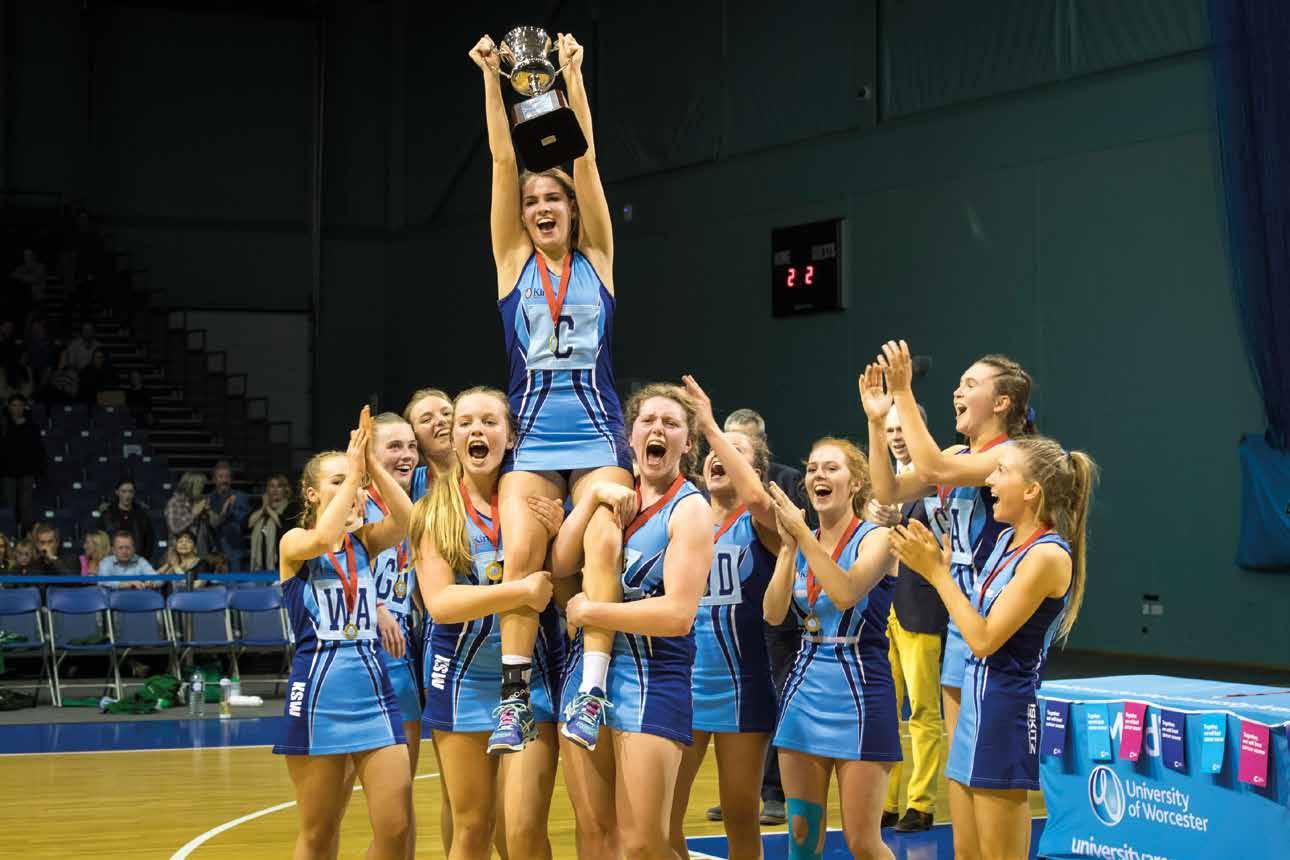


It has been another fine year for King’s, which involved a very successful inspection by ISI last autumn during which the school was rated as ‘Excellent’ (the highest grading available) in all areas. This outcome is a tribute to the hard work of my colleagues, and to the ongoing focus on education in the broadest sense which is so important to us. The range of activity continues to be extraordinarily impressive, and these pages give just a flavour of all that happens here during an academic year.
I am delighted that this continues to be combined with academic excellence, and last summer’s examination results were among the strongest achieved in recent
The education which we provide here is firmly focused on looking forward, but our magnificent historical setting means that it is normal that we should focus our minds on the past from time to time. One of our OVs, Edward Winslow, was among the passengers on the Mayflower’s voyage in 1620, and planning to mark this event has already begun. This year has been focused on commemoration of the final year of the First World War, which culminated recently with a specially created dramatic performance inspired by the letters of the Wilmot brothers, all three of whom did not return.
Other cultural highlights over the past year have included a range of fabulous concerts and a hugely impressive senior production of South Pacific. In sport too results have been impressive, and our sportswomen were delighted by their victory in this year’s Superball, the
netball fixture played against RGS at the Worcester Arena. A capacity crowd was thrilled by a single goal victory, a fitting reward for a splendidly controlled display of netball. Individual successes too have abounded, including international honours in sailing and canoeing.
There has also been sadness this year, notably that caused by the death of Christine Battrum during the summer term. The richness of what King’s offers is very evident both within this magazine and in what I have written above, and the school depends on the work of teachers like Christine, passionately devoted as she was to the progress of her pupils. She will be remembered as an outstanding House Tutor, an inspirational teacher of chemistry and someone with a hugely positive approach to everything she did. She is much missed.

Headmaster: Matthew Armstrong
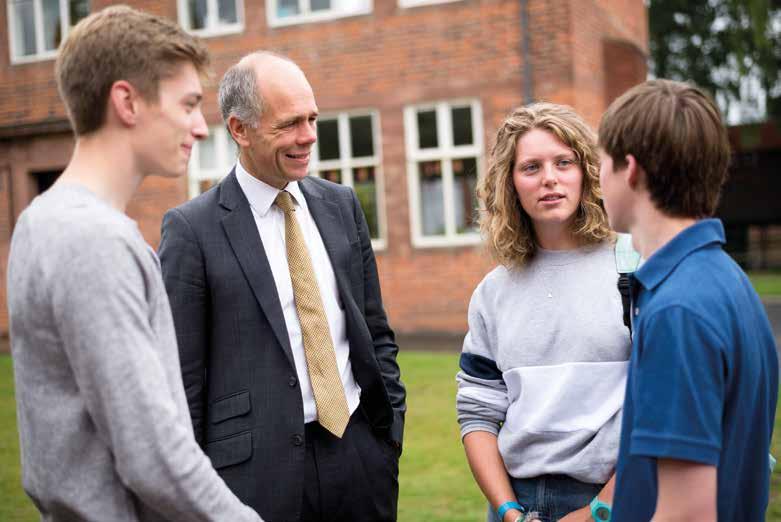
The editorial of the earliest surviving Vigornian, published in 1880 (the magazine started in 1878 and was called ‘The Vigornian: The Worcester Cathedral School Chronicle’) suggests that it was a struggle to get someone to edit it after the ‘pecuniary failure’ of the previous one. Readers will be pleased to know that they will not have to pay for this periodical and the editorial team of staff and Sixth Form students have willingly undertaken their commitment and enjoyed collating the publication.
Looking at the first edition there are some similarities in content, with articles on athletic sports, football and cricket (nothing on rugby in the early ones, and obviously no girls’ sports), concerts, trips (such as ‘A Tramp Across the Isle of Wight’) and clubs (chess was popular), including ‘Reading’ which seems to have been the equivalent of the modern Literary Society events. The contents pages enticingly suggest a section on poetry, but the last pages of the magazine are missing and so the verse does not survive. Articles on interesting aspects of the history of the school and cathedral feature and my eye was caught by one in the contents pages called ‘A History of the Heads’ which I assumed was about Headmasters of the school; I discovered it was an account of how the school acquired the heads of two ‘saumbur deer and three of bisson’ from the Madras Forestry Department. They were sent to Mr Bolland, the Headmaster (after whom the Sixth Form study room is named), who displayed them in the Boarders’ Hall. I wonder what happened to those poor beheaded creatures.
The current team have continued the tradition, which developed over the years, of putting together articles on a plethora of aspects of the King’s Foundation, and introduced new sections on what we regard as two significant aspects of school life, academic work and our pastoral communities of houses and forms. The ‘Academic Excellence’ section is a selection of written work from students across a variety of disciplines (mostly from the Sixth Form) and a couple of departmental reports; it displays some of the outstanding and challenging work of students throughout the year. The pastoral section is made up of brief reviews of the year from the nine pastoral houses, and speeches from Fourth Formers reflecting on their earliest days at the senior school.
A visit to the archives in Edgar Tower was inspiring and I recommend it to anyone who is interested in the school. I discovered an echo of house writing; School House in 1908 produced a house magazine, beautifully hand-written and illustrated. A Sixth Form magazine, The Sixth Form Pellet, produced in 1909 is particularly poignant in this centenary year when we commemorate the end of the First World War. An article, “Three Months in Hell”, was a satirical “interview” with Sixth Form Master, Mr William Henry Tennent Reed (KSW Staff 1908-1909), written by Sixth Former (and magazine editor) Alban Kingsford Chaytor (dayboy 1901-1909). During the First World War, Chaytor joined the 3rd Battalion of the Worcestershire Regiment; he was seriously wounded in action on 23 May 1915 and died three days later. He was 24. Meanwhile, Reed had been commissioned into the 2nd Battalion of the Monmouthshire Regiment and was killed in action on 2 May 1915, aged 30.
It has been a privilege for me, and the rest of the team feel the same, to take on the initially daunting task of bringing together written material and pictures which give an insight into a year in the life of our historic school, of which we are proud. I would like to think that someone in the years to come might look back on this publication with interest in how things have changed, at the same time as maintaining the tradition of producing The Vigornian.
I dedicate this edition to the memory of Alban Chaytor; in my brief acquaintance with him through his writing, he seems to epitomise what we nurture at King’s: a lively independent mind, self-confidence, a sense of community and selflessness.


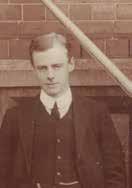
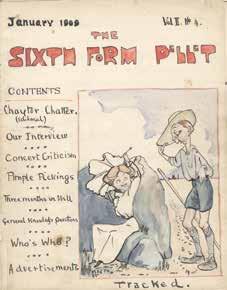
Editorial team:
Emmah Cameron
Isobel Cree
Kate Emsley
Isobel Copeland
Emily Watkins
Designer: Catherine Perera
Proof-reader: Stephan Le Marchand
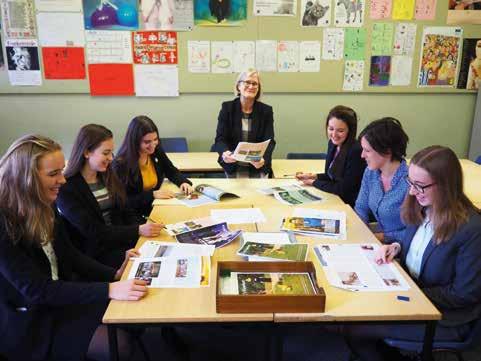
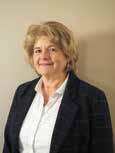
Helen Airdrie, Head of Careers
Helen Airdrie joined King’s in May 2018 as Head of Careers having retrained at UWE in Careers Guidance over 10 years ago, followed by roles developing and leading the careers programmes at Pershore High School and St Peter’s High School, Gloucester. Facilitating and empowering others has been a theme throughout Helen’s career. Following a degree in Botany at UCL and an MSc in Crop Production at Bath she worked for a number of years as a Horticultural Adviser before moving into the regulatory side of the food industry. Always intrigued by the career stories of those she meets she loves to create opportunities to inspire others and support their career decisions. Helen is also mother to two OVs, Rob and Benji.

Christopher Allsop, Assistant Director of Music
Christopher Allsop moved to Worcester in 2004, and ever since has been involved with the Cathedral and the King’s School. For the past six years he was the Cathedral’s Assistant Director of Music, and prior to that held a joint role as a teacher at King’s and Assistant Organist at the Cathedral. It feels like something of a homecoming therefore to be returning to King’s as the new Assistant Director of Music. During his time at the Cathedral Christopher inherited the direction of the Girl Choristers in 2008, and developed their role over the following decade to include overseas tours, recordings and live television and radio broadcasts. He was the Festival Organist for five Worcester Three Choirs Festivals, and Assistant Conductor and Repetiteur for Worcester Festival Choral Society. Christopher was Organ Scholar of Trinity College, Cambridge, and moved to Birmingham in 1997 as Assistant Organist of the Cathedral and Organist of the Blue Coat School, Edgbaston.
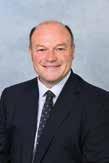
Jonathan Downe, Teacher of Chemistry and Physics
Jonathan Downe joined King’s in September as a teacher of Chemistry and Physics. He graduated from the University of Bristol, where he also did his PGCE and started his teaching. He has taught in Shropshire and more recently in schools in Worcestershire, many of them as Head of Chemistry. Jon also took part in a teacher exchange year in British Columbia, where the temperature regularly reached minus 30°C, but where school was never cancelled! Jon’s interests include walking, playing occasional five-aside football and supporting Shrewsbury Town FC.

Georgina Garfield, Teacher of Physics
Georgina grew up in Montevideo, Uruguay and moved to London in 2005 to study for her BSc in Astrophysics at Queen Mary, University of London, and then decided to spend some time ‘not thinking’ so worked at a dry cleaners for a (very short) while. While the work was not challenging, it was a really fun experience to do something completely different; by the time she started her PGCE in Physics at Kings College London the following year, she was ready to really throw herself into teaching. Georgina has been teaching at Queen Elizabeth’s School, Barnet for the last few years and has enjoyed preparing her students for competitions at the national and international level in Physics Olympiads, as well as running Model United Nations at the school. Despite hating all form of physical activity as a child, she is now a keen runner with three marathons under her belt (and countless halves and 10ks!); she is hoping to continue racing in the coming months. She has a dog called Amy who is possibly the most stubborn dog alive.

Alison Oliver,
Deputy Head - Staff and Co-Curricular
Alison Oliver joined King’s on 1st September 2018 as Deputy Head - Staff and Co-Curricular. Alison began her teaching after reading English and American Literature at the University of Warwick and completing a PGCE at the University of Oxford. Keen to continue with a love of Europe inspired whilst a student, Alison feels incredibly fortunate to have taught at international schools in Berlin and Brussels as well as schools in both the UK independent and maintained sectors during her career, most recently holding the post of Director of Professional Practice at St Swithun’s in Winchester. Currently studying for an EdD in Education focusing on teachers’ professional identity and professional learning and development, Alison is excited to join King’s and very much looks forward to making a contribution to what is so clearly a very special community.

James Owen, Teacher of English
James Owen joined King’s on 1st September 2018 as a Teacher of English, but also has an involvement in Games and extracurricular sport. Over the years, James has committed to developing his sporting profile: indeed, he has represented several Midlands football teams at a professional level; and possesses district and county honours for football, athletics and cross-country. Moreover, having helped the U18 football team at Alcester Grammar School to two South Warwickshire cup final victories in the last three years, he is looking forward to assisting in the development of young football players at King’s; he very much hopes that he can use his knowledge and experience to play a part in helping football at King’s to continue to thrive. Stemming from his A Level studies, James developed a love for English, in particular, writing poetry. Continuing his academic career, in 2013 James graduated at the University of Worcester at the top of his class, before furthering his studies at The University of Warwick. Here he specialised in Renaissance and Restoration Poetry and Psychoanalysis. It was during a lecture at The University of Worcester, in which Mr Matthew Armstrong was a keynote speaker, that James first gained a flavour for the professionalism and ethos here at King’s.

Erin
Preece,
Teacher of Physical Education and ADP Coordinator
Erin Preece joined King’s at Easter 2018 after giving birth to her daughter Ella last August. She joined from Malvern College where she was Head of PE and previously Head of Hockey, Swimming & Tennis as well as a deputy housemistress. She has a BSc and PGCert in Applied Sport and Exercise Science from Liverpool John Moores and the University of Wolverhampton and a PGCE from Buckingham University. Erin is an examiner and paper editor for the International Baccalaureate. Outside of King’s she coaches hockey extensively and played national league for Stourport HC until the arrival of her daughter.

Catriona Rees, Head of PSHE and RSE, Teacher of Religion and Philosophy
Catriona Rees joined King’s in September 2018. She studied Religious Studies at the University of Edinburgh, specialising in Comparative Religions and Islamic Studies. After graduating, she worked at the Ministry of Defence and at a risk consultancy, before taking a rather late gap year doing the Leiths Diploma in Food and Wine. Since then, she has worked as a chef and set up a business providing bespoke cooking lessons. In 2010, she left the world of hospitality for teaching and has worked at Ardingly College for the last seven years. She has moved up to Worcestershire with her family for the next adventure and is looking forward to developing the PSHE and RSE curriculum at King’s. Outside of school, she is keen to explore the surrounding countryside and still loves cooking.

Emily Ward, Director of Marketing
Emily Ward joined King’s in September 2018. She studied Advertising and Marketing at the University of Bournemouth and then went on to gain her Chartered Institute of Marketing Diploma in Marketing. After graduating, she worked at Worcester’s then leading Live Events Company, MMM Live, delivering the marketing for both the company and also event marketing for clients such as HP and Jaguar Land Rover. Since then, she has worked as Affinity Manager and then Acquisition Campaign Manager at Zurich Insurance, Cheltenham where she was responsible for driving insurance leads into the business. In 2010, she left the world of insurance and moved to the energy industry, working at RWE npower in Solihull. At RWE Emily had a number of roles including Social Media Manager, Digital Lead Manager, Campaign Manager and finally Product and Marketing Manager before joining King’s in August. She brings a wealth of commercial experience across all strands of marketing and a strong digital background. Emily lives in Worcester with her family and enjoys yoga, keeping fit and the general outdoors with her family.

Kim Armitage
When I arrived at King’s, Kim was one of the first people to exuberate her love of Netball to me. Only seeing the girls in the afternoon during Games can often be a difficult role, but this never phased her, always wanting to play a big role in the girls’ learning, with the hope that she could disseminate her passion and love for netball across to the athletes. She coached across a number of age groups and came into contact with many of the girls throughout her 9 years at King’s. Her commitment during the netball term was evident, but she was not afraid to pass on her knowledge of tennis in the summer too. Kim was a reliable and committed member of my coaching team and I wish her good luck in whatever she chooses to do next.
Emma McKenzie

Tom Jeavons
Tom joined the Chemistry Department five years ago, having graduated from the University of Birmingham. He will perhaps be best remembered for the way he promoted Chemistry through exciting and entertaining demonstrations, and his hosting of the local primary schools quiz competition. He also managed to train some Lower Sixth students to be able to run their own science shows, teaching them how to do the demonstrations and give an entertaining commentary. On school open days, Dr. Poole could often be heard promoting the show experiments of “Titanium Tom” as he called him. His ability to engage and enthuse were second to none.
He was also a committed Lower Four tutor, helped run the school sub-aqua club and was latterly responsible for the PSHE
programme. He surprised many with his participation in wresting, and will be fondly remembered for his fun performances in ridiculous costumes at the school fete! He will be much missed by all.
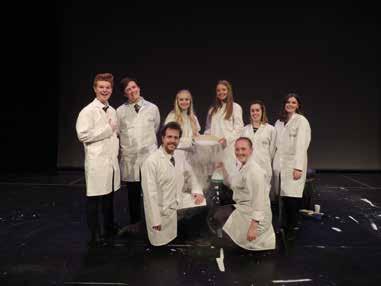
Carolyn Mellor
Carolyn joined King’s in 2011 as Second Deputy and French teacher in the Modern Foreign Languages Department. She had previously been Head of Sixth Form and Head of MFL at Edgbaston High School for Girls and before that Head of Year 7 at Queen Mary’s Grammar School for Boys, Walsall. Her genuine interest in people was clear from the outset. In her quiet, understated but strongly resolute way, she supported pupils and staff alike, encouraging them to feel good about themselves, drawing out their best and seeing them thrive. Her pastoral role went beyond Deputy Safeguarding Designated Leader (DSL) and supporting House Tutors. She was school tutor for Newly Qualified Teachers (NQTs) and PGCE students and responsible for the induction of new staff. She also set up training for Heads of House to put them on a more equal footing with Monitors.
Carolyn was responsible for inviting some of our most inspirational inset speakers including Isabella Wallace and Jane Simister. Jane’s visit had a significant impact on both King’s St. Alban’s and the Fourth Forms who have embraced Growth Mindsets as part of their ethos. Carolyn arranged Karl Hopwood’s first visit to King’s to talk about internet safety as part of PSHE; he now has a regular slot in the school calendar. We will never forget Dick Moore’s moving talk on mental health issue; it was as a result of this that Carolyn trained as a Mental Health First Aider.

Mike Newby
Mike Newby joined King’s in 2006, initially for a maternity cover in the Biology department, but decided to stay for the next 12 years or so! A highly experienced teacher who had taught at schools such as Rendcombe and Bredon, he fitted into King’s from the moment he set foot in the school.
He taught Biology to a very high standard across all year groups and could always be relied upon to enthral his pupils with extra anecdotes and stories to enliven every topic. He had a natural rapport with the pupils and was an excellent, highly understanding Fourth Form tutor.
From the very first day of his arrival Mike threw himself into the whole life of King’s, and it would probably be easier to list school activities with which he did not become involved. An outstanding all-round
Carolyn organised the biennial school walk, something which always seemed to run seamlessly but took an inordinate amount of time and fine planning; she arranged popular events like non-uniform days and, as the member of teaching staff with responsibility for Health and Safety, not so popular events like the fire drills. When DPI was unwell, Carolyn took on the editing of the Vigornian, something she carried on until she left; she also ran the Quiz Club with Lucy Walmsley until last year. There was a myriad of other jobs, too mundane to mention here, but all of which had a significant impact on the running of a successful school. The Fourth Form boys in particular have Carolyn to thank for her suggestion to the King’s School Parents’ Committee for the purchase of the outdoor table tennis tables.
French was and is Carolyn’s first linguistic love and Sixth Formers in particular will remember her fondness for literature and film whilst all pupils taught by her enjoyed enthusiasm, effectiveness and reliability tinged as ever with that characteristic warmth, sensitivity and common sense determination. The department benefited greatly from her input, knowledge and support – her qualification as a dégustateur de vin did not go unnoticed.
Carolyn is one of those rare people who always put others first; she understands that the most valuable gift you can give anyone is your time. We will miss Carolyn’s generosity, her kind and decent manner,
and above all her quiet determination to strive for high values and common decency.
Although it is always sad to say goodbye to a much-loved colleague, the overwhelming feeling at the Diglis Hotel on the glorious summer evening of Carolyn’s farewell was of warmth and kindness. Carolyn’s popularity was plainly clear from the number of colleagues who came to say farewell, from support, teaching and maintenance staff past and present, young and not quite so young. In the words of Maya Angelou: ‘People will forget what you said, people will forget what you did, but people will never forget how you made them feel.’
Joanna Lucas / Richard Ball
Stephan Le Marchand
I spoke about Stephan Le Marchand, Slem, at the summer term farewell to leaving staff with reference to Shakespeare’s As You Like It, quoting from those famous lines beginning ‘All the world’s a stage…’ This seemed an appropriate hook given his passion for many things theatrical, particularly Shakespeare, his time spent as an actor prior to his teaching career and the importance it played in his time at the school (although he has been known to nod off at Stratford...).
He joined King’s in 1983, having turned his back on a stage and screen career and over the intervening years put his undoubted strengths in this field to use in his teaching. The lines make mention of men and women being ‘merely players’ but this does not come anywhere near to doing justice to what he has achieved in his time here. He has played a range of roles: English teacher, cricket and football coach, Housemaster, Year Group Head of Careers, play director…
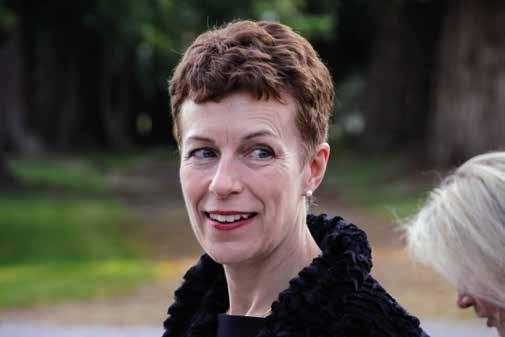
sportsman with particular expertise in rugby and basketball, he naturally gravitated to the games fields where he coached many teams and clocked up thousands of ‘airmiles’ taking teams all over the country. Mike is a very experienced mountaineer and so became a mainstay of the Duke of Edinburgh’s Award team, giving up hours of his time to help supervise expeditions and train pupils. He also helped out with MFL trips, the Himalayan Club, and his leading roles, such as Captain Hook, in the Fourth Form pantomime will remain the stuff of legends for many years.
His retirement leaves a very big hole to fill in many areas of the school and I suspect that it will take more than one person to cover for the many roles he performed. His commitment to the King’s School over the past decade or so has been second to none and he will be greatly missed by us all. He leaves us to retire to his house-building projects and to hopefully spend many
happy hours with his grandchildren. We wish both Mike, and his wife Joan who has also retired this summer, a very long and a very happy retirement.
Matt Parkin
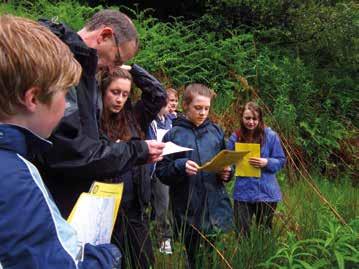
be found in the department during these times, creating the notes and worksheets to ensure that he delivered everything in a thoroughly professional manner.
For many years he was Chappel Housemaster (more latterly known as a House Tutor). He brought the same enthusiasm and energy to this role. Crucially, he was so good at it because he genuinely cared for those in his charge and this gave pupils who passed through the House a love for him. At a presentation made by OVs at the school fields after King’s Day, a former pupil spoke movingly about how Slem had helped him through a difficult time. He always made time to listen.
I have been very lucky to have taught in the same department, worked on plays and been on cricket tours with him. It has been hard work but great fun with many good times together. Slem arrived here 35 years ago to teach at what was predominantly a boys’ school with a significant number of boarders. Productions took place in what is now the staff common room, the library (the scene of so many much-loved library evenings) was located in the Edgar Tower. The place has evolved but some things remain as constants which is what a school like this needs. Slem embodies this. He has always retained his desire to do things the right way. And do it with passion.
In the classroom he was inspirational bringing his knowledge, energy humour to his teaching, communicating his genuine enthusiasm. Over the years many students have enjoyed the evident love that he has for the subject, particularly when studying texts. How fantastic to have a former professional actor teaching you drama, admittedly, shamefacedly hogging the best parts for himself, delivering definitive performances as Lear, Iago, Blanch Dubois, Lady Bracknell… This has brought these texts to life for so many and that is so important in our subject. But he wasn’t shy of the hard graft involved; this has been backed up by thorough preparation. Don’t always believe the myth that teachers don’t work in their holidays. Slem could often

Hannah Riddell
Hannah joined the Careers Department in 2013, initially as Work Experience Coordinator, a role which she carried out with textbook efficiency. It rapidly became apparent that she had bags of energy, boundless enthusiasm and a great vision for the department. She swiftly became Head of Careers, building on the excellent work that SLeM had previously done.
During her time at King’s, she worked tirelessly to move things forward in the department. She pioneered ‘whole school careers,’ ensuring that all years from Lower Fourth to Upper Sixth had full access to the Careers Department. To this effect, she organised and ran a multitude of new
The many theatre productions he has overseen are an astonishing legacy. I have had the good fortune to see at firsthand how he inspired pupils to do their best. The passion poured out of him (often literally – editor SHLeM not convinced of the accuracy or the image there!) as he sought to instill in pupils the belief that they could raise their performance, taking it beyond their own expectations. Sometimes this was achieved by gentle coaxing, a quiet word, sometimes by one of his legendary rants (especially when lines hadn’t been learnt); he refused to accept anything other than the highest standards. I can still hear him urging students to ‘Make it big!’, his stock phrase for getting them to take their contribution to the next level. The incredible directing, the fastidious attention to detail that went into ‘A Streetcar Named Desire’, ‘Les Miserables’ and so many other productions means that these will live long in the memories of staff, pupils and parents. At least he is now spared those sleepless nights that plagued him as the performance date came nearer!
initiatives. Amongst many other things she introduced the ‘Chocolate Challenge’ to our Fourth Form pupils, the ‘Careers Investigator’ programme for Lower Removes, and our Upper Remove pupils were introduced to a very popular careers speed-dating event! During her time here she always reflected on the many events and activities that she organised, striving to make improvements as necessary and, most importantly, always with the pupils at the heart of everything she did. Her door was always open to any pupil and many OVs, and they were always met with a positive smile and a can-do approach.
Her contribution to charity work at King’s was remarkable, and all the more so because it was not part of her job description; she did it because she enjoyed it and believed
Now he enters the next scene, ‘soaking in a hot tub’ (or soaking on the treadmill) at his ‘health’ club, rediscovering golf, doing most of the cryptic crossword, writing his book or screenplay, enjoying his garden and the odd glass of wine. He deserves it. He has played his part, the reviews are written and they are glowing. They are not reviews for an actor. They are for an excellent schoolmaster who has left a hole at the school that he served so well.
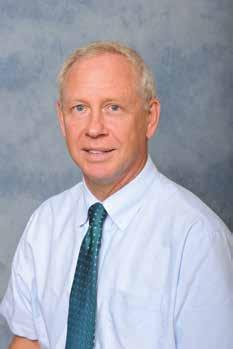
in its significance. As part of the Sixth Form Charity Committee, she helped to develop its activities and the range of charities supported. Enthusiastic, keen to encourage students to be independent, creative and full of new ideas, but practical and active in ensuring that initiatives came to fruition, she raised the profile of the committee and worked tirelessly for it. She developed the relationship between the Charity Committee and The Bransford Trust, so we are able to double the funds raised by the Committee or individual students on some of our projects.
An outstanding member of staff who will be sorely missed, we wish Hannah the very best of luck in her new role.
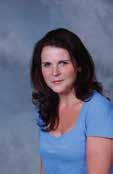
Lorri Guy December 2018 was in fact the second time that Lorri Guy left the school; her association with the King’s School in general, and the English Department in particular, is a long and illustrious one and we shall miss her contribution greatly. Those pupils with whom she worked in a pastoral role were also most grateful for all her time, her wisdom, her listening ear and her common sense and in this sphere of school life she will also be much missed.
Having worked in the school for a short period previously, she returned in 2003 to take up a permanent teaching role in the English Department. She was an invaluable member of the team, being extremely thorough and tremendously enthusiastic in every aspect of the teaching of English, from Lower Fourth to Upper Sixth. She was the first person to fill the role of Second in Department, always produced very detailed and comprehensive study guides and notes for every text she taught and was renowned for her colour coding and highlighting of pupils’ notes as well as her own, on occasions seizing pupils’ files from them to show her disgust at their disorganised state! Her positive

Chris Xia
With a career in international journalism already behind him, as well as being an experienced and fully qualified teacher of a number of languages (French, German, Spanish, Chinese …), Chris Xia stepped in to fill a vacancy in the MFL department for the Autumn Term 2017, teaching French and German at various levels. He will be glad to know that the Fifth Form Group he taught did very well in GCSE German the following summer. His affable manner, deep knowledge of a wide range of topics as well as plain common sense made him a most valued colleague and popular presence. It is no surprise that the KSW MFL department maintains cheery contact with him. We wish him well in his post at Blessed Edward.
Richard Ball
determination to achieve excellent results for any group was well known; she would sally forth, even when saddled with a difficult group, with bags of enthusiasm and do all she could to ensure their success. She was a most valuable member of any theatre trip, marshalling pupils from coach to theatre and back with military determination, and came into her own on the Sixth Form Literature trips to Haworth, acting the part of Cathy both out on the moors and outside the windows of the Haworth YHA, transformed into Wuthering Heights for the evening’s workshop!
Lorri used to recall a story of visiting her husband Andrew, himself an OV and at the time a serving officer with the Worcestershire and Sherwood Foresters Regiment stationed in Gibraltar. A keen climber, with a shock of curly dark hair, she free-climbed up part of the famous rock, to the astonishment of all who beheld. She certainly climbed high at King’s too, serving with distinction as House Tutor of Creighton House, a role she relished and developed enormously during her tenure, always recognised by the House as “firm but fair” and always ready with a listening ear and often a box of tissues when pupils had their worries or concerns. She also took on major responsibilities as one of the Deputy

Pete Hodson
Pete Hodson joined King’s School in 2008 as the ICT Support Manager and successfully guided an ever growing ICT department throughout the course of his tenure. Pete oversaw the ICT infrastructure for all three schools in the foundation and helped modernise many of the resources we now use on a day-to-day basis.
Many of the staff who have worked alongside Pete, support staff and teaching staff, will know how much of a passion he has for his work and his level of professionalism when dealing with any given situation. He could always be relied on to respond to an issue promptly, with a smile and a high level of expertise.
All of us in the IT team are eternally grateful for the amount of hours he spent supporting us and helping develop the skills of the team into what we’ve become today. We all wish him and his family the very best in the future and look forward to hearing what their new adventures hold.
Adam Rowberry
Designated Safeguarding Leads for the school, another task requiring compassion and understanding as well as the most thorough of administration and record keeping and a swan-like unflappability.
It was as House Tutor of Creighton that she introduced “Creighton’s Got Talent”, which proved very popular with pupils, staff and parents alike as well as raising a considerable amount each year for charity. Drama was another major area of Lorri’s contribution to the life of the school as a whole, both as a Director of many Fourth Form and other productions and as the Good Fairy of so many Staff Pantomimes. She also, of course, saw her two sons, Jack and Harry, through the school and their contributions to the academic and extra-curricular life of the school were also most valuable. She leaves King’s to work in International Educational Recruitment Consultancy, where there is no doubt that she will carve out the next stage of her remarkable career. Those killer heels will be clicking their way along corridors of power and, just as we all knew when she was at King’s, no one will be in any doubt that Ms Guy is on the case. We wish her the success she deserves.
Andrew Maund
With thanks to other leaving staff Bernie Routledge and Alistair MacNaughton will both be very much missed by the English Department, even though they were only with us for a short time. Bernie was employed to cover a maternity leave and it quickly became clear that his experience, sense of humour, and sometimes maverick style, was going to be a hit with both students and staff. Alistair was very well-known to many members of staff here when he returned to cover two terms, having retired from his Headship at King’s Gloucester, after leaving King’s in 2007 following a successful period as Senior Deputy here. He bought enormous expertise, intellectual wit and sensitivity to the department, resuming his role as a brilliant, inspiring, encouraging teacher and mentor, cake-lover, and natty dresser with ease.
We say goodbye and thank you to two invaluable Spanish Language Assistants: Ivete Houer-Milton and Andrea Torrano. We wish them luck in their future endeavours. The music department says farewell to two peripatetic music teachers, Lesley Cox and Hazel Whitefoot, who have been working here for the past 10 years and Sebastian Hill, who brought youth, energy and musical talent as a gap year student; we wish him all the very best as he begins his degree and choral scholarship at Magdalen College, Oxford.


Born in 1964 in Glasgow, figure artist Alan McGowan is a practising artist and teacher with his paintings having featured at many exhibitions of figure art internationally. His work always derives from life and depicts human subject matter, exploring tensions between the world’s intrinsically elusive nature and the struggle to hold on to it. Seeing language as the vehicle for this struggle, McGowan develops a second terrain within his work of the language of paint, which entails colour, tone, translucency and opacity, and line. Unlike the views on anatomy in the 15th and 16th centuries, which saw it as restrictive and inhibiting of creativity, McGowan sees it as liberating of creativity and allowing selfexpression through the gained control and confidence.
The Big Sea of Dreams was painted with oil on board and is of dimensions 60 x 80 cm. Recorded from direct observation of life, the subject matter is a nude woman lying in a resting position diagonally across the area of the piece. It is the process entailing use of materials and methods which give the work his particular message. While the studio-based environment does not seem to have impacted the piece much except for a possibly more studied and figurative rather than impulsive and gestural approach, the oil paint and brushes used allow for evocative and interesting brush strokes which build up the figure with shape, tone and colour as well as allowing for contrast in terms of tone. This creates focal points in areas of lighter tones outlining the woman’s upper
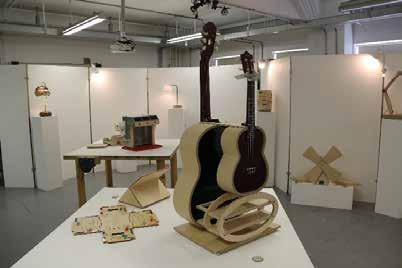
back. White line work outlines a part of this, using white, the lightest colour seen as a conserved example here and in a small area of the leg to create balance.
The composition is developed with a balanced mix of wide brush strokes, line and paint high in runniness, travelling to the lower edge of the piece from areas of the lower bounds of the woman’s shape. All three are intertwined, with the latter two methods working to increase the complexity already created by the brush stroke pattern and fluid rhythm which is broken up occasionally by changes in colour as well as creating a more expressive, evocative, and interesting piece. The artist is thus allowed to successfully develop the incompatibility between attempts to keep a world which is subject to constant change through his language created by these aspects of the paint. This is further reinforced through the palette and the physically figurative depiction of the woman. The colour scheme centers around natural skin tones and extends, creating balance and interest through this flexibility, to shades of green, blue, purple and red which make up a palette that is generally of cool shades. This suggests the neutrality of the message or opposition to the manner in which desperately sentimental people are not allowed to hold on to an elusive world. Because of this, I consider this work to be successful in that it evokes a sense of this elusiveness through a figurative and expressive style, as well as through the colours and process methods building an interesting composition which crops out a portion of the subject matter, referring again to the message.
Julia Horvath, School House
Abridged Essay: Assess the extent to which the public image created by Augustus endured beyond
Throughout his lifetime, Augustus portrayed himself as different personalities according to the political and social scene at the time, from Caesar’s heir and bloodstained triumvir to bringer of peace and pater patriae. The extent to which this legacy has endured relies on our perception of Augustus through his literary sources, coinage, sculpture and architecture.
Augustus presented himself as pater patriae to the whole Empire through his active roles in religion and morality, an image that he strongly conveyed in the Res Gestae to create a positive legacy. He emphasizes, “the whole people of Rome gave me the title of pater patriae”, demonstrating his popularity and non-tyrannical behaviour. The people were choosing him to gain more power, giving the impression that people were benefitting under his rule. The sacrificial implements denarius and carmen saeculare enforce this view that Rome and its religion was prospering with Augustus, as the sacrificial implements depicted on the coin represent both religious colleges and instruments used in sacrifice. His head on the opposite of the coin showed that it was Augustus restoring Roman religion in order to protect and better Rome from the previous turmoil of civil wars which some senators blamed upon a lack of piety. The carmen saeculare was a song performed at the ludi saeculare, a celebration following the leges iuliae which imposed Augustus’ traditional views of marital and religious morality in order to “expiate” their “father’s sins” and prevent society from bearing “still more sinful children” as shown in Horace’s ‘Moral Decadence’. The leges iuliae and religious reforms highlight that Augustus had taken the role of pater patriae because his leadership of religion as Pontifex
his lifetime
Maximus and the people’s behaviour were typically the responsibility of an individual’s paterfamilias, so Augustus was positioning himself as paterfamilias of Rome. Suetonius reiterates the volume of positive change that Augustus makes by stating that he “swelled the ranks and dignity of the priesthood” and “revived various ancient rites”. This demonstrates that his legacy as a pious man who restored the same piety within the Roman people has been sustained beyond his lifetime. The moral reforms on “profligacy, adultery, chastity, bribery”, marriage and “procreation” also show that his image as being a man of traditional values and a role model to the people of Rome by means of Augustan Gaze was solidified. However, the extent to which this view has endured is limited through the tarnishing of Augustus’ reputation by Mark Antony’s accusations of adultery and family scandals. These scandals suggest that the Imperial family unit were not as morally pure as initially portrayed in the Res Gestae with Augustus disowning Agrippa Postumus due to his “brutish and insolent manner”, exiling Julia the Elder and refusing to “acknowledge or rear his granddaughter”. This emphasizes the fact that his own family values were different from and perhaps lesser than those he imposed on the public, implying a level of hypocrisy. The “adulterous behaviour” reduces his moral public image and contrasts with how Augustus wanted to be portrayed, as it directly undermines his laws on infidelity. But Antony’s accusations should “not be seen as simple facts… a public figure revealed a huge amount about himself”, suggesting that the extent the truth and damage to his reputation is questionable as the public would have known every detail of Augustus’ life due to his lack of privacy. Furthermore, these
Well, this has been a really full year! We have started a brand new GCSE course with Year 10 and a brand new A Level with Year 12, and made many changes with plans for many more. The ‘legacy’ way of doing things (a term used by the exam boards), has been excellent; students have learned so much about industrial practice and have become hugely creative and innovative designers, but the new courses have set off in a great new direction. Design & Technology is all about solving problems and improving people’s lives, be it through the discovery of emerging technologies,
development of new and smart materials or simply driven by demand. This same quest for improvement has been applied to the newly conceived GCSE and A Level syllabuses and I’m happy to say, though it’s early days, that both courses seem excellent. Far from there being wholesale changes inflicted upon teachers and students, it is more that the focus has shifted - it had been on producing a beautifully finished product, the kind of product that displays so well in our end of year show. It is now aimed squarely at the development of a prototype. The buzz term now is ‘iterative
design’. Iterative designing is the process of conceiving of a solution to a problem, modelling and prototyping the idea (as quickly as possible), analysing and learning from the modelling, then developing the next iteration of the solution. This process would go on for as long as was necessary to produce the perfect solution to the problem. It remains to be seen if we will be exhibiting modelling and evidence of the iterative design process alongside prototypes next year, but it will be an exciting journey to that point.
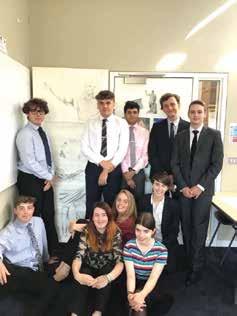
because they were both intentionally trying to ruin each other’s reputation. Therefore, despite these accusations, Augustus’ legacy as being a good role model and moral leader has mostly endured beyond his lifetime due to evidence of his reforms and the unreliability of Antony’s word.
In conclusion, the aspects of Augustus’ public image that he wanted conveyed in his legacy through emphasis in his Res Gestae have endured beyond his lifetime. Our understanding of Augustus being multiple personalities proves that his legacy as a bringer of peace, a strong military leader and a benefactor of Rome has remained. Although, the extent to which they have endured is limited as the later depictions of Augustus and his public image contrast with his moral purity, peaceful demeanour and piety. Despite this, our own knowledge that the Sebasteion at Aphrodisias and Suetonius differ from how Augustus portrayed himself suggests that in fact we understand his legacy, so his public image has endured the years beyond his lifetime.
Investing carefully in rapid prototyping at the right time to procure the most efficient and effective equipment for our outlay, we now have an excellent and growing provision of 3D printers. With 12 machines at present, students are able to see their ideas come to life. Our resources are growing as quickly as our horizons are broadening. These are exciting times and we will see this reflected in the nature of our students’ work.
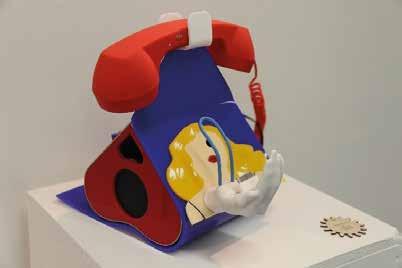
The Extended Project Qualification (EPQ), has become a significant part of Sixth Form academic challenge and its popularity is growing every year. Equivalent to half an A level and highly respected by universities due to its focus on research and independent work, students are enjoying the opportunity to work on a topic, artifact or subject of specific, personal interest. Skills of research, time-management, writing and presentation are assessed through either a scholarly dissertation, or a ‘product’ accompanied by a report. Examples of writing here are extracts from two dissertations and a ‘product’, a short story.
Will it one day be possible for an athlete to reach and sustain a speed in the 100m sprint that breaks the 9 second barrier?
This is an abridged and edited version of the dissertation, taken mostly from the introduction and conclusion. References show the extent of research undertaken and are listed in her reference section at the end of the essay.
The last decade has been revolutionary for sprinting. In the last 10 years, the world record for the 100m sprint has been broken three times by the same man, Usain Bolt, and since then, more and more male sprinters are running below 10 seconds for 100m and some are even encroaching on Bolt’s record of 9.58 seconds. The whole world seems to be watching with baited breath at every international event to see if an individual will rise beyond Bolt’s previously impossible record and raise the sprinting bar even higher. The question I would like to address is, ‘Can someone run at a speed that breaks the 9 seconds barrier?’. 50 years ago, the answer would have been an overwhelming ‘no’. However, as technology has progressed and the training methods have improved, the 100m sprinting record has decreased and decreased, beating numerous mathematical models (Duncanson, 2011) (McGuigan & Salo, 2014) . Leading mathematician Raza Noubary, from Bloomsbberg University of Pennsylvania, calculated that the ‘ultimate record’ for the 100m sprint was 9.44 seconds (Duncanson, 2011) (Yong, 2012) but, following Bolt’s performance, conceded the prediction would ‘probably go down a little bit’. Human performance is unpredictable and considering humans have only run competitively for approximately 100 yearsan insignificant amount of time in a human evolutionary context - it is impossible to forecast any potential human limits for the future (McGuigan & Salo, 2014). However, this does not mean one cannot analyze whether the 9 second barrier can be broken, as this question does not focus on constraining humans to particular numerical value due to linear models but rather, looks at the hindrance and advantages of our genetics and potential evolution of both the human body and technology.
Considering the above, it is no wonder that the 100m sprint is a world-renowned
event that has given rise to many athletic champions, such as Usain Bolt and Jesse Owens. Yet, more recently the event has attracted the press for the wrong reasons. Drug scandals have fronted many newspaper headlines and too many elite athletes like Justin Gaitlin, once heroes of the sport, have been disgraced on drug related charges. Even more shocking was the news that Russia was systematically encouraging and paying for its athletes to take Performance Enhancing Drugs (PEDs), consequently causing their elimination by the International Association of Athletics Federation (IAAF) from the World Championships in London 2017. The seemingly persistent bad press for sprinting has caused the sport to fall out of public favour as people wonder whether what they are watching is pure talent or the product of a chemical designed to create physical advantage. The natural beauty of sprinting is being tainted by the artificial ugliness of synthetics. However, many athletes continue to break the World Antidoping Agency (WAADA) rules and take PEDs despite the threat of being caught as well as the serious risk to health that these drugs pose (Freudenrich & Allen, 2000). Even now, when testing is at its most rigorous and efficient, rather than abandoning a practice that is dangerous and destructive, some athletes and coaches look to an even more subtle way of becoming champions. Gene doping, although still a very undeveloped idea, may be becoming a reality as (Duncanson, 2011) (Elert, 2010) evidenced by scientists at Salk Institute in southern California, who managed to alter the DNA of mice causing them to convert their fast twitch fibers to slow twitch fibers (Duncanson, 2011) (Elert, 2010). If someone were able to do the opposite on a human being the result could be extraordinary. However, as the concept of gene doping gathers more publicity and funding, one cannot but wonder whether natural sprinting is at the end of its era.
The question of whether the 9 second barrier will be broken depends on whether there are areas in which sprinters or sprinting can improve. To analyse this, I

This is taken from from the introduction and conclusion of the dissertation; the rest of the essay uses a wide variety of primary and secondary research, including case studies, to discuss the medical issues of dementia and current practice for care of sufferers.
will look at a number of important factors including genetics, race, culture, mentality, sprinting mechanics and PEDs. These factors, potentially the most influential in the considered sprinting distance, can be classified into two categories: the first four having evolved through nature and the latter two having evolved through nurture.
The 100m sprint is a highly complex event, in which a huge variety of factors can have an impact on sprint performance. This dissertation does not discuss all influential sprinting components, but rather focuses on those that have the biggest impact on sprint times to be as accurate as possible. One can debate whether nature or nurture has a more significant impact in sprinting but, having thoroughly researched these factors, I have come to the same conclusion that David Epstein came to in his book ‘The Sport Gene’: “The broad truth is that nature and nurture are so interlaced in any realm of athletic performance that the answer is always: it’s both.” World class sprinters combine great genetics with great temperament and technique and sprinting experts agree that talent alone is not enough to win gold.


Dementia is a rising problem across the globe, with the problem of an ageing population becoming ever more prominent and demanding not only on the global economy but also on the healthcare systems in place all over the world.
By 2050, that figure will probably exceed 2 million. These statistics are, to say the least, troubling.
Yet, the question still remains, ‘Will we one day break the 9 second barrier for the 100m sprint?’ If you ask the experts, they are divided and it certainly is a huge challenge, considering how many sprinters struggle to run under 10 seconds for 100m. Having investigated these nature and nurture factors, I have concluded that I do believe that one day we will break the 9 second barrier but definitely not in my lifetime. The neural adaptations that need to take place to produce an individual who can achieve this are extensive and need to be fostered by a carefully thought-out training program. Moreover, this individual must be born with advantageous genetics far beyond the current calibre, as training can only do so much. This kind of serious genetic advancement will probably only be seen as a result of a new selection pressure placed on humanity, forcing us to evolve, and therefore will occur far into the future.
Additionally, there would have to be a very
2018). A black male, most likely from the USA or Jamaica, with an extremely high percentage of type IIx fast twitch fibres, a thicker than average motor axon, the ability to resist fatigue, a determined nature and creatine supplementation with great funding and coaching is the most likely candidate. The individual not only needs talent, but mental resilience to power on through disappointment so that he can achieve greatness. Since more sprinters with some or all of these attributes are already competing, for example Christian Coleman, I do believe that one day someone can embody all of them. Just not in the next 100 years.
PEDs, if legalised, could make it happen much sooner as many do improve performance, but we could also see many potentially great athletes, who could achieve under 9 seconds, suffering or even dying due to their use. In my opinion, a clean sport is the best way forward, not only for the health of athletes but also for athletics. People want to see real talent and so the legalisation of these drugs could cause public support to dwindle and fewer athletes to take part.
To achieve what is less than a second faster than Usain Bolt, we need another, better ‘freak of nature’. The last decade has been revolutionary for sprinting but I would suggest that to achieve a time that is less than 9 seconds in the 100m, the next century would have to be evolutionary.
Hannah Stock, Oswald House
In this dissertation different approaches to dementia care are explored with an aim to determine which is the best suited to deliver to the elderly with cognitive deterioration to best increase their quality of life and prognosis.
Through research it is determined that personalised care is vital to the elderly suffering from dementia due to the impacts the disease has on independence, an individual’s mental state and the wellbeing of the individual’s family. This can be achieved through a combination of care paths. The tri-focal model of care is ideal in taking into consideration all members of the care team, ranging from the family doctor to the individual themselves.
However, in today’s society the NHS is struggling under huge debt and that in turn is impacting staffing levels and quality and availability of care in a number of healthcare environments. This reduces the accessibility of in-depth, tailored care plans, making the scenario of a “perfect” care setting hard to realise.
In the USA in 2012, every 68 seconds somebody developed Alzheimer’s disease. By 2050, that will rise to one every 33 seconds. In 2012, family members and unpaid caregivers provided 17.4 billion hours of care to dementia suffers in the US. This figure excludes professional carers within health care settings such as care homes or hospitals, or house-visitors. In the UK, one in seventy-nine people is suffering from demetia. One in fourteen of those over the age of 65 will develop the disease, and these figures are set to climb: in 2014, 850,000 suffered from dementia.
Dementia is a disease which focuses on eating away at different parts of an individual’s brain. No two people will suffer in the same way, so all care should be administered with this in mind. Those suffering from dementia are more reliant on others, more vulnerable. The success of a care plan will drastically affect the happiness and welfare of an individual, so the type of care should be thought about very carefully. If generalised care is lumped in, then residents and individuals will feel less at ease, their mood can drop and their quality of life can become compromised in drastic situations. It is important that a group of people within a caring institution aren’t all counted as that: a group. They are people with families and preferences and it is a must that this is taken into account when a care plan is being devised for an individual.
There are a number of care paths, each focusing on something slightly different: for example, your physical responses to treatment or your emotional responses to stimuli. A combination is necessary because these care models are incomplete on their own. Personal care is key in any health care environment, but with people suffering from dementia it is essential due to the nature of the disease. The person is ravaged by cell death, severely altering the personality and habits of the individual. They need constant stimulation and somebody to understand them for who they are now. They need the medical help that comes with the medical model of care, but also the support of the psychosocial model and the in-depth care that comes with the person-centred care model.
So, personalised care should be at the heart of dementia care due to the symptoms that dementia causes. It should be accompanied by a number of other methods, supported by the friends and the family of every individual because they know the person, or who they were. Together with healthcare specialists and nurses, whether they are in a care home, or visit an individual once a week in their home, something special can be created.
Maddy Curtis-Wetton, Creighton House
This is an abridged and heavily edited version of the gothic short story written as an artefact. It was accompanied by a report discussing research and how it was applied to the story.
It was a wretched night in January and a low smog hung in the streets of the city. The houses with their gaping black windows and empty rooms crowded the streets and bore down upon the lonely cab driven by a man without a heart. The hand that reached down beside his seat met a newspaper he had taken from one of the stands a few days before. Even in the dim light that made his eyes ache, he could see his own face printed on that dreadful sheet and, as a flurry of madness suddenly took him, he seized it with both hands and tore it in two. He watched as the ragged pieces of his face, beneath that hideous printed word `Debt`, floated uselessly to the ground. A poor factory worker stood on the corner, beneath a shattered streetlamp. He wrapped his thin, battered coat about him in an attempt to block out the rain and the biting cold- it did not take him long to realise that nothing could block out the cold. It was buried deep within him. He who waited on the roadside looked up into the face of the man who sat above him.
“What do you want?”
“I want to go,” whispered he. His voice was quiet, quieter than he had intended and it surprised even him. The cab driver stared down upon him mercilessly. No words came from him and the silence seemed to press down upon the factory worker with all the more force. The words he then uttered frightened him a little.
“I want to fly,” said he suddenly. A sharp bark of brittle laughter was jerked from the watching man, cut short with a painful gasp breaking forth from his lips.
“We mere mortals cannot fly,” responded he. “Such a thing is for angels –if there be any.”
“Take me to the Tower Bridge,” said he. The door seemed to swing open of its own accord and in climbed the factory worker. In that chilling split second when all was illuminated, the worker stared out from the window of the cab and saw the twisted and bloody form of a baby boy whose head lay at a strange angle, shaking and blurred once more: a babe of a mere few months yet taken from life so soon.
…He had come home from the tavern with a whirling head and loud voice cracking with a mixture of two emotions that would make any man mad. He had screamed until his throat was raw yet no water had stolen forth from his eyes even as he was dragged away. But over the sound of his own grief there came another: the sound of a baby calling out for his mother- it was his only son, the youngest of his children. The children had left him sleeping and had forgotten him in their hurry to get away. Setting the bottle down on the table with a hand heavier than he had intended, he reached down with a soothing voice that shook to where his son lay.
Lifted he the boy from the cradle and held him close with one arm whilst reaching for the bottle again. He raised it to his lips and took another deep draught through. The boy cried louder and then, with a scream of rage, he did the unthinkable. He let go of the baby.
The cab was driven up onto the bridge; here the wind was powerful, battering them from all angles and even rocking the cab upon the road. The worker leaned farther out of the window and called to the gale, almost without realising it:
“Stop, let me go here!”
“I want to fly, I want to fly, I want to fly, I want to fly, down and down and down again, till nothing’s left of me...”
And the man on the cab saw in the face of the man poised to fly a terrible visage. It was as though the lightning had peeled away his skin to show the tortured creature – the monster perhaps – which lay within. The light vanished and the monster was then concealed by the man. The cab driver was then galvanised into movement – as though, like Frankenstein’s monster, the bolt had sent new life through his limbs. With a strong and sturdy arm, the driver drew the worker back from the brink.
“Why do you not let me fly?” whispered he, still struggling a little. “I killed my baby son - I have nothing!”
“He is with God now.”
“Why is it that the needs of us who are poorest are never seen or met?”
“We suffer so that we might see the goodness and beauty in the world.”
“I’ve heard tell that men who have come into their fortunes believe that suffering is for the greater good – how is that? How can they know what the greater good is when they have not experienced pain and suffering the way I have?”
“I don’t know, because I was once one of those men! You have killed your son and I have killed my sanity and I know not how to escape. We both can fly...”
“I will not allow you to fly, I know that there is still hope somewhere out there, it may just take you a while to find it, but that doesn’t mean you can’t go looking... I should be on my way. There will be people waiting for a cab somewhere in this godforsaken city.” He rose to his feet and went to his cab. The second man listened to the grinding of the cab wheels until he could hear them no more. No one would look up at the bridge and think that a man was up there alone and standing on the edge of life and death, dancing upon the line between madness and sanity. Two voices were calling out in his mind, one to stay and one to fly. To which one he would listen, he did not know.
Esme Blinman-Wilson, School House
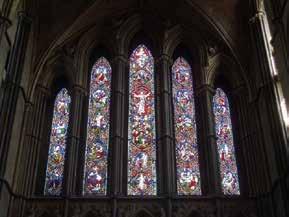
I stand here in a crossfire of colour. Walls of stone with veils of light, A surreal window into the partition of history.
I move, to discern the colours of the past Filtered through our understanding. His face lit by a dusty crown of light.
Alone I see it all: His infinite suffering, His forgiveness vanquishing cruelty, His omnipresent love.
Even at this heavy hour When time will forever cease to pass He speaks of salvation for other souls.
I see the pain of a mother beholding her son Soon to be parted from her, a Relationship wrapped in bonds eternal.
Our sins as wood borne upon His shoulders, He sees our abandonment of the Lord. Is this truly the will of Scripture?
The blood destined to redeem cascades, His spiritual distress becomes physical. His mission of fulfilment: it is finished.
The heavens split with grief for his pain. The willing, obedient Son’s spirit Now with the Father in empyreal reunion.
The picture shifts and I stand alone
At His still, cold likeness. But the moment Is framed in all of us, renewing evermore
Gold Arts Award is the highest level of Trinity College’s unique suite of qualifications designed to help young people grow as artists. It sits at Level 3 on the Regulated Qualifications Framework (RQF) and is recognised on the UCAS Tariff. Gold has been designed for young people aged 16 to 25. This essay on Jazz was written as part of that qualification.
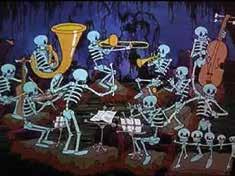
Jazz in Havana is seen as more than a form of music, but instead a way of life. The music is an alarm to wake up the city and does not stop until the early morning. This obsession is where my article begins. Despite the game-changing, unpredictable nature of jazz music, it is sadly dying on a global scale. It is as if the music is confined to this tropical island by musical prejudice and snobbery.
The window between 1917 and 1926 is often referred to as the ‘Roaring Twenties’ or ‘The Jazz Age’. It was a period of sustained economic prosperity, meaning a distinctive cultural edge could develop in the form of fashion and in particular jazz. The 1929 Great Depression was thought to threaten the development of jazz, but the motto “you can’t be sad and dance at the same time” resonated across the country, meaning jazz lived on. Coming out of the Depression, artists like Louis Armstrong, Nat King Cole and The Rat Pack shone through. Unfortunately, the predecessors for these new musicians, as they were for the artists of the Jazz Era, have not emerged to the same extent. This has only resulted in a new jazz standard being written – ‘A Requiem for Jazz’.
The decline of ‘consumption’ of jazz can be seen ever since its downfall in 1960s.
Free Jazz is seen as being an ‘acquired’ taste, due to its lack of repetition and clear melody line. This new form of ‘avant-garde’ jazz made the genre more exclusive and people searched for an inclusive, simple melody line. This was ‘catered’ for by artists like The Who and Jimmy Hendrix. In my opinion, another reason for the
decline in the genre is due to music taking influence from what is ‘outrageous’. An example is punk, which influenced how people dressed, danced, their beliefs and therefore their behaviour. Like punk and a lot of forms of music, jazz gave identity to a select group of people, this group being black slaves. Jazz music (Blues) meant that the slaves could express their feelings and traditions, in a nonviolent opposition to the white slave traders who would listen to classical ‘white’ music. This identity for black people was seen later on in history during the American civil rights movement. The music was enjoyed universally, instead of just by black people, and so was used as an example of how a country of many races can be unified through music. This identity was, however, lost as jazz moved towards being avant-garde. This toxic progression meant jazz had become music which older people listened to, giving it a lack of momentum. In some ways, it had become the new classical music which jazz music once opposed.
Here comes the question: “Should jazz be allowed to ‘die’ like Payton famously said it should?” This view that music of the past should be kept in the archives and seen as history is familiar to many people. However, this argument implies that the people that are playing the music are only doing so to preserve history. Just because the music once had many times the scale of audience members it does today, does not mean that the music has ‘died’, and therefore playing the music is not a re-enactment of a historical event. Jazz is one of a very few forms of music today which really showcase musicianship. ‘True Jazz’ is fully improvised, meaning only the best can succeed in the jazz industry. This is something in history which should always be remembered, especially due to the comparative lack of musical talent and extreme commercialisation of current popular music. The skills of jazz musicianship are vital for the success of music in the future.
As we spread His message.
Isobel Cree, Creighton House
Why prefer
an original painting to an excellent
Once upon a time in ancient Greece, a philosopher called Diogenes of Sinope searched for a true and honest man who would not lie or steal. Like Diogenes, we too search for truth and we find this in the colours, lines and images in an original painting. In ancient Greece, the meaning of the word truth was unconcealment, uncovering what was previously hidden. Philosophers have been searching ever since for reality, trying to see through the veil of perception.
In order to understand our appreciation and search for the true story, the reality presented to us in an original painting, we need to go back into history and contemplate the world of the painter in former times. Imagine the Dutch master painter Rembrandt van Rijn sitting in his picturesque town house in the 1650s in front of his easel, his assistants mixing paint for him from linseed oil and pigments. He is painting a model carefully positioned in front of him or an object which means something special to him: a carefully selected botanical specimen, a marble statue, or a scene from his imagination. Before he has even started painting, the atmosphere and his surroundings convey themselves to his very touch on the canvas. How can a copy even begin to embody these sensations?
An original picture touches our very senses: our sight of the glistening colours, our touch when we feel the uneven textures of the paint, the smell of linseed on canvas. Only our ears are unaffected, although even they are influenced by the silence and sounds of muffled footsteps around us. No two-dimensional copy can ever reach out to us in this way. Meanwhile, Rembrandt’s helpers are mixing deep red pigment from madder roots boiled in alum, carefully adding potassium hydroxide followed by aluminium hydroxide. Can the infinite variations in this process ever be imitated? The intricate layering and colouring of the original can never be replicated in a copy. In Francois Lemoyne’s famous painting of Time Saving Truth from Falsehood and Envy, he links falsehood and envy, the forger envious of the artist’s skills and talents seeking to gain fame and fortune through false imitation.
One of the main reasons why art is special is the way it provides a visual representation of the artist’s inspirations, of their current mood and influences, whether they are political, emotional or perceptual. All are conveyed through a brush stroke on a canvas, the scratch of their etching tool on a waxed board, the line of a pencil in a sketchbook. When we look at a painting, even with limited understanding of its history we cannot help but feel a strange tingling, a special connection and proximity to the painter.
This is the first two sections of an Independent Study, written for A level History
Richard III’s reputation has varied across the centuries since his brief reign. The Tudors like Thomas More and early critics like David Hume labelled Richard a deformed ruthless murderer whose longstanding ambition for the throne means he deserves his evil reputation. This contrasts with more recent viewpoints of scholars like Caroline Halstead and Sir Clements Markham that separates the man from the myth fueled by Tudor propaganda, a view promoted by the Richard III Society. On balance, while apparently likely that Richard killed the Princes in the Tower, this act does not define his entire character; his motivation in doing so was not one of evil long-standing ambition as is commonly thought. Rather, like A.R. Myers argued, Richard was more
Art is like music; it captures a piece of the artist, their moment and story trapped and preserved for ever. You can mould it, shape it, but if it has not been created by the composer, it will never be anything other than a pale shadow of the original creation. A copy is as fake as the person who made it as they did not experience the life, the feelings or the emotions of the creator. Copies do not have any magic about them, the inspirations of the upbringing and culture of the artist: their family, their background, the embodiment of their emotions. In a reproduction, none of these feelings or history are present as the imitator has not felt these feelings themselves. It is like a piece of music, a poem, a novel: it is the person who created it who makes it personal, who makes it so much more than an imitation.
In the seventeenth century, the philosopher John Locke suggested that human understanding is like a closet with small gaps in the sides letting in glimpses of the outside world. He thought that we view the world like this, as if looking at the world through a cloud. A copy is like this, a poor representation of the real painting, lacking energy and life because of the lack of the feelings, thoughts and images from the real painter which no one else can recreate. It therefore seems dead and lifeless.
Behind every painting there is a story, a Greek myth or an experience of the painter. In Rembrandt’s time, a historical painter knew the stories he sought to draw down to the smallest detail. In order to make it look real, the artist had to be able to paint the characters’ emotions. Rembrandt pulled faces in the mirror to see how his expressions changed with his mood, helping him to show the emotions on the canvas. As a result, the faces of his characters almost look alive.
There are times however, when a copy may still contain an element of life. For example, when Rembrandt’s students copied his paintings for practice. Here, the same colours were available to them as the ones used by their master and it can be quite hard to distinguish these copies from works created by Rembrandt himself. In a painting of Rembrandt’s wife Saskia, one of her hands is bigger than the other and if you look very closely it is possible to see a line across the canvas where a student may have finished the piece. When looking at this painting, I tried to work out how it made me feel and somehow the bottom half did not exude the same aura as the top. It seemed to me that this was because only Rembrandt would have felt his love, pain and unhappiness when his beautiful wife died so young.
Art shows a personal idea of an artist and is associated with beauty. When an artist is painting, their mind is filling up with thoughts and feelings inspired by their surroundings; these will never be repeated, these exact seconds and moments in time. We can research to find out what may have been happening at this point in time in a person’s life but we will never be able to understand these fully. It is like in the world of music where the interpretation of a piano piece has to be your own. If you copy someone else’s performance, the piece of music will never come across as your own; you will fail to convince the audience and will not be able to communicate with them. Like in music where you try to use the music to ‘speak’ to your audience, the way in which the artist communicates through their painting is the key to a successful piece of art.
Being true to yourself, bringing in your own life and feelings, living your own story: all these are aspects of original art and convey authenticity and truthfulness. The opposite of truth is falsehood and a copy is inherently false. Friedrich Nietzsche suggested that the whole of Western intellectual tradition is based upon an ancient belief that truth is divine. A copy cannot be perfectly true to the original. Saying that a copy is as good as the original is like saying that a photograph of the Alps can replace the
wonder of seeing the majestic Mont Blanc towering above you. No photograph can recreate the amazement you feel when you first see how enormous the mountain is in real life.
The Greeks believed that art was a mirror of the beauty in nature. Plato regarded art as a poor imitation of the beauty of the world; what would he think of a mere copy? A copy is an imitation of an imitation: it lacks the originality and special creative genius of the master. An artist puts something of themself into the painting, seeking to express an idea - something no one else can express. A copy may be able to portray an image but it will not create the same atmosphere and sensations, however amateurish the painting may have been. Try copying even a child’s first painting and you will see how impossible it is to capture the special feeling of the original.
Just as Diogenes walked around the Agora of Athens searching for his honest man using the light of his lantern to uncover the truth, we too instinctively value the true expression of feelings we see when looking at an original painting. As Leonardo da Vinci said, “Where the spirit does not work with the hand there is no art.”
likely to have been capable of good who, given more time, could have “overlaid with success and good deeds the memory of his path to the throne” and been a great king. Many accusations against Richard, like the claim that he killed his wife, are likely false and instead of the deformed monster he is often perceived as, it seems that he does not deserve the evil reputation traditionally attributed to him.
The assumption that Richard murdered his nephews in the Tower is a key contributor in why historians believe Richard deserves his evil reputation. To support this, some historians cite accounts like that of Thomas More who states “without any respect to God or the world, [Richard] unnaturally
contrived to bereave them, not only of their dignity, but also their lives”, doing so out of evil ambition. This illustrates that Thomas More clearly believed that Richard conspired to kill his nephews. However, Richard’s guilt is disputable as Thomas More’s damning account is very unreliable. More even admits to drawing on rumours, basing his account on that which he has “heard by such men”. Furthermore, it was written to endorse the Tudor dynasty to which he was loyal and approximately thirty years after Richard’s reign. Thus his reliance on others’ accounts becomes an obstacle to identifying the true facts. He is likely to have based his account on that of John Morton, a known opponent of Richard III (he would later go on to be appointed
as the Archbishop of Canterbury under Henry VII) in whose household he had served as a page from 1489 to 1492, and other known enemies of Richard: Bishop Fox and Christopher Urswick. Besides the issue of provenance of the information, it could be argued that More’s account was intended to be dramatic, similar to that of Shakespeare. “His story is much more like a drama, unfolded in magnificent prose, for which fidelity to historical fact is scarcely relevant”. However, despite the dangers of taking Tudor accounts as fact, it seems careless to dismiss them out of hand. Such dramatic vilification of Richard’s involvement with the Princes was based on popular belief and contemporary accounts such as those of Robert Ricart (who says
the Princes were “put to silence”), Casper Weinrich of Danzig and Dominic Mancini who even reports that “the young king, like a victim prepared for sacrifice, sought remission of his sins…because he believed that death was facing him”. The fact that such accounts were so widespread could suggest that Richard killed the Princes, or at least that they were killed on his orders, perhaps smothered by Richard’s servant James Tyrell, as was also rumoured at the time. While some historians, like Sir Clements Markham, have passionately defended Richard against this accusation, their justification is not convincing. Markham claimed the true murderer of the Princes to be Henry VII. Yet this argument is flawed. “It is incredible to
ascribe every rumour of such a deed to the malevolence and ubiquity of Bishop Morton and the diabolical cunning of Henry VII” and furthermore, “there is not so much as a hint in any source that the boys were in fact murdered by Henry VII”. Thus it seems more likely that Richard was responsible for the deaths of the Princes and in this respect may deserve his evil reputation, as he seems to have attempted to remove obstacles to his path to the throne, exhibiting a ruthless and ambitious manner.
The Maths Department has run three individual challenges, three school teams and two internal team competitions, alongside the House Countdown competitions and “Who wants to be a maths millionaire” for the Lower Removes.
The Senior Maths Challenge was held in November and a number of our Sixth form mathematicians took part. Emily Hodkin scored the highest mark in the school, earning herself a gold certificate and a place in the coveted British Olympiad. There were nine golds awarded in total, as well as eight silver and ten bronze certificates.
The Intermediate Maths Challenge was held in February, with 16 gold, 29 silver and 42 bronze certificates awarded! The best in school was Charlie Mackintosh, who won a place in the prestigious Olympiad round.
Throughout the year we have held our annual team challenges. There is an interform challenge for L4 and U4 and an interhouse challenge for the removes. These are hotly contested events held in College Hall and consist of four rounds. There are two group rounds in which the teams work on a number of problems either in groups or individually, a group circus in which the teams have a limited time to solve a series of more visual problems, and then the frenetic relay round which involves a great deal of running around as well as maths!
The U4 Inter-Form Maths Team Challenge took place in November and was another hard fought event. The lead changed at each round which made for a very exciting contest. Congratulations to the winning team: Sophie Pitts, Becky Ye, Henry Halford and Bobby Riddell. The Lower Fourth Maths Team Challenge was another exciting event with the lead changing after the first and

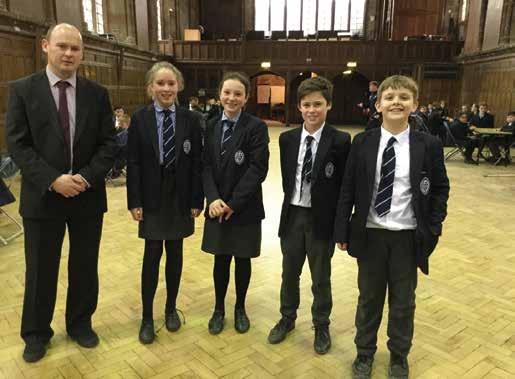
theme
second rounds. Congratulations to the winning team of Jack Janes, Josh Carr, Lucy Pritchard and Millie Davis.
In April, a large number of fourth formers took part in the Junior Maths Challenge. They achieved 13 gold certificates, 28 silver and 28 bronze, with Matthew Kimber scoring the highest mark in the school.
A team of four mathematicians took part in the regional round of the Junior Maths Team Challenge at Earl Mortimer College, Leominster. The team (Becky Ye, Henry Halford, Jamie Elsdon and Cerys Osborn) took part in four rounds of competitions involving a group round, a cross-number, a shuttle race and a team relay. They got off to a fantastic start with full marks in the Group round! The team from King’s came a commendable second, narrowly missing out on a trip to London for the national final.
On 20th June Henny Hodges and Jamie Elsdon competed in the world final of the Maths in Motion competition. Having engineered their own virtual race cars, pupils from the King’s Maths in Motion teams have competed in a series of grand prix events against teams from fourteen countries battling their way through the heats and semi-finals. The World final was broadcast live at on the Maths in Motion YouTube Channel! Once the “official envelope” was opened, they had just 90 minutes to prepare their virtual car and decide on the optimum settings. Given that a number of other schools miscalculated and did not finish, Henny and Jamie should be very proud of their finishing position of 7th in the world! This year, around 100,000 pupils from 13 countries initially registered to compete in the challenge, so Henny and Jamie’s achievement, along with that of other pupils from the King’s’ team, is certainly worthy of celebration!
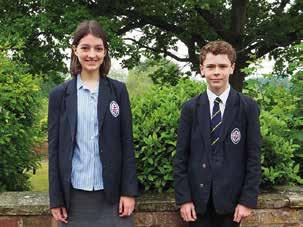
An A level essay, written in Spanish and translated from the original by the author
For a century, we have read the poetry of Federico García Lorca and we lack sufficient evidence to arrive at a homosexual interpretation of his work. On the other hand, it must be added that his sexual orientation forms part of the diverse themes.
Firstly, “Ode to Salvador Dalí” tackles the relationship “which unites us”. These words worship Dalí in a way in which many scholars believe that this text acts as an implicit love letter. The journalist Víctor Fernandez highlights the fact that “Lorca didn’t do anything like that for anyone else”. In truth, it appears Lorca wished to express his anguish over his rejection by Dalí.
What is certain is that if homophobia had not come from his family, the poems would have been less heavily censored. When analyzing the context of the “Sonnets of Dark Love”, one realizes that Federico’s brother, Francisco, insisted on editing the sonnets in order that they don’t present the theme of a forbidden love. The poet
attempted to justify his feelings in this book, writing “For I am love, I am nature!” which indirectly alludes to the homophobic mentality.
On the contrary, Lorca’s oeuvre is full of symbols of life, using music. The metaphor “Hear my ruined blood in the violins!” conveys the idea that to live is to hurt, and that relativity expresses this concept. A principal theme of this piece of writing is suffering, not necessarily homosexuality. Lorca experienced a “ruined” outlook during the whole song of his life.
Similarly, the theme of death and religion runs in Lorquian poetry, especially given the “great invisible fight before entering the Garden”. One can maintain that this deals with homosexuality in a religious context. Being what it may, Lorca writes about limited time and eternity with respect to his mysterious torments.

In summary, I have the impression that poetry was an escape for this man who was “destined to desire and not be able to receive”. His homosexuality therefore became a veiled but strong theme in his poems, which discuss how one defines nature and pain.
“Science without religion is lame, religion without science is blind.”
Say that yesterday I had entered my kitchen to find my brother and sister stood next to the kettle, which had just begun to boil, and I asked them why the kettle was boiling. My sister, a budding physician, may tell me that the increased water temperature within the kettle had caused the forces of attraction to break within the water molecules, thus transforming them into gas molecules, also known as steam. My brother, a simpler soul, may tell me that the kettle is simply boiling because he fancied a cup of tea.
Both answers are right but just take two different perspectives on the same question. In the same way I think that science and religion give two different perspectives on the universe, helping to show us the bigger overall picture.
The big overarching question that both science and religion seek to answer is: why? Take, for instance, possibly the biggest ‘why’ question there is, where science and religion are famed for having conflicting views: why is there something rather than nothing? Speaking generally of course, a scientist may outline the idea of the Big Bang Theory, whilst a religious person may speak of a greater purpose and
divine cause behind the universe that now exists. Both answers are clearly speaking about different things but I do not think that this puts the answers in conflict or means that one answer must be right and therefore the other wrong.
As Keith Fox, Professor of Biochemistry at Southampton University says in his article ‘The Science and Faith Debate,’ only a few prominent scientists boast that science has eliminated any need for a belief in God, and only a few religious people see science as part of a ‘grand atheist agenda.’
Nevertheless, the assumption remains popular, that science and religion are opposed.
Isaiah Berlin claims that there are three categories of belief. Firstly, beliefs that can be proven by logic; secondly, beliefs that can be proven by observation; and thirdly, beliefs that cannot be proven at all. Berlin then proceeds to point out that all the significant beliefs that we hold fall into the third category. This may appear irrational but it seems to me that we do live in a world where we cannot prove the things that really matter.
Some religious people take the view that science’s explanations of occurrences in the world take away from the splendour of them but does my understanding that rainbows are just refractions and reflections of light in raindrops make experiencing a rainbow any less aweinspiring? I think it is safe to say that the answer to this is no. You could even argue that having the knowledge of how things work makes them even more aweinspiring. The Bible commends those who study God’s creation. Psalm 111:2 suggests that studying ‘the works of the Lord’ is a natural response to delighting in creation. It reads: ‘Great are the works of the Lord; they are studied by all who delight in them.’
Einstein said that ‘science without religion is lame; religion without science is blind’ and that ‘science can only ascertain what is, but not what should be.’ We need more than just science. We want to know not just how things work but what they mean. It seems to me that far from being in conflict with each other, having a well-informed understanding of both science and religion is the only way to truly understand ourselves and the universe around us.
Isobel Unwin, Kittermaster House


After seven months and many long hours in the design studio and workshops EDGE 4x4 (Ed Cosson, Toby Weymouth, Alfie Parry, Ed Robins and Eli Edwards) had a complete radio controlled vehicle to take to the Central Regional Heat held in Birmingham. They won 1st place in the ‘Professional Class’ competition (build your own vehicle from scratch) and were thoroughly delighted to win ‘Best Engineered Vehicle’ and ‘Best Track Performance’.
The 22 winning professional class teams from around the country met in the British Motor Museum at Gaydon in March to compete for the UK National 4x4 Challenge trophy. A number of vehicles impressed the judges on the Land Rover test tracks but it was EDGE’s controlled driving that completed a nearly perfect performance of 98/100. Unfortunately a poorly designed tow bar caused the trailer they were towing to jack knife losing them valuable points and the ‘Best Track Performance’ trophy.
“I was really pleased how they worked as a team and kept on encouraging each other when the going got tough. As for me I was so nervous for them I could hardly watch!”
Eight teams of Lower Sixth Business students presented the highlights of their business plans to an audience including three ‘Dragons’ from outside of school. This was particularly nerve-wracking given the experience of the Dragons (for example, one of them, Martin Sharples, had run Amazon’s operation in the UK. We only had three weeks to come up with a business idea and to produce a business plan. We then had to ‘sell’ our ideas to the Dragons who judged us on the criteria including the quality of business plan, effectiveness of presentation and the handling of questions.
This event was held to consolidate the work that students have done in the first year of studying A-level Business. We also developed the type of skills and confidence that are needed in the real business world. Personal qualities of energy, drive, creativity, communication, resilience under pressure and the ability to work with others were tested and developed. There were some interesting ideas ranging from low sugar smoothies, a social enterprise that had teamed up with Maggs Day Centre and
The pit display looked very crisp with a range of information about the team, their sponsors and the engineering solutions needed to design the vehicle. Two television screens played videos about the development and testing programme undertaken to promote the vehicle’s allterrain attributes just like a full size 4x4 vehicle. The pit stand also contained many of the parts used to develop the body including vacuum forming moulds used to create the different bodies. The judges were very impressed with their technical understanding of how the parts worked and could explain in detail how they were manufactured. The body wowed the judges with its professional finish and on board computer which managed the sensors lights. All this work enabled them to win the prize for ‘Best Pit Display’.
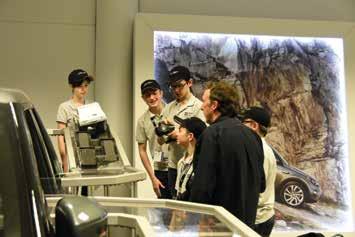
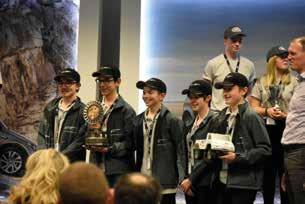
then interviewed live on air while their supporters watched a few metres away or listened to the broadcast live.
As the results were announced live on ITV and Youtube channels it became apparent EDGE 4x4 were a strong contender to win the National Champion trophy so the last few minutes where nail biting. After 2nd place was awarded it was clear that EDGE 4x4 had won to become UK National Champions - 4x4 In Schools Technology Challenge. The team were
As National champions they are eligible to compete in the World Final next year.
The winners also received a £1000 sponsorship grant to Harper Adams University.

a shower head with a brush attachment. All teams had different styles of presenting and had to think quickly on the spot to answer tricky questions posed by the Dragons.
In our team, the first thing we had to do was to decide on the business idea that we were going to pitch. We brain-stormed various ideas but eventually settled with the concept of a grocery shop called The Misshape Shop which sold “wonky” fruit and vegetables. We spent a lot of time writing the business plan which had to include an executive summary and a marketing, financial, operations and human resource plan. Once the plan was completed, we started the work on our presentation, which had to be carefully timed to last 5-6 minutes.
Our team adopted a professional approach and successfully answered all the Dragons’ questions calmly and methodically under pressure, but the Dragons picked up on every little detail! This meant that some groups had to think hard about the answers that they gave. Unfortunately, our team narrowly
lost out on first place to Cerys Preston and Georgia Sandels of The Skinny Smoothie Company. Cerys and Georgia won the Dragons over with their slick marketing and impressive product samples.
Overall, the experience was very enjoyable and we learnt a lot on the way. Even though it was stressful at times, we came out of the experience feeling more confident and aware of how difficult business can be in real-life scenarios. We encourage next year’s Business students to get involved and start thinking of the next big business idea soon!
Marguerite Bullock and Anna Jethwa, Oswald House
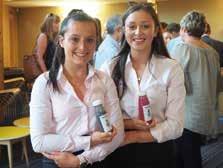
With Mediterranean-like weather in the UK and the prospect of things being more unsettled in France, it seemed a pity to be leaving Worcester. Nonetheless, around twenty hours later GCSE geographers on the Alps Trip of 2018 arrived at Le Bettex, a small alpine resort at 1400m.
After a welcome lunch overlooking the impressive Mt Blanc Massif, work booklets were out and our first outdoor classroom was found at 1800m where we explored the formation and economic use of the Alps.
In the morning we were treated to a glorious sunrise over Mt Blanc followed by an outside breakfast before making a short journey to the Chamonix Valley. On arrival, we took advantage of the extensive cable car network to ascend Le Brévent (2525m) for a lesson on accumulation, ablation and glacier formation using the dramatic backdrop of Mt Blanc which rivalled any textbook. Later in the day, a train ride on

the Montenvers funicular railway took us to France’s largest glacier, the Mer de Glace. Venturing into ice caves carved into the glacier was a real highlight as not only did it reveal fragments of moraine and bubbles of air that were hundreds of years old, the descent itself illustrated so effectively the effects of climate change as we passed signs that marked former positions of the glacier. On our return to the Chamonix valley, temperatures were noticeably higher and the next hour was spent having great fun on a luge before returning for a well-deserved meal.
With better weather the next day, we seized the opportunity to summit the impressive Aiguille du Midi by cable car, climbing 2,800m in minutes. The panoramic views from 3,840m were spectacular and gave the staff enough teaching material for several hours! Many photos later we descended to the Plan du Midi and then took a gentle

in views along the way of glacial troughs, corries, hanging valleys and truncated spurs. That night the group must have been tired as the majority slept through an incredibly dramatic thunderstorm with lighting that lit up the Alpine sky.
The following morning we caught the Tramway du Mont Blanc and once again work booklets were out in inspiring mountain surroundings, this time below the Glacier du Bionnassay. There the group learnt about crevasses, moraines and glacial snouts before eating lunch on a lateral moraine. A swim in Lake Passey, with the dramatic backdrop of the Mt Blanc range, was an enjoyable and memorable way to spend the afternoon.
Our final day was more relaxed and gave everyone the opportunity to enjoy some down time as well as finish off a few written tasks.
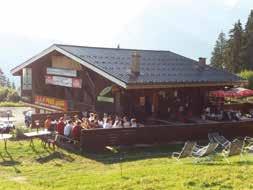

A busy first day welcomed us to Berlin, as was expected by the veterans of this trip. Having arrived late on December 14th, our trip truly began on the morning of the 15th. We arrived at a comparatively late 9am at the Tränenpalast, where the group learned about daily life in the shadow of Germany’s division. Having exhausted the resources of this former train station, a 30 minute tram ride took us to the Notaufnahmelager Marienfelde to continue our learning on the topic. The memorial at the site of this former refugee transit camp provided food for thought; the contemporary relevance was not lost on us.
After a visit to the Berlin Wall Memorial, our journey into the East-West divide took a brief pause as we reached the iconic Brandenburg Gate, a symbol of not only Germany’s tumultuous history, but also European unity and peace. We then travelled from this memorial to another; the next honoured an incredibly different period of German history, and unquestionably its most harrowing. 2,177 concrete steles, varied in size, cover 4.7 acres of undulating ground to form Berlin’s Memorial to the Murdered Jews of Europe, a focal point for the Holocaust memorials found in the city. Walking through the disorientating and narrow alleys created a feeling of isolation and uneasiness which was felt by the group; surrounded by thousands of disconcerting, grave-like blocks, we were certainly forced to think. Käthe Kollwitz’s Mutter mit totem Sohn sculpture was next on our itinerary, which brought our A-Level studies of art and architecture to life, a feeling that carried on with us as we went on to explore the Deutsches Historisches Museum.

After a busy day, a meal of traditional Rhenish food at the Ständige Vertretung was well appreciated by all of us; we then returned, tired out, to the hostel, for a drink of Glühwein or Pilsner to conclude our first day.
Largely energised after a well-deserved sleep and excited for the day that lay ahead, we arrived at the Reichstagsgebäude at 7.30am for a tour by a charming and informative guide. Dr Angela Merkel’s office, Russian war graffiti, and the purple-seated Plenarsaal were some of the highlights, topped off (much like the building itself) with a visit to Norman Foster’s glass dome. The transparency of this glass structure atop the Parliament building is richly symbolic of Germany’s move from dictatorship towards democracy.
- certainly made some of the difficulties of grammar niches worth the struggle.
After a pasta meal at the aptly named Pasta restaurant, we again returned to the hostel, this time via the DDR Museum, for a light snack and another well-deserved night’s sleep.
We began our third day with a touch of atmospheric but not transport-busting snow, which was thankfully more manageable than what we had just experienced at home, as we trekked to the Checkpoint Charlie Mauermuseum. We then left for Hohenschönhausen, a former Stasi prison - here we had another guided tour, led by a former prisoner of the Stasi who had been interrogated and incarcerated in the very same building for protesting against the regime. Once we had accustomed ourselves to his dialect, his tales gripped us all. To hear his story personally was invaluable.
Interests in German history clearly not waning, we delved deeper into the history of the East German state at the Stasi Museum; this provided ample information for IRP research, as well as the chance to see the authentic office of the head of the Stasi, Erich Mielke.
Again the group split, as the Lower Sixth headed to the Olympiastadion, a foreboding construction of the Nazi era, whilst the Upper Sixth took the opportunity to visit the iconic Fernsehturm; here we were provided with a stunning view of the entire city from the observation deck, one of the many joys of Berlin.
The harsh reality of the Wall was humanised by creative art pieces covering the otherwise grey concrete.
Perhaps influenced by the period of history we had focused on the day before, the group split, with the Upper Sixth visiting the Film Museum for IRP research, and the Lower Sixth visiting the Bauhaus Archiv for an undoubtedly thrilling couple of hours. We met again at the Topography of Terror, which detailed the history of oppression under the Nazis; the necessity and effect of open discussion about Germany’s often disturbing past became clear to us as we actually saw the headquarters, and with this the reality, of much of the regime’s brutality.
For some light relief after another intensive day we travelled a short while to the Ratibor Theater, to watch an improv “Gurke oder Banane” show by the ever amusing Gorillas group. This German comedy - as surprising a concept as this may have seemed to some
The colourful East Side Gallery provided a backdrop, if not a focus, for our further travel. The harsh reality of the Wall was humanised by creative art pieces covering the otherwise grey concrete. Delicious traditional food (or salad for the more particular among us) at the Schöneberge Weltlaterne followed this walk, after which we returned to the hostel where the evening continued, especially for those of us who had particularly taken a liking to the Brandenburg Gate, who decided a late night visit was on the cards.
Clearly tired out from our prior days of escapades, we reconvened at the Deutsches Historisches Museum again, for a lazy wander through all periods of German history. We ended our trip with a trip to the cinema - arguably providing an insight into German culture just as important as those we had gained at museums - to watch the latest instalment of the F J Göhte trilogy. Some of us feasting on sugared almonds, others dozing off, the film provided a comfortable (and thankfully undramatic) end to our trip.
Not unaccustomed by this point to early starts, we somehow managed to be up by 6.45, ready to travel to the airport for an uneventful yet somehow exhausting flight home. Though Worcester may not be quite the vibrant city that is Berlin, the more restful days that followed were invaluable as we returned back to normality, with the memory of those exciting few days in the cultural metropolis always remaining with us.
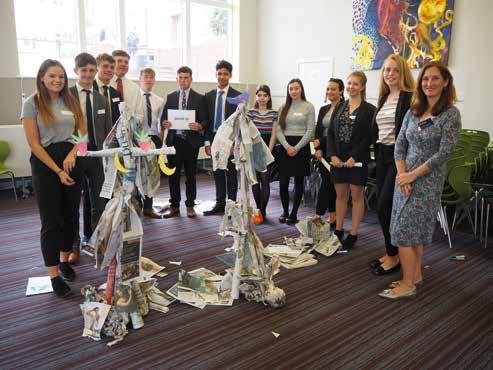
attributes vital to the work place, including communication, enterprise and leadership.
Aided by external business advisors, all with knowledge and expertise in their chosen fields, the different teams began the day with The Paper Tree Challenge. The aim of the challenge was simple; build the tallest trees possible using only the materials given, attaching different items (including fruit and a bird of paradise!) from the structures built. Trees were graded on stability, size and creativity. After the first challenge, the whole year listened to a talk on entrepreneurship by our keynote speaker, Adrian Burden, a successful businessman, who told the story of his experience with a multinational, high technology start-up company and the benefits of self-employment.

The morning concluded with the largest part of the day, The Notepad Challenge.
Groups were given a brief, namely that they were the management team of a young, dynamic stationery manufacturer looking to grow their business by finding new retail outlets to stock and sell their product, a notepad, in the UK. Groups were then tasked with organising themselves to design, price and produce as many small notepads as possible. This
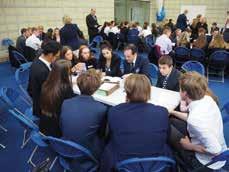
gave an excellent insight into all functional areas of a business; finance, operations, marketing, sales and human resources. Having chosen the quality, purpose and idea behind their product every group then had to present and pitch their notepad to a potential stationery retailer, PensRus. The sales team from each company attempted to persuade the buyers that their product was worth stocking. Having been scored on a number of elements including teamwork, design being appropriate to the target audience, correct costings, production sample pass rate and presentation content and impact, the buyers placed orders with the three most successful teams. The result portrayed the overall importance of effective teamwork, as without all members of the group pulling together all other elements of the task suffered. After lunch, business advisors led a range of fun exercises, including a touch of origami (!), bringing home the importance of nonverbal communication and body language to building effective communication in the world of work.
The day was enjoyable, informative and provided many opportunities for us all to reflect on our own strengths and weakness. Many thanks to the business advisors for their time and their boundless energy and enthusiasm during the day and to the Careers Department and support staff for organising and running the event.
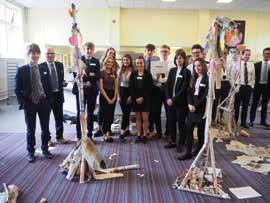

One of the school’s aims is to develop unselfish young people and the opportunities to raise funds for charity and serve the local community are major activities at King’s undertaken with enthusiasm by numerous groups, individuals, clubs, pastoral units and on a whole school basis.
The Sixth Form Charity Committee is a large group of committed, active and imaginative students and staff who have enjoyed the year’s activities, a mixture of fund-raising and community events.
The committee organised the annual ‘Pink Day’ for Worcestershire Breast Unit Haven, with the Sixth form wearing pink and painting faces, a pink cake sale and the selling of pink ribbons, bags and pink pens. Exit collections after musical and theatrical events raised money for the Worcester Headway group, a charity devoted to helping those affected by head injuries and the Sick Children’s Trust which provides free, high-quality ‘Home from Home’ accommodation, as well as emotional and practical support, to families with sick children in hospital in the UK. UNICEF’s efforts to support children caught up in environmental disasters was sent proceeds from a number of activities including a fun run, which is now an annual event. Activities for our environmentally themed ‘Green Day’ included a new initiative of selling recycled plastic bottles which we make into pencil cases and other items. Funds were sent to The Plastic Soup Foundation and to Water Aid.
Cancer Research was the focus of fund -raising in the spring term, not only by the Sixth Form Charity Committee and their support for the Fourth Form Disco, but from
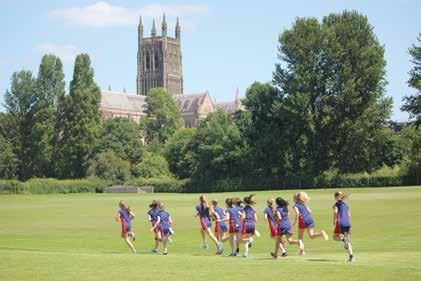
the LAMDA showcase event and from U4D’s digital detox’. The Fourth Forms 5k races this year, run in fancy dress in the summer term, also supported cancer charities.
Collections after the Christmas carol service allowed large amounts of money to be sent to the homeless charity Shelter and the Children’s Liver Disease Foundation.
The charity committee worked very hard to organise the annual Christmas party for senior citizens. We had record numbers who wanted to come, a great programme of entertainment in rehearsal, including songs from the outstanding production of South Pacific, a new initiative in the form of a bingo game with a great prize of a beauty treatment donated by a considerate parent, fabulous decorations for the dining room, a well-rehearsed elf choir to lead the carol singing, an eagerly anticipated visit from Father Christmas who had his suit and padding all ready, more than enough luxury raffle prizes brought in by students and a delicious Christmas tea prepared. It was a massive disappointment to many that we had to cancel the party because of the extremely cold and snowy weather.
The annual garden party for Fort Royal Community School, which caters for children with special needs, is the second community event of the year and for the first time it was relocated to Fort Royal School, which presented some new challenges for us, but it was hailed as a tremendous success by the staff of the school and the 115 members of the Lower Sixth who volunteered to be involved. A carnival atmosphere on an extremely hot day was created with bouncy castles, singing and drama performances, a science show, dance, face-painting, art, beach games, sport and a quiet tent with

a sensory unit, along with Mr Tom Foolery who performed a magic show and a Punch and Judy show and made countless animals, flowers and swords out of balloons,. Everyone had a wonderful time.
The newly formed Removes Charity Committee has been very active this year with a small, but perfectly formed and very keen group of Lower Removes who organised the Children in Need ‘Spotacular’, collecting the old round pounds and arranging the non-uniform day.
Just before Christmas they appealed for food and household items and collected a third of a ton of food and groceries, providing about 350 meals which was delivered to a grateful Worcester Foodbank.
The Removes held a World Wildlife Fund day in the Spring term, selling cakes and running animal-themed competitions, before an after-school event in the boat house with a competitive element symbolising the race against time to save endangered species, and extended their bid to help save the planet by supporting The Sixth Form Committee’s work on recycling plastics for Green Day with their head-phones boxes. Their last event of the year, a mouth-watering cake sale, was to help a local charity called Spectrum Days which aims to promote and protect the physical and mental health of people with Profound and Multiple Learning Disabilities in Worcestershire and the surrounding area.
Country Air Ambulance, Women versus Cancer, animal charities and an Epilepsy charity were among the charities which have benefitted from the efforts of forms and individuals.
The other major charitable event of the year was the school fete, which took place on a hot and sunny day in May. It was a fantastic whole-school occasion organised by the Parents’ Committee. A proportion of the proceeds goes to charities nominated by pupils at King’s.
Two of the charities, which benefitted from funds raised, were suggested by
of four-year-old Grace who passed away in 2014 after being diagnosed with an aggressive form of cancer. The trust is working to raise awareness of the problem and provide grants to research into rare paediatric childhood tumours. We sent £1500 to this worthy cause. Young Minds, dedicated to improving the mental health of young people, is a charity the Sixth Form Charity Committee has raised money for
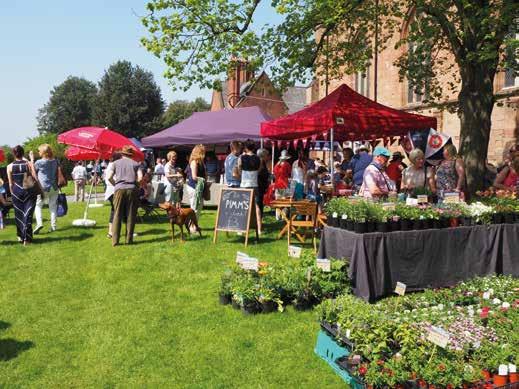
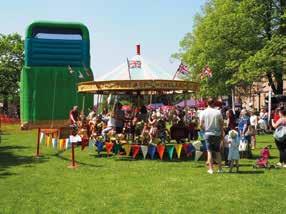
Chess Club has been very well attended this year, especially at Long Break when there have frequently been over thirty participants. Enthusiasm is high and standards have been improving. I hope that we will develop enough strong players to be able to field a junior team next academic year. The Lower Fourth individual competition was very successful, eventually being won by Josh Clarke who beat Jack Janes in a tense final. The Lower Fourths also played in a team competition, each tutor group fielding a team of three players.
Our successful links with Worcester City Chess Club continue, with their Academy taking place in the Keyes Building on Saturday mornings. Once more King’s also hosted the West Midlands Megafinal on 20th May, at which the following King’s Foundation pupils excelled: Will Lavarack was Under-7 first equal boy and Cameron Henry won all his games and was first in the Under-8 category.
MW
Christian Union has enjoyed an excellent year of games, studies and general biscuit and sweets eating. This year we followed a bible study on Thessalonians looking in detail at the trip Paul and Silas took and the lessons we can learn from this. We followed this with sessions on prayer, looking at many of the more challenging questions faced here such as “Why does God not answer all prayer?”.
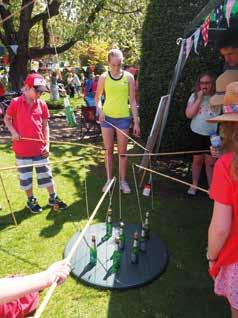
We were extremely unfortunate not to go on our annual weekend away at the new venue of The Pioneer Centre due to the snow we had earlier in the year. Lots of work had been put into planning the event, and we were all disappointed not to spend some good time away together. Hopefully this year’s preparation will give us a head start to planning the trip again next year.
The summer term consisted of once again more biscuit and sweet eating, studies on a few psalms and many games outside in the “secret gardens”, “Kings of the Hill” proving once again to be a popular game. We look forward to another enjoyable year next year!
Following much planning, training and anticipation the 16 strong group comprising 7 girls, 7 boys and 2 staff met at the bus bay very early one morning soon after the summer term ended. The long journey had begun and none of us expected it would have resulted in an unscheduled overnight stay in Paris following a technical fault with our connecting aeroplane. Finally arriving in San Jose a day later than we had hoped to, we were met by Mike, our guide. The final leg of our journey was made under the cover of night, so we arrived at the hotel with no preview of the beauty of our new surroundings. An early start the next day brought the first of our traditional Costa Rican rice, scrambled egg and fried plantain breakfasts, and a chance to examine the map and itinerary for the two weeks. Upon leaving the hotel and crossing the road, we were at the Pacific Ocean, and the start of our journey by foot, mountain bike and raft across the country to the Caribbean Sea.
We took to our bikes and started to head inland. The roads gradually gave way to

more and more demanding. The heat and humidity, though expected, wasn’t something easily prepared for. As the group became more acclimatised, momentum was quickly gained and we were on our way. Having left the beauty of the coast behind, it was clear from the humble beginnings that we were in for a treat with regard to the scenery inland. With regular stops for sustenance, progress was good and the next few days would be a mix of mountain biking and trekking. Briefed by the guide, and armed with handheld GPS, different members of the group took charge of our route each day and led us competently to our destination. After the initial night in a hotel, the next few would be spent camping. Each night we pitched our tents under the protection of a school shelter, barn roof or community centre, and this turned out to be very welcome since night time seemed to bring with it the most incredible weather. On three different occasions on the trip we were in the eye of a tropical storm and thunder was right upon us. Following a demanding day trekking, we peaked at the continental
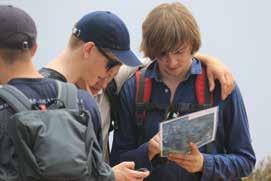
divide after emerging from thick rainforest. Reaching 2560 metres and almost being able see both the Pacific and the Caribbean was an achievement in itself. After a comfortable night playing bingo on top of the mountain, we set off on our bikes. This was a difficult but rewarding day. It was made challenging by some steep downhill sections on wet clay, but we arrived at a very welcoming hotel for a night to dry off and re-organise. We went out for a meal at a local restaurant and had a tremendous view of the electrical storm that ensued. We were back on the bikes for an early start the next day. After a few changes to our itinerary, owing to flooding and road closures, we spent a little more time on the bikes than anticipated.
As the journey continued, so too did the stormy weather. We reached the first of two fixed camps and did our best to dry off. The location of this venue could not have been any more picturesque. We were on the bank of the Pacuare River, in the middle of the rainforest. Not only were we remote by this stage, we were somewhat

at the mercy of Mother Nature. The river was moving far more aggressively than it had for years, the sky was moody and threatening, and we were experiencing more of the local wildlife than we had before. At night the tarantulas were poised half in and out of their holes in the grassy bank adjacent to our dinner table. Mike, our guide, assured us that we were not on the menu, but every reflection of eyes in the beam of a head torch kept the group wondering if we had frightened off the spiders’ preferred choice of prey!
We were here for two nights and we had a chance to relax a little by day. This was done reading in hammocks, playing cards, listening to music and we took a short hike up to a beautiful waterfall for a swim.
Moving on from here was originally going to be by raft but we would have to wait to take to the water until we were by a safer stretch of the river. This resulted in more trekking by foot, and then back onto the bicycles. The road that we cycled was busy with large trucks carrying bananas

and pineapples as the main highway was closed because of flooding and other damage caused by the storms. We took things carefully and made it to a safe point to join the river. We jumped into two rafts and paddled for 45 minutes before arriving at our next fixed camp. This was another beautiful environment, but this time, in amongst a banana plantation. The banana plants and bamboo were the height of houses and made the rainforest experience that bit more immersive. There was something demanding about the cold showers that had been on offer throughout the trip, but in this instance, it added something to the experience. The vine-covered bamboo enclosure, open to the beautiful sky with warm rain falling in as heavily as the offering from the shower itself was memorable.
We were straight into the rafts the following morning for the final leg of the epic journey. Several hours of paddling brought with it some incredible sights and sounds. We saw sloths, crocodiles and a variety of birds. We were also treated to the sights and sounds
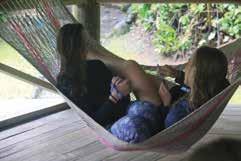

of howler monkeys as the river opened up towards the Caribbean Sea. There was an air of excitement and relief as the sea came into sight and we opened a couple of nicely chilled bottles on the beach to celebrate our achievement. It was at this point that a couple of members of the party encountered some tiny local ants!
Not before they had bitten, we quickly left the ants behind and took flight in a motor boat for an hour long race through river tributaries to meet our transport to San Jose. It was lucky that we had taken our deflated rafts with us as the journey was cut short by two trees that had been washed into the river by the floods and were blocking our path. We blew up a raft and ferried the group to the endpoint.
The final day was spent relaxing in San Jose before heading to the airport and settling in for the long journey home.
This was a great trip, but crucially, a real achievement too.
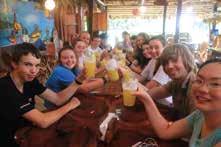
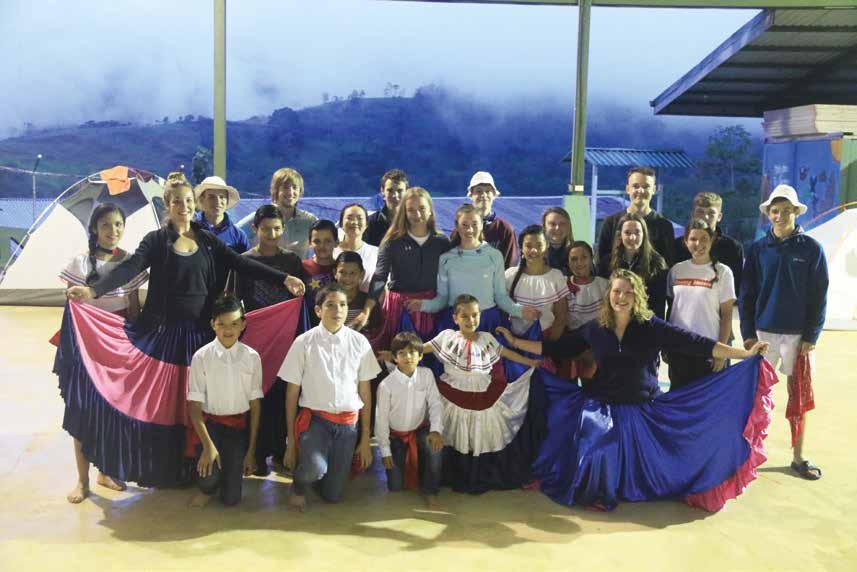
Over the last year, the importance of debate and discussion in modern politics has become all too clear, and whilst debate has been seen to stagnate across the globe, it has begun once again to thrive at King’s. Throughout the year, we ran two sessions a week for Seniors and Juniors in the Fourth Forms. Both have seen a fantastic rise in their membership and quality of debate with many new members joining the society.
Due to this being Mrs Sears’ first year of debating and as running a society has been new to Edmund Poel and myself, we decided to only enter one competition this year: the Oxford Schools’ Competition. This takes place over two multi-stage rounds and is the largest in the country. It is run and hosted by members of the famously prestigious Oxford Union Debating Society. The first round took place at the end of the spring term. We entered two teams in the competition, one of Will Hunt and myself, and another of Samantha Hadley and George Capell. The Oxford Schools’ Competition is notoriously difficult and so we went with no great expectations, but it was a fantastic day. Despite the challenges faced, both pairs performed wonderfully, with the competition environment providing some great experience for our younger debaters. Much to our surprise, the pair consisting of Will Hunt and I got
through the heat rounds to Oxford Schools’ Finals Day. This was something no King’s pair had achieved in more than a decade and so it came as an immense surprise to all involved. In March, Mrs Sears, Will Hunt, Edmund Poel and I travelled to Oxford to take part in four debates. Despite coming 4th in our first two debates, we pulled it
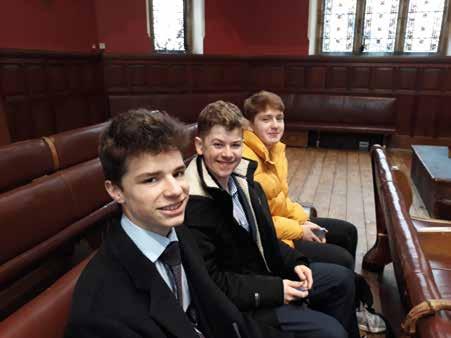
The year, however, was not yet over for the debating society. Later that term, we held the Inter-House Debating Competition; this consisted of a week of debates
From the beginning of this year to the start of May, we have all been taking part in the Engineering Education Scheme (EES). As part of this program, we worked with an engineer from Honeywell-Hymatic and our task was to design and test a new cleaning method of Joule-Thompson cryocoolers. One of the main uses for the cryocoolers is in heat-seeking missiles where they cool the infrared sensor to very low temperatures, so it can detect heat from long distances. The problem with the cryocooler was that during the manufacturing process debris becomes lodged in the valving and prevents the cooler from operating efficiently or even at all. We came up with our first ideas and decided overall which one we should take forward. After putting together initial designs, we went for a two-day residential course at Birmingham University towards the end of the winter term. This gave us an insight into what studying engineering would be like at University and allowed us to see the potential flaws in our designs and
between houses, on the motion This House would legalise euthanasia, which saw the best two houses get through to the final in College Hall. The debates were judged by Mr Gilbert. The final was quite a spectacle and gave the school a real insight into the skills involved in debating and all the debaters, Will Hunt, Wilfred George, Henry James and Will Hood performed fantastically, especially considering two of them had never debated before. The motion this house would ban faith schools was a controversial one, with several references being made to the school itself, but in the end the trophy went to Wulstan house for their stalwart defence of religious schools. This was chaired excellently by the Headmaster, and was judged by Tom Kelly OV, last year’s head of the debating society.
Overall it has been a busy, but brilliant year for the debating society and this is only the beginning. Plans are already being formed to have more debates against the Royal Grammar School Worcester, possibly with the return of the Turner Cup, the debating version of the Modus Cup, and more competitions than ever before with our return to the ESU Mace competition and our debut at Birmingham Schools’ and, of course, our second attempt at making the Oxford Schools’ Final!
To start the Easter holidays away from the stress of revision, Upper Remove and Lower Sixth French pupils visited the French town of Genech, near Lille. We spent a week enjoying the surroundings and amazing cuisine thanks to our generous host families!

The Lower Sixth were lucky enough to have the chance to experience a couple of days of work experience on placements provided by our hosts. These varied from school English lessons to an engineering company to a physiotherapist’s! There was no better way to throw ourselves into the language at the deep end, involving challenging technical vocabulary. Naturally, we found these days the hardest part of the trip. However, many felt that they were the most enriching, giving us the opportunity to experience France in a way that is impossible to learn from textbooks.
In order to have a break, whilst still practising the language of course, the Lower Sixth and their French partners organised a party at the start of the trip. This allowed us to get to know each other’s hosts and break the ice Macarena-style! We found that it was really exciting to get to know young people our age whilst exploring their culture. This aim was essential in particular for the Lower Sixth, who study cultural topics such as arts, diversity and crime in the Francophone world. Any knowledge or opinions given by our partners directly benefits our arguments in the oral exam.
then fix them. After the Christmas holidays, we began to test our hypothesis that a reciprocating flow of water would be an effective method of removing the debris. We did this by making three scale models of the cryocooler as the actual cooler is only a few cm tall, and used glitter to model the debris. We created the reciprocating flow by using a network of solenoid valves to control where the water flowed and in what direction at each point on the loop. After collecting our results, we produced a written report which explained what we had done at each point in the process. We also made a presentation which was to be shown at the Celebration and Assessment Day in early May. Due to our participation
in and completion of the Engineering Education Scheme, we all became Gold Level Industrial Cadets. The experience also taught us what it would be like to work as an engineer and how to think critically in order to find solutions to each problem we would face. We would like to thank Mrs. Haddock and Mr. Rafferty from Honeywell for making this experience possible.

19 pupils taking German for GCSE travelled to Memmingen in Bavaria for two weeks in the summer holidays in order to expand our German knowledge. Arriving at around midnight, we all went straight to our families before going to school bright and early the next morning. The school is called Bernhard Strigel Gymnasium and is situated in the town of Memmingen. The Grammar School offers three strands with eight languages such as Russian, Italian and Latin. The school day begins at 7:45 and can finish as early as lunchtime. The students can also take part in activities such as dance, choir, baseball, orchestra and more.
As well as visiting the school on many occasions to take part in a variety of different lessons and help the younger children with their English, we were also lucky enough to take part in many exciting day trips. This included visiting Ulm, where we walked up the Ulm Minster, the tallest church in the world, with great views of the whole city and, on clear days, the Alps. It has three spires, thirteen bells and 768 steps! We also went on a visit to Neuschwanstein Castle, which is a 19th century Romanesque revival palace on a
In return, we welcomed our exchange partners to our homes and to King’s for a week in May. This gave us more time to spend with them, now in a way that was much easier for us! We reciprocated the successful arrangement of a work experience placement lasting two days for the partners of the Lower Sixth pupils. Meanwhile, Upper Removes’ partners spent this time in Oxford and at Bewdley Safari Park. Our exchange partners also received a tour of the Black Country Museum and Worcester Cathedral.
The exchange was a decidedly successful experience, exemplified by arrangements made for reuniting with host families in the summer. Equally important is the knowledge that the exchange was extremely beneficial to everyone’s speaking and listening skills: Upper Removes, Lower Sixths and our French friends alike. The trip has left me in complete certaintly that the most efficient way to improve your language skills - no matter which level you are at – is diving into a community associated with your language.
hill in south-west Bavaria. After the king who lived in it died in 1886, it was opened to the public. Since then, more than 61 million people have visited the castle. Neuschwanstein looks very much like a fairy-tale castle, with 220 rooms with immense detail inside.
On the second day we were able to meet the mayor of Memmingen who gave us a badge with the Memmingen symbol on it and a few other souvenirs. We then were given German snacks and drinks with the mayor followed by some photos inside the town hall. Another great thing we did was going on a long hike in the Alps. We walked for around six hours, which was tiring, but we were all in high spirits and enjoyed the warm weather and nice views of the mountains.
Many of us visited lots of other places with our host families. This included Munich, the third largest city in Germany and famous for its huge beer festival Oktoberfest; Lake Constance, located between Germany, Austria and Switzerland, which many of us had the chance to swim in; and Augsburg which is Germany’s third oldest city, founded by the Romans.
Another great thing all of us did was attend a few German festivals. The first one was Kinderfest – which is when there is a huge parade with hundreds of children dressing up in costume with their schools. We all really enjoyed watching this. The main festival held while we were in Memmingen was Fischertagsvorabend, which is the pre Fischertag evening where most people who live in Memmingen will go and party till after midnight, enjoying German dancing and singing, as well as lots of food and drink. I know that all of us that went had an amazing time! The following morning, we went to Fischertag, which is when men who were born in Memmingen or have lived there for at least ten years jump in the river that flows through the town to try to catch trout. This festival occurs every year in the summer and we were able to experience it, wearing dirndls and lederhosen, which are German clothes kept specially for festivals like Fischertag.
All of us were sad to go back to England after a brilliant trip but I know that many of us including myself are still in touch with our partners and are planning on going back soon.
Olivia Burden, Chappel House

Twenty-seven pupils from the Fifth and Sixth Forms travelled to the French resort Serre Chevalier the week before Christmas. Before we arrived in the resort, the recent
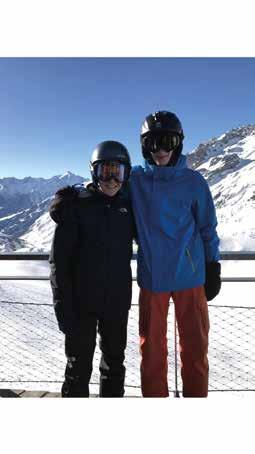
even the beginners enjoyed the powder snow in the trees by the end of the week.
Throughout the week, there were four different ski groups, each of which challenged the skiers to push themselves. The beginner group attempted parts of a black run by the end of the week and the advanced group skied down some of the most challenging off-piste slopes. In the

evenings, we took part in activities such as ice skating, bowling, a karaoke night and visits to local restaurants to complete the excellent week of skiing. There was never a dull moment, and we were kept very busy from start to finish. We also recorded a video of the trip, which is now on YouTube!


Lower Remove pupils embarked on a journey of remembrance and discovery in Belgium and France. Under the expert guidance of Mr. Sharp and Dr. Dorsett, they walked in the footsteps of our Great War heroes. This enabled a deeper understanding of where and how the fighting took place and how that geography affected tactics. Moreover, it offered pupils the opportunity to develop invaluable skills of empathy.
After a smooth ferry crossing and a rather warm coach journey, the students visited Notre Dame de Lorette; the world’s largest French military cemetery. Here students were introduced to the initial stages of the war and were able to see Vimy Ridge which provided them with an understanding of the strategic importance of gaining and holding the high ground.
Our second day was spent in the Ypres Salient. It was particularly thoughtprovoking and included visits to the Flanders Field Museum, Tyne Cot Cemetery and the Menin Gate. Tyne Cot is the largest Commonwealth War Grave cemetery in the world and marks the furthest advance of
During February half term, another successful junior ski trip took place in the small Italian resort of Claviere, just on the border with France. The skiing conditions were near perfect with three days of clear blue skies and skiing in fresh powder.
There were four groups of skiers, based on ability. We all took different routes around the resort, meeting up for lunch most days in a restaurant or bar in the mountains. We managed to achieve five hours of skiing each day, arriving back at the hotel in the late afternoon. This meant that we had
plenty of time after skiing to get ready for the evening activites or to walk around the small mountain village of Claviere.
We had many busy evenings packed with exciting activities, such as a pizza night, karaoke and disco night, and we even managed a last minute ice skating trip! All were great fun and everyone thoroughly enjoyed themselves. It was widely agreed that the highlight of our trip was the 1.5 km Luge Monty Express in Montgenevre –although it has to be said that Mr Wilson was pretty impressive at karaoke too.
Once our skiing had improved enough, we were able to ski across the border into France, to the resort of Sestriere. This was challenging because many of our lift passes had been used up at the Luge! Here we skied on higher level slopes and it was a much harder day as there were strong winds at altitude. We arrived back, having had enough fun to fill the YouTube video we made and to last us until the next ski trip.
the scale of this war. Our day ended in the town, where a lovely and most welcome dinner was followed by the very moving and emotional Menin Gate Ceremony. Every night since 1928 the locals have played Last Post. Two pupils from the CCF, Catrin Lucas and Luke Beever, laid a wreath giving thanks for those staff and students of the King’s School Worcester who fell during the Great War.
The following day we travelled into Northern France to explore the Battle of the Somme. This was perhaps the most moving day of the trip as we spent the morning learning of the Old Vigornians who fought here. Our first stop was at Thiepval; it was difficult to picture such deadly fighting in an area that was so remarkably beautiful.
The pupils found the names of four OVs, and one of the Lower Remove found his relative’s name commemorated.
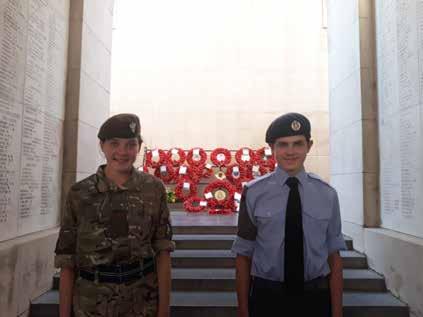
Our next trip, to Beaumont-Hamel Newfoundland Memorial, not only illustrated the fact that the war was fought by soldiers of the Empire, its preserved battlefield park encompasses the ground
over which the Newfoundland Regiment made their unsuccessful attack on 1st July 1916 during the first day of the Battle of the Somme. It was the regiment’s first major engagement and within 30 minutes the regiment was all but wiped out. A remarkable opportunity for students to see the preserved trench lines and crater holes.
The final morning was spent exploring the Second World War. The pupils were given a guided tour around Dunkirk, where more than 400,000 British and French soldiers were trapped as the Germans outflanked them. It was a scene of fantastic bravery as more than 300,000 soldiers were rescued from internment by a flotilla of small civilian boats, Merchant Navy ships, and Royal Navy ships. This event uplifted the spirits of the UK. Arguably, the war might have been quite different without that remarkably daring rescue. Students were shown key positions and provided with both the French and British perspectives of the events in May 1940.
After this, fatigued and sombre, we climbed back onto the coach for our return journey. We arrived safely with great memories of a

both army and RAF sections, culminating at the annual CCF dinner in the stunning grounds of Chateau Impney.
Camps, courses and exercises have filled up the calendar. In July 2017 the Army went to Barry Buddon Army Base near Dundee, Scotland. There were no U6 attending, resulting in the L6 stepping up to the plate to lead the army section. The camp was successful in a variety of activities including shooting, obstacle courses, radio training and an in-depth field-craft exercise. Overall, the camp was a very enjoyable experience giving the cadets valuable knowledge for the future.
The next step for the Army Section was the Junior Non-Commissioned Officers (JNCO) cadre, which took place in October 2017 at Nesscliff Army Base. This helped improve military knowledge and
leadership of potential senior NCOs whilst also assessing the possibility of promotion. In the same month Colour Sergeant Jacob Head and Corporal Will Gorner attended the Cadet Leadership Battle Camp (CLBC), an amalgamation of the previous Cadet Leadership Course and Cadet Infantry Battle Camp. The highlight of the camp was the two-day exercise in the Fibua German Village which allowed cadets to participate in a night-time ‘Hearts and Minds’ operation followed by a counterinsurgency operation into an occupied area of the town.
The biggest event of the year for the whole Contingent was the Biennial Inspection in March 2018, in which the army section’s
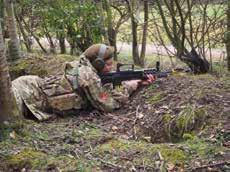
role was to run a number of stands. It was a huge achievement resulting in an outstanding report. This was then followed by a senior NCO cadre in which senior army and RAF cadets took part in a twoday exercise to improve their military skills and command potential whilst also deciding which cadets were worthy to hold command appointments in the future.
The army section has had an outstanding year with the strong U6 year forming the backbone of the operation with the input of junior cadets heavily reinforcing their position.
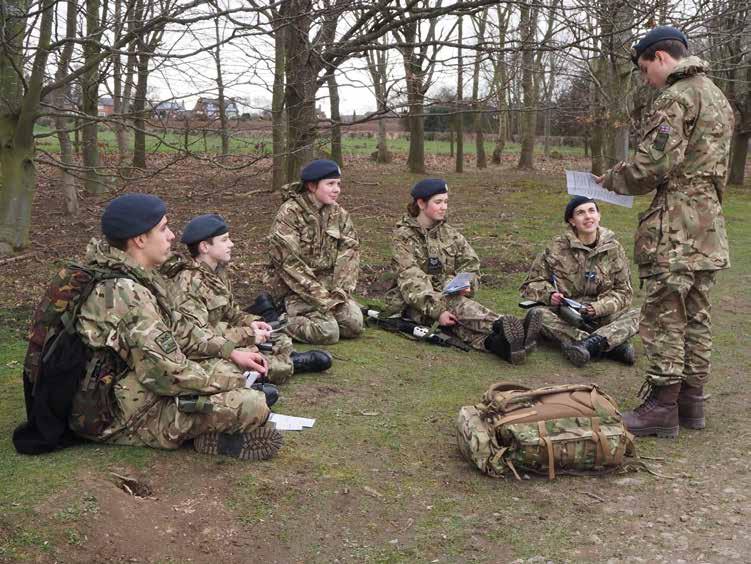
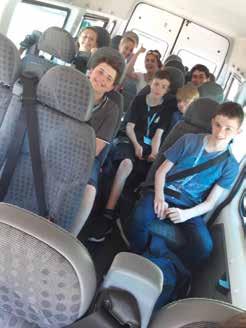

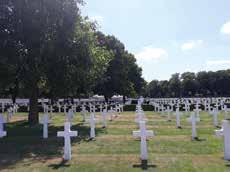
the year, a team of 13 cadets, led by Flt Sgt Andrew Salkeld, competed at RAF Cosford against other schools from the region in a variety of disciplines, including
recce, command tasks and RAF knowledge. Having won the first aid competition and demonstrated our usual high standard of drill, we were unfortunate to miss out on qualifying for the nationals, and were placed joint third.
In our Friday training, some of our younger cadets achieved their Heartstart First Aid qualifications, which involved emergency lifesaving skills such as performing CPR, helping someone choking, and responding

to serious bleeding. Besides first aid, developing team work and communication through command tasks and learning the principles of flight have been at the core of our training.
The Air Experience Flights this year have also been successful, with many of the cadets having the opportunity to take to the sky above RAF Cosford in a Grob Tutor light aircraft. Through flying, the cadets enjoy the thrill of aerobatics while developing their piloting skills. Three cadets also secured a day’s gliding experience and achieved their blue gliding wings, the first opportunity for gliding experience for at least five years.
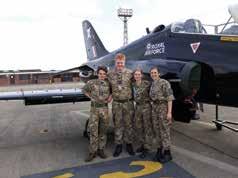
The Summer Camp at RAF Henlow gave the cadets insight into the activities on an operational RAF base. It was a pleasure to meet up with OV Sqn Ldr Bonnie Poselt, who assessed our inter-flight drill competition. A notable base visit was to the Centre of Aviation Medicine, where the cadets learnt about some of the cutting-edge technology that the RAF are using and trialling in active service. Over the summer, three of our cadets completed the Air Cadet Leadership Course at RAF Cranwell. Nationally, very few cadets achieve this, so congratulations are due to Sgt Beckett, Sgt Bullock and Sgt Copeland. We wish those cadets embarking on ACLC next summer the best of luck.

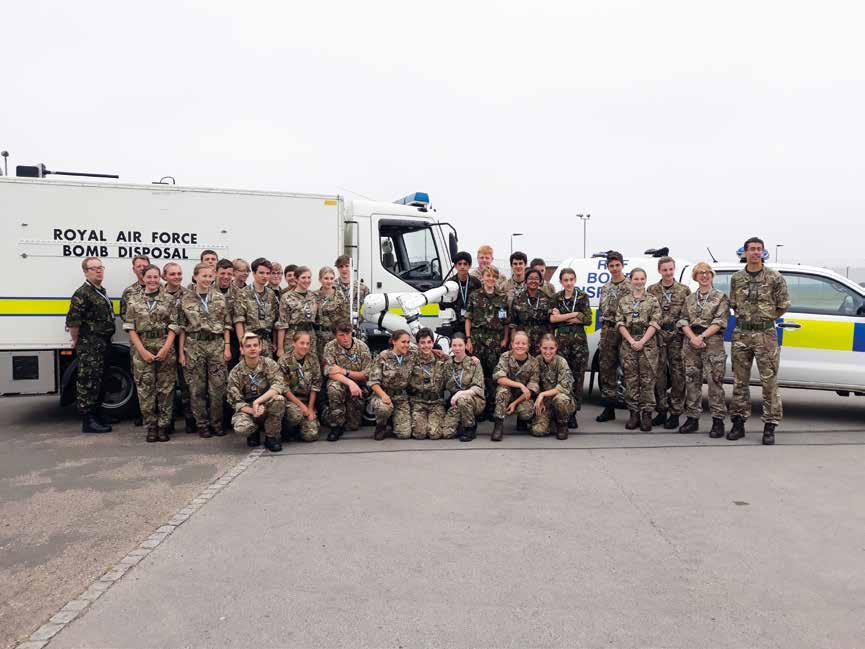
Here in the Library, 2018 has been a year of outstanding author visits and also impressive pupil participation in reading for pleasure activities.
As usual September is such a busy time for our L4 in the Library, with inductions and also the every-popular Bookbuzz programme.
October was dominated by two extremely exciting author visits to College Hall. We were delighted to be chosen to host an author event on October 3rd with Clare Balding. Pupils from all three foundation schools were present, along with children from local primary schools. From the moment she arrived to the moment she left after entertaining 500 children and staff in College Hall, she created a buzz wherever she went.
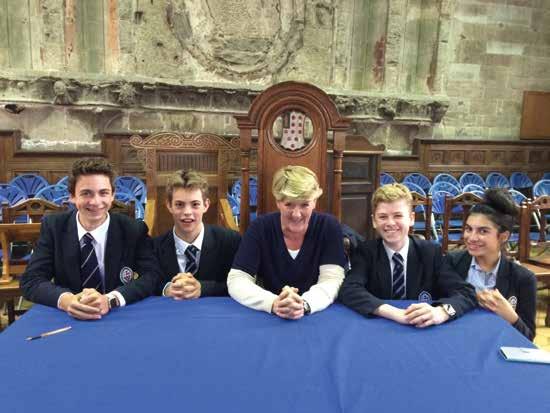
College Hall is unlikely to see the likes again of Clare Balding cavorting with great drama and commitment on stage, to re-enact great sporting moments of recent times with the help of King’s St Albans children who were brilliant. She invited up on stage young writers of the future to interview them about their ideas for a story. I don’t think she was expecting to have the kind of complex synopses such as that given by some of our pupils! Clare Balding was a passionate and inspirational speaker, who will have left many of us with unforgettable memories of the day that she came to school.
Our second much-anticipated visitor was Michael Grant, ‘the evil genius’ American author of the hugely popular Gone series which is a best-selling dystopian fantasy. Michael spoke to pupils from thirteen
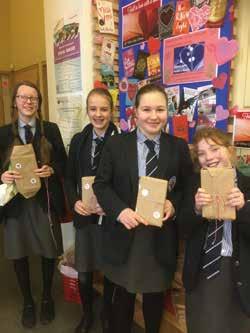
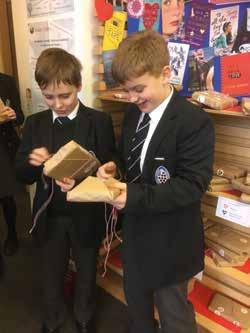
and gave some tips. The event ended with book signings after a lively Q and A with a very eager audience. In the words of some of our Fourth Form, they loved ‘How open he was to things he’s done in the past, good and bad’ and how he was “inspiring, really nice, funny, cool accent, Interesting life story (not what I expected)”. “He was very amusing and his jokes were great.”
National Poetry Day this year was on October 5th. Pupils explored the theme of Freedom with thought-provoking poems with diverse and exciting subjects.
On World Book Day in College Hall, Andrew Maund spoke of the lessons that we can learn from books, that ‘most wonderful, flexible and portable of resources’ which can offer ‘companionship, reassurance, comfort, challenge and escape throughout our everyday lives’. There was also a fantastic display of staff and pupils photographs for
and the top of the Eiffel Tower, to inventive domestic situations such as rooftops.
The Worcestershire teen Book awards is a highly anticipated event as written by Jaimie Walters LR “This year some L4-LR keen readers once again took part in the Worcestershire Teen Book award. We all enjoyed speed dating and ranking the books in the Autumn. At Christmas we got to see which books were on the shortlist. We were all busy reading the shortlist and memorising every detail before the announcing of the winning book and hotly contested quiz at County Hall in March. We took a team of 12 pupils to the quiz, with a tough 8 rounds to follow. We did well and came away with 1st place! There was a talk by Chris Bradford about his Bodyguard books. It was a great day and we were all pleased to have another win. Bring on next year!
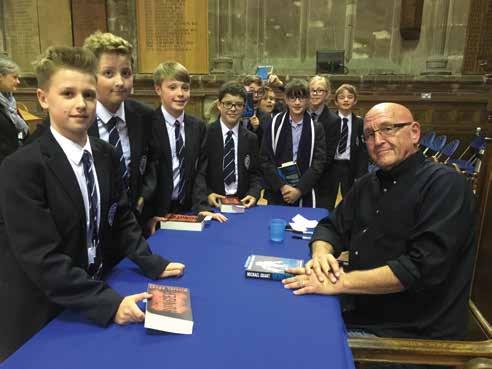
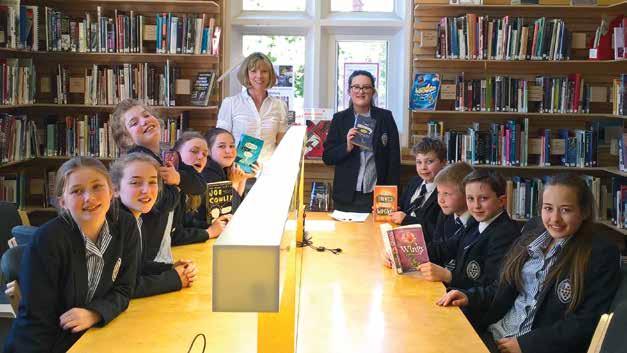
It has been a fantastic year for our 6 WRAITH groups with every year in school strongly represented. Miss Jeffery, Mrs Capell and Mrs Walmsley have all thoroughly enjoyed looking after groups of engaged pupils who have loved discussing books. Who better to tell you more than WRAITH members themselves?
Something fun we were involved in was the Worcester Teen Book Awards. We helped identify a shortlist, choose a winner, and attended the award ceremony. We also won the inter-school quiz on the books. Most of the books we read are suggestions from other members. This is good because it means we read genres we wouldn’t normally. Some books we’ve read are ‘Gone’ by Michael Grant, ‘The Girl Who Loved Tom Gordon’ by Stephen King, ‘1984’ by George Orwell, and ‘The Bone Sparrow’ by Zana Fraillon. WRAITH is a great club and I particularly like the aspect of hearing others’ views on a book you’ve loved. We have both really enjoyed this year.
Amy Hall and Rosie Stanley, U4
This was my third year doing WRAITH and it is something I always look forward to. Not only do you get the opportunity to voice your opinions without feeling embarrassed, you also get to talk about something you enjoy with like-minded people face to face in a warm and friendly environment. And, to top it all off, there’s almost always new, free books you may not have tried before. Oh, and always homemade cake at each session! Once again this year WRAITH has opened me up to new authors and given me the opportunity to talk to similarly reserved bookworms, and have enjoyed every meeting. So I know that reading may not seem the most socially conventional hobby for teenagers, but WRAITH makes me feel like I can be my bookworm self and be happy with that, so I would recommend WRAITH to anyone!
Sammy Hadley, LR
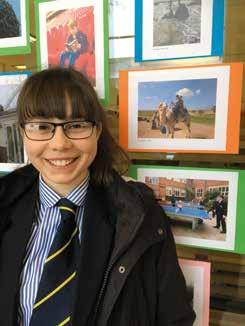
WRAITH is an awesome club. It is a fun and exciting experience. It has a great variety of books that let you explore your imagination. We like debating about the books and discussing what the author could have done better! We find reading the books the best part, because we can learn new and exciting things!
Lexi Lee and Clara Zurich-Ball, L4
UR WRAITH is best described as a lively and engaging book group. At the closing meeting for the year Mrs Capell canvassed opinion over favourite books and highlights from the group; topping the lists were the sci-fi selection – including ‘The Hitchhiker’s Guide to the Galaxy’, ‘The Long Way to a Small, Angry Planet’ and “literally anything by Terry Pratchett, apart from ‘Nation’”. A clear highlight was “Ella standing on the chair re-enacting Blood Brothers”, with “cake” coming a close second, and thankfully “not being able to put a book down for the first time in a while” also featured. For Mrs Capell the Wraith groups themselves are the real highlight – looking forward to a summer of reading and comparing notes again in the Autumn term!
Members of Upper Remove, WRAITH It has been a truly amazing experience to be a member of WRAITH! I joined King’s in the Sixth Form and WRAITH really helped me to discover my passion for reading. I enjoy sharing my thoughts about the books we choose to read with others during the WRAITH meetings; it has helped me build up my confidence. One of the highlights was the visit from the author Chris Vick who explained to us how he wrote his book ‘Kook’. A big thank you to WRAITH for enriching my life at Kings.

The 30th January marked King’s annual MFL Media Day, which encouraged A-level pupils to put aside hesitation and create media to improve their language skills. The theory behind the idea was that we talked in the target language all day. This was encouraged through material in the target languages, coupled by support from our MFL staff.
Students were put into groups of four spanning across Upper and Lower Sixth. From there we were asked to create three pieces: a newspaper article, an onlinestyle news video, and a radio broadcast. The tasks aimed to improve our fluency and increase our confidence, vital for oral exams. Short break brought a pleasant change from work as we enjoyed croissants and hot chocolate. However, we were still
In Science Club this year we have done some awesome experiments. Our first project was a challenge to design the best method of stopping an egg from breaking when dropped from a height. There were lots of different egg parachutes, with varying degrees of success! Other experiments included making giant bubbles, slime, creating firework effects and a water bottle that demonstrated how pressure changes make a diver ascend or descend. Another week we looked at some cool optical illusions. There has also been opportunities to observe dissections of a variety of animals, if you’re into Biology, enabling an insight into how animals such as pigs and sheep breathe.
expected to chat in a foreign language!
Lunch was a delicious choice of paella, boeuf bourguignon and German sausages. Even the food was given lots of thought in order to evenly distribute the culture. Some of the dual linguists switched languages during breaks just to mix up the day! At the end of the frenzied recording and writing sessions, we all met to view the videos and newspapers and rather biasedly voted on winners.
The video, perhaps unsurprisingly, was the hardest task as we tried to recreate a Spanish, French or German BBC news programme within an hour! Despite a lack of exam conditions, it felt as if the lecture theatre were presented with our oral exams, complete with bloopers to take
the embarrassing edge off the videos! The Hispanists faced a small misunderstanding when we realised that each group of four was meant to create its own newspaper article, not everyone create one together. We thought we had been given lots of time... Finally, the radio broadcast proved fun, allowing us to impersonate celebrities and create adverts. And yes, ‘Despacito’ featured in one of them... namely that of my group!


This year for the Technical Theatre Club started with the Shakespeare Schools’ Festival. Will Emsley and I had the chance to design and run the lighting and sound cues for the King’s performance of The Tempest at the Artrix in Bromsgrove, which was a wonderful opportunity and was followed up with a performance in the Wightman studio for parents and pupils.
The senior musical, South Pacific, was the next show. For the weeks building up to the show, we were designing the set and learning how a theatre works before a main show. The set design, lighting and sound provided the audience with a show to remember. The Lower Removes were backstage with props under the supervision of Sixth Formers, whilst others were in the control box, running the lighting and sound. I was backstage with Will Emsley and Gabe Hard, moving various pieces of set on and off stage. This was the main show of the year and we had much fun as half of us were in costume!
The Fourth Formers were also working hard around this time, ready for the Christmas show which was put on by the Silver Arts Award members. The set from South Pacific was still up, giving it a Hawaiian Christmas feel- you can obviously change any set with a bit of tinsel and lights! Will and I were on the lighting and sound for the performance
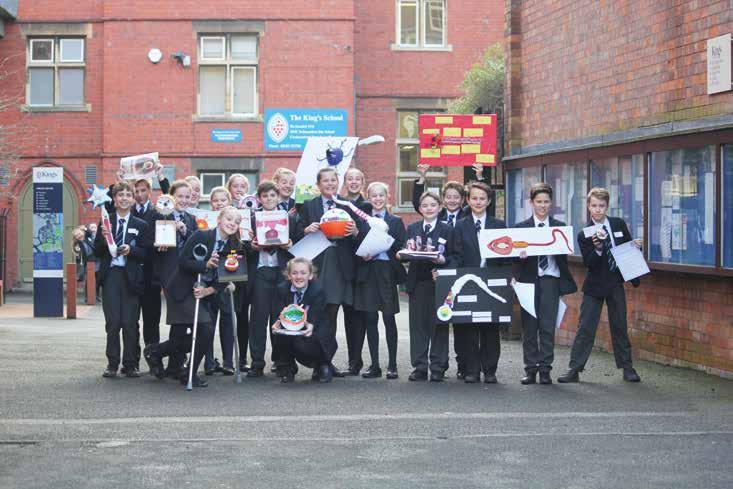
and we were being filmed this time! It contributed to our Performance Support awards, which are comprised of different aspects of the backstage running of a theatre performance, ranging from lighting to set design. There are three stages to the Performance Support award: Bronze, Silver and Gold, with each level having various challenges to overcome.
Now it was time for the Removes’ production, Private Peaceful, featuring another impressive set build by Mr Haynes and Mr Dudley. Will, Gabe and I had the jobs of lighting, sound and being Deputy Stage Manager. The Removes production was very sorrowful and really gave an idea of what life was like before and after the war. The two parts of the play were split by the interval, where a change of set was required, bringing on barbed wire and sand bags to give you a feel for the trenches.
Last was the Fourth Forms’ production of The Railway Children. At the Activities Fair at the start of the year, Mr Haynes had a lot of interest from Fourth Formers, so he started a Junior Tech Club early in the Summer Term. This was perfect timing for the Fourth Form production. Mr Dudley and Mr Haynes spent days working on the set for this with careful planning before the build and expert painting from Technical Theatre Club members.
In between these main shows, there have been many dance shows and other events happening. Mr Haynes has also been giving us lectures on several topics, from health and safety to how a sound system works. This was all work towards our Performance Support award.
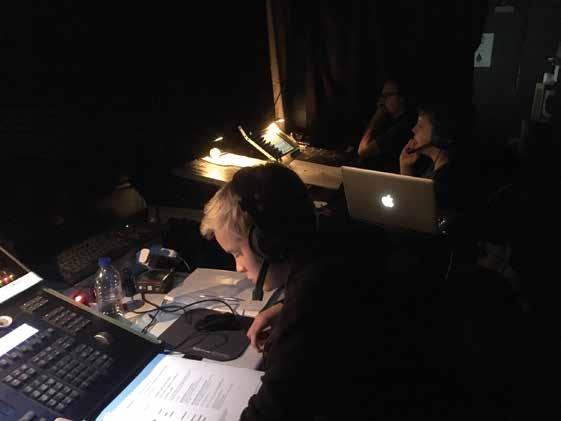
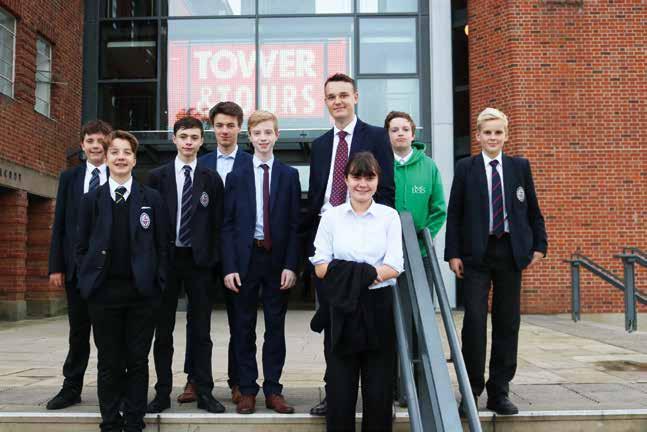

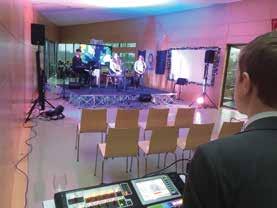

Lower Sixth pupils taking part in this year’s Young Enterprise Company Programme established five companies with the voluntary support of teaching staff and external business advisers: ‘Espiga’ led by Peter Simpson; ‘Bam-Bam’ led by Toby Platt; ‘X’ led by Miles Maley; ‘Capital’ led by Myles Whaley; and ‘The Bottom Line’ led by Harry Clark.
Bam-Bam and The Bottom Line decided to create some early revenue by targeting those attending the Modus Challenge Cup at Sixways Stadium. Bam-Bam invested in their namesake, inflatable bam-bam sticks, whilst The Bottom Line opted to sell and apply war paint to all King’s supporters. Both companies had a great success at this event, creating a good profit that could be reinvested into financing their first products.
The first official selling event was the Christmas Fayre. This enabled each group to test out their developed and chosen products on the open market, capturing customers who had travelled to Worcester for the annual Victorian Fayre. Early products included cacti from Espiga; a festive raffle-based game from Bam-Bam; filled Christmas baubles from X; Capital’s
early form of their final product: a ‘Family Favourites Cookbook’; and environmentally friendly toothbrushes from The Bottom Line which continued to form the basis of their final merchandise. All companies made healthy sales and established points to learn from in order to progress to the next stage; stand out performances were made by The Bottom Line by selling out entirely, and Bam-Bam, who won the prize for ‘The Best Display Stand’.
Each company then had the opportunity to amend their products, company image and marketing in preparation for the South Worcestershire Young Enterprise Spring Fair. Espiga moved away from selling cacti to creating their wooden ornament ‘family tree’ and X specialised in dog accessories. The Bottom Line and Capital decided to add to their initial product with The Bottom Line creating a biodegradable wash bag incorporating their toothbrush with dental floss, face cloth and soap whilst Capital added to the ‘Family Favourites Cookbook’. Bam-Bam decided to use wood sourced from fallen trees to create their candles.
The Spring Fair allowed the groups to show the judges what they had achieved; marks
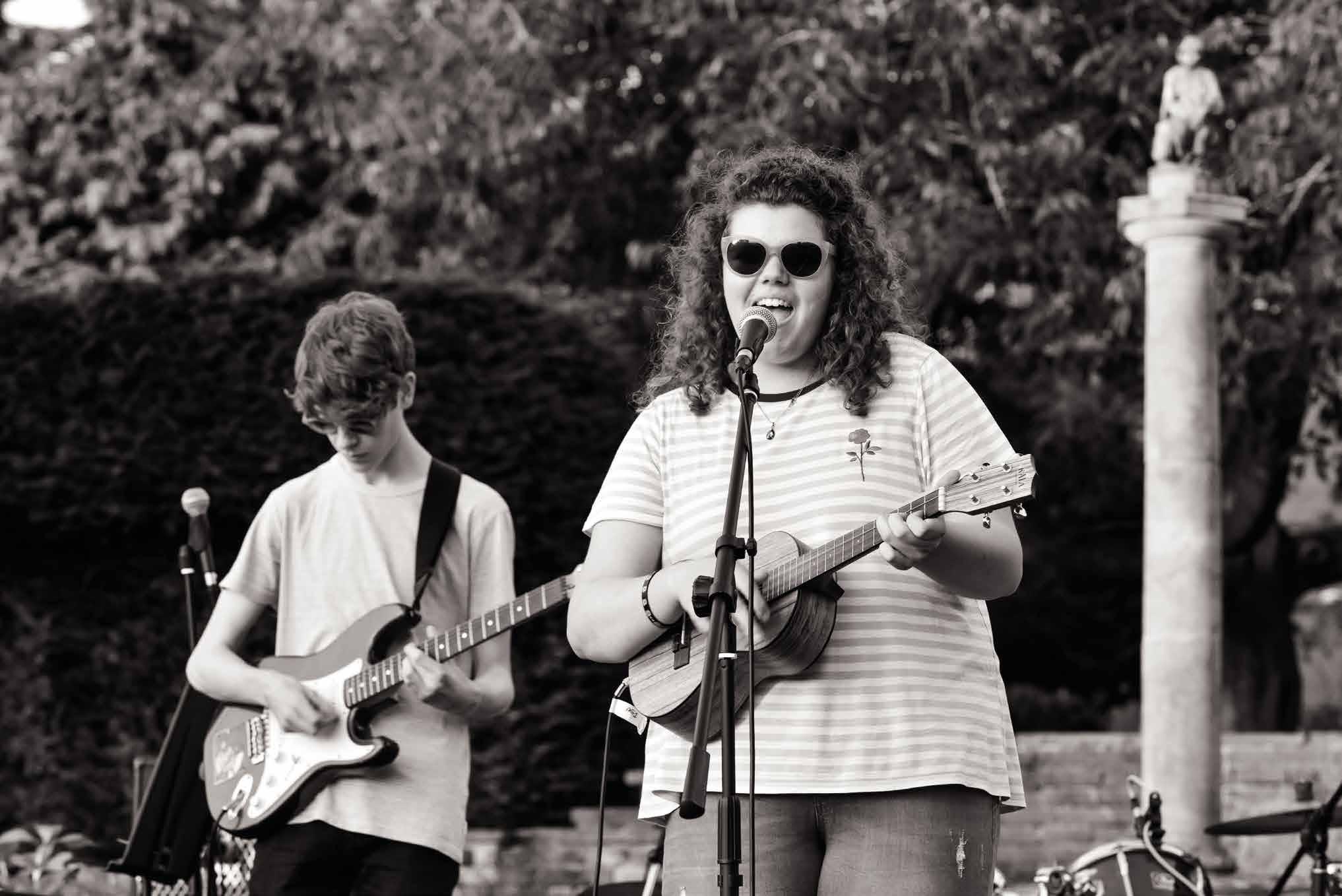
were awarded for each stall. Once again, each group performed well although unfortunately sales weren’t as high. Successes were achieved with Bam-Bam once again winning the prize for ‘Best Stall’ and The Bottom Line being awarded the ‘South Worcestershire Spring Fair Overall Winner’.
The South Worcestershire Presentation Evening was the next event, held at Worcester University, with members from each group holding a conference with judges as well as presenting their company journey in front of a large audience. Whilst all groups performed excellently, only The Bottom Line picked up awards on the night, winning ‘Most Innovative Company’, ‘Most Sustainable Business’ and ‘Company of the Year 2018’. This meant that the group was fortunate enough to go through to the Hereford and Worcester Area Final held at County Hall. Unfortunately, The Bottom Line came up against some very tough competition and the company did not progress to the West Midlands Regional Final. The team, however, are keen to continue their venture, with outside commercial interest already being received.
Harry Clark, Creighton House
It has been a very exciting and jam-packed year in the Art School. We have been lucky to have a number of artists join us throughout the year including Ian Murphy and Jake Attree. The pupils have benefited from their stimulating workshops and expertise.
A collaboration between the art school and Worcester Cathedral resulted in a fantastic “Dreaming of Gerontius” exhibition whereby pupils were able to showcase the diversity of their talents.
The end of year GCSE exhibition highlighted the strong ability of the cohort this year, and attracted the highest numbers of guests we have seen. Our GCSE students fully embraced the challenges put before them and worked incredibly hard, a particular highlight being the annual trip to St Ives during the October half term. Fifty enthusiastic, art-loving students joined us on the trip. The atmosphere was fantastic, despite the ever-changing weather. Every
Yet again, our Arts Award teams had an exciting and inspiring year, leading to another successful external moderation and certification.
Arts Award is a suite of qualifications, accredited by Trinity College, which reward active participation in the arts in all areas. Successful entrants must be as committed to exploring other practitioners’ work and developing their leadership skills. They are qualifications exceptionally well-suited to our talented, open-minded and hardworking young artists here at King’s, and our Trinity College-trained ‘Arts Advisers’, within each of our creatively-minded academic departments, certainly had another great cohort to guide in 2017-18.
The Art Department’s major Big Draw event provided many leadership opportunities for our visual artists entering the silver arts award, whilst silver performance artists put their leadership skills to the test as they took the reins of the Fourth Form Christmas Show. Meanwhile, silver musicians created a new event as a mini rock concert for young performers took the stage in the John Moore Theatre.
Our young bronze entrants from the Lower Fourth filled their portfolios with a vast array of artistic skills and talents. These
morning, after a very hearty breakfast, the students filled their backpacks with art materials and sketchbooks and set off for a full day of art-related activities. Students visited St Michael’s Mount, the Tate Gallery and the beautiful gardens of Barbara Hepworth. They spent a whole day working alongside an artist and submerged themselves into the life style, if only for a short period of time.
The end of year Pre U exhibition brought the academic year to a close. This year’s Upper Sixth artists have gone from strength-tostrength and have produced what can only be described as an exceptional show. All of this would not have been achieved without the incredible team of teachers and technicians who have supported them on their individual journeys to reach their highest potential.
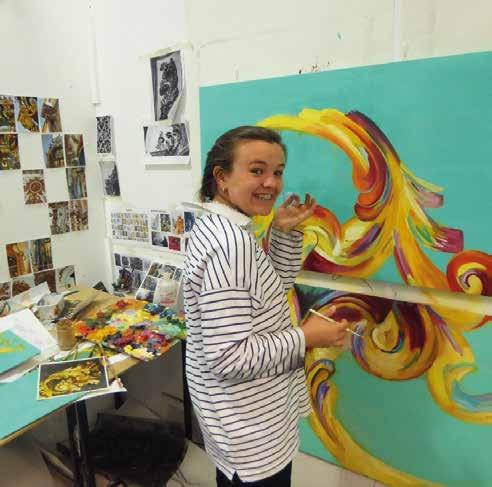
ranged from a sculpture of the Burj Khalifa to directing a mini play in Swedish! All the bronze units were carried out with typical King’s flair and enthusiasm.
The gold cohort excelled once again in 2018 with 16 of our Lower Sixth taking their portfolios to completion and gaining their Level 3 qualification and the recognition of those valuable UCAS points. Our inhouse magazine, Gold Standard, provided a published platform for the research unit, exploring and presenting a viewpoint on a prevalent arts issue. From the alleged death of jazz, to the under-representation of women in the visual arts industry, the depth of research and passion about the subject matter produced fascinating and rigorously referenced articles. Other issues were presented as lectures and debates with the students holding the floor with real conviction. As leaders, our gold students took the helm of a range of events, including showcases, exhibitions, and open mic nights. The mantle of last year’s cohort, who had created some new school events such as the LAMDA Showcases and the Lower Fourth Shakespeare Fest, was taken up with passion by this year’s students who kept the flag of these new event proudly flying high.
There was an equally impressive array of


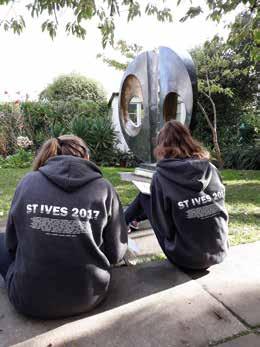
evidence of working alongside existing arts practitioners with students at all levels shadowing, volunteering, and undertaking work experience in a range of setting from the offices of regional arts festivals to the orchestra pits of major West End theatres. Equally impressive were the events attended by our Arts Award entrants, running the whole gamut from quintessential parish pantomime to grand opera in Venice and Vienna! And of course, to round of the year’s work, there was the traditional combined Arts Award trip which this year took our students to see the award-winning musical Wicked as it came to the Birmingham Hippodrome on its UK tour.
A sterling year’s work and well-deserved reward in the 60 qualifications awarded to King’s pupils. Here’s to more success in 2019! SP

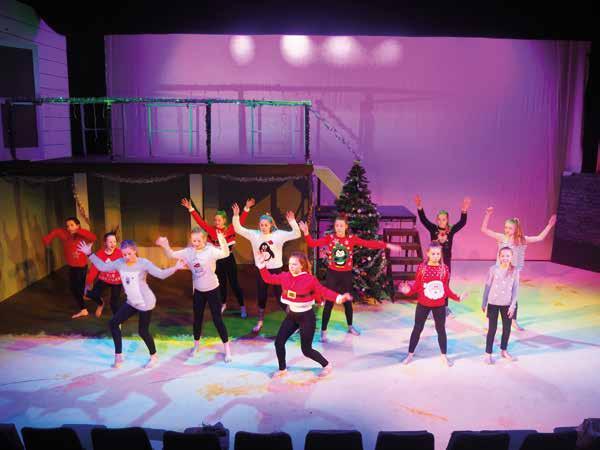
team worked hard to mentor the young performers before the event, organised all aspects of the night and then hosted the show too. All agreed that it was very busy, but a lot of fun!
There was some tremendous work on show from our talented Fourth Form pupils and they performed to a highly appreciative full house. As ever with these performances, it is hard to single out performers but the L4 Drama Group executed a lovely ensemble piece entitled The Smelly Sprout and George Capell entertained us all with his Arnold Riley Grammar School sketch. David Gee and David Wills worked beautifully together
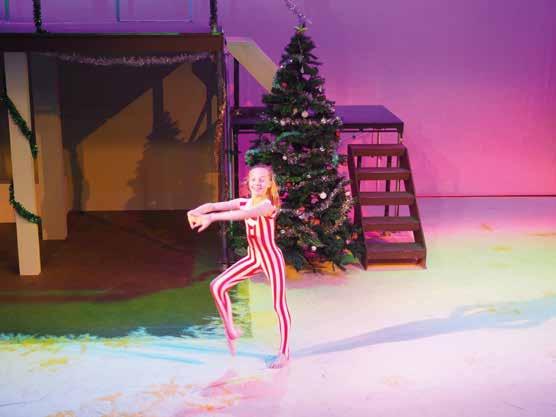
the Breakdance Club with Jingle Bell Rock Remix and Another Day by the U4 dance Club. Alicia Watts sang Hallelujah with class and confidence and Riya Mayilvahanan performed a wonderful version of Once Upon a December. We even had our very own girl band in The Nowhere Girls who sang Riptide. Disaster was averted for Joel Chumbley whose saxophone broke on the night; Mr. Taranczuk saved the day and provided him with another one! The end of the show was rounded off in traditional style with Mr. Taranczuk leading the Fourth Form choir and the audience in an hilarious rendition of The Twelve Days of Christmas
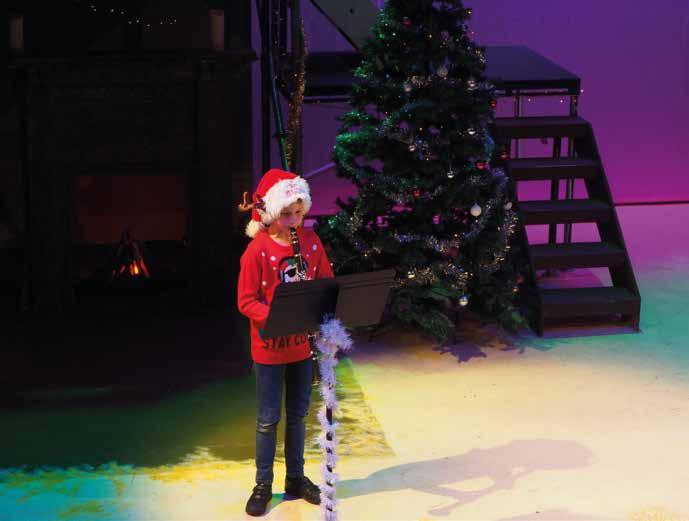
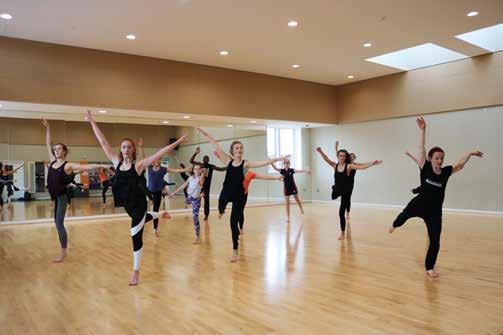
The Dance department this year has been extra busy with more performances taking place and extra workshops from professional dancers.
This year the Dance department was lucky enough to have visits from professional dancers from Two Faced Dance Company and Motion House Company. These were great opportunities for our dancers to learn a new style of contemporary dance, as well as speak to the professionals about life in the dancing world. The professionals really inspired our dancers which gave them the motivation for the first performances at King’s. Alongside this the senior and junior companies had an extra opportunity to visit Rogue Play in Birmingham to learn aerial skills on silks.
The first performances of the year took place at the Christmas shows with most of the choreography having a festive feel. For some of the L4 dancers this was their first time ever performing in the John Moore Theatre, but they were so wonderful you would have never known they had any nerves.
The year started with a brand new project. The department had been approached by Worcestershire Safeguarding Children Board to contribute to new professional training being implemented around the ‘Voice of the Child’ initiative. The training was to commence after the October halfterm, aimed at professionals who may encounter vulnerable children and need to record their ‘voice’, the purpose being to ensure that the child’s true needs come
through clearly. Our brief was very openended: to produce a short film that would reinforce the key messages from the training by presenting them dramatically and from the child’s point of view.
The plea for participants assembled a fantastically eclectic mix of year groups, interests and skills. A core of Sixth Form students quickly took the reins and were an inspiration to the younger year groups
who took part. The final film, shot from the viewpoint of a child protagonist, was a poignant deconstruction of what professionals can inadvertently get badly wrong when trying to talk to a vulnerable child. Exactly how poignant this work was came home to me when I was invited to sit in on WSCB’s first training session. The room of assembled police officers, paediatricians, social workers and head teachers fell absolutely silent and were deeply moved by this first screening.
The L4 dancers had the opportunity to perform with RGS pupils at the Netball Superball in March. This was an excellent opportunity for our youngest dancers. RGS pupils came to rehearse at King’s to work alongside our pupils and we are hoping to repeat this event next year. King’s and RGS pupils opened the event with a cheerleading sequence and later performed to ‘Power’, during the first and last quarter.

the skills the Seniors and Juniors learnt earlier on in the year with the aerial silks finally all came together to finish the dance show.
The last show within school was the Senior Dance Showcase where the senior dancers could show off their work from throughout the year. Evie Maitland took this opportunity to choreograph several dances for the younger dancers and solos for the other senior dancers. This show gave the opportunity to those who had danced at King’s in their earlier years to come back and perform. What was so special and exciting about this show was that the skills the Seniors and Juniors learnt earlier on in the year with the aerial silks finally all coming together to finish the dance show.
In January the Foundation Dance Showcase titled ‘Greatest Hits’ took place. Each group from senior school and St Alban’s chose favourites from the charts to dance to. Although we had a slightly smaller cast this year, the quality of dancing was certainly not affected and once again this show was a sell-out. This was a fabulous opportunity for the schools to come together and show what they have been working on in dance. I would like to thank the Senior Dance Company for their hard work and flexibility with assisting me with the show.
To finish the year three of the senior dancers had an extra performing opportunity at the Artrix in Bromsgrove alongside other youth dance companies including those that work with professional companies.
I should like to commend Evie Maitland on her creative choreography, commitment and enthusiasm in dance. I should also like to thank Evie for being a fantastic Senior Dancer, and to welcome Skye Weaver and Victoria Whitehead as the new senior dancers.

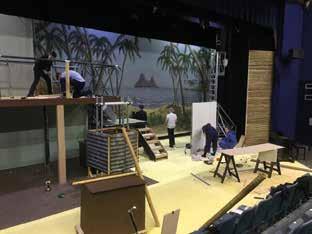
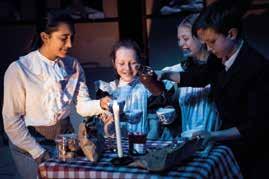
The project had been intense, and a major departure from usual extra-curricular drama offerings. What was inspiring was the extent to which the commitment from every individual was being spurred on by the knowledge that this project would genuinely help make the lives of vulnerable children a little better.
From these rousing beginnings, the year took off to new performance heights. The new, reformed GCSE and A Level specifications brought fresh production opportunities, and highlights included public performances of Steven Berkoff’s Agamemnon by the U6. Their own new original work, a moving piece on life for a teenager with high-functioning autism called Anything About Everything, and a heartfelt dissection of the impact of modern warfare on communities at home, aptly titled Nothing’s Fair in Love and War, produced equally outstanding public performances. These were not without their challenges, though, including having to organise a hasty rescheduling of the original snow-bound performance date!
Our academic exam groups were also at the heart of various theatre trips this year. Frantic Assembly’s Things I Know To Be True at the Oxford Playhouse reduced most to tears, whilst a dystopian science-fiction reworking of Antigone at Malvern Theatre certainly sparked furious debate. Wicked at Birmingham Hippodrome was pure theatricality at its best and Blood Brothers at Wolverhampton Grand was a chance for many to revisit an old favourite. Several members of the wider school community joined us on these visits as we explored the current cultural offering out in the professional world. As ever, a highlight of the year was the Fifth Form London Theatre Tour, reported on in a separate
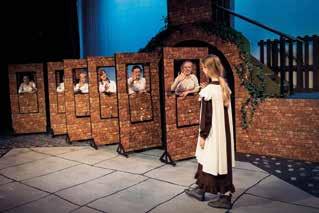
Other year groups built on previous successes. The Removes performed a powerful abridged version of The Tempest at the Artrix Theatre in Bromsgrove as part
of the Shakespeare School Festival, and members of the wider school community were able to see the production at its ‘home’ performance in the Wightman Studio. The Removes took to the stage again in the Summer Term to give a moving performance of Private Peaceful. With mature and compelling performances from the young ensemble, this was a thoughtful and thought-provoking production, especially in this centenary year. The Removes’ war theme was an unconscious echo of the WW2 theme established by our seniors this year. Our major production in the John Moore Theatre was Rodgers and Hammerstein’s South Pacific. Handled by an exuberant and talented cast, the toetapping score was performed with gusto, but our superb ensemble also had the maturity to explore the complex subtext with real sensitivity.
The new Lower Fourth cohort emulated the year above as Shakespeare Fest took to the John Moore Theatre stage again. Still only in its second year, it looks like this studentinspired and student-led event is set to be a fixture in the dramatic life of the Fourth Forms. Shakespeare Fest came off the back of yet another uplifting Fourth Form Christmas Show, a platform for a plethora of festive performances showcasing the talents of our younger years. It was also down to the Fourth Form to see out this year’s production work in style, as the last production of the year in the John Moore Theatre was a charming production of The Railway Children. With a moving set, smoke machine and lighting effects galore, the talent and hard work of the pupils involved was a fitting finale to our year.
Even the Fourth Form production didn’t quite mark the end; dramatic events were still at full speed into the final week of term when Sean Hollands from Frantic Assembly led a devising workshop in the Wightman Studio. This capped off a dynamic year of work alongside other visiting professionals, such as Maggie Bain, also from Frantic Assembly, and Mike Southern, co-founder of Stage-Ed. We have also been delighted to welcome so many OVs back to the department this year, those now making their way in the professional industry and willing to share their wisdom with current students aspiring to follow in their footsteps. Judging by the talent on display this year, there will be a fine future generation of King’s pupils shaping tomorrow’s creative industries.
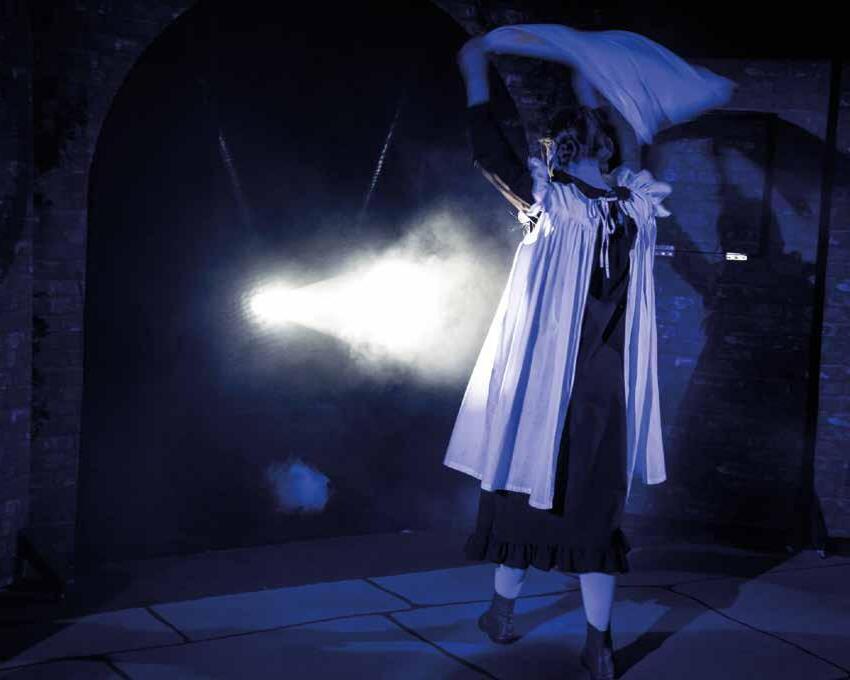
The camaraderie behind the scenes had forged the same community spirit that the Railway Children bring to Three Chimneys Cottage.
Mention The Railway Children and most people have an image lurking in their memories somewhere of Jenny Agutter waving a petticoat at a train. People’s memories of the rest of the story, however, are somewhat sketchier. Nevertheless, it’s one of those titles that seems to evoke a strong sense of nostalgia. Since the book’s publication in 1906 and the film’s release in 1971, every generation has had its own relationship with E Nesbitt’s classic. For many of the Fourth Formers involved in this production, they were coming into contact with the heart-warming tale of the Waterbury children for the very first-time.
The Railway Children may be a children’s story with children at its heart, but the stage adaptation is still written with professional performers in mind, and mainly adults at that. Stationmaster Perks dominates the script as the play’s narrator as well as a pivotal character in the storyline – too big an ask for any one young actor. Instead, six talented young actresses (Hannah Blackwell, Madeleine Cartelet, Posie Forrester, Mary Head, Sophie Pitts and Natalie Shotton) controlled the narrative
– as well as the moving scenery(!) – whilst James Brewer produced an exuberant and superbly paced performance as Perks. Rosie Stanley gave Jenny Agutter a run for her money in the petticoatwaving stakes with a mature and moving performance as Roberta, complemented by Abby Trow’s feisty Phyllis and Max Barclay’s perfectly precocious Peter. The whole ensemble handled the play’s complexities and challenges with real confidence and breathed new life into the various characters who are touched by the children’s charmingly simplistic morality that one good turn deserves another. Amy Ranasinghe played the children’s mother with assured elegance whilst Lucy Wadley threatened to steal the show with her comic timing as Mrs Perks. However, scene-stealing honours ultimately went to Mr Jeavons. As he prepared to say goodbye to King’s, his cameo as Father was a fitting farewell for a teacher who has inspired not just his chemistry pupils down the years, but his Lower Fourth tutees, many of whom were in the cast and crew for this show. There were several little nostalgic tears in the eye at the end of
For their second production of the year the Removes staged Private Peaceful which was adapted from Michael Murpurgo’s novel by Simon Reade. The play effectively relives the life of Private Tommo Peaceful, a young First World War soldier awaiting the firing squad at dawn. He looks back at his joyful and formative early years in Devon and the battles and injustices that have led him to the front line. Passionate and moving, the play is also an unflinching and timely examination of the horrors of war.
The supremely talented ensemble cast worked with great dedication on this play and they managed to draw the best from the script. They were a delightful cast to work with and although the rehearsals were fun, everyone was aware of the moving nature of the story that they were telling, especially in the second act, and treated the subject matter with maturity.
The ensemble worked beautifully as a team and it is very difficult to single out any individuals but especially memorable were Ella Fidlin’s portrayal of the bullying Sgt Hanley and Luke Beever’s performance of Pete, Tommo’s friend. Joni Foster may win the prize for the most parts played by one actor in a King’s play as she performed four roles with great confidence and flair! A special mention absolutely must go to Matt Ferris and Will Hunt who created a believable relationship between the two
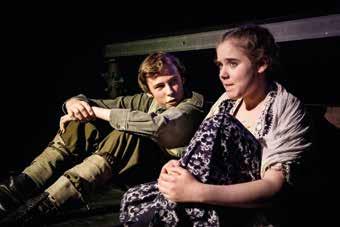
each performance from production team and audience alike as everyone responded to that sense of magic. The camaraderie behind the scenes had forged the same community spirit that the Railway Children bring to Three Chimneys Cottage. Perhaps the best reward for our talented Fourth Formers was the reaction of their primary school audience at the special matinee performance. They were utterly captivated – not just by the excellent performances but by all the production wizardry, designed by Mr Haynes and ably executed by the pupil crew. The buzz in the JMT auditorium as the primary schools left confirmed to the Fourth Forms the success they’d had in introducing another wave of children to this children’s classic.
As exact details of plot points fade into the recesses of our memories again, I hope that the nostalgia for platforms and petticoats remains, and that the 2018 production of The Railway Children raises affectionate smiles for many years to come.
The main roles of Tommo, Charlie and Molly were played by two actors per character to show the transition from childhood to young adulthood. This device was very effective due to superb acting from all parties. Young Tommo was played by Finn Watkins in his first production at King’s, young Charlie was played by an exuberant Joe Lewis and young Molly was touchingly portrayed by Gabby Singleton. As the characters grew up the actors changed to the fantastically talented Matt Ferris as Tommo, Will Hunt, in a welcome return to King’s drama, as Charlie and Lottie Beck Johnson as Molly. This was a particularly poignant performance for Lottie as it was her final performance at King’s.
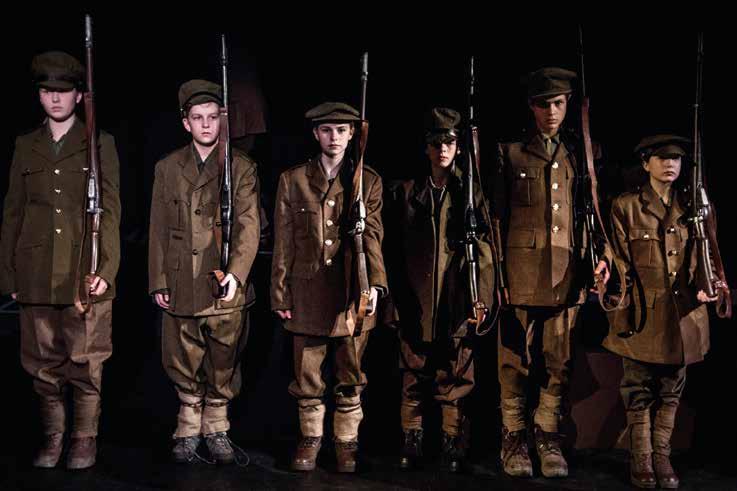
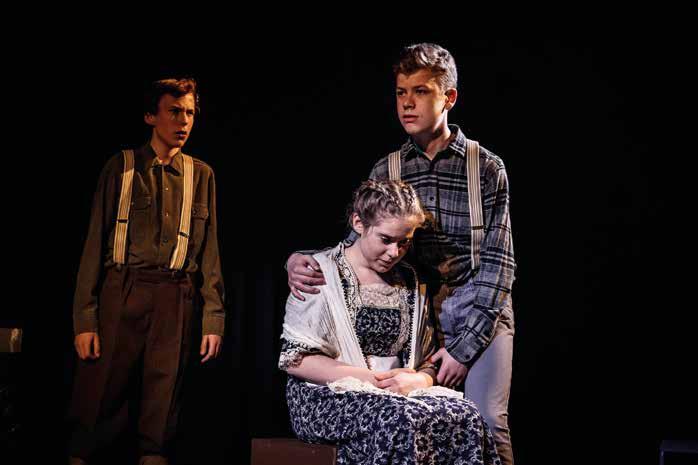
This year King’s participated in the Shakespeare Schools Festival once again and, as we have now come to expect, the performance by the young Removes actors was outstanding.
The Shakespeare Schools Festival is a national non-competitive festival celebrating the works of Shakespeare through working with schools and theatres the length and breadth of the country. It is the largest youth theatre festival in the world and King’s was one of over 1000 schools taking part this year; it included 30,000 participants and 136 theatres. So it is quite a big deal!
The play we chose to perform this year was The Tempest. The group worked on an abridged version of the text and had a half day workshop at the Artrix in Bromsgrove with The Royal Grammar School which was very hands on and lots of fun! They then
were able to rehearse at the Artrix on the day of the performance and perform to a full house in the evening along with three other schools.
This year the play was co-directed by three Fifth Form Drama students Tash Singleton, Ed Poel and Steffi Mountain. These three students must be commended on their professional approach to their work on the play. They were dedicated and focused from the outset and they developed an excellent working relationship with the cast. A fantastic effort from these three young directors.
King’s staged a dark and challenging interpretation of the play using clever lighting and also projections (thank you Mr. Haynes!) to create real magic onstage. Prospero was played with magnificent gravitas by Ella Fidlin and the grotesque Caliban was performed to perfection
I made some amazing memories in `South Pacific`
This year’s school production was `South Pacific`, based on the Pulitzer Prize-winning novel `Tales of the South Pacific` by James A. Michener and with music by Richard Rodgers and lyrics by Oscar Hammerstein II. It is set during the last days of World War Two in an army base on an island in the South Pacific and the plot consists of a fairly light-hearted storyline which is over-shadowed by some darker events and undertones, including that of racism.
by Daisy Beedie. Amelia Davies played Ariel with gorgeous flair and a poignant vulnerability and Rebecca Darnborough was a gentle but feisty Miranda who worked well with Ferdinand played by a confident Sam Hartley. The ensemble performed with cohesion and skill and the production was a great success. A huge well done and thank you to Niamh Thomas, Amelia Davies and Joni Foster who, as well as performing in the play, worked hard on the musical aspects of the piece.
A special mention should go to our technical crew – Tim Morris lit the production, Will Emsley was in charge of sound and Mr. Haynes was our technical director. Thank you to all for their expertise in overseeing the design/technical aspects of the production and making it look so stunning.

Brilliantly directed by Supreme Allied Commander Shara Parry, the rehearsals
spanned a three-month period, starting in October and finishing in December, with three rehearsals per week on Mondays, Thursdays and Fridays for the chorus and more minor roles- and three to four times a week for the principles, since they sometimes had to come in on weekends as well. Nearer to the start of the production week, there were whole-day rehearsals for the entire cast so that we could actually run through the production from start to finish and see how everything fitted together. We had some fantastic choreography for some of the better known musical numbers

(There is Nothing like a Dame- a personal favourite of mine- and I’m Gonna Wash That Man Right Outa My hair), effectively taught by Admiral Kym Lane and well demonstrated on some occasions by Fleet Admiral Simon Taranczuk!
Speaking of which, `South Pacific` has a memorable soundtrack with a lot of songs that stick in your head for weeks afterwards- beautifully played by the band of King’s musicians, some of which managed to get involved with the action that was happening on stage! Again, they
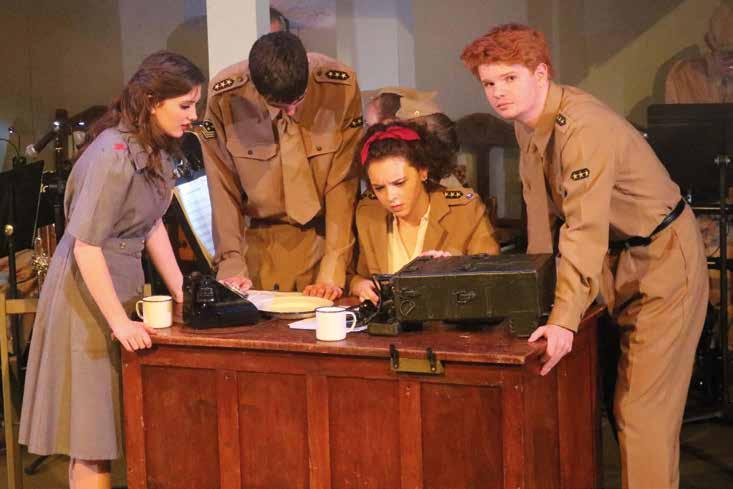
only an hour or so after school ended so that we could get into costume and makeup for the start of the performances. Each audience was absolutely fantastic- but I would have to say that Friday night, the last night, was the best! Everything ran smoothly
think it will be easy to forget his performance alongside Nellie in the song Honeybun!
But a school production is not just all about the actors and musicians involved- we had a fantastic makeup team and brilliant stage
managers such as Admiral Lou Turner and Vice Admiral Imogen Gunter, without whom the production would have almost certainly failed! The sound and lighting were incredibly managed by Captains Sam Ness and Will Kelley and to top it all off, we had a set stunningly designed by Secretary of State Paul Haynes, which really helped to bring it all together. All in all, I made some amazing memories in `South Pacific` and I will always hold it as being among the best times I had at King’s! It was swell!
Esme Blinman-Wilson, School House
Between the 2nd and the 3rd of February 2018, the GCSE drama students embarked upon the annual trip to London. The two days were not only beneficial to the students in broadening their theatrical knowledge, but also gave an insight into the world onstage and behind the curtain, which was both hugely exciting and inspiring to the many budding actors within the group.
The trip began in true theatrical style with a lengthy coach trip filled with some questionable renditions of everyone’s favourite songs from Broadway and The West End. Before even arriving in the capital, the melodramatic performances en route had created a buzz of anticipation only found in eager drama students. We arrived at our hotel, situated near Covent Garden and London’s own ‘theatreland’. Here we met with our tour guide Mike who was going to ensure we reached our activities at the allocated times and, also make the whole experience even more fun. The drama students had been lucky enough to have already met Mike previously that year in a workshop for our set piece of text, Willy Russell’s ‘Blood Brothers’, in which Mike had performed and had returned to that year. This meant he was not only a friendly face, but someone we could all question on his time onstage and from him, widen our understanding of our set text which he knew and loved. Our first activity of the day was a guided tour of London’s largest and oldest theatre, The Theatre Royal. After a quick saunter around the array of shops of Covent Garden, we were ready for our tour. It was an amazing experience for us all to go behind the scenes of such a prestigious theatre. We learnt about the history of the building and those who have worked within it and were told the haunting stories of the ghosts of both previous audience members and actors. The sheer expanse of the stage, the countless number of seats and being able to see props and costume from the theatre’s current show, ‘42nd Street’, all thrilled the students and increased the desire of many to be on the stage themselves.
piece by the same company we had seen the year before, we had high hopes, and they were exceeded. The use of slapstick comedy coupled with a hilarious script executed perfectly by the cast made for a show packed full of the kind of laughter that makes your eyes water and your tummy ache. As a result, we all came out discussing how much we had enjoyed ourselves and how soon we could buy tickets to see it again.
The following morning, everyone awoke eager for the day ahead. We put on our best ‘dancing gear’, but there was a serious lack of legwarmers and spandex considering we were on our way to Pineapple Studios. As we approached the famous neon sign, the level of hysteria rose. Before our session, we had enough spare time in which to watch a stunning ballet class. We were incredibly lucky that we were to take part in a session with Lucy Jane, a former cast member of the musical ‘Matilda’ which has taken the world by storm in recent years. We began with a high intensity warm up that was used by
and even a few tears. Everyone put in an amazing amount of effort and enthusiasm so that we created a slick and powerful performance. It was a once in a life time experience that left many of us in awe at the intensity and skill put into a piece of theatre. We left the studio smiling from ear to ear, lost in the tiny part of the world of musical theatre we had entered.
To make the earlier events of the day even more special, we then got to see a performance of Matilda in the West End that evening. The globally famous show has got this title for a reason and we all basked in the breathtaking stage craft and music. We were able to watch the choreography we had learnt that day come to life in a colourful and immense way which, in a sense, created a connection between each of us and the action onstage, something that made us all really appreciate and enjoy the performance before us. The show itself was breathtaking with its bright and cleverly designed set, the hugely talented cast and the wonderful music and as we all rose for a well-deserved standing ovation, it felt almost as if we were celebrating the whole trip itself coming together in this moment.
As we approached the famous neon sign, the level of hysteria rose.
the cast of the show to prepare them for the energetic action onstage. Most of us were familiar with the show and its music, so when we told that we would learn the choreography to the hit song ‘Revolting Children’, there were many gasps, squeals
That evening, after a largely anticipated meal at Pizza Hut, we headed off to Leicester Square to watch ‘The Comedy About a Bank Robbery’ in the Criterion Theatre. After many of us had laughed our way through ‘The Play that Goes Wrong’, a

Heading home through London’s narrow streets, marvelling at the dazzling lights of numerous theatres, the same renditions of our favourite songs were revisited, yet undoubtedly with far more passion.
Sophie Mitchell, School House

During the year we said goodbye to peripatetic teacher Lesley Cox who retired at Christmas. Lesley was a very popular teacher of flute and singing, directed the flute ensembles and assisted GMG each year with the Orchestral Workshop. Brass teacher, Hazel Whitefoot, also leaves King’s to return to university to study Archaeology. We welcomed Marie McNally to the department in September. Marie is a very experienced teacher, examiner and performer and we are delighted to have her with us. This year’s new music gap student was Sebastian Hill. Seb made a fantastic contribution to the department as a singer, trombonist, pianist and composer. He wrote two pieces for the choir, one for the Carol Service, the other for the Music Tour. He goes on to study Music at Oxford with a Choral Scholarship at Magdalen College.
with such great weather, we were able to make use of the gardens at the end of June.
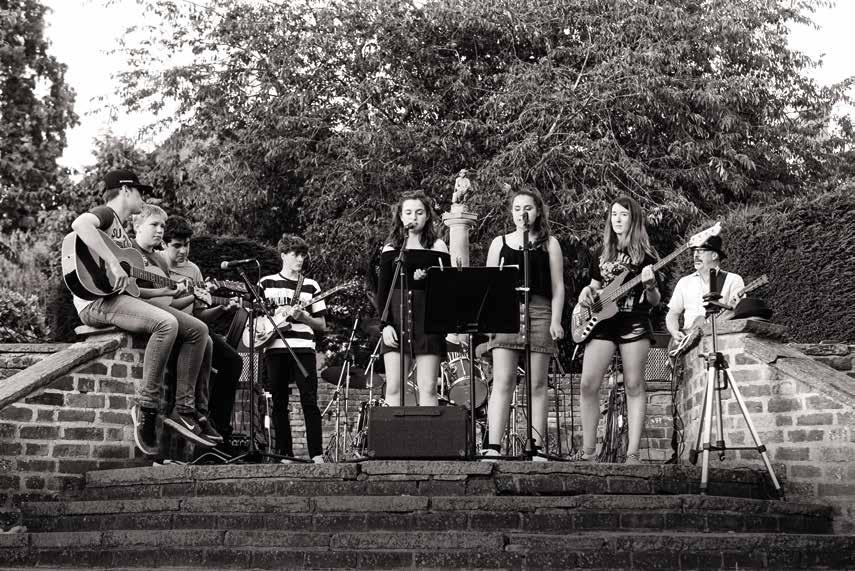
One of the successes of this year has been the large numbers of pupils taking part in solo concerts such as the Young Performers’, Informal and Keys. It has been particularly pleasing to see many pupils from the Removes and Fifth Form taking part for the first time.
As ever, the first part of the school year is taken up with the two music competitions beginning with House Music. With over 50 soloists taking part this year, it became necessary for this part of the competition to take place on a separate day. There were numerous categories and 11 of the winners took part in the winners’ concert together with the top three houses. School House won the House Song with a rendition of Count On Me by Bruno Mars. The adjudicator was the Cathedral’s Director of Music Peter Nardone, and the winners’ concert was an excellent celebration of music at King’s in the first few weeks of the school year. Just before half term it was the turn of the Fourth Form with all twelve forms performing in College Hall with lots of enthusiasm, costumes and fun! 30 pupils took part in the solo section, with 10 of them performing in the winners’ concert. The winners of the song competition were L4E and U4E.
In October three King’s pupils took part in a trumpet masterclass in College Hall with Simon Desbruslais, an internationally renowned soloist. Andrew Gee, Oliver Griffiths and Henry Bowers were given individual guidance on aspects such as musical shaping, technique and posture.
This was a joint venture with the English Symphony Orchestra. Later that day Simon gave the world premiere of a new trumpet concerto in a concert at Huntingdon Hall.
The biennial senior musical took place in December. Following on from The Sound of Music we continued with another Rodgers & Hammerstein production, South Pacific. Everything about the performances was excellent including the on-stage army band, which was mostly comprised of pupils. The girls had fun with ‘Wash that Man’, while the boys let their hair down with ‘Nothing like a Dame’. The lead singing from Dani Brennan, Henry James, Michael Burgess and Sarah Jackson was a particular highlight.
Another biennial event this year was the music tour, this time to Venice during February half term. A week before the tour the Choir and Chamber Orchestra had been invited to take part in the Cathedral’s lunchtime concert series. This was an excellent way to showcase the music for the tour to the audience, mainly comprised of parents, together with the regular concert goers. Over 50 pupils and staff enjoyed 5 busy days of music and exploration in this amazing city. The main event was taking part in Mass at St Mark’s Basilica on Sunday morning. Many of the group enjoyed a visit to the famous Opera House to watch Rossini’s The Barber of Seville and there were two further concerts, one in Padua, the other in a beautiful but freezing cold church in Venice. We also spent one morning in Verona and had plenty of time


to explore the streets of Venice. It was great to have a large number of parents and family support us on this tour at the concerts and service.
In March an orchestra of seventy players comprising pupils from King’s St Alban’s, King’s Hawford and the lower three years of the senior school gathered in the John Moore Theatre for a day of music-making at the annual Orchestral Workshop under the leadership of GMG. After a demanding but rewarding day of rehearsals, a supportive audience was treated to a fine concert of pieces for full orchestra, string orchestra and wind band, punctuated by solo performances from some of our leading young instrumentalists.
The termly school concert gives our larger ensembles the opportunity to perform in College Hall. All of the ensembles have been given some difficult music this year and they have risen to the challenge, particularly the First Orchestra with performances of Schubert’s Unfinished Symphony No. 8 and Elgar’s Imperial March. The King’s Swingers continue to perform with aplomb and have played a repertoire of jazz standards and more contemporary music this year. Gap student, Seb Hill, arranged Life of the Party from the musical Wild Party for the band with guest singer Dani Brennan. In the Headmaster’s review on King’s Day, the Upper Sixth members of the band, together with singer Georgie Lewis, gave an atmospheric performance of It’s a Wonderful World to the large audience in the cathedral. The Wind Band
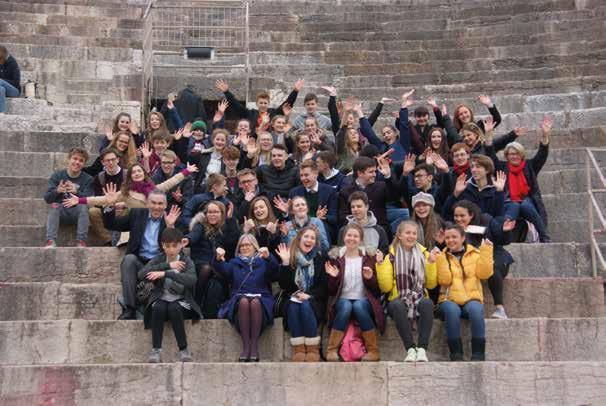
has performed some rousing repertoire in these concerts throughout the year and for the first time gave a performance in the cathedral during the eve of Ascension Day service. This proved to be very popular and will be repeated next year. Another performance opportunity was during the May Fete. The King’s Swingers, Georgie Lewis, Hollie Avery and Alfred Annable together with the U6th band Blackout, entertained everyone on this scorching hot day.
The Open Mic Nights have welcomed many new performers this year, particularly from the Lower Remove with a new band and numerous singers. The boathouse continues to be a great venue for these occasions, though for the first time, with such great weather, we were able to make use of the gardens at the end of June. In addition to having so many performers at these occasions we continue to innovate with the technology we require to improve these events. The theatre manager Mr Haynes has taken on the sound for these events and we now have access to a digital sound desk which enables us to set up bands more easily.
Music Scholars, Natasja Enthoven, Tamara Enthoven and Jia Jie Huang continue to be successful at local music competitions and festivals such as Solihull and Hereford as well as Worcester. The Enthoven sisters also passed their ATCL diplomas with distinction. Jia Jie gave what was described as a world class piano recital in Worcester Cathedral as part of their lunchtime recital
series. Another Music Scholar, Andrew Gee, passed his ARSM trumpet diploma with merit. This year has seen the largest number of entries for practical music exams with nearly 250 successes across St Alban’s and the senior school with ABRSM, Trinity and LCM. This includes 25 pupils who have achieved grade 8. With over 500 instrumental lessons taking place each week we have an excellent team of peripatetic teachers who continue to contribute much to the success of the department.
At the end of the Lent Term, two Lower Sixth Music Scholars were busy with two large-scale musical events. Together with OV, Aaron Prewer-Jenkinson in the title role, Michael Burgess and Amy Heptinstall had solo roles in Opera Worcester’s fullystaged production of The Marriage of Figaro at the Swan Theatre. Both gave excellent performances in an entertaining production. A few days later they had very different solo roles in the Malvern Festival Chorus’s performance of Handel’s Messiah at Malvern Priory. They both won a competition organised by the chorus to find local young voices and sang a number of the solos alongside the highly acclaimed professional tenor, James Oxley. As part of their prize they had some excellent private coaching from James.
The music department is beginning to develop relationships with local orchestras. At the beginning of the summer term, in collaboration with The Orchestra of the Swan, the UR GCSE music class had a visit
from two Latin American performers, Lucia and Pedro, who gave an outline of the characteristics of the music and played some examples on piano and guitar. Having collaborated on the trumpet masterclass with the ESO at the start of the year, they returned in the summer holidays to hold their Junior and Senior Orchestral Workshops in College Hall which included numerous King’s pupils, including U6th pupil, Harry Jackson, who helped coach the percussionists.
In the last week of August, Michael Burgess, together with OV Charlie Pollard, took part in the Millennium Youth Choir residential course at Salisbury. This included a live broadcast of Choral Evensong on Radio 3. A special moment was the first ever performance of the introit, Morning Thoughts, composed by OV Matthew Kelley specifically for this service.
The music department is continuing to develop its social media presence. Soundcloud is now well established (King’s Worcester Music) with 400 tracks from concerts and open mic nights which have been listened to over 30,000 times. The Venice Music Tour was the first opportunity to tweet on our new page@KSWMusicSchool. There are some 365º videos of some of this summer’s Open Mic Night in the gardens available on You Tube by searching for King’s Worcester Music Department.

On Friday 16th February, we set off from school at 2am to fly to Venice Marco Polo Airport from Heathrow. We stayed in a place called Lido di Jesolo near the beach. I had an absolutely amazing time not just sightseeing and shopping but singing in some beautiful churches and one of the most famous basilicas in the world. On the first day, despite the fact that they had had very little sleep the previous night, about half the group went to the opera in Teatro la Fenice to watch “Il Barbiere di Siviglia”. The show was amazing and everybody that went had a great time. I stayed and had my first meal in the hotel and explored Lido di Jesolo on foot.
The next day, we departed for Verona. We visited the massive, ancient Arena di Verona, which was wonderful. There were gladiators (dressed up actors!) standing outside the Roman amphitheatre where my friends and I had a photo. After spending the morning in the amphitheatre, we went and had huge pizzas in a very nice restaurant adjacent to the arena. We went
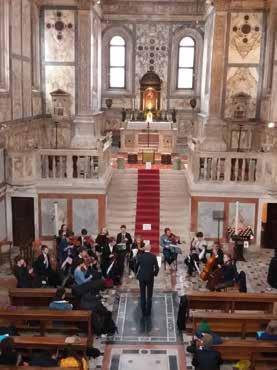

to visit Juliet’s balcony, a very busy tourist attraction, and went shopping!
Later that afternoon, we arrived in Padua where we were going to perform our first concert and take part in our first mass at Chiesa Santa Sofia. We had some free time to visit the town and then headed back to set up. After participating in mass where we sang, we then performed a special rendition of Rat-a-plan in the concert along with Dormi Jesu and O sacrum Convivium. Here, the Chamber Orchestra also performed and so did the Keys choir and the vocal quartet who were all very good.
On Sunday, we arrived in rainy, windswept Venice for the first time where we were going to perform mass at midday. We had some free time when we arrived in St Mark’s Square where I met up with my parents before they came to watch us sing in the service! The interior of the building was spectacular. It was just like a sea of gold! We performed well and the acoustics of the building made the choir sound even
better. We had more free time later on. My friends and I went back to my parents’ hotel and then we went to Rialto Bridge and the Fondaco Tedeschi shopping centre.
On our penultimate day, we went back to Venice and visited the Doge’s Palace, which was outstanding! We went up the bell tower in St Mark’s Square where there were amazing views of the whole city. We made our way to the next concert venue, Chiesa di Santa Maria dei Miracoli, which was atmospheric, but extremely cold. Finding the ferry to take us back to the hotel was a challenge, but eventually we returned and Mr Hill did a brilliant job at hosting the Venice Tour Awards!
The next day on the 20th February, we travelled home after a very successful, music-filled and fun tour. I thoroughly enjoyed myself and it was nice to know that hundreds of other people have been and will go into a place where we have sung together as a choir.
Felicity Quiney

It has been another busy and successful season for King’s athletes, with even more fixtures and competitions entered than in previous years. During Saturday fixtures, there have been some excellent individual and team performances, against some of the top schools in the region. A particular highlight was the Junior Girls stunning relay victory against 8 teams at Bromsgrove School. 15 school records have been broken throughout the season, including many that have stood for a number of years.
Track and Field Cup
The Track and Field Cup is a unique competition where every member of the team has to compete in both a track and field event to score points for the team. The JB, IB and IG teams all won their respective County competitions with the JG finishing 2nd. This meant for the first time all four of King’s teams qualified for the Midlands A final, competing against the top eight schools in the region.
In the County Championships, 25 pupils qualified for the final of their track event or finished in the top eight of their field event, with medals for: George Francis – 800m; Sam Lowe – 400m; Will Revill – Hammer and Shot; Sophie Welburn – Triple Jump; Nathan Kelly – Hammer and Shot; Owen Marles – Javelin and Triple Jump; Luke Beever – Triple Jump. Following on from their success in this competition, Nathan, Owen and Luke competed for Hereford and Worcestershire at the prestigious Mason Trophy. All three performed admirably but special mention must go to Nathan Kelly who finished 3rd in the Shot Put throwing 12.27 metres.
In the Junior County Championships for those in L4 and U4, 14 pupils represented the District fantastically amidst the heatwave. The performances from all pupils were excellent and an impressive eight medals were won along with four school records being broken. Gold medals were won by: Evie Hawkesford-Johnson – 1500m; Ed Jukes – 300m; Adam Rutter – Discus; Purdy Newson-Tonks – Relay; Silver medals were won by: Henny Allan –Hurdles; Harry Paddock – High Jump; and Bronze medals were won by: Henry Halford – Hurdles; Purdy Newson-Tonks – 100m.
A joint King’s St Alban’s and King’s Aquathlon team swept the board at the annual Malvern Aquathlon on Saturday 19th May. The event comprises a 100m swim followed by a 800m run and was a tough ask in the balmy sunshine. Strong competition was offered by 12 schools and over 140 competitors at under 11 and under 13 level. King’s won both boys’
Sports Day
Wulstan won the senior title with Choir winning the removes title. Individual awards went to Sam Lowe, Sophie Welburn, George Monce, Alex Ward and Henry Collinson, Louisa De Vos, Willem Humpries, Louis Hira, Mia Mathewson and Sophia Winfield.
The 4th form event was also very hotly contested with many excellent
and girls’ team events, at both age levels, and therefore won the school shield. On an individual level, Henry Hawes came second in the boys under 11 category despite playing up a year and Bella Barry came third in her U13 girls’ category. The teachers were delighted with the results but also with the level of camaraderie between the ages and the tremendous sportsmanship on view.
performances despite the boiling conditions. Wins went to U4E and L4D, with the individual awards going to Ed Jukes, Lucy Short and Oliver Hill.
Congratulations to every pupil who has represented the Athletics team this season and helped it be the most successful season to date.
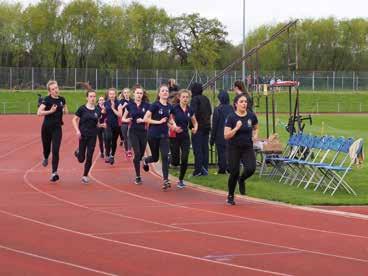
For the first time three King’s pupils qualified to compete for Hereford and Worcestershire in the Combined Events Championships. Luke Beever and Louisa De Vos, competing in the Junior category, did the Pentathlon, finishing 10th and 18th respectively. Willem Humphries, competing in the Inters category, did the Octathlon and finished 10th. This was only the 2nd time they have competed in the full event and shows their promise for the future.

For the Boys’ U12 ‘A’ Cricket Team, it was a season of storming, forming, and eventually norming.
The season consisted of three very pleasing wins: start, middle and finish. In moments, the boys showed real class in their skill levels, but sadly lacked consistency over an 11-game season.
As always, there are plenty of highlights and a battling 48 from Jamie Thorp comes to mind. Having had a difficult time for a few games previously, Jamie steppedup and showed everyone what a talent
The U13s commenced their pre-season build-up with Friday evening net sessions from early January. I had heard good things about them from their performances in the Lower Fourth and could see their potential straight away. What impressed me at the very first session was not so much the skill level on view, but their ultra-committed approach to training and their desire to improve.
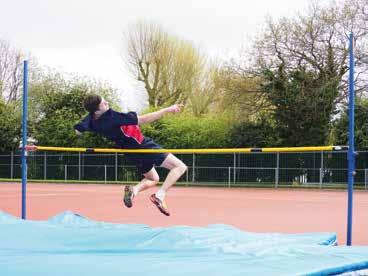

he is. Other notable performances came from Monty Jelfs 100* in the final game of the season. It was a brutal innings which had plenty of disdain for the bowlers and, again, reminded himself of what he can achieve when he’s focussed. Ollie Brealey was invaluable behind the stumps and an excellent lieutenant to Luke Barrington.
If there were awards for the season, then George Lock would win Most Improved Player of the Season. Out of nowhere George has become a key component to the team. It’s been a joy watching him progress - especially with his bowling
and taking important wickets at crucial times. Another is Ed Bowers who would win Team-man of the Year; he’s shown astonishing levels of commitment to his team mates for someone his age.
We’ve had a lot of fun along the way as well. From the cheering on and honouring of our team mates to singing Oasis: Wonderwall on the bus back down the London Road, after every journey, as the finish to the day as a team. TB
From that very first session onwards the approach of the boys didn’t change one bit; they were always 100% committed and very well-mannered. As a coach you spend an enormous amount of time with the cricketers and what makes or breaks the season, far more so than results, is the attitude of the players. This year’s cohort have been top notch in that respect. Cricket
was no bad-mouthing of opponents at any stage, regardless of the sledging they occasionally received in return (quite why some teachers at some schools choose to tolerate sledging from 12-13 year old boys beats me!). There was no risk of finding sandpaper in the pocket amongst this group! At the end of every game they picked up all their rubbish and made sure all equipment was collected and left tidy for the ground staff. Phil Tyrrell, our Head Groundsman, and his team do a fantastic job and it is essential that the boys show respect and gratitude for the privilege of being able to play cricket in such an iconic setting.
Usually my U13 cricket reports are jampacked with statistics and results, so, for the sake of tradition, here goes. The U13 A side played 12 matches and won 10. The two games they lost were against Warwick, when half the year group were on a Paris trip, and by an agonising 3 runs against Solihull. The boys won the County Cup,

final v RGS. In the final they chased down 148 against Bromsgrove, with George Tomlinson hitting a match-winning 49 not out. The depth of the batting is shown by the fact that five batsmen averaged over 30 – George Tomlinson, Shrav Raajkumar, Joel Cox, Sam Hawes and wicketkeeper Cam Jones. Sam Hawes, with a whirlwind 96 not out against Monmouth, averaged an impressive 40 for the season and opener Joel Cox was the highest run scorer with 393 runs. The top wicket-taker was seamer Barnaby Tripp with 16 wickets at 16 apiece. Leg-spinner Joel Cox took 14 wickets at a miserly 13 apiece, whilst Shrav Raajkumar took 13 wickets at 16. On top of the A team’s success, the U13 B side won the majority of their games, including a 68 run victory against RGS.
Cricket is awash with statistics and the figures for this team are certainly impressive. However, the stats can’t tell you what a super group of young people the 2018 U13 cricket team are. Averages and aggregates are all very well, but they mask the fact that everyone in the side, including Ben Waddington, Ed Kerton, Max Yorke-Brookes, Ben Withnall and Bobby Riddell all had their moments. Whether it be with a sharp catch, a smart run-out, an important wicket or some lower order runs, every single player had his day when he could feel he had made a crucial contribution to a victory. This is my tenth consecutive year as U13 cricket coach. I have coached one King’s side previously who were as talented as the 2018 team. However, without question, the current group are my favourite U13 team of the last decade. Thank you boys – keep working hard, keep supporting one another and stay humble.
This year has seen an enthusiastic and attentive group of boys mould themselves into a strong and adaptable cricket squad. Their eagerness to improve both as a squad and individually has culminated in a good season for both under fourteen teams. For the B team, Marc Koliasnikov, Ned Meredith and Harry Sproule all contributed with the bat on several occasions each to provide a solid platform at the top of the order, whilst Felix Slaughter, Will Emsley and Tom Dobson showed good control with the ball taking an impressive haul of wickets throughout the season. This led to the B team winning in impressive style against the likes of Warwick and RGS.
By the end of the season, the A team players had all demonstrated their talent, they too performing brilliantly against RGS,
Despite winning only two of eight games the U15 side showed plenty of promise. Captain Owen Preston scored heavily at the top of the order and looked a classact. He shared four substantial opening partnerships with Cameron Pipe who curbed his natural aggression for the good of the team. Will Chapman timed the ball nicely, and proved to be a very tidy and efficient keeper; in the Solihull Sixes
A strong second’s squad was made up with a large number of 5th formers along with a few 6th formers keen to contribute. The team was well captained by Sean Jarvis and won over half the games including an excellent victory against the OV’s on King’s Day. This was a great way to end the season.
The strength of the team came in the batting department with some excellent performances throughout the season. Some of the notable performances were
2018 was a momentous year for the cricket at King’s as it saw the introduction of girls’ cricket for the first time. After a huge level of interest was shown at the junior girls’ lunchtime club, a team was entered into the Under 13 Lady Taverners indoor competition in February. The side, ably led by Tamara Marsden, performed well above expectations and managed to finish runners-up at the county finals after beating Aston Academy and narrowly losing to Abberley Hall. It was pleasing to see all the girls making contributions on the day, with Lucy Short providing the bulk of the runs.
Kingswood and Warwick as well as in many other closely contested games. All the boys were able to contribute strongly with bat or ball and Alex Terry, Josh Richardson, Ben Bartlett and George Bartram often displayed their ability with both, Josh making 97 in his first game for the school versus Bristol and 100* against RGS. Joe Clive was active with both the bat and behind the stumps, ever keen to improve both aspects of his game and showing prowess with the gloves when the team needed it. In Ben Williams’ first season of cricket for the school, he’s adapted brilliantly to his roles within the side. Our spin options this year have been provided by Rory Crichard and Ollie Annable who have both begun to master perhaps the most demanding art within the game, whilst Jack Havercroft bowled some
superb spells when thrown the ball. Sam Brealey and Will Wrout have demonstrated patience and maturity in making their moments count with the bat.
Lastly I’d like to commend Bill Wales on a fantastic season as captain. His ability to thrive under pressure is a key aspect both of the game of cricket and generally. Showing maturity beyond his fourteen years, his cricketing knowledge and talent for reading the game has earnt him respect from his peers and coaches.
My thanks extend to all the boys for making this year so pleasurable, the ground staff for their hard work and my fellow coaches, most notably Mr Greenall, Mr Gillgrass, Mr Warren and Mr Le Marchand.
In 2018 we were blessed with consistently hot weather meaning we only lost one game to the rain and didn’t have to cancel a single training session. It was hard to imagine that this was going to be the case as with less than a week of the Easter holidays to go, the 1st XI square was nine feet under water and had swans taking up residence somewhere at deep cover!
overs, outstanding as Malvern finished on 153 from their 20 overs. Tom Gidney, Oliver Tsiquaye and Finn Chance were the other main wicket takers.
he managed to run out all six opposition batsman, which must be a very rare feat indeed! All the front-line bowlers produced good spells during the season but as a unit lacked the sustained accuracy needed to pressurise good batting sides. Ed Thrush bowled several excellent spells on dampish wickets, and ended-up as the leading wicket taker; his head position was
Alex Lowe scoring two fifties and a 48 not out alongside solid performances throughout the season from Seb Hood and Sean Jarvis. However, the most memorable batting performances were delivered by Charlie Francis. Against Solihull he came into bat with 2.2 overs left in the game and managed to score 29 not out off 12 balls.
There was some excellent performances with the ball as well as the bat. The opening pair of Jack Baker and Hamish Stigant
The girls cricket programme continued to develop throughout the summer term with an after school club being made available to the junior girls. There were also four fixtures arranged against Bromsgrove, Winterfold, Abberley Hall and RGS Worcester throughout the summer. After a loss to a strong and well drilled Bromsgrove side and a postponed game against Winterfold, the girls finished their season strongly, with wins over Abberley Hall and a comprehensive victory over RGS, thanks in part, to three wickets in one over from Lucy Wadley!
an example to all! Marcus Head Gowing finished his time at King’s in style with a three wicket maiden in his last game. The squad was small numerically but trained in a purposeful and committed manner throughout the season. Owen proved to be a thoughtful and upbeat captain who clearly had the respect of his team mates.
MCP/JJM
made it difficult for any opposition team to find any rhythm and as a pair they bowled very well taking some key wickets early on in matches. The highlight of the bowling was the spin of Zain Hussain whose best performance was a 6 for 28.
Overall some excellent performances and clearly some excellent talent to develop in the future. I look forward to seeing how the team develops.
Unlike the weather, it is fair to say that on the field the 1st XI had a more inconsistent season. One huge positive throughout was how well the bowling unit performed each and every week. The biggest compliment I can pay is that at no point did we come up against a team who could match the bowlers we had. In fact, by the end of the season, we had no fewer than seven players taking ten or more wickets. Ed Burgoyne was undoubtedly our most consistent performer and finished top of the wicket tally with 23 for the season. His off-spin proved very effective in the middle to late overs in the 50-over format and during the first powerplay in the T20 games. Jamie Hammond provided us with raw pace and, when injury free, tore through top and middle orders at will, certainly the case against RGS Worcester. Jamie ripped through their top order, which saw RGS bowled out for 63 – a definite highlight of the season! Teams also really struggled facing the unerring accuracy of Amelia Kite. Amelia performed well throughout the season but no more so than in the T20 fixture against Malvern College. Amelia returned figures of 3 for 11 from her 4
The girls programme is likely to continue to flourish in 2019 with further fixtures being arranged and both Under 13 and Under 15 teams being entered into the Lady Taverners indoor tournament. We also have a wealth of talent in the lower school with a number of girls playing club cricket and two girls, Lucy Wadley and Lydia Goodman being part of the Worcestershire CCC programme.
A great deal has happened this year in fencing, with many competitions fought and achievements reached. We have fought many matches, including two juniors fencing very well in an open event at RGS and a team who went to Cheltenham Ladies College, performing admirably with some wins and a few close calls. These, with a couple of visits from the whole RGS club, both schools winning two and losing two matches, has made for a very successful year. The St Alban’s students, coached mainly by the U6 students, have been advancing well with their grade 1 and bronze award, hopefully passing in the near future. The juniors have been working on their chosen weapons, foilists working towards their bronze award and the sabreuse and epeeists improving their skills in the weapons. Other achievements include myself gaining my Level 1 foil
Having such a relentless but varied attack often meant we were chasing more than gettable targets but throughout the season the team found it hard to score the ‘big runs’ and have the patience and application required to put together the partnerships needed. This area certainly improved in the latter stages of the season and three of our best victories came from chasing against a strong MCC side, Brighton Grammar from Melbourne and the Old Vigornians. Henry Armstrong provided excellent stability in the middle order and often showed great maturity. Henry’s superb 75 not out against Monmouth saw us recover from 36-6 and post a target of 176; a target that we defended fairly comfortably in the end. Joe Sullivan, Oliver Tsiquaye and Jamie Hammond were the other main run scorers.
A real highlight of the season were our performances in the various T20 competitions we entered. Having seven bowling options and being electric in the field really helped to restrict opposition teams. I feel that the shorter format also benefitted the positive style of batting the team try to employ. A further win against RGS and Dean Close saw us progress to the regional finals of the national T20 competition where we lost to a very strong Malvern College side, a game in which we didn’t really compete at our best. It was

coaching qualification, Rosie Stanley and Amy Hall performing very well against other fencers in a recent competition, and Simon Lucas, Henry James and Rhys Watkins teaching and fighting exceptionally. At the same time, Rhys has been working towards his next level in epee. It will be very sad to say goodbye to the fencing, the very small but extraordinary club.
Thomas Ratcliffe, Kittermaster
also brilliant to make the finals day of the Chesterton Cup (held at New Road county ground) after beating Wrekin College. On the day, we lost narrowly to Bromsgrove by 11 runs but congratulations should go to Finn Chance for finishing with figures of 5 for 23 from his 4 overs.
Special mentions should go to Joe Sullivan and Cameron Jones. Joe was a rock at the top of the order and provided a good platform for others to bat from. Joe also kept wicket brilliantly and brought real enthusiasm in the field, even more impressive whilst having to captain at the same time – big shoes to fill in 2019. Cameron who is in U4, made his 1st team debut and kept wicket superbly against Warwick. Excitingly, we only lose two from the bowling attack and talented cricketers coming through the school from various age groups will help to fill the void of the departing batters and wicket keeper.
Huge thanks must go to Gilly who added expertise and knowledge at all the training sessions and worked tirelessly to help the season run smoothly, Angus Guthrie who was also a great addition to the coaching team, and to Josh Moorhouse for his scoring and fielding talents each week. Thanks also needs to go to our fantastic grounds team who prepared excellent cricket wickets for both matches and training, even more amazing after the Easter flooding we had! Their continued effort and support is most appreciated.
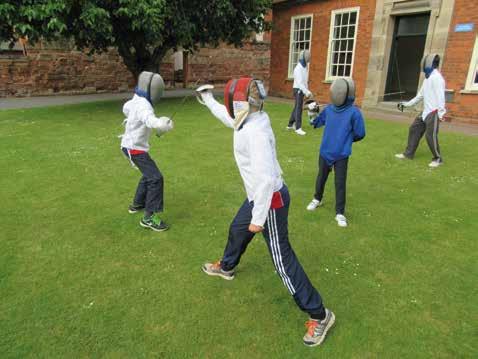
Pre-season Football Camp, 2017
On the 4th of January, 20 senior footballers went to S.L. Benfica, in Lisbon, Portugal, for the Football development pre-season camp for an action packed five days. Pupils from Fifth Form up to Upper Six trained in the academy where the senior and junior teams train on a daily basis. They rubbed shoulders with current and future stars who were training on adjacent pitches during our training sessions. King’s pupils received four top class training sessions
by SL Benfica’s full time professional coaches and played matches versus local academy sides C.D. Cova de Piedade (2nd division club) and Galitos FC. The 1st team drew one and lost one and the 2nd team lost both, but all games were very tight. We also made time to fit in a behind the scenes tour of the magnificent 65,000 seater Estádio da Luz, have lunch at the stadium and visit the club museum. We also visited the Oceanarium in Lisbon,
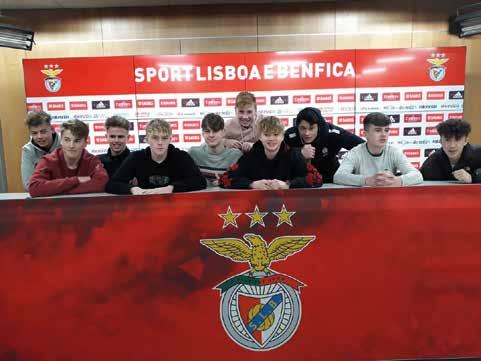
had immense fun playing Bubble Football and did some sight-seeing in Lisbon town centre. If this was not enough, we attended and watched Sporting Clube de Portugal play C.S. Maritimo, who stayed in our hotel the night before the game. This did not bring them any luck as Sporting won 5-0. Overall a fantastic trip and experience in preparation for what will hopefully be a successful football season for our young senior team.
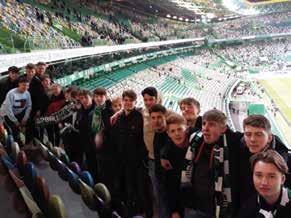
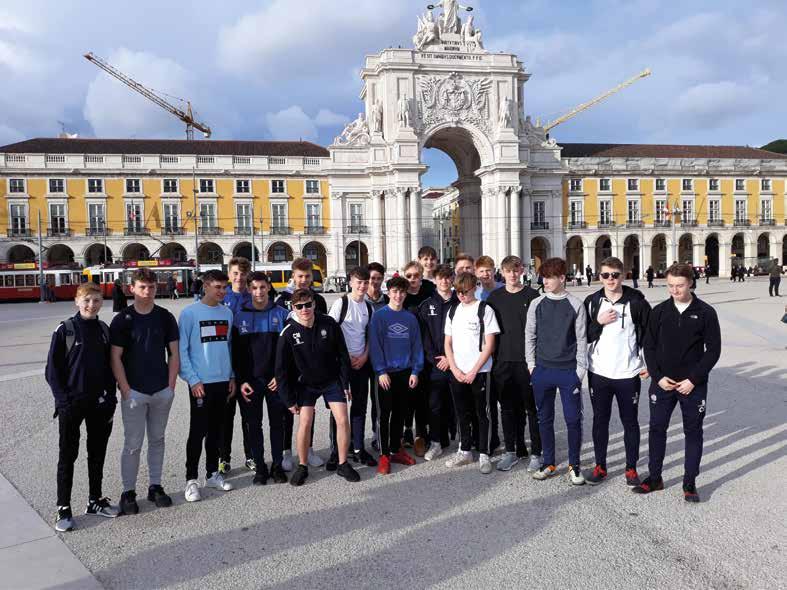

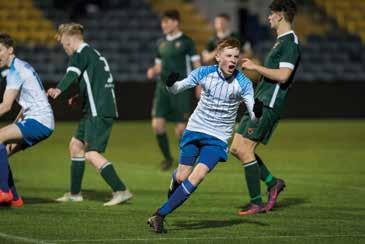
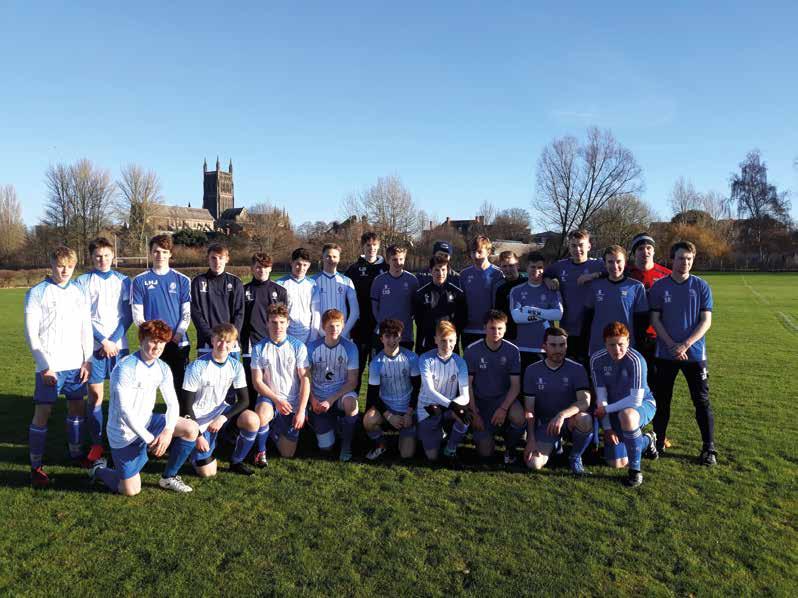
the weather or unplayable pitches.
We started the season with a narrow 2-1 defeat away to Bristol Grammar School, but we managed to finish the season in a much stronger position, winning 4 and drawing 3 of the remaining 7 games. It has been a transition year with 7 of the 1st XI being Fifth Formers; Ciaran McGee, Jimmy Poole, Will Caddick, Jack Backer, James Unwin, Finley Chance and Alex Lowe. They stepped up to the challenge fantastically and can certainly provide King’s football with a bright footballing future.
We, of course, retained the Challenge Cup in front of the thousand-strong crowd courtesy of a 2-2 draw with the Grammar School. King’s got off to a flying start due to a mix-up in the RGS defence which allowed Sam Lowe to shoot low into
by relying on the passing game which had served them both so well in the run up to the game. However, on a big pitch and a surface perhaps best suited to the oval ball game, continuity proved difficult and both sides experienced some tricky moments in defence. Just when it seemed that King’s would go in at half time with a slender advantage, RGS struck. Breaking from the back with speed, a speculative cross from the right was missed by all the King’s defenders before being expertly dispatched on the far post by skipper, Max Hawkesworth. The second half saw RGS begin brightly and, after just a couple of minutes play, a defensive mix-up presented Will Saunders with an opportunity which he gleefully accepted. Play switched from end to end and substitutes were made good use of by both sides and, as the second half wore on, King’s came more
clock winding down, a pin-point cross from Jimmie Poole was met with a fine header from Chance. Despite the RGS keeper pulling off a remarkable save, Chance was the quickest to react and dispatched the ball into the bottom corner. At the whistle it was the King’s players who celebrated most as, for the second year running, a goal in the final minutes was enough to decide the residence of the Challenge Cup for another year.
At the end of the season, Sam Lowe won the hotly contested top goal scorer award by scoring the winner in the final game and James Unwin won the player of the year with consistently solid performances in each of the games.
2nd X1

The second team also benefited from a number of Fifth Formers boosting the squad. They gained valuable experience playing at U18 level, putting them in a good position for their entrance into the Sixth Form. Performances across the year and team members varied but they managed to finish the season with more wins and draws than defeats. In the last match versus Monmouth on Saturday, they showed great character to turn the match around and win 4-3 with an Oliver Tsiquaye hat trick. We look forward to seeing them now progress into the 1st team.
The U15As won three out of their seven games and came a close second to very strong Chase and QEH teams. Luke Coupland played a major role in most of the goals we scored, and Willem Humphreys made a real impact when moved forward from right back. Captain Aston CampbellKerr set a good example through his impressive work-rate, and displayed an excellent range of passing.
The highlight for the 15Bs was a 7-0 defeat of RGS. The defence was well marshalled throughout by player of the season Matt Doughty.
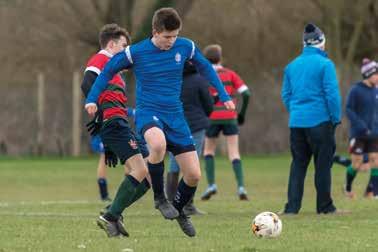
The U14s, captained by Will Lebray, played attractive football all season. Alex Terry and Ollie Blakemore finished as top scorers and Dylan Briggs was named player of the They had a solid back four of Lyman, Collinson, Amos and Bartrum, and Sproule made some crucial saves in goal. Attacking pace out wide was provided by Havercroft and Will Blakemore and Bartlett joined Briggs and Lebray in the centre to control many games. The best performances came against RGS, Wolverhampton and Monmouth and the future of football at King’s will certainly be very positive as they move up through the school.
The Under 13As started the season with a 4-3 win against Hereford Cathedral School away which included a hat trick from captain Joseph Ward and a stunning match winning save from keeper George Hira. Next up were The Chase in Malvern and another nail biting 4-3 win away from home but this time on astroturf. The highlight this time was Captain Joseph Ward being brought down for a penalty in the dying minutes and stepping up and scoring for another well-deserved hat trick. After a cancelled away visit to Bristol due to snow we hosted local rivals RGS at home. Against tough opposition Charlie Moffat in goal kept out many strikes to help earn a 2-2 draw. Next up were Wolverhampton Grammar and several B-team players had to step up due to a rugby 7s fixture clash. The boys played extremely well and only lost 3-2 with the final kick of the game. The final game of the season saw a first match against new opposition with Liverpool College travelling down to visit during their half term. Too many goals to talk about individually but a 7-5 win for King’s was well deserved. Well done boys, a great season.
Our first game was against Hereford Cathedral School and they were a lot bigger than us! In the first half we were 2-0 down and, knowing we had a big challenge ahead, we set out for the second half. Alex Evans scored a great solo goal but Hereford bounced back with a counter attack that led to their third goal. We still fought on. I hit the crossbar with a chip shot. After another goal each, we lost the game 4-2. Next we played the Chase on their astro. Like Hereford, they struck first, on a counter attack when we did not have enough people back. However, Ollie Tranter’s great shot from inside our own half was enough to secure a 1-1 draw. Our third game was against our local rivals RGS.
We started strong and were probably the better side but as the result of a lot of bad finishes, we went into the break 0-0. Alex soon broke the deadlock and we had a 1-0 lead. However, the long balls over the top from their keeper started to look more dangerous and they eventually equalised. We kept going but a few good saves resulted in another draw. Our final game was against Wolverhampton Grammar and they were very good. They were completely on top of us and won 5-0.
Although we didn’t manage to win a game we displayed great determination and gained lots of experience of playing together as a team and are all looking forward to next season.
The 1st team have had a busy season, playing 17 matches and taking part in the County Tournament and the Independent Schools Hockey Cup for the first time. The team featured many Year 11 pupils who made the step up to senior hockey successfully. The commitment and work ethic of the team was pleasing to see and they were led successfully by Captains Ellie Hollis and Daisy Ellis and Vice Captains Lucy Stratton and Izzy Mackintosh.
Unfortunately their run in the ISHC was cut short, but the team put in an incredible performance against Abbotsholme School. They found themselves behind early on, but fought hard to get back in to the game with some strong attacking play and excellent saves from Izzy in goal. Abbotsholme equalised with the last touch of the game from a short corner to take the match to extra time. The girls gave everything and were unlucky to lose to another last second goal.
The team started the County tournament with a hard fought draw against Malvern College and then couldn’t find a way past a strong Bromsgrove defence, with both games ending 0-0. They then found the way to score and beat Malvern St James and RGS comfortably, unfortunately leaving them just one goal short of the required amount to qualify for the Midland Finals, finishing a frustrating 3rd
The girls went into the Indoor County Tournament a little short of confidence in this format of the game, but they surprised themselves with the quality of the hockey they produced despite a slightly depleted team. They enjoyed good victories against RGS and Malvern St James, lost to a strong Malvern College team and drew with Bromsgrove, again missing out on qualification due to goal difference.
Through the rest of the games the girls enjoyed a win and draw ratio of 65%
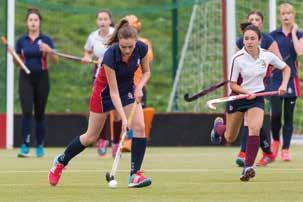
The 2nd team have played some promising hockey this year and have continually developed as the season progressed. It has been quite a young team, mainly made up of 5th and Lower 6th form pupils who were led by Georgina Hammond.
The girls played 13 games throughout the season and either won or drew 7 of their games and lost 6. This statistic does not show how tightly contested the majority of the games were and how they were unable to utilise their goal scoring opportunities. This will be a focus for the team moving forward to the next season. The girls ended their season on a terrific high after beating RGS 1-0 in a closely fought game. It was the girls’ determination and desire to win which resulted in their deserved victory.
RW
and were particularly successful in the second half of the season, losing just 1 game in their final 10. The girls scored an impressive 46 goals and conceded just 25. For many of the team, the highlight of the season was the 2-1 victory against RGS. Despite the freezing conditions, the girls fought hard and gave everything to earn the win. Undoubtedly the player of the season must go to Izzy Mackintosh for her excellent season in goal and numerous important saves she made in key moments during matches.
A special mention must go to Cerys Preston, who continues to play for the U18 Wales squad as well as achieving her first cap for the U23 squad. Immie Gillgrass has also made her international debut for the England U16 squad and scored in her first tournament with the team.
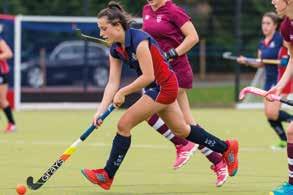
U15
There was a very positive start for the U15 girls with a pre-season friendly against Malvern College, where the team won 3-0. Things were looking hopeful with good attendance to training as they began to work towards the first round of the National Cup. They had a tough first round draw against Rugby School. The team played exceptionally well and put everything out on the pitch, but unfortunately lost 2-1.
The girls played a total of 12 games either winning or drawing 7 of their games. The girls had notable victories against Pates, Solihull, The Chase and MSJ. Personally, my coaching highlight of the season was their victory against RGS in December. After a couple of defeats the girls had been feeling despondent and felt the odds were against them. However, their team spirit rallied and they came away with a fantastic 2-1 win.


RW
U14
The team initially found it difficult to adapt to the new challenge of 11-a-side hockey and moving to a much bigger pitch. Despite this the team continued to train hard and showed great energy in matches, meaning their performances improved every time they played. The team suddenly clicked when playing against The Chase and achieved a fantastic 9-0 victory, with 6 different girls getting on the score sheet.
I have had an enjoyable season coaching the U13 team. The girls have had a fantastic attitude to training and matches throughout the season. The sessions have been fun and the girls have been brilliant to work with, always helping each other and making sure they can get the most from the sessions.
The U13 A team have had a mixed season and played some games in tough conditions – their final game was in the snow that occasionally turned the pitch white! However, the girls showed their spirit and didn’t complain about the conditions. The girls played 16 fixtures.
The U12s have made an excellent start to their Senior School Hockey careers. Collectively the 4 teams played in 37 matches and won an impressive 25 of these, drawing a further 6. A big thank you to 6th form pupils: Lucy Stratton; Abby Deller and Rosie Conyers for their coaching help throughout the season.
A highlight of the season was the A team’s excellent performance at the County Tournament which saw them qualify for the Regional Tournament. On a very hot
It was really positive to see the Lower and Upper Fourth participating in their interform hockey tournaments either side of the Christmas Holidays. All the girls played with great enthusiasm and excitement, showing team spirit as well as excellent sportsmanship, acknowledging their opponents’ effort with three cheers and gratitude after each game. The winners of the Lower 4 tournament were L4D who scored an impressive 6 goals in the tournament. The winners of the Upper 4 tournament were U4D who also scored an impressive 6 goals in 3 games. Well done to everyone involved.
In the County Tournament, the team were lacking several key members of the squad through injury but a number of U13 players stepped up fantastically to aid the team. Although the results were not what the girls would have wanted, they defended well as a team but struggled to convert attacking moves into goals. The team finished the season with 5 wins, 3 draws and 4 losses. A special mention to Izzy Trow,
Katie Ransford and Flo Edmonds for the excellent progress they made throughout the season. The player of the season was Charlotte Morgan, for her excellent tackles in the defence and her confidence to drive forward with the ball to create numerous attacking opportunities.
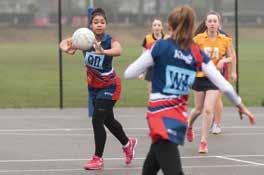
The most notable performance was during the Bromsgrove tournament where the training and the girls’ resilience came together and they came from behind to draw and win the games against Trent College and Bromsgrove A respectively. Another highlight for the girls was the opportunity to meet Kate RichardsonWalsh, former women’s hockey GB captain and Olympic Gold medallist. The girls had a lot of questions for her and had the chance to hold her gold medal!
The U13 B team had an enjoyable season with many of the players making appearances in the A team. The girl played
9 fixtures and had victories against MSJ, Bromsgrove and The Chase. Over the season both the A and B team combined to play a couple of 11-a-side fixtures. They were victorious in both, which is very promising moving forwards to next season.
Both the C and D teams have played some impressive hockey and enjoyed the opportunity to play in fixtures against RGS and The Chase. They improved throughout the fixtures and there were some well worked team goals.
With over thirty girls regularly attending weekly training sessions, it proved to be a challenging year for the coaches to ensure all the girls were included in matches throughout the season.
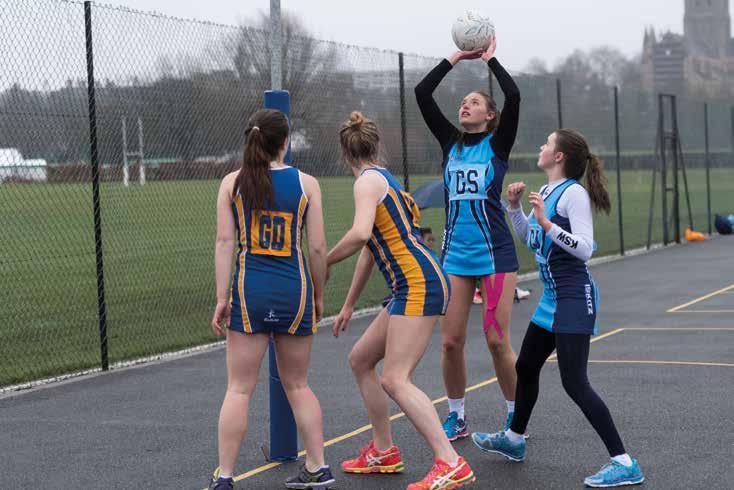
day, the performance of every member of the team was outstanding which saw them win 3, draw 1 and lose 1 of their group matches. They just missed out on a place in the semi-final by 1 goal but finished the tournament in a very creditable 6th position.
The girls were also very lucky to meet Olympic Gold medallist Kate RichardsonWalsh. As well as getting lots of their kit signed, they were inspired to continue working hard to reach their hockey goals.
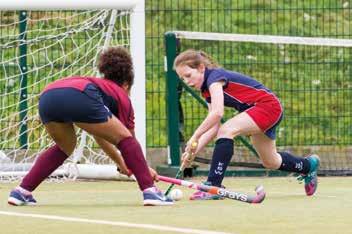
King’s hosted the Boys County Indoor Hockey Tournament on Friday 1st December and it was the first time we had ever entered an Indoor team. The boys played Bromsgrove School in the first game of the tournament and started strongly leaving them 2-2 at half time. Unfortunately they were unable to match Bromsgrove in the second half and the game ended with a 4-2 loss. The next game was against Malvern College. They managed to step up a gear and put Malvern’s defenders under a lot of pressure. It was an end-to-end match with chances for both teams. King’s were winning with just a few minutes left
on the clock and Matt Whiteside made 2 great short corner saves to give us a 2-1 victory. The whole team played excellently in their first matches together but special mentions to: Will Hood; Joe Sullivan; Seb Hood and Matt Whiteside.
Matt Whiteside continues to make excellent progress in goal and recently helped his Mercia Lynx team win the gold medal in the Futures Cup. A fantastic achievement Matt: well done!
The under 12 A team had a tough start in the opening match of the season against Solihull. As a new team, the girls took their time to get into their stride and work with new players and it was not until the final quarter that they regained their confidence and started to fly. This was too late and we eventually lost 11 goals to 16. Bablake and King Edward’s Bath gave us the competition that brought out the best in our team with some dynamic defending from Maisie Lyons, Lydia Goodman and Freya Sinclair securing convincing wins in both games. The attacking duo of Olivia Sproule and
Abbie Diaz in centre court provided the shooters of Lizzie Poole and Lucy Wadley great support. By January the girls were playing with confidence and speed, none more so than in the Bromsgrove match; despite starting slowly and being down in the first quarter, they soon realised they could outplay their opposition and went on to win 24 - 12. Jaimie Lewis joined the squad in the second half of the season and provided valuable support in the centre court. The district competition was a battle between RGS and Kings Worcester where we ended in a draw with the spoils going to
The U12 B squad had an outstanding yearthe only KSW team to be unbeaten all season! Notable victories include the 18-1 win at King’s, Bath and 18-2 at Bromsgrove. In March, they claimed the District title with relative ease beating RGS in the final 5-3. The girls played excellent attacking netball with Maddie Worth, Becca Stone and, after Christmas, Scarlett Skipp proving to be a formidable force in the D. Centre court play was always athletic with Rosie Stone, Francesca Sly, Natalie Shotton and Bea Morgan. In defence, the girls worked well together as Lois Unwin and Megan Sweeney grew into a confident partnership.
It has been an absolute pleasure to work with a group of girls who listen to advice and support each other to bring such excellent results. Watch out A-team, we are after you! CMN
U12C & D
The U12C and D teams have had a really enjoyable season this year. Despite the squads continually changing, with new combinations being introduced throughout the different units, the girls rose to the challenge and have secured significant progression in the core skills of passing and footwork.
The C team had a tough start against Solihull, losing 10-1. Nevertheless, as the next match approached, they got well underway with training, and all of the players were enthusiastic and willing to
RGS from a count back on goals. The year ended as it began with only our second loss of the season against RGS where the absence of one player affected the whole team and the girls struggled to find their form.
This is a talented group of girls and if they can build resilience and learn to play for each other, they will be a force to be reckoned with in the years to come. Most improved player: Abbie Diaz; most valuable player: Maisie Lyons.
improve. The team began to gel together, becoming a force to be reckoned with and consequently winning the remainder of their matches. The D team had 3 matches overall and put up a good fight in the first - only losing by one with some fantastic displays of defence. They finished the season on a high winning 16-3 against RGS - our shooting was on fire! I look forward to seeing both teams progress upwards into the U13 and hope they rise to the new challenge.
The A team squad have had a mixed season but have remained positive towards training and their fixtures. Club training has been highly important this year to ingrain different methods of attack and defence, plus working together more as a unit. Many of the players in this squad celebrated County success at the beginning of the season, securing a place in the squad. They are: Poppy Sawyer, Tamara Marsden, Emily Williams and Amy Ranasinghe, putting themselves amongst the best in the area, training week-in-weekout. This group of determined young players will go into their Remove years with a strong netball foundation and something they will need to build on as they head into the District and County competitions.
The U14A team have had a season that is going to be so instrumental in their development towards senior netball. They have had both heartache and outstanding victories over some schools that are renowned in the netball world. This will hopefully fuel them to improve and adapt in their next season together. Despite the disruption caused by the snow leading up to the Christmas holidays, the season saw the squad play nine matches and take part in two tournaments. The girls enjoyed victories over some local teams such as Malvern St. James and RGS, with the latter being the final match of the season, and they gave a performance that filled me with much confidence for the team in future seasons together. The vision through court and every single player’s defensive determination
Similarly the U13B team enjoyed a mixed bag of results, winning half and losing half of their games. Captaining the side was Olivia Capewell who did well to organise and motivate her squad throughout the season. The squad had convincing wins against MSJ, KES Bath and Dodderhill; working well together from defence to attack, enabling the shooters to make the most of the shooting opportunities that they were given. It was particularly good to see the squad rotate and trial new positions when needed to, showing good versatility and the ability to adapt.
The U13C team started strongly with a good competitive game at MSJ, winning 6-4, showcasing what they had remembered from their Lower Four year. Many girls filtered in and out of this squad depending on availability so it was a little difficult to build units. However, all players committed to training and were unlucky to narrowly lose their last two fixtures against Hereford and RGS, 9-10 and 12-14 respectively.
U15A
12 games played, 11 wins, 1 loss and 551 goals scored. Needless to say the squad has had an extremely successful last season as removes. With a scoring average of 46 goals per game this is a statistic that any regional team would be happy with. Even though they have enjoyed extremely successful wins against Red Maids, Maynards and Millfield, their only loss of the season came in the quarter-finals of the Independent Schools Cup, a game that I am sure they will look back on thinking they could have won but also learning from their loss. The physicality that came with entering this league for the first time saw the squad come up against teams that have different styles of play, which I know
and team work was outstanding. Their victories over Bablake and Millfield in particular is confirmation of this team’s talent, and is proof that the semi- final of the county tournament was not the limit of their ability. Their losses against King Edwards Bath, Hereford Cathedral School and Solihull School were always reflected upon by the team and individuals, which is indicative of their desire to be the best that they can be. I look forward to seeing all that they can achieve in their upcoming season, and want to remind them of the purpose of playing this sport – to enjoy it!
Louise Harris, Holly Wylde, Isobel Mackie, Molly Carter, Abby Sly, Jemima Garnier and Charlotte White.
The U14B have had a really promising season. They had a tough start, but over the course of the year, after regular training and developing stronger partnerships and team dynamics, they settled into a steady rhythm. The goals scored against them (33) indicates a very successful defensive work ethic from the defenders Amber Haywood and Catrin Lucas in the circle, as well as the centre court players Catherine Coupland and Sophie Spencer. Three fixtures, against Malvern St. James, Bablake and RGS, saw the squad achieve more than triple the oppositions’ scores and this success must be credited to the effective and dynamic attacking players of the captain Sophie, Georgina Hiorns and Maggie Marshall. It has been fantastic to see this squad transform and finish the season in a very strong and positive way, and hopefully they will carry on going from strength to strength next season.
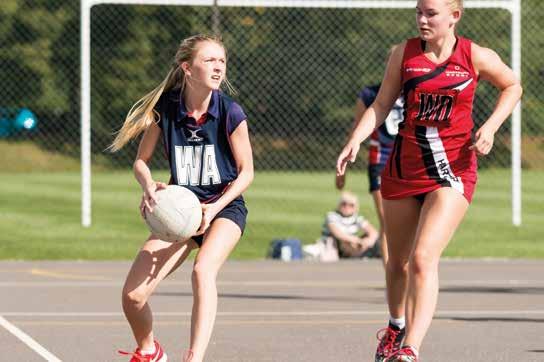
The squad have faced a little bit of a turbulent season due to poor weather and squad changes, but their commitment to training and determination when playing fixtures has been outstanding. They had a slightly shaky start to their season with two losses against Goldophin and Latymer School, and Malvern Ladies’ College, but the latter was a fantastic game with a score of 18-21 indicating that the team fought with grit and determination to the end. The really impressive part of their season was their win against Millfield School, a reputable netball school, with a score of 9-2. The low score of the opposition suggests that the KSW squad’s defensive play was very strong and disruptive. Their work ethic for their coach and for their team has been exemplary, and it is something that will always set them in good stead to improve as individuals and as a team. I cannot wait to see them play and continue to improve over their netball career. GSB
has spurred them on to ask questions of their own individual performances but also how to better their overall team performance; alternating between what they are comfortable with and ideas that lead change and ultimately player reflection. Nonetheless, they finished the season convincingly and will be welcomed onto the senior netball circuit next year.
My congratulations must go to Georgie Thorp, Sophia Winfield, Mia Mathewson and Cara Nyamekye who, last summer, were selected for one of the Severn Stars NOVA’s. This has allowed them to gain access to more specific tailored court time as well as strength and conditioning
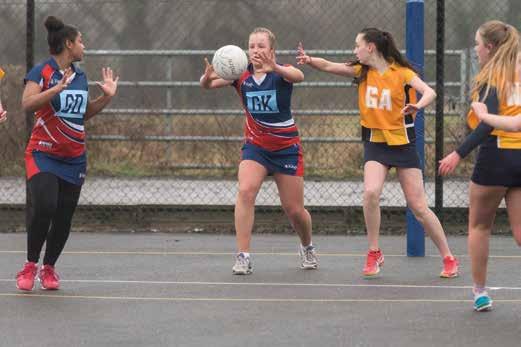
Throughout the season this squad might feel as though they are in the shadow of their A team counterparts. However, with 9/11 wins in total, this squad of players is more than capable not only to hold their own against other teams but more importantly they train as hard as they play when against their peers. With such depth within this age group it has been useful to pull up from this squad when needs be and every time I have had to do so, each player has done so admirably. Convincing wins came against CLC, Bablake and RGS. The only two losses came against two strong sides, Marlborough and Millfield. However, I believe the squad would all reflect and say that these games were winnable.
I am eager to see this squad of players filter into the senior teams as they will certainly add more strength and depth.
EKM
session each week. Moreover, a lot of the squad are also very talented in other sports and I would like to thank them for their commitment, openness and honesty during the season whilst trying to juggle their other talents.

The U16 squad consisted of a very talented group of girls and with the coaching expertise of EKM and GSB we were looking forward to a very exciting year and the girls certainly delivered this through their hard work, dedication and competitive spirit.
Captain Hannah had this to say:
The U16’s have had a very successful season. Our determination and brilliant work ethic allowed King’s to begin the season by becoming District and County champions. The most memorable highlight of the season was when we qualified for the National Finals after winning against strong opposition, Higham Lane, in a wellcontested match. A special mention must go to Natasha Beattie and Cara Nyamekye who made some excellent interceptions in defence, while in attack Ellie Deehan and Mia Mathewson were consistently strong and created some great passages of play.
Also Georgie Thorp shot accurately and could always be relied upon to produce the goals. Overall, Nationals was a fantastic opportunity and a great experience for everyone. Despite the poor weather conditions, we were placed a respectable 14th in the country.
Hannah has been playing in the Wasps Hub all year and is currently training as part of the U17 long squad in the hope that she will get selected for the squad of 12 that will compete at the final NPL tournament at the end of July.
Squad: Hannah Latham, Ellie Deehan, Anna Kimberley, Emma McGrory, Tash Beattie, Alex Ward, Keeley Sentance, Georgie Thorp, Sophia Winfield, Mia Matthewson, Cara Nyamekye, Libby Evans
With the amalgamation of three-year groups, this 2nd VII took time to gel and work as a team with some heavy defeats from Millfield and Malborough College early in the season. It was not until the January that we began to find form and along with the return of Ellie Hollis to the netball scene, adding expert defending from the back, we found our confidence and skill to produce some excellent play
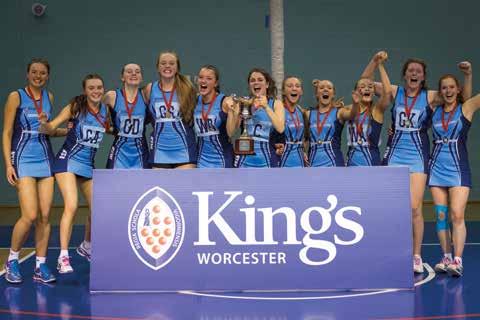
Vice-
Captain: Rosie Clines
Squad: Lucy Stratton, Hannah Latham, Sophie Wellburn, Rosie Conyers, Emma McGrory, Lucy Warburton, Natasha Beattie, Ellie Deehan, Abi Alcock and Lauren Green
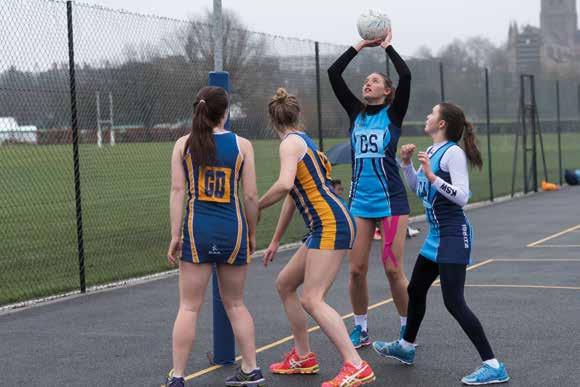
and convincing wins against Hereford Cathedral School and Bablake. The last match of the season was against RGS at the Arena and despite the lack of a full house in this ‘warm up’ game, the team rose to the challenge and played with enthusiasm and drive to secure a win 23-19.
M.M.L.
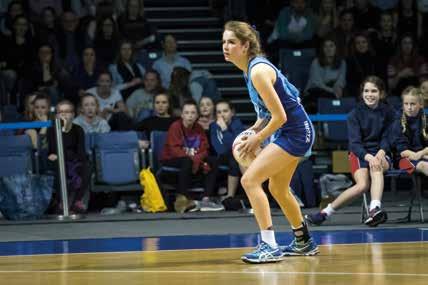
This was my second year in charge of the 1st VII squad and with pre-season and the home King’s tournament starting well, I was confident that the girls would have a positive season, focussing even more on up to date netball that would serve them well against any opposition. Due to the strength and depth of this squad, I decided to enter them into the Independent School Netball Cup (ISNC), a National competition that sees the top independent schools battle it out to be crowned the top school in the country. Not knowing what to expect, an away trip to King Henry’s put us in a strong position going into the next round. Drawing Maynard’s at home was a blessing and one that the whole squad knew would have the KSW community’s full support. Yet, as ever in a game of netball, you have to take the good with the bad and the girls narrowly lost out to a clinical Maynard side, 39-40. However, this was one of only two one-goal matches of the whole season and I know the girls will agree that it is always better to be on the winning side! The start of the spring term saw fixtures come at the squad thick and fast with annual matches against Marlborough and KES Bath always being a good indicator half way through the season; the squad looked to be gelling well together. With convincing wins against Malvern College, Hereford Cathedral and Bablake, the Superball was drawing ever closer and so a trip to
Millfield against the runners-up of the ISNC was in order to really test the squad physically and mentally. Playing a side of such quality really opened the girls’ eyes, yet they were instrumental in trying out some of the focuses we had concentrated on in training. Which led nicely into the Superball two weeks later. The seven that started flew out of the blocks (something I have been trying to get the girls to do all season), converting their own centre passes and putting immense pressure on the oppositions attack, creating 2-on-1’s throughout the court, eventually forcing errors and converting to goal, and taking the win by one, 45-44.
With the addition of fifth form players at the beginning of the season it was important that this squad settled quickly, a job that the captain must make a priority. Izzy has done fantastically well at all aspects of being a captain and has been a true role model. She is someone that is so busy but still makes time for the sport that she loves; the younger players I know look up to her. Also a special mention must go to Rosie who has battled injury and set-backs all season but has also been a valued and committed member of the squad. Lastly good luck to all of the players that are moving on and thank you.
EKM

J14 Girls - Coached by Mrs Bladen Lower Remove is the first opportunity for pupils to experience rowing and, overall, it was a really positive and productive year.
We started the season by learning the principles and techniques of rowing, and with lots of hard work and guidance from the coaches we managed to improve considerably in a short space of time. This was great motivation giving us the confidence and inspiration to improve even more throughout the next term.
As the winter drew near we had to stop rowing on the water which meant that there was plenty opportunities to improve our fitness with Mr Sharp’s ‘Hour of Power’; this involved copious amounts of running, rowing on the ergos, and core exercises.
The early season’s harsh weather meant that we were honing our skills on the indoor rowing machines but this did not prevent us from progressing and we were soon able to make the leap into single and double sculls.
This was a big change from the quads and rowing machines we were used to where one forgivable mistake in a quad would lead to a capsize in these smaller boats. The highlight of the year was undoubtedly Rowing Camp. The Lower and Upper Remove went to Shrewsbury for the best
We worked hard through the long winter until it was time to get the boats back on the water again. We had plenty of practice in our quads, especially at rowing camp, because we knew that on the horizon were many regattas. So much time was spent practising that we even managed to make friends with a few swans!
Our first regatta at Birmingham was a very cold experience, but we learned a lot, coming away with plenty of valuable experiences. Next came Shrewsbury Regatta, which was good fun; partly because of the kind weather, but perhaps more importantly because all the quads rowed brilliantly. By the time Worcester Regatta came, we were not only more prepared, but had a bit more experience; the highlight being when one of
part of a week, but unfortunately, the river was flooded so we were unable to get much river time. Nevertheless, we still managed to put in some relentless land training. After the coaches sourced us a smaller, but by no means less beneficial lake, we finally got some time on the water. As it was 300m in length, it made for some perfect sprint pieces and race simulation, which provided us with really useful drill sessions. Additionally, there was a pontoon that allowed us to practise backing on to a stake boat.
the girls’ quads beat RGS taking them into the semi-final against Worcester Rowing Club. This was a very close race with the King’s girls very narrowly missing out on a place in the final! Despite one capsize, the doubles rowed well too and, the loss against Worcester did not discourage us. Indeed, if anything it inspired us to aim higher and do even better and made the 9-1 victory against RGS even sweeter.
We are all looking forward to improving even more next year with our new coaches. We are very excited to see what the future brings. We would all like to thank the coaches for their time, dedication, enthusiasm and effort in helping us have an amazing first year of rowing.
Once the river had receded, we went back to Shrewsbury for their Regatta. This was great fun, with the first race being between our A and B boat. Sadly the A boat was then rowed through in the next round, but the event as a whole was a fantastic introduction to racing.
Thanks to all the coaches for their help and commitment. We are looking forward to next year.
J15 Girls - Coached by Mr Booth
The J15s have worked hard this year in Rowing and had a rewarding season because of it. The winter term focussed on fitness training to ensure we are at our peak fitness for head races and the upcoming regatta season.
Over Easter our junior squad headed to Shrewsbury School for our annual Removes Camp. This is an important exercise in the run up to regatta season. Unfortunately, with the River Severn flooded, we were left unable to row on the water. Despite this, we continued to train in the indoor rowing facility, on the ergos and in the gym. Then,
swapped for a row – much to everyone’s relief. Finally, as the camp drew to a close it was time for the “Squad’s got talent” singing competition, where we created a fitting rowing parody to ‘I would walk 500 miles’. Overall, we all had great fun whilst preparing ourselves for upcoming races.
After camp we went straight into the regatta season. Shrewsbury was one of the first events and we entered three girls’ quads, all of which reached either the quarter or semi-final and one quad reached the final, but just missed out on a gold medal, achieving second place.
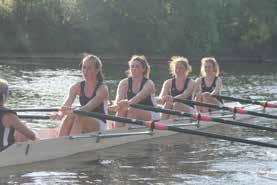
Junior Sculling Regatta at Dorney Lake where our top girls’ quad took home 10th place. Following this another quad then achieved 1st place at Worcester Regatta and the doubles successfully raced again. All of these regattas lead up to National Schools’ Regatta at the end of term – our most important event of the year. Here one of our girls’ quads came home with a rewarding 14th place in the country, and all of us with National Schools’ Sweatshirtsprobably our favourite part. All of the J15 girls enjoyed this year’s rowing and cannot wait to carry on together next year.
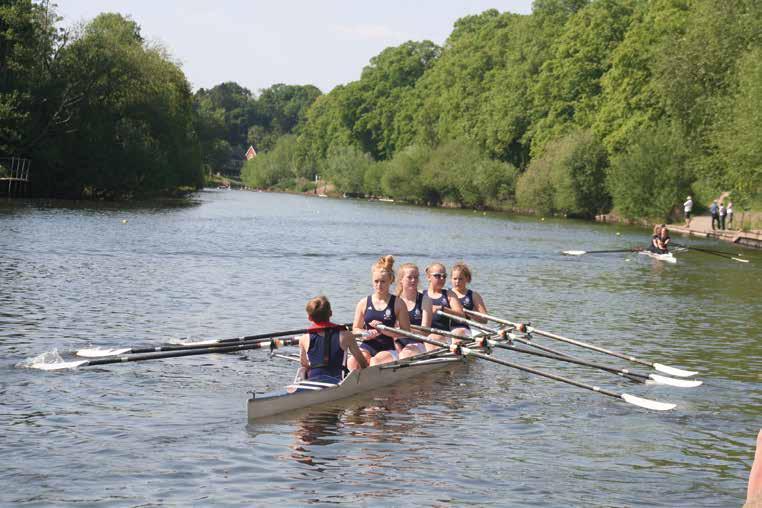
J16 Girls - Coached by Mrs Young
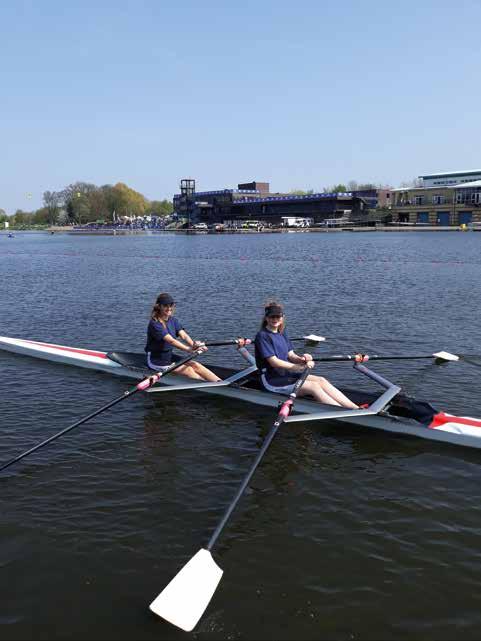
The Head season started off with great success at Monmouth Head with Nemi Edwards, Caitlyn Hawkesford-Johnson, Liberty Colebourne and Emily Havercroft placing 1st in the WJ16 quad and both Nemi and Emily gaining gold medals in single sculls. The following heads included a silver medal for Liberty in the Worcester small boats head and the National Junior Sculling Head where the A and B quads
J16 Boys - Coached by Mr Houghton
The J16 boys got off to a great start with success early in the Head season. A quad, featuring David Watson and Tom Eaton, placed gold at Wycliffe Big Boats. Of course, this season was filled with high intensity training sessions, most notably, the weekly ‘two bridge run,’ which sparked an epic rivalry between Mark Salkeld and Mr Houghton. The reward for such training was outstanding success at the British Indoor Rowing Championships. Harry Flockhart achieved gold in the intense 500m sprint and bronze in the 6-minute event. This was followed by
placed 24th and 13th respectively in their categories. The year finished off with some indoor events including the British Indoor Rowing Championships where Jemima Moss placed in the top ten for both of her individual events and along with Emily Havercroft and two senior girls gained bronze medals in the senior girls’ relay team. The season ended with the
the joint success of Harry Flockhart and Mark Salkeld, placing 3rd in the relay.
At the end of the spring term was Senior Rowing Camp at Rotterdam. This gave the squad time to really advance through training. After doubles matrix results showed that there was only a second between each person in the squad, concluding that it would be most effective to work together in a quad, composed of Henry Edmonds, Mark Salkeld, David Watson and Tom Eaton. Soon emerged a very clean, efficient boat that
annual rowing camp which took place in Rotterdam during Easter. The girls spent the week training up for regatta season in crews that had been selected after a series of time trials.
The regatta season began with Emily Havercroft and Liberty Colebourne rowing for the West Midlands at the Junior Inter Regional Regatta where they placed second in England and Wales after a very tense side by side race. The squad had great success at the Junior Sculling Regatta with Nemi Edwards, Katie Sweeney, Jemima Moss and Caitlyn Hawkesford-Johnson placing 10th overall in their coxless quad. The WJ16 double also rowed strongly into the A-final and finished 5th overall. After training hard during exams, the ‘A’ quad raced at Henley Women’s regatta which, despite not qualifying, will be a useful experience ready for next year. The season finished with King’s Regatta in which the girls had lots of fun, racing in coxed fours for the first time. This was a great end to a year of hard work and success, in which all the J16 girls improved considerably.
Emily Havercroft, Bright House
showed exceptional overall cohesion. Ollie Gill also performed well in another quad featuring senior rowers.
Despite having limited numbers, the J16 boys’ squad improved tremendously over the course of the year. This bodes well for collaboration with the Upper Sixth in the senior squad next year. The award for best rower went to Mark Salkeld, most improved to Henry Edmonds.
J15 Boys - Coached by Mr Mcdonald
The J15 boys began the head season strongly with a series of events that they performed well in whilst developing their technique and adapting to their new coach, Jack McDonald. Monmouth, Wycliffe and the National Sculling Head were some invaluable learning experiences before the J15 Boys’ quad of Olly Timlin, Tom Angell, Alex Checkley, Rob Newman and coxed by Olivia Howard went on to finish the head season on a high, winning their category of the Worcester Big Boats Head. The squad also got involved in some indoor rowing competitions in the lead up to Christmas. Notably, Thomas Holland, Tom Angell, Georgie Thorp and Beatrice Beever performed outstandingly well to achieve a silver medal in the British Indoor Rowing
Championships mixed relay hosted at the Lee Valley Velo Park in London.
The regatta season began in Birmingham, on the Edgbaston Reservoir, where the quad took victory again with the help of Thomas Holland and Archie Stephan. The double of Tom Angell and Olly Timlin also pushed hard in an attempt to reach the West Midlands squad. However, despite coming close, they missed out to tough opposition. This was followed by numerous successful races at the Shrewsbury, National Sculling and Worcester Regatta. It was at Worcester that the boys’ quad finished strong in their category only losing to the national champions in the final. The quad was made up of Tom Angell, Wilfy
George, Rob Newman and Archie Stephan who were coxed by Ben Thorpe. There were also valiant efforts made by the double of Olly Timlin and Tom Angell in the semifinal, Ed Robins making his debut in a single and Alex Checkley who raced superbly in the single sculls final. The season then ended with arguably the most important event of the year. The National Schools’ Regatta was another amazing event hosted at Dorney Lake, an Olympic venue, where the boys’ quad shone through again to claim a well fought and respectable 26th place nationally. This was later to be topped off when the boys were joined by Ollie Flanagan to win a silver medal at the inaugural indoor relay aspect of the event!
Thomas Angell, Creighton House
Senior Girls - Coached by Mr Bird
With a large group moving into the senior squad, competition was tough and crew selections were difficult but led to a rewarding and successful year led by coach, Will Bird. The senior girls had a great start with the ‘A’ crew of Alice Evans, Bea Evans, Sophie Lee and Emily Timm achieving fastest women’s crew at Monmouth Autumn Head and later in the season going on to achieve 7th at Henley Long Distance Sculls. At Worcester Small Boats Head, Izzy Copeland, Bea Evans, Anna Jethwa and Amelia Clark won the J17 Girls’ quad which finished the autumn term off on a high. Later at the British Indoor Rowing Championships the senior girls came away with 4 bronze medals earned by Alice Evans, Bea Evans, Amelia Clark and Sophie Lee, a fantastic result for all the girls.
Moving into spring there was huge success at Wycliffe Big Head with the ‘A’ crew and top 8 coxed by Emily Watkins both achieving fastest crews of the day in their categories. Returning to the local territory again, this time for the Worcester Big boats head, Emily Timm, Abi Watson, Kate Emsley and Anna Jethwa won the Women’s IM3 Coxless Quads. Seven senior girls were joined by two senior boys to race in the Novice Men’s Eight category. They beat three boats to claim the gold medal, one from Worcester University and the other from City of Bristol RC and a third comprised of more mixed King’s rowers. The winning eight placed 39th out of the whole event, which had 114 entries.
Rowing camp at Easter led to some vital
training allowing the girls to become completely confident in their boats and do plenty of long distance training necessary for the regatta season ahead. This led to a good performance from the top 8 and second quad at Junior Sculling Regatta and National Schools’ Regatta. The ‘A’ crew performed impressively at Shrewsbury Regatta with cups in the WJ18 Coxless Pair and WJ18 Coxless Quad. Overall, a fantastic year, which I’m sure the U6th girls will remember as they go on to further successes.
The Senior Girls Rower of the Year award went to Sophie Lee and the Most Improved Rower was awarded to Immy Carter. The Coxswain of the Year award went to Emily Watkins.
Senior Boys - Coached by Mr Chalmers
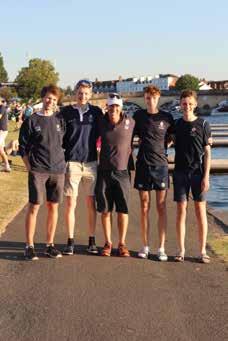
The rowing season kicked off with Monmouth Autumn Head, a shorter but none the less thrilling event. The senior boys entered the quads, pairs and doubles event and took 3rd and 4th in all of them. Not long after, but on more local territory, Worcester Small Boats Head presented another opportunity to familiarise ourselves with longer distance sculling. Head of boats Ollie Colebourne claimed first place in his single, as well as Will Gorner and Zak Rawles winning their events. Later in the year, the British indoor rowing championships yielded two bronze medals for the seniors, in the males and mixed team events. The Wycliffe Big Head yielded more strong performances. Henry Armstrong, Zak Rawles, Tom Eaton and David Watson came away with a first place pennant for their strong performance in the Open Quad Sculls event, covering 4.5km in 17 minutes and 15.5 seconds. Later on in division two, a strong second place was achieved by Henry Armstrong, Charlie Kenny, Will Gorner and Ollie Colebourne in their Open J18 Quadruple Sculls event. Just over a month later The
Senior Rowing Camp - Rotterdam Rowing camp this year was to Willem Alexander Baan, a quiet lake situated near the city of Rotterdam in the Netherlands that hosted the 2016 World Championships. The lake was a perfect training and coaching venue, with the warm up lake and the footpath being so close to the water side, perfect for coaching.
We left King’s at the reasonable hour of 3am, travelling via ferry until 4pm later that day. After unloading the trailer we had a paddle to familiarise ourselves with the lake. The lake was watched over by the iconic windmill, somewhere the senior girls would make a visit to during the week. The accommodation was brilliant for socialising and working, something we as a club really valued and all members took full advantage of this. The evening meals were delicious and made the long sessions during the day much more bearable.

Oarsport Junior Sculling Head was upon us. Over two 1.8k pieces the Senior Boys’ quad raced against crews who would go on to win at major regattas, placing joint 17th with two other crews. To place 17th out of 28 powerful crews was exciting, giving us newfound confidence as a quad. The lower sixth also entered a quad, placing 16th in their division. Good progress was being made by all boys at this point in the year.
The Seniors Boys’ Head Season came to a close with the Schools’ Head of the River, on the tideway. In perfect conditions, the top quad comprising of Henry Armstrong, Charlie Kenny, Andrew Salkeld and Ollie Colebourne thundered down the Thames, holding off many crews who train on this stretch of water daily. They placed 14th out of 26, with a respectable time of 19:06.5 over 6.8km.
At Shrewsbury Regatta, Ollie Colebourne and Henry Armstrong were matched against a very strong Lancaster Royal Grammar School, yet triumphed by 2 lengths. Sadly, however, a more experienced crew from
The following days were filled with at least three sessions a day, which focussed heavily on technique whilst at race pace, something that can only truly be achieved while on such a perfect lake. There was also lots of time for revising, in the bungalows, for the looming examinations of GCSE and A levels. The training was invaluable, spending crucial time on a 2km lake identical to the ones we would be racing on during the upcoming regatta season. All crews settled in to their combinations and our time abroad came to a close with an action packed final 2km staggered race, providing close finishes and a good simulation of side by side racing. Everyone thoroughly enjoyed the camp; lovely weather, beautiful scenery and of course the abundance of sandwiches.
We are grateful to each and every coach that came on camp, and hope they had as brilliant a time as we did.
Charles
the same club knocked them out in the next round, but, only by a narrow margin. The top quad were matched up with Lancaster again. Although holding them off for the first quarter of the race, ultimately they got beaten by a much stronger crew.
National Schools’ Regatta was successful for KSWBC although neither senior boys’ boats progressed any further than the time trial on Saturday. The season came to a close on the 29th June 2018 with Henley Royal Regatta Qualifiers. The prestigious event was a fantastic end to a great year of rowing. The top quad had a terrific row but unfortunately did not qualify for the main event.
A massive thank you must go to Jim Chalmers and his coaching throughout the year. Without him none of the technical development we have made would have happened. The Senior Boys Rower of the Year award went to Ollie Colebourne and the Most Improved Rower was awarded to Zak Rawles.
Charles Kenny, Castle House
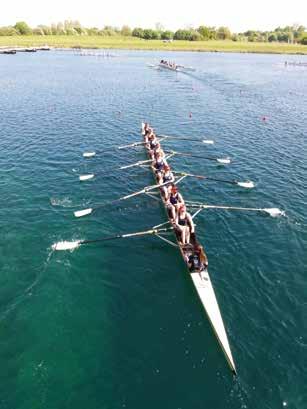
Working with the 2017/18 U12 rugby squads was a genuine pleasure. They worked tremendously hard and had great success on the pitch. Whilst it was fantastic to have an unbeaten season, it was the manner in which the side developed that was most pleasing. Francesco Cinao and Alex Dowling led a strong pack, and Oliver Palmer learnt the game throughout the year to become a very effective try scorer by the end of the season. Francis Dowell captained the side well from fly half and had an excellent covering tackle technique. Luke Barrington gave great service from scrum half and was very coachable –through this he really developed as an attacking force. Oliver Hill showed class throughout the back line, really enabling
The U13 A had a variable season with some promising results. The team came up against some tough opposition at the beginning of the season and struggled to get going, although throughout the season developed well into a resilient squad. One of our best performances was against Loughborough, where we narrowly gained an outstanding victory, showing a real classy performance. I am pleased
U14s
What a difference a year makes: having struggled last year through a combination of injuries, lack of size and strong opposition, this season the team managed to win 12 out of 14 games.
The boys returned from the summer looking quite fit, but this was tested from the first minute of pre-season where the emphasis was on a high intensity game both in attack and defence. The first two games of the year were both lost to strong Solihull and St. Peter’s sides, but both were close-run affairs and proved that there was far more determination and pride being displayed by the boys than in the previous year, and even in defeat confidence was lifted.
The second week in September was the last time the team lost, going on a 12 match unbeaten run. This included excellent victories away to Sir Thomas Rich, home to Loughborough and then a stunning win away at RGS, the first time this group of players had defeated them since joining King’s. Although the score was only 127, we dominated the match and simply
other runners to attack in space. Oliver Rooksby had power and pace, frequently scoring match winning tries. I am genuinely excited about the potential of this squad.
I was grateful for the efforts of the A, B and C squads and I truly hope all boys continue to enjoy rugby in future years.
Captain Francis Dowell has written the following report:
“It has been a great opportunity to play in the under 12 A team this year. There have been many superb games and tournaments. We got a chance to play 11 games (not including the many tournaments and pre-
with the development of the squad and their willingness to learn and further themselves, showing that they were capable of competing with the strongest opposition towards the end of the season. I look forward to watching their progress next season, where the addition of some new pupils to the school will also help to further their potential.
season game). We managed to win all 11 games; seven of those games we won by at least 35 points. However, there were many close fixtures. Our encounter away with Old Swinford Hospital is a good example. We were very closely matched in attack and defence. Luckily, we managed to edge it out and win 20-10. Our 7s team also proved to be very strong. We won all five of our games in the Warwick tournament and beat a very strong side in the final, despite the weather not being on our side. It was really encouraging to see how we all worked on our game over the course of the season. Every single team improved massively, from the A to the C team. I hope next season will be just as fun and prosperous as the last!”
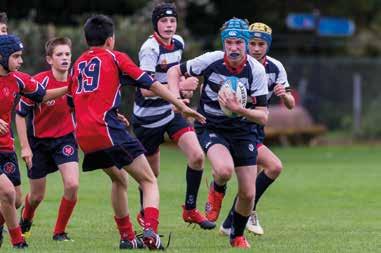
botched numerous chances. This filled the boys with confidence which they took into the rest of the season, the highlight being the 22-20 win away at Bishop Vesey’s, a team who hadn’t lost all year and who beat us by 60 points in the corresponding fixture a year earlier.
This was a team effort from start to finish, but much of the forward momentum and direction was provided by the core of the team: 8/9/10: Ben Williams, Alex Terry and Josh Richardson, whilst Joe Clive, who could play anywhere in the front 8, was outstanding throughout.
It was a pleasure working with such an enthusiastic, hardworking and talented group of boys. They achieved a huge amount this year and should be very proud of their efforts.

U15s
This group of boys has made up one of the most exciting teams I have ever been involved with. In schools’ rugby it is hard to imagine a better 10/12/13 than Aston Cambell-Kerr, Owen Preston and Willem Humphreys. This trio’s skill level and game understanding gave us the strength to attack from all areas of the pitch. In addition to that the ever-reliable service from Luke Coupland and the blistering pace of Louis Hira, Sam Binnion and Ben Tyson, meant we were a formidable force and a nightmare for any opposition’s defence.
Whilst heaping praise on the backline, it would be easy to overlook the amazing set of forwards the team had. Due to the attacking nature of the team and its expansive play, the pack had to work extremely hard every game in order to recycle ball and give the backs a platform to attack from, but all embraced this physical challenge. Matt Whiteside was outstanding all season and could easily
have been awarded man-of-the-match in every game! Matt Doughty was also a genuine standout player and was the main ball carrier along with Guilin Chiu and Charlie Butcher. Dom Porter and Charlie Riddell also played vital roles and it was great to see their emergence in the team, after mainly being B team players in previous years. Unfortunately, for large parts of the early season we rarely had all of these boys playing together or in their normal positions and this led to losses against Sir Thomas Rich, Loughborough, RGS and Malvern (in the Nat West Cup).
Due to the previous two unbeaten years it was going to be interesting to see how they would react. It was therefore pleasing to see that these losses only made them more determined as a team and as we returned to full strength, the confidence grew and the team very quickly got back to winning ways. The team got instant revenge against RGS Worcester by beating them in the first
round of the Nat West Plate Competition and after five further victories the team found themselves in the quarter finals against Dr Challinor’s Grammar School. Unfortunately, after a poor start and some unlucky periods of play, we were always playing catch up and found it hard to compete against a huge set of forwards. Special thanks have to go to Ben Williams, Alex Terry and Josh Richardson who came up from the year below to help strengthen the side throughout the cup run.
In addition to the excellent season, the team excelled in the Sevens season. The initial preparation was difficult due to the length of the cup run, and although this was evident in the early stages at Warwick, we went on to win the plate competition. The boys then went from strength to strength for the rest of the season. We succeeded in reaching the semi-finals at Solihull and finished on a high after winning our own King’s tournament.
After a good and eventful tour, the 2nd XV started the season ready to face some stern opposition. The tour had shown a team with potential, and Adam Brotherwood proved his leadership skills and was consequently chosen as captain. The first game was a frustrating 5-5 draw against Solihull, and despite being the better team Tom Hale was the only player to cross the line.
With some of the Fifth Form to bolster the squad we had some extra firepower and were too strong against St Peter’s ,winning 29-5, with Jack Hands having his best game of the season, scoring a try, a penalty and three conversions. George Francis showed what he could do with his first of many tries for the season. A very wet Gloucester stopped any sort of running against Tommies and this lead to our first defeat. If Solihull was frustrating then losing to Loughborough was a low point of the season; 14-0 up and cruising against a very average team, we ended up with a 2014 loss. This game showed that giving the opposition confidence is a dangerous game. The match against RGS was a true definition of “it’s a game of two halves”. King’s started
brilliantly with the backs showing some outstanding lines; Noah Crampton was having the game of his life in what was to be his final game for King’s. Yet, the second half was all RGS. Where King’s had shown great 15 man rugby, RGS showed what they could do with 9 men. Despite good defence we couldn’t get the ball off their bigger boys and ended up losing 19-31.
The Chase, however, gave us the opportunity to once again show what King’s rugby is about: an excellent 3814 win with George Francis and Joe Richardson scoring two tries each and Jack Hands converting 4 out of 6 kicks. After half term came the long away trip to Ellesmere College. Against a large team we were 17-0 down at half time. The boys knew they could play better and in the second half the backs cut loose scoring 4 tries. For the second game running George Francis crossed the line twice. This was the most memorable match of the season and the team took a huge boost from the way they had come back from 17-0 to win 22-17. BGS arrived in Worcester and were sent home defeated, 29-12, Sam M-S scoring two tries and George Francis scoring one.
Ali Robb once again showed that he could play any position in the back line, scoring from fly half and having a great game. Next was a trip to a very wet Dean Close in Cheltenham with Jack Hands showing the opposition how to play in the conditions; he put some great low balls through for the team to chase, with Fletch, Tom Long and Jack himself all scoring tries. Final score 17-7. The penultimate game of the season turned out to be a tough ask for the seconds as by this stage of the season there are always a good number of injuries and it becomes the last men standing. The final game was against OSH who fielded a very strong side; each time a player was substituted an even bigger player came on. Nonetheless, the boys showed real courage and skill throughout the match, narrowly losing 20-29.
The season finished with a record of 5 wins, 1 draw and 5 loses. All the boys showed great determination throughout the season and every one of them improved their skills and understanding of the game. They will all take some great memories from their successful 2017 season.
U16s
The U16 fifteen-a-side season was both successful and enjoyable, if not entirely consistent. We began the season strongly, winning three out of our four games before the half-term break. This included a 57-0 win in the first round of the regional cup against King Edward VI Aston Sports College and an impressive 29-5 victory over Loughborough Endowed School. Unfortunately, after the October break the team’s early momentum began to slow. Narrow defeats to Dean Close School and Sir Thomas Rich’s, coupled with a very hard fixture against an extremely strong Bristol Grammar side, resulted in a run of three loses during November. However, determined to finish our last season of age group rugby together strongly, we worked hard and rallied to win all three of our remaining games. This included a very tight but rewarding win against Old Swinford Hospital. The final game of our season was a home clash with Trent College. The game exemplified many of the positives that had led to our successes- a powerful front five with Louis Weston leading from the front, a combative back-row of Joe Richardson, James Unwin and myself, a busy scrum-half in Tom Otley and a set of backs who showed agility, strong handling and in Alex Lowe, someone with the speed to finish off our moves. The 47-7 victory was the perfect way to round off five years of age group rugby and was a great way for those not involved in our sevens season to sign off.
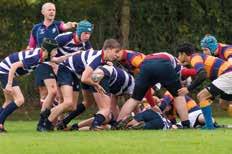
The Sevens season began at Warwick School on a cold and snowy day in early February. Despite the adverse conditions for the shorter format of the game, we qualified for the cup competition after two wins out of three in our group. Unfortunately, we drew a strong Dulwich side and subsequently lost our quarter final. After this promising start, rain hindered our season as several tournaments had to be cancelled. Despite this, there was still the exciting prospect of a trip to Rosslyn Park for the National Sevens competition in March. After a tough start to the day, good performances against Kirkham Grammar and St Edward’s Oxford led to us recording two wins out of four in our group. However, this was not enough to secure a place on the second day. As well as these two tournaments, most of the U16 squad were given the opportunity to play as an U18 B side in the King’s tournament. This was a great learning experience that allowed us to test ourselves against some very strong 1st team sides. After this season, the whole squad are looking forward to next year and representing the school’s senior rugby sides.
Hamish Stigant, Wulstan
1st VII
For the second year in a row we entered the Nottingham Trent 10s tournament. Following last year’s initial success at the tournament, placing second, we struggled to get going, losing our first game. Nonetheless, we came back with wins against the hosts Trent and Solihull, to finish second overall once again. The tournament provided an easier path of transition between fifteens and sevens rugby, enabling the team to run established and proven moves from the fifteens season as well as allowing for the team to run a sevens style pattern.
The season really kicked off at the Brecon 7s tournament, in which we started strongly with two wins against Shrewsbury and Ysgol Bro Dinefwr. But, we finished the pool games by playing much stronger opposition from Kirkham and Hartpury. Here we struggled to show the quality we had shown in the first two games. We placed 3rd in the pool qualifying for the plate competition, where we looked untouchable, beating Llandovery 26-17 in the quarter finals, Bristol 26-7 in the semifinal and then facing the home team Christ College whom we beat comfortably in the final 24-5, silencing their rather sizable crowd of rowdy supporters.
High on confidence, we progressed to the KES Stratford 7s where we won our group, beating Bablake, Loughborough and Warwick in the last seconds of the game. Qualifying for the cup, we made it to the semi-finals where we faced our old rivals Solihull. A feisty and scrappy encounter, no love was lost on the pitch; arguably this somewhat distracted the team from the end game, and consequently we had a very narrow loss.
We entered our own tournament excited and hopeful of another win and it was agreat start to the day, beating OSH 19-10. Unfortunately, our confidence got the better of us and a very poor performance, riddled with errors, saw a loss in our second game to Adam’s Grammar 22-21. The final game came down to a point’s difference as to who would be qualifying for the cup and the team played superbly, atoning for the previous game and not putting a foot wrong. We beat Bishop Vesey’s 55-0, which was more than enough to qualify top of the pool.
We were to then face KES Birmingham in the quarter-final where we once again played a perfect game easing past them 45-5. Next in the semi-final was St Peter’s, who had knocked us out of the tournament the previous year. This year, however,
would not be the same and the boys showed absolute control in a classy 29-14 victory over the defending champions. The final saw a repeat of our first game that day; OSH had qualified second in our pool and had worked their way through the stages to reach the final. They would draw first blood, going 7 points up. However, we responded instantaneously with 7 of our own, starting off a back and forth battle of tries until the last few seconds of the first half where we were to score twice in a row. The second half saw a reclamation of the dominance we had shown earlier that day; scoring more without conceding and finishing the game 33-19 victors.
By far the highlight of every sevens season is going to London to play in the Rosslyn Park sevens tournament. After a successful season thus far, morale was high and we aimed to repeat last year’s success of reaching the quarter-finals of the second day.
We started strong with a win over Queens Taunton, before playing what I consider to be the toughest and most physical game of the sevens season against Wimbledon College. The boys played exceptionally giving their all and resulting in a very well earned 19-10 victory. Following this we beat Lord Wandsworth and Richard Huish College to qualify top of our pool, for the first knockout
round. We then faced Tonbridge School, a team who had been arguably the most successful team of the tournament in recent history and were stacked with Premiership Academy players and an England player or two. Despite this, it was another contender for game of the season as we made them look like, well, school boys, winning 317. Having reached the second day, for the second year in a row, we had surprised ourselves once again with our own skill in victory. Unfortunately, however, injuries and niggles from the first day caught up with us and we narrowly lost in the quarter-finals to Sir William Borlase’s 28-26 and Felsted. We ended up placing 11th on points difference, an achievement that we never dreamt of in the 2018 team tournament. Upon reflection, it was a job very well done and a great way to end rugby at King’s.
Overall, the squad worked extremely hard this season not only during the tournaments, but in training and on fitness. It was a pleasure to play with all of the players and to have Mr Mason and Mr Atkinson as coaches. It was another very successful year for sevens and with a wealth of L6th in the team, sevens looks like it will be in good hands for the coming season.
1st XV
Having struggled with injuries this season, the squad still had a solid season, winning 11 of 19 games. All players in the 1st XV should be very proud of their achievements; including the very late comeback against St Peter’s Gloucester, to score in the last few seconds, stealing a very well earned 35-31 victory. As always the fixture list provided very tough opposition every week, and it is a testament of the team’s strong bond and skill as players that the 1st XV produced some amazing performances.
Pre-season saw 3 wins for the team, 2 on tour in Sri Lanka and Singapore and one at home to KES Five Ways, signaling a promising start. The season opened with an
away match at Solihull and the team looked composed and played the excellent brand of fluid King’s rugby that Mr Mason and Mr Atkinson have implemented. Unfortunately, it was not to be our day and it was a painful 10-8 loss. Bouncing back from this knock, our following games showed the team determined to succeed; winning the next three with many tries coming off the back of well-set mauls from a lineout, for which credit must go to the pack.
With another impressive crowd at Sixways, and a good pre-match warm up, the stage was set for the 11th annual Modus Cup. With initial success on the ball, we had a slight control over the back and forth
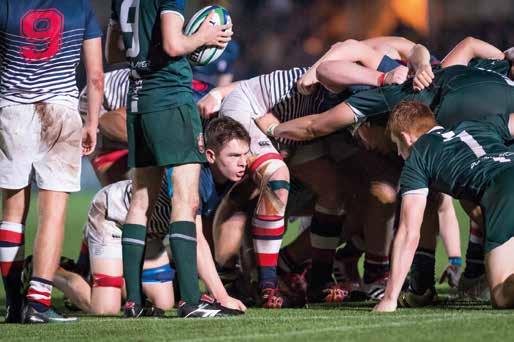
gameplay of the first half, making many line breaks and forcing RGS mistakes. The boys looked dangerous but a combination of a good scramble defence and not taking our chances meant we only had 3 points to show for our efforts. The second half saw the game settle down a bit as the collisions took their toll on both teams. Once again we had the majority of the possession and looked to be in control playing the more expansive style of rugby in the greasy wet conditions. Motivated by a quick RGS try, everybody dug in and a well-worked Ethan Summerwill try was the result. Now only 3 points away, the game was coming to a close, and with all the attack, the pressure was mounting on both teams to perform.
In the final few minutes we looked to have done it and carried the ball over the line, only for the try to be disallowed. The last moments were spent attacking in the opposition 22, but being superbly held away from the try line. The final score was 13-10, another crushingly narrow loss.
Nevertheless, the team went on to have a successful second half of the season, carving our way through the National Vase competition, with strong wins against KES Stratford and Adams Grammar. Away in the torrential rain, we faced opponents Dean Close. The squad was heavily beaten up and injured by this stage of the season, with neither myself (C) or Owien H-D (VC)

on the pitch, yet, a primarily L6th based team stepped up to the Gloucester side in conditions that did not suit us. Everybody played to their maximum potential that day and it resulted in a 12-10 victory and our opposition’s only loss all season. Our final home game of the season, was against Trent College, on paper a very similarly matched team to ourselves. We were, however, desperate to give all of our home supporters something to remember us by and thank them for all their support this season. This motivated us to play exceptionally well, with centre James Austin producing the performance of the season scoring a hatrick and sealing the impressive 41-12 victory.
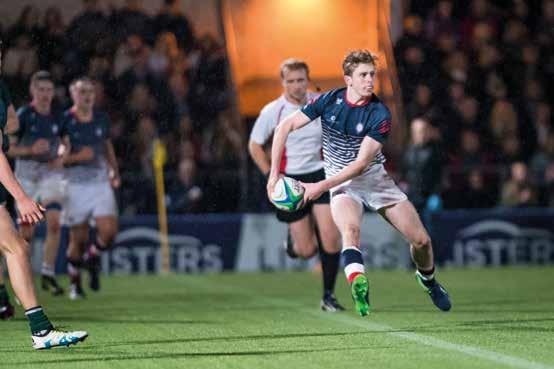
Finally, the season came to a climax in the National Vase Quarter-Final away against Dauntsey’s. Torrential rain, sleet and snow, the match saw all forms of weather except sun, suiting our opposition’s brawling style of play. Dauntsey’s claimed early dominance on the pitch with lots of territory in our own half, especially our 22. Gruelling determination, however, in defence kept them from crossing the line. Small line breaks and counter-attacking moves showed our true threat on the pitch, but, Dauntsey’s still managed to control the game, resulting in a late try before half time, the score 5-0. The second half saw much of the same. However, control was slipping away from Dauntsey’s due to the occurrence of some big tackles and carries from the likes of hooker Tom Gidney and prop Will Revill. Unfortunately, one slip of discipline led to a penalty under our own posts, throwing away another 3 points. Undeterred, the boys fought even harder, resulting in an excellently worked team try for Sam Lowe in the corner. In true King’s spirit we fought to the end never giving up, but once again it was not to be, the final score 8-5.
I would like to thank, Mr Atkinson, Mr Swarbrick, Mr Gillgrass and Mr Greenall for their support and coaching both on and off the pitch, with distinctive praise for Mr Mason for running a smooth ship for another season. I should also like to thank the grounds staff for their efforts this year, providing such a fantastic playing surface, not only for the 1st XV but for the school as a whole.
(Natwest Vase)
Sixth (NatWest vase) A Won 17-14
Sir Thomas Rich H Lost 21-15
Loughborough Grammar School A Lost 19-16
Chosen Hill (NatWest Vase)
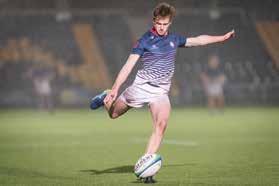
Won 74-5
RGS (WRFC) SW Lost 13-10
Ellesmere A Lost 32-10
KES Stratford (NatWest Vase)
41-12 Dauntsey’s School (NatWest Vase quarter finals) A Lost 8-5
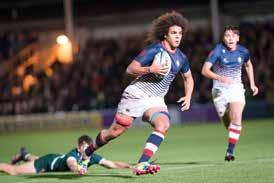
The girls have been busy during the Summer term, with the addition of Cricket to go along with the existing sports, Rounders and Tennis. This was introduced for just the U12 and U13 age groups and all involved can be very proud of how quickly they have picked up the new skills.
The girls have played in a number of games of pairs cricket and made considerable improvements throughout the season. They have learnt the importance of decision making with both their batting and fielding, in particular, deciding when to run in between the wickets and which end to field the ball back to. A special mention to Lucy Wadley, Lydia Goodman and Jamie Lewis for the quality of their performance and their support of their teammates.
All tennis teams faced tough competition in the Schools’ Tennis League. Their commitment and effort were commendable, despite the disappointing results. Without question the highlight of the season was the County Tournaments, with a fantastic 2nd place for Milly and Lucy Short in the U16 Doubles Cup. They started slowly, but soon found their rhythm, playing brilliantly to win their semi-final. Unfortunately, nerves got the better of them in the final and they couldn’t find their best form but they should be very pleased with their silver medal. In the U14 boys’ tournament, Oliver Whiteside and Thomas Edwards rose to the challenge and made good progress throughout the day. They won their first match and, although they lost all their others, they were in close
contention and just lost out to the more experienced pairs.
With the rise of other summer sports, there has been less Rounders played this year, but all the girls that have represented the school have given their best. There were good wins for the U14 team against Bablake School and the U15 team against The Chase, with the U12 and U13 teams showing pleasing batting stats in all their fixtures.
We are excited to see these sportswomen reach their potential.

We have a number of King’s pupils who swim competitively at local club, county, regional and national levels. This has led to a successful year for the King’s swim teams.
First up was the English Schools’ Swimming Association (ESSA) Hereford and Worcester qualifying rounds, held at Malvern College, which saw 22 King’s swimmers competing. This competition involves eight regions around the country, with the top 30 teams in each age group going to compete in a national final at the Olympic pool in London. Each team swam a freestyle relay and a medley relay with King’s dominating and winning eight out of the ten heats!
The U13 girls achieved 2nd place in their medley relay and 4th in the Freestyle. The U15 girls won both relays and were ranked 1st in the West Midlands in both events. The U13 boys won both of their relays in the Hereford and Worcester round and ranked 2nd in the West Midlands for the medley relay. The U15 boys were also 1st in Hereford and Worcester in both relays and 2nd in the West Midlands behind Warwick School. The U18 boys swam well against tough competition and secured 2nd place in both relays. The U13 boys (Sam Hawes, Michael Agoston, Charlie Dixon, Adam Rutter and Henry Halford) and the U15 girls (Alexandra Barry, Josie Armstrong, Bella Woodcock and Hannah Woodcock) qualified in the top thirty schools in the country from over 220 schools that took part in the qualifying rounds.
At the ESSA final, some of the swimmers got the chance to meet Tom Daley who was putting in some diving practice! In the freestyle relay the boys achieved 22nd place and the girls placed 20th. It was in the medley relays that the two teams really performed well in exciting, competitive heats against specialist swimming schools and colleges. The boys’ team achieved 12th place, missing the top 10 final by half a second. The girls’ team achieved 11th place missing their final by only 0.1 second. We look forward to next year and will be chasing those final places.
Next up were the Bromsgrove School Invitational Relays held at the Perdiswell Leisure Centre in Worcester. The first competition saw the U15 and U18 teams competing against 26 schools from as far afield as Nottingham, Bedford and Newcastle under Lyme. The standard of swimming was very high, with up to thirty
(Tamara Marsden, Maisie Lyons, Gabriella Barry and Catherine Rendall-Baker) and managed to progress to the A final (top 8) where they secured 5th place. In the Freestyle relay the girls (Tamara Marsden, Maisie Lyons, Gabriella Barry and Poppy Sawyer) narrowly missed out on the A final but won the B final comfortably.
... it is great when we see the hard work paying off and especially when we bring trophies back for the cabinet!
teams competing in some of the relays, and many national and regional standard swimmers competing. There were 4x50m freestyle relays and 4x50m medley relays in the U15 and U18 age groups. The teams from King’s won heats and competed in the A finals in 7 of the 8 events, with many of the swimmers competing in older age groups. The girls’ U15 team (Alexandra Barry, Hannah Dixon, Josie Armstrong and Hannah Woodcock) won the freestyle relay and came third in the medley relay. The boys’ U15 team (Daniel Day, Adam Rutter, Leo Rendall-Baker, Henry Halford and Samuel Hartley won silver in the medley relay and bronze in the freestyle race. The U18 girls (Naomi Marsden, Bella Woodcock, Daisy Ellis and Izzy Trow) won bronze in both the Freestyle and the Medley relays. Unfortunately, however, Illness and injury struck the U18 boys team leaving Oscar Van Vuren as the only U18 swimmer in the team. Ben Holmes (U18) swam in the medley relay heat before withdrawing due to injury so Sam Hartley (U15), Adam Rutter (U13) and Henry Halford (U13) joined Oscar to swim hard against much older and stronger swimmers in the A final in the Medley relay and went on to qualify for the B final in the freestyle.
Following the success of the U15s and U18s, the U13 swimmers were determined to perform well. The girls had tough competition but all swam well in their individual strokes for the medley relay
The boys (Sam Hawes, Henry Halford, Adam Rutter and Charlie Dixon) were a force to be reckoned with in the medley relay where each boy swam their best stroke. By the breaststroke leg (2nd) it was game over and the boys won their A final by well over half a length! In the Freestyle relay the boys had a much tougher fight on their hands qualifying for the A final in second place. Following the success of their medley relay, the boys wanted to add another gold medal and won a close race finishing with a 0.05 second advantage.
The training for in this sport involves sessions before and after school on most days, plus every weekend, so it is great when we see the hard work paying off and especially when we bring trophies back for the cabinet! Thanks to Mrs Monkhouse for her continued support, encouragement and coaching. Roll on next year – we’re just getting started!!
Adam Rutter, U4B


This year, Bright House has enjoyed working together across all the years in all house activities. The U6 and UR girls discussed bullying and the ‘bystander effect’, while the L6 and LR boys created presentations on their heroes. The annual Christmas party tested teams on their knowledge of Christmas songs, their acting skills in charades, and their ability to dress up a team member as a Christmas tree. Bright didn’t have much sporting success this year, coming second in the netball (and second last at sports day), but every team rose to the challenge and gave it their all. This attitude continued into the house song competition, where we performed brilliantly, but were just beaten, coming a respectable second with our version of Keane’s ‘Somewhere Only We Know’. At the school fete, we spun and sold candyfloss, making a significant profit for our charities while enjoying the glorious May Day weather. Overall, this year in Bright has been one of the most enjoyable!
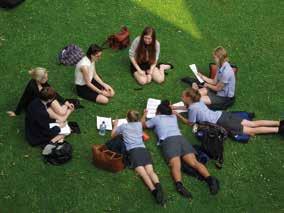
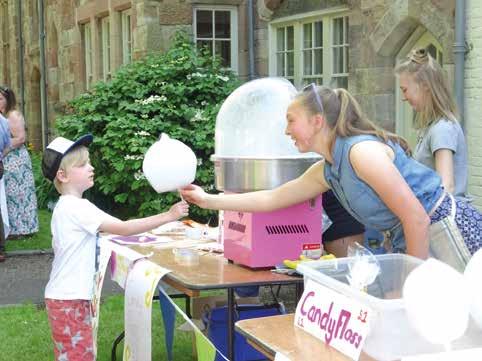

There have been a number of changes in Castle House. We saluted a new House Tutor, Mr Deichen, and new year group tutors, Mrs Le Marchand (L6) and Mrs Gamble (LR). A move to our modern and permanent house accommodation in the MFL building was welcome and the house has enjoyed the space and opportunites it has offered, using the Weston Centre for whole-house gatherings. We have been victorious in inter-house sports this year, winning a multitude of events, including
the junior football and junior basketball, with a team comprised of Lower and Upper Removes. We also won the senior inter-house netball and the basketball and were runners up in the senior football, At this year’s fete we started a new event, the silent disco, a music event where the attendees listen and dance to music that is projected through wireless headphones, instead of the music being played through a speaker sound system. This allows the other fete events to not be disturbed,


It has been an exciting year for Chappel House with many changes including our new House Tutor, Mrs Sears! In September, Chappel welcomed its new Lower Remove and Lower Sixth and helped them settle in with a Lower Remove activity day and the Sixth Form BBQ. For the House Song Competition in September, the Upper Sixth decided to sing ‘Three Little Birds’ by Bob Marley. Ned Dickinson conducted, and various other members of the house played their instruments. At the end of the winter term, Chappel House held a cake sale to
whilst the dancers may have the music as loud as they would like. The venue for our disco was the Chappel Memorial Room and, although the turnout wasn’t what was planned for, this was an inaugural year for this type of stall so future years should be more promising. And it was a roasting hot day with the CMR feeling like a sauna! Castle House is looking forward to a favourable year ahead.

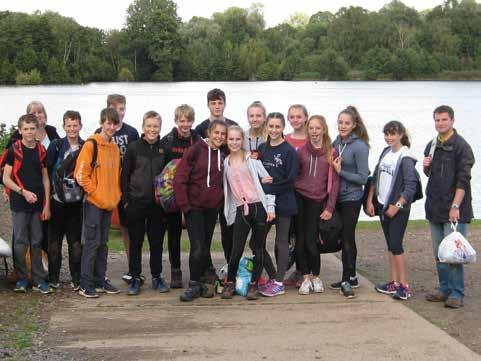
support St Paul’s Hostel, a local charity in Worcester which helps people live through homelessness. It was a great way for the whole house to get involved with both baking, selling and eating of cake. Year group presentations throughout the year allowed each year group to choose a topic that they wanted to share with the whole house and this allowed us to get to know each year group better. Two that stood out were the Upper Remove’s ‘History of our birthdays’ and the Upper Sixth’s ‘Our future selves’. Towards the end of the year the
FF, L6 and U6 made a trip to Laser Quest. This gave the Fifth Form an opportunity to get to know the Lower Sixth who they would be joining in the Sixth Form room and allowed each year to form stronger bonds within their own year group. At Sports Day, Chappel House members tried hard, despite the downpour of rain, which resulted in us winning third place. On top of this, we have achieved the effort prize for the second year running showing the hard work the house has put in throughout the year.
For the House Song in September, our song certainly did not lack volume (some did question its musicality!) and we managed to continue our fine run of making it to the night of the winner’s concert. Other diverse activities such as current affairs quizzes, tug of war and dodgeball (a clear cut victory against MCP’s Wulstan) have helped the
House and we took part enthusiastically in competitions, managing to win the Removes netball, Removes Sports Day as well as putting in a magnificent performance in being pipped at the post in the House debating final. We continued our work for good causes and our House charity event, postponed in the first instance due to snow, was rescheduled and raised nearly £500 for the Guide Dogs charity. My thanks to everyone who turned out for this event and to those who participated in all other
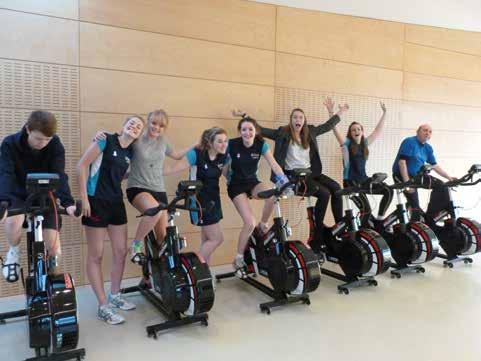
competitions regardless of the result; it is your good nature and commitment which makes this House so special to me. Finally on behalf of everyone in the House I would like to thank all of the Year Group Tutors, Mia Rigby and Evie Maitland for leading the House so brilliantly, and the rest of our wonderful leaving Upper Sixth; good luck and keep in touch!

This year saw a change of House Tutor from Lorri Guy who will be sorely missed by all the house. As always, it has been a busy year in terms of house events. Creighton put in a sound performance early on with the house song, which was ‘Shape of You’ by Ed Sheeran, but didn’t make it through to the final evening this year. Greater success was to be had in the house football. The senior boys put in a series of great performances that culminated in them becoming champions after beating Castle in the final. The junior boys also excelled in reaching the final, also against Castle, but this time we finished runnersup. Two other fine performances were in the house quiz and the Maths countdown challenge. In the quiz, the team of Grace Tivnan, Tom Angel, John Davies and Sam Clifford, cruised through to the final which they won by the narrowest of margins. Grace and John deserve a special mention; they put in an outstanding performance that helped Creighton to lift the title. In the Maths countdown challenge, the team of Bill Bishop, George Hale and Grace Tivnan showed razor sharp skills to eventually win a very close final.

In this, my last year of 20 as Kittermaster House Tutor, I was fortunate to have

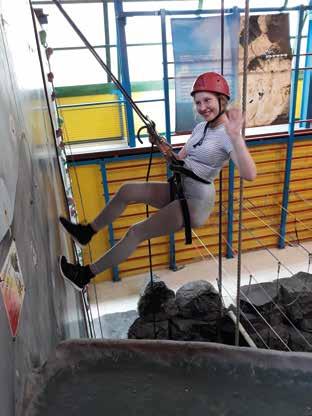
than capable hands the responsibility has now been delivered. The support of Abby Lynch and Lily Tyson as Heads of House was excellent throughout. There were no successes to report in House competitions but plenty of near misses; we were defeated
Before the start of the school year in September, the Lower Sixth went on an activity day at Aztec in Upton Warren where they spent the afternoon bonding while canoeing, paddle boarding and taking on the aqua park. A couple of weeks later, the LR also had a team building day. Both events were enjoyed by both years and provided a great introduction to each other for all the students involved. Later in September, the whole of the house took part in a charity event to raise funds for the Alzheimer’s Society. On the 21st September we organised a tea party which was greatly enjoyed by all involved and was supported by excellent cake baking and fantastic music. The house also had fun performing in and practising for the House Song Contest, performing ‘Proud Mary’. Although the house was not victorious on the day, a good time was had by all. At the end of the autumn term, Oswald held a house Christmas party. It was a fun evening that consisted of lots of games such as ‘dare’ pass the parcel. We also had a quiz and then finished the evening with some pizza for everyone. Oswald House has had a good year in the inter-house competition; not many victories but the participation of the House is always amazing. We showed this at the inter-house hockey where
we had the most players of any house available to play and again at senior Sports day, where there was great participation in all events. Well done to everyone in the
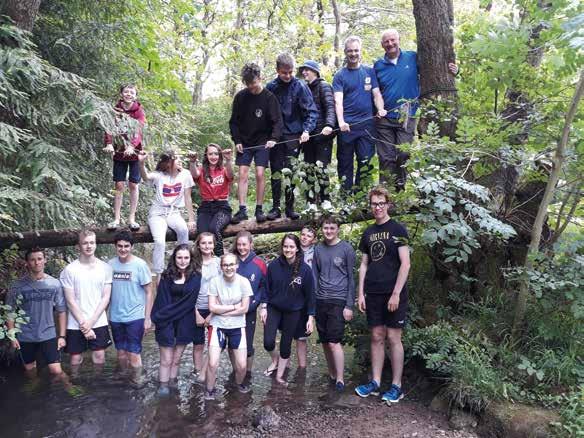
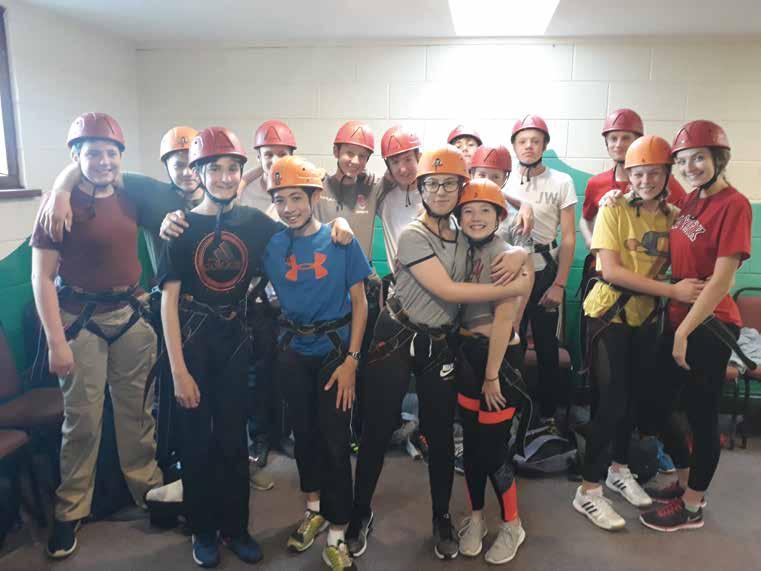
congratulated for their efforts as are all those who gave their time to other interHouse activities.
Notable events in 2017/18 included our win in the House Song Competition along with some strong individual performances. Our performance of ‘Count on Me’ by Bruno Mars was a highlight of the winners’ concert. We were also winners of the house basketball competition this year and performed well in house football and hockey competitions. The support from all our house staff has encouraged pupils to engage in activities outside our inter house and school events with individual charity fundraising from pupils in areas as broad as music recitals to charity abseiling as well as the success of our traditional cake stall at the School Fete. As with all the houses at King’s, School House welcomes its new intake of Lower Remove pupils with the annual camp at The Old Chapel. This allows us as Heads of House to get to know our lower removes and finish off the year in an enjoyable manner.
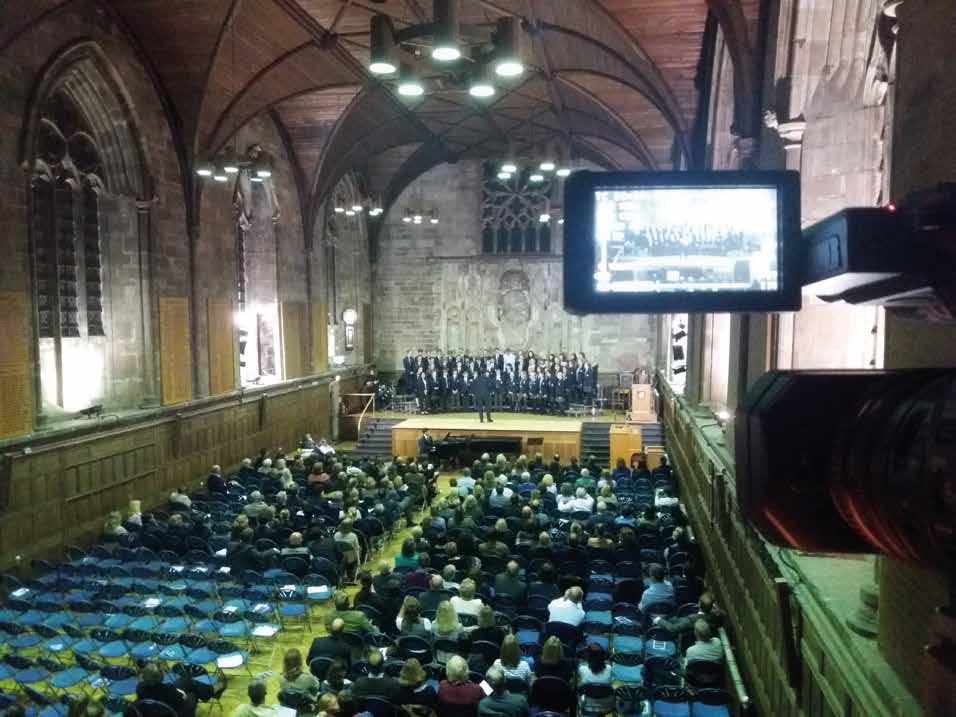
Wulstan started the year welcoming two new tutors, Mr Blakemore and Mr Warren, who both immediately threw themselves into their new roles with real gusto and dedication. No-one present at our lively Christmas party will forget Mr Warren’s “performance” as the grumpy judge, or the joke which eventually made him smile! His help in proof reading the U6’s final personal statements was also very welcome, especially with so many students making early applications. As the

“ipad King” Mr Blakemore has shown great patience with the rest of the staff as we have tried to master new digital systems, and make greater use of the Firefly platform he has worked so hard on. They showed genuine empathy and understanding with younger pupils, and took real initiative in sorting out teams and morning activities. Dodgeball quickly became more popular than Cowboys and Indians, but the focused conversations between year groups were
Wulstan won the debating cup, thanks to Henry James and a slightly reluctant Will Hood, the girls’ Hockey and senior sports day. Hats off to our music group of Henry, Sarah JJ and Natasja Enthoven who displayed enormous patience, flexibility and positivity during our preparations for the house song competition; I am sure they will have learnt plenty from this process!!


This speech was written by U4 students, Katy and George Campbell-Ferguson as a welcome speech for new Lower Fourth about their life in the school featuring their advice and highlights. It gives a flavour of life in the fourth forms.
Katy
‘Hello everyone, my name’s Katy and this is my brother George. Tomorrow we’ll be going into year 8, or the Upper Fourth as we call it here. It really wasn’t that long ago that we were sitting where you are now and feeling the same mix of excitement and apprehension – starting a new school as big as this one is no doubt a tad daunting at first. But for me, it was after just a few days of properly getting to know the people in my form and my wonderful form tutor, Mrs. Shearburn, that I began to settle in really well and feel like a part of the King’s community.
The highlight of my first week here was the activities fayre in College Hall where I had the opportunity to sign up for as many clubs as I could fit in to my week. These included netball and hockey clubs, as well as bronze arts award, quiz club and drama.
I’d recommend getting involved in as many activities as possible, even if you’ve never tried something before, as it’s the best way of getting to know lots more people straight away. There is definitely something there for everyone.’
George
‘One of my favourite memories from lower fourth is the activity day that you will take part in this term with your form. Not only was it really fun and the challenges rewarding, but it really helped to strengthen friendships and allowed us all to bond. The various inter-form competitions that go on throughout all three terms will also no doubt prove to be a highlight for many of you. However, the greatest moment for me was watching the teachers, who I’d got to know over the past year, perform their annual Christmas panto. This year’s was Aladdin, starring Mr Longley as Wishy Washy. It was ridiculously funny, and is what my older sister says she misses most about the fourth forms.
During the first few days I was a bit nervous too. I literally didn’t know anyone else in the year apart from my sister and one other person who went to my primary school. I found that the best thing to do is if there’s someone you don’t know, go over and make friends with them, make them feel welcome; there’s a very big chance you’ll have something in common. As you will undoubtedly hear Mr Longley say countless times over the coming year, the best way of making the most of your time here at King’s is to work hard, have fun, but above all else, be kind. And that hasn’t failed us yet.’

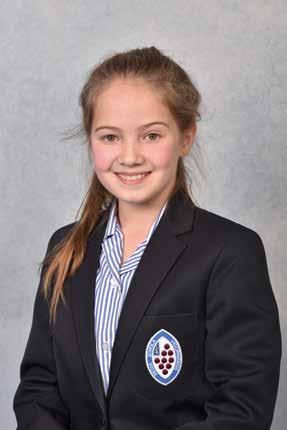
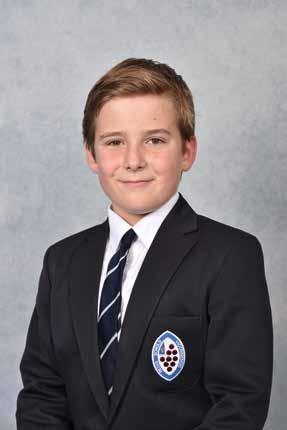
It has been a most memorable and successful year at Hawford with so much to celebrate and be proud of.
In the entrance examinations we were very proud once again of the achievements of our Year 6 children. Special mention goes to Joseph Young, Josh Lavarack and Ellie Cartwright who all achieved academic scholarships and Caitlin Clements who achieved both an academic and music scholarship. Edmund Roberts, Eddie Hira and Joseph Young received music awards. We congratulate all of our children and wish them well as they all move to the senior school.
Meanwhile, at Hawford, we have offered music scholarships to Elsie-Rose Lyons, Eliza Pritchard and Max Copeman.
Penny Bradley, who has been an integral member of the Hawford family for an incredible twenty two years, is retiring and will be much missed by staff and pupils alike. She is warmly regarded by all those who have been lucky enough to be taught by her and has made an indelible mark on the school, in and out of the classroom. Her trips to the Old Chapel are part of Hawford folklore. We wish her well in her retirement.
Helen Fowler left her post as SENCO at the end of the year after seventeen years’ service. She leaves our SEN department in excellent health and is thanked for the huge amount of work she has put in over the years to make it such a success.
We have continued to work with our existing school partners this year, organising a number of events with Sytchampton School and Holy Redeemer, Pershore. This has been in a form of a joint concert at Christmas, shared use of our Forest School, staff visits between the schools, learning walks by the three Heads, sports visits and use of the school’s katakanus (twin-hulled canoes).
The year has been another busy one in terms of trips. There has been a variety of day and residential trips to reinforce the learning that goes on in the classroom, from Kindergarten to Year 6. These trips range from local farm visits and field trips, including Ashes Hollow where we carried out a stream study to a trip to a water treatment works to link with the Year 5 topic on water. In addition to this, our residential trips programme goes from strength-to-strength with Mrs Bradley’s final visit to the Old Chapel with Year 2 being a memorable one. Residential visits to Malvern Outdoor Activity Centre, Broadhaven, Duke’s Barn and Carsington Water are exciting and well-known rites of passage to all the children and they remember these times with warm regard.
Learning outside the classroom is very much an integral part of the Hawford experience and every opportunity to extend the learning experience outside
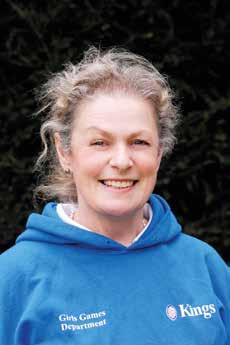
Both partnerships have strengthened considerably over the year. This year we have seen further partner activity with the Rivers School Alliance, with some excellent staff training opportunities being made available. We have also been involved in peer review activity with St. Andrew’s CE School, Evesham and St, Barnabas CE First and Middle School, Drakes Broughton.
Fiona Geary retired from the post of matron after fifteen years of dedicated service repairing and nursing the children back to health. We wish her well as she retires.
Our registrar, Donna Wenyon, left in May, after 7 years’ service and is thanked for all of the hard work she has put in and being the calm front-of-house voice on so many occasions.
We welcome several new staff, as well as current staff to new roles. Congratulations go to Caroline Knight who has been appointed as the Head of Early Years. We were also delighted to welcome Lorne Stigant on board as a full-time member of staff after completing his QTS. Furthermore, we welcome Vicki English to our staff as the new SENCO, as well as Melanie Adams in the post of registrar. Gemma Holtham has been appointed as Head of Girls’ Games. Additionally, the post of matron is now shared by Jennifer Shukla and Kathy Goodman.

the confines of the classroom is taken. In all year groups the extensive grounds are widely used and over the remarkably warm summer it was wonderful to see this space being used to its full potential. For our considerable efforts in promoting outdoor learning, King’s Hawford was awarded a Gold Mark from the ‘Learning Outside the Classroom’ council at the start of the year. This is a very prestigious award held only by 35 other schools in the country.
Following the enormous success of last year’s charitable fund raising, pupils were very excited to present a cheque for £3000 to Birmingham Children’s Hospital. As reported in the Birmingham Post, this made King’s Hawford one of the hospital’s Charity Champions. This year the children chose to support the West Midlands Air Ambulance. Events included hallowe’en and Valentine discos, a charity concert, stalls selling sweets, lavender bags and Christmas decorations, the charity day and the delicious ‘House Bake Off’ sale. Our current total stands at £1847.41. With the May Fete total, we should comfortably reach our target of £2000.
In the autumn, the sale of fresh produce from the Harvest Festival raised £77.30
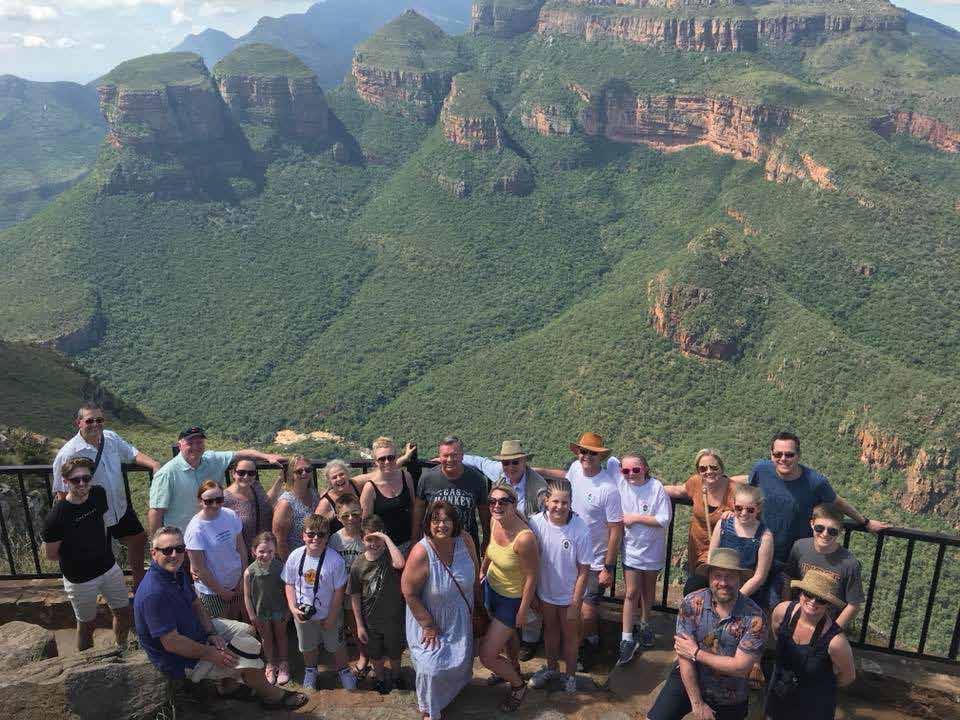
LAMDA continues to see success at Hawford. Of the last set of examinations taken in September 2017, we received outstanding results, with an inspiring 45 distinctions and 13 merits of the 58 entries. At the Worcester Competitive Arts Festival some 67 students participated, performing in classes from monologue and duologue acting, student devised drama, prose, verse and sight reading. Our children won eight sections at the Festival with 25 children placed first, second or third.

for the Salvation Army and a substantial collection of food items was also delivered to the Worcester Food Bank. Our support of the annual Poppy Appeal raised £487.80 whilst the masked ball at Stanbrook Abbey raised £7631.61 for St. Richard’s Hospice. Year 5 pupils also held their own cake sale on behalf of the Girl Guides which raised £102 for Plan International.
Finally, our children, through the School Council, have already raised £308.44 towards the education of Abigail at Worcester Primary School, South Africa and completed their fund raising for this project with ice cream sales at the end of the summer term. We are also grateful for the sponsorship from individual parents, which provides fees for a further two pupils.
To continue links between WPS and Hawford a group of 28 parents, children and staff enjoyed a super visit to South Africa over the Easter break. We were blessed with perfect weather, some amazing experiences in the Kruger Park, terrific visits in Cape Town and the surrounding area and a very warm welcome in Worcester, when we visited our partner school. The children experienced a day in the school, we shared their celebration of UK Day and we thoroughly enjoyed the fine South African food and wines. We celebrated South Africa Freedom Day at Hawford in April as well as organising a memorable school braii (South African barbecue) in May to continue the partnership. We are also expecting a visit from some of the WPS teaching staff to Hawford in 2019 and a further trip to South Africa is now being planned for 2020.
The Worcester Competitive Arts Festival is always a major event in the school year for our musicians. In March King’s Hawford ensembles won the ‘10 and Under Orchestra Class’ Cup (sixth year in a row) and the ‘8 and Under Choir Class’ cup for Junior Choir entry. The jazz group won their section with a distinction and the orchestra achieved a merit. The guitar group was awarded a distinction and the string group a merit. Our choir was awarded honours.
Hawford’s Music Department has expanded to 13 peripatetic staff delivering
tuition in all orchestral instruments, with 172 instrumental/singing lessons taking place each week in school (some children learning more than one instrument/voice). Total numbers have remained very steady over the past twelve months at around 170 children receiving music tuition in school.
Director of Music, Sophie Hughes, continues to concentrate on the senior choir, orchestra, music scholarships, directing the entire Year 5 and 6 musical, organising informal concerts and more formal occasions such as the carol service and the ‘Lights of Love’ service in the cathedral. In

In April, Scarlett Furlong competed in the BCA National Championship Finals. She competed in three disciplines: Lyrical Dance, Fast Jazz and Pom. Scarlett did exceptionally well, picking up two golds and one bronze respectively, which is a terrific achievement.
We were also delighted by the results of the Rotary Club Worcester Severn Young Writer competition last autumn where Ptolemy Nelson was awarded second place overall. Similarly, Martha Davey, who left Hawford last summer, was adjudged to be the overall winner. Both children were invited to read their stories out at Worcester Golf and Country Club in March.

Girls’ games continues to be most successful at Hawford and 2017-2018 brought some extremely pleasing results. In hockey, the Year 5 girls continued to be most skilful and successful. The A team scored over 48 goals and won three tournaments (RGS, Cheltenham College and Moor Park) convincingly. Our current U11 team, with the assistance of three Year 5 pupils, Bryony Gillgrass, Alice Marsh and Hannah Agoston, performed well at the regional IAPS hockey tournament, missing out at the last minute on a place in the semi-finals; they came 5th overall. At the end of term we attended the Under 11 Worcestershire County tournament, qualifying for the Regional Finals. The current Year 5 Netball Team carried on their success from last year where they
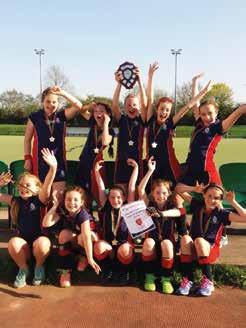
There will be a number of structural changes to Hawford over the course of the summer. The outdoor classroom has now moved to the garden area from the top field where it has become far more frequently used and has become a focal point for many events. The double decker bus will arrive over the summer break and will be our new and highly individual library, located near the garden area. Ticket machines and inspector hats are at the ready!
Furthermore, the temporary cabin is being removed and will be replaced with two new purpose-built classrooms whilst the Cobb is being completely refurbished into two separate areas where one will remain as a slightly reduced size, performance and rehearsal space.
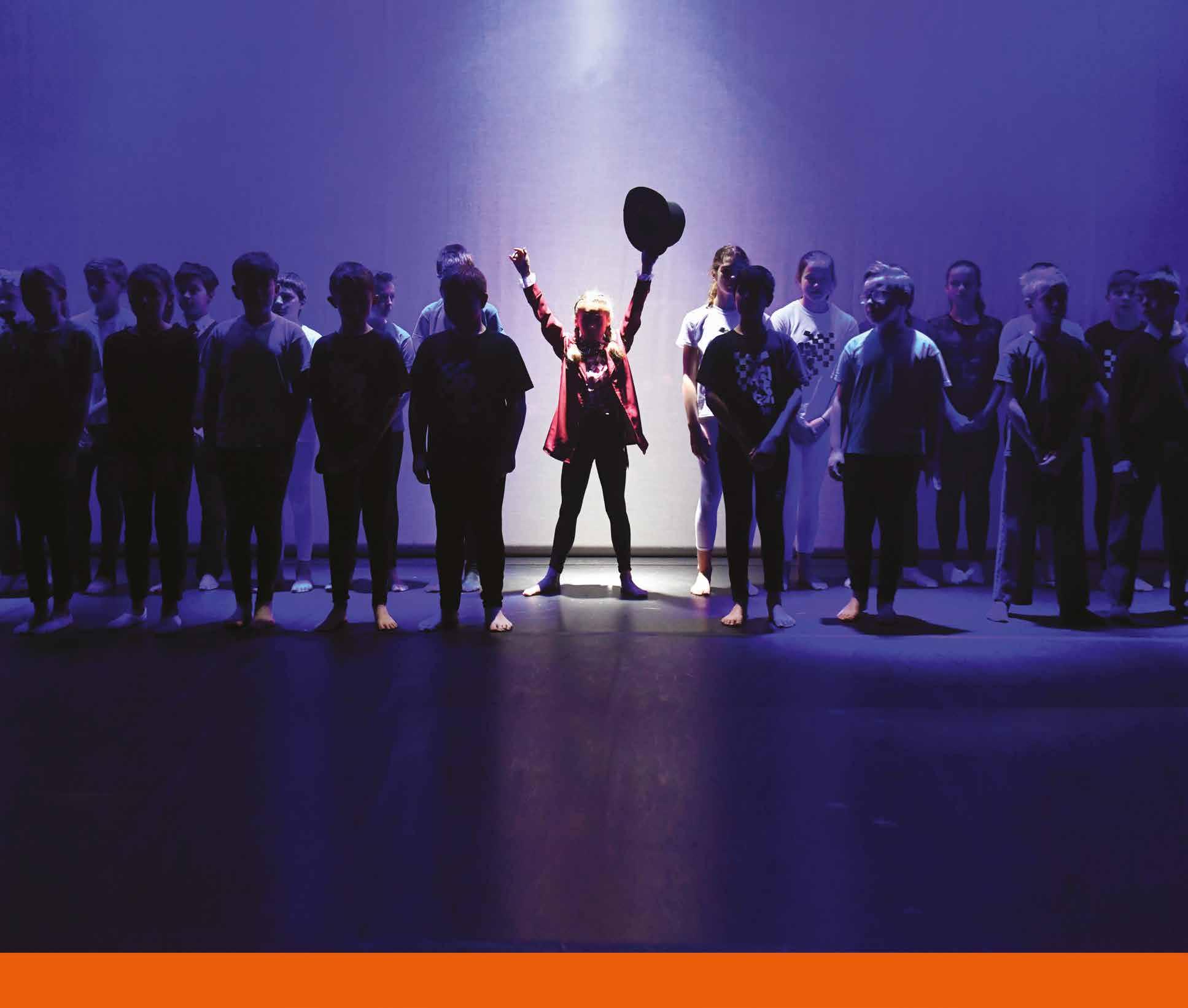
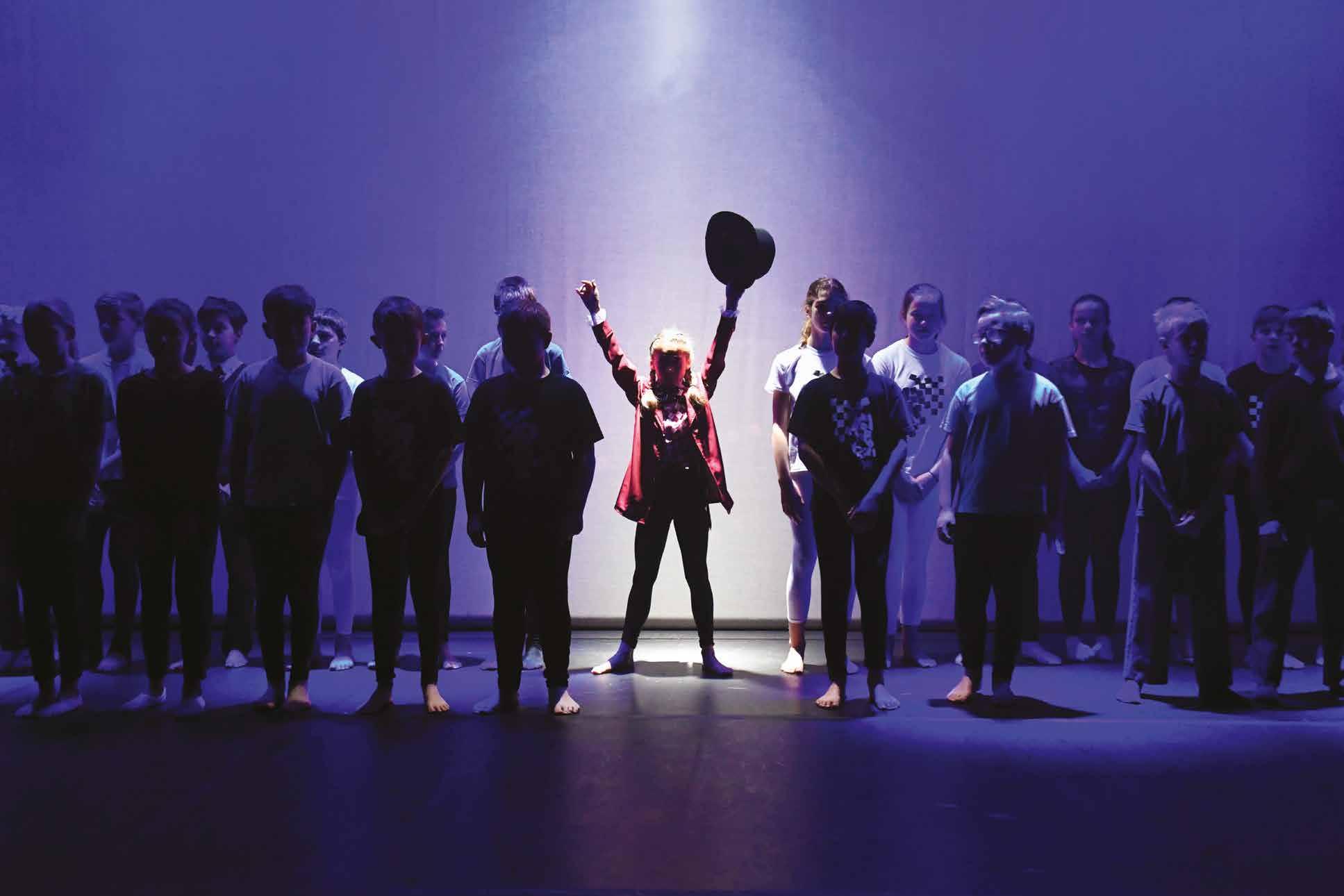
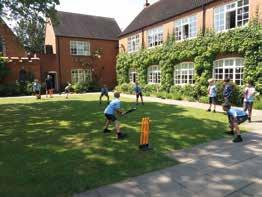
King’s St Alban’s remains proud of its academic reputation. Learning and teaching are at the heart of the school and we have had a positive year academically. 45 out of 46 of our Year 6 children will make the move across Severn Street in September and between them they have amassed seven academic awards and four musical awards. We have benefitted from some small curriculum changes involving humanities and have made significant changes to Wednesday afternoon provision for next year. Some of our Year 6 children
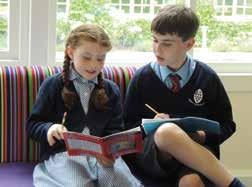
strand of Growth Mindset, something well established at the school. Philosophy Club has proved to be very popular.
Schools need new faces and skills to motivate and inspire the children from time to time. And yet, too much of a ‘change from the norm’ can lead to disruption to learning and the feeling that we are a holiday camp and not a school. Much as I enjoy the buzz, excitement and opportunities of trips, visitors, shows and fixtures, our staple remains the classroom,
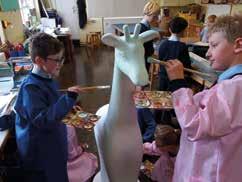
Karl Hopwood delivered important sessions on e-safety to the top four years and we also enjoyed workshops in architecture, archaeology, junk drumming and glamba. We are grateful to various parents for their visits including an excellent science show from Air Products about liquid nitrogen. Reception enjoyed many visits within their ‘people who help us’ topic including firemen (compete with fire engine!), a dentist, a doctor and a detective.
We have made excellent progress with our provision to help children cope and thrive in a demanding world through meditation, stretch and relaxation and other clubs and opportunities. We will launch the Paws b scheme to all children in Years 5 and 6 next year. Staff have enjoyed some stimulating and practical INSET this year on investigations in maths, building learning power and staff well-being.
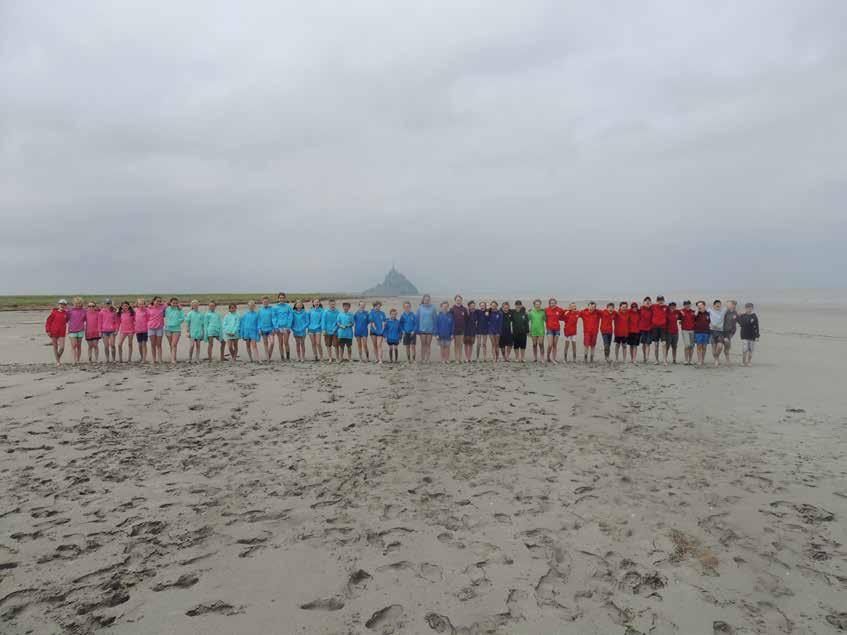
We welcome Nathan Mann (OV) as Academic Deputy. This is a new and exciting position at King’s St Alban’s and will allow us to build on our academic reputation. Nathan takes over as maths coordinator. Niki Ricketts will head up science and Julie Pitts will become Year 6 coordinator. We will also welcome Rebecca Cleugh in January as SENCO. This is an exciting time for King’s St Alban’s!
The second annual Year 5 sports tour means that provision for overnight trips
and the Old Chapel again. For the size of the school, this is an impressive and ambitious offering, but we believe strongly in the benefits such trips give our children in terms of learning about nature, different cultures and themselves.
Day trips also play an important part in the children’s learning and there have been visits to many places this year, including
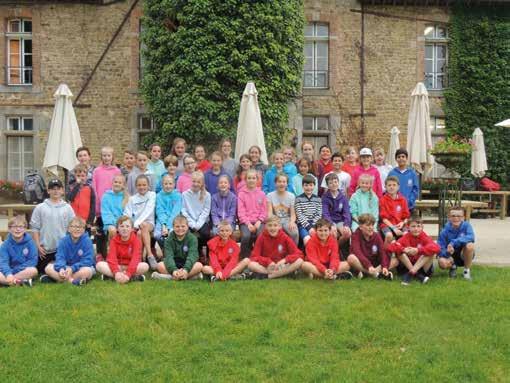
The four main strands of the arts: drama, music, dance and art, have all flourished in many ways this year. Assemblies, concerts, plays, shows and workshops are an important and frequent strand of school life and enrich the learning of the children. LAMDA has continued to grow with more children taking lessons than ever before and with our new LAMDA Platforms providing enjoyable opportunities for our performers.
Christian values are at the core of many of our musical events and we are privileged
to attend cathedral services throughout the year. For the first time in memory, King’s St Alban’s led the Foundation Advent service last autumn, which included the whole school singing The Angel Gabriel as the anthem. The senior school pupils were very impressed by the quality of our singing! In April, our Chamber Choir joined forces with Warwick Junior School to sing Evensong in the stunning surroundings of Coventry Cathedral. Their performance was remarkable and we hope to build on this collaboration in the future with a return fixture in Worcester Cathedral.

Avoncroft, Aztec, the Black Country Museum, the Malvern Hills, Cadbury World, Chedworth and the Living Rainforest. Children also enjoyed theatre trips to 101 Dalmatians and Sleeping Beauty in December. The classroom (or lab or sports hall or art room…) is the home venue for learning but exciting and memorable learning can take place beyond the school gate! And, memories are often made…
Beyond the classroom, we have developed our house system; all children from Reception are now allocated to a house and we have introduced some non-competitive house events such as a river walk, cathedral visit and board games session. These have allowed children to mix across the years and provided more scope for pupil voice. Houses are now choosing charities and running fund-raising events which is an exciting development.
Drama club’s performance of A Christmas Carol showed a real understanding of the many layers of this timeless story. More recently, the Year 6 Shakespeare week has introduced children to the complex story of Hamlet. Their work included acting, story writing, report writing and news casting using ‘Greenscreen’ technology. Everyone learned a lot and many surprised themselves by exceeding their own expectations. The Year 3 play, ‘The Awful Egyptians’ was hugely successful. The children had worked really hard to learn their lines and the audience learned a great deal too.
We remain a strong dancing school and welcomed a number of professionals to the school this year including the excellent 2 Faced dance group.
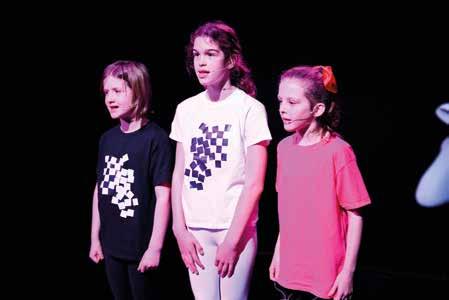
‘The Magic of Musicals’ was our highly popular theme for this year’s Creative ConneXions. Artwork, poetry, music and dance all came together to create a truly memorable show. From the drama of the
opening number, The Greatest Showman, the audience were gripped by the colourful dances, the music and the enthusiasm of all the performers. More recently, Chance to Dance and our Summer Show have

fixtures and therefore a record number of children representing the school at all levels. Down the school, we have now extended provision in the Pre-Prep where Year 2 children now go to the all-weather pitch and school fields and have started learning team sports. As in previous years, fixtures have started in Year 3 across all our major sports. We have sports clubs on virtually every day, mainly after school but some at lunchtimes, and these have proved very popular; it is not unusual to have 30 children signed up for a sports club and girls’ cricket probably took the record with 37! Indeed, the growth of girls’ cricket
has been rapid and our girls enjoyed their first competitive fixtures this summer. 56
Year 5 children enjoyed an excellent sports tour to Wales in June, visiting the SWALEC stadium, competing well in both cricket and rounders and relishing the delights of Barry Island!
The various successes and achievements within sport can be seen weekly within the newsletter. Highlights have included a joint rugby 7s venture with King’s Hawford with some superb victories at the Warwick School tournament and a training session for our netball team with Severn Stars at the University Arena. We continue to thrive in and around the pool, hosting numerous galas. These are great opportunities for
enabled soloists and small groups to try their hand at choreography and to work at their dancing independently, collaborating to produce some special pieces.
Our choristers have performed well all year and managed to juggle school and family life with cathedral commitments. During the year, Frederick, Charlie, James, Joseph, Toby and Giles all received their surplices. As ever, it was a pleasure to hear the boys sing at our school concerts in November and February. The choristers are a small but very significant group within the school, providing inspiration and a link to the founding of King’s in 1541.

lots of children to represent the school and for our very talented swimmers to excel. We went unbeaten through the season of galas and our U11 aquathlon (100m swim followed by 800m run) team swept the board at the Malvern College event. The swimming season ended in spectacular style as we qualified for the IAPS national finals for the first time in June. Both our teams ended up swimming PBs on the day and our girls came eleventh and the boys twelfth nationally on a great day for KSA sport. As in other areas, our sport aims to be inclusive, enjoyable and challenging to everyone, including our most talented. Our children have certainly embraced all manner of opportunities this year and we await sport next year with excitement!

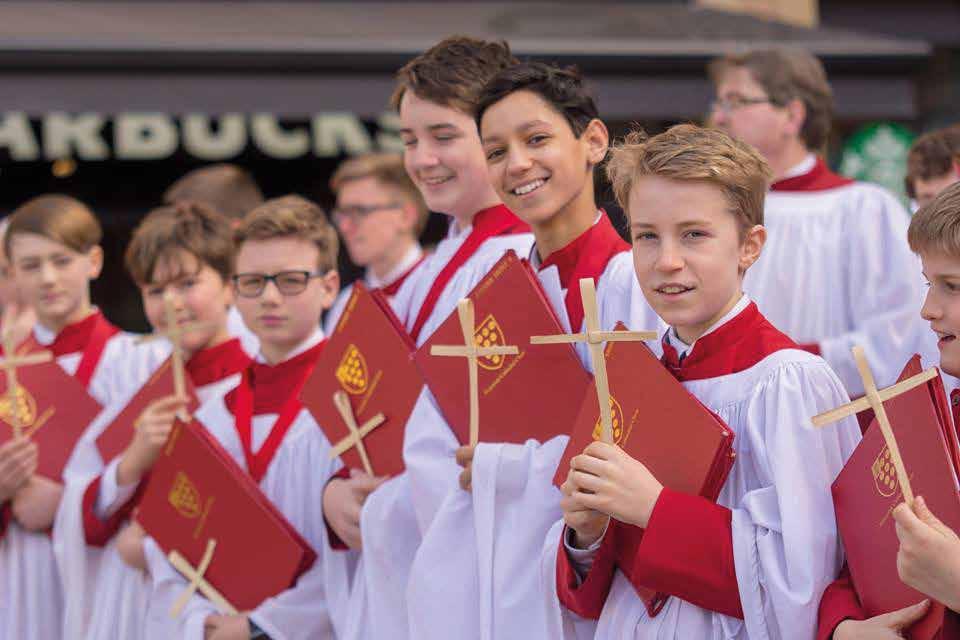

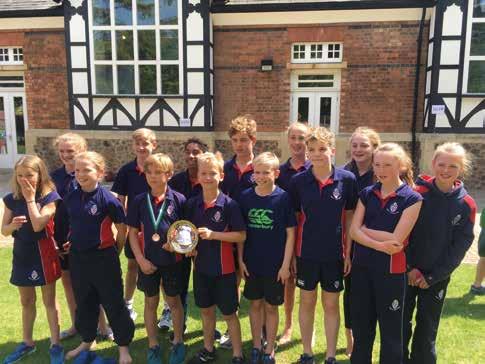
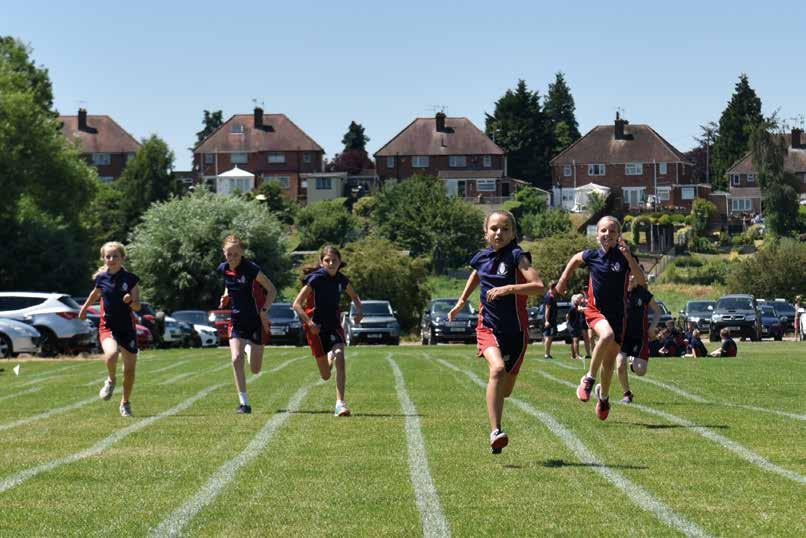

Following on from the excitement of The King’s School’s 475th anniversary celebrations, this past year has been as busy as ever, with a growing number of reunions and other events, the challenges of data protection legislation changes, the launch of our Bursary and Legacy Appeals and all of this, with a new team settling in to the Development & Alumni Relations Office.
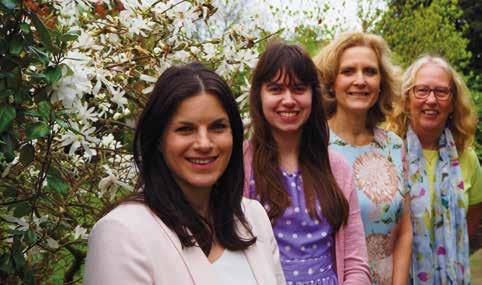
After nearly five years at King’s, Alice Brunt left the Development Office to join the fundraising team at St Richard’s Hospice, working alongside a huge number of inspiring staff to help provide care for patients and families across the county. Recently she moved on to the Royal Porcelain Works, the re-development of the former factory in Worcester, and managed the launch of the site as a new home for the arts in the heart of the City.
Kathryn Gilmour (Cr 07-09) left after a successful one year placement in the Development Office, and started work with the National Trust, as part of a small team responsible for the delicate care of collections within a local property: from working on portrait canvases, to preserving flaking gilt from a Georgian teapot. Kathryn is also part of a project based at Worcester Cathedral that aims to develop early career curators.
In addition to Liz Elliott, who heads up the Development & Alumni Relations team, and Cath Williams - who works between the school and development offices - we
McLellan, Head of Alumni Relations, and Alice Evans, our Development Assistant. Sophie joined us from Malvern Theatres, where she led several successful projects focusing on engaging the theatre’s community. Alice has recently moved to Worcester and is involved with a number of local churches. In the office, she looks after our growing database, working closely with Sophie to bring to fruition our ever-growing calendar of events. Alice also keeps OVs in the news via our social media and weekly news round-up.
We really enjoy seeing OVs and friends of the school back at King’s and love to hear stories from all those who attended the school over the years. Visiting OVs are very welcome to have a tour of school, which provides us with an opportunity to show off some of our stunning new facilities and also to re-visit some of the more familiar original buildings. If you would like to come for a visit to King’s, please give the Development & Alumni Relations team a call on 01905 721737 or email us at alumni@ksw.org.uk .
Since the formation of the Development Office, over £7 million has been raised for the Development Trust, with Trust accounts for the year ending 31st July 2017 standing at £2.5 million.
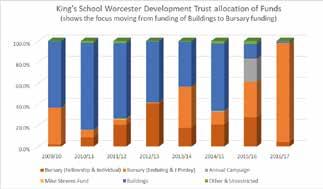
The graph below shows how the focus of the Development Trust funding has moved over time from supporting building projects (School House Library, Michael Baker Boathouse, Keyes Building) to financing pupil bursaries. The Trust has created two funds for bursaries: an Enduring Fund, the capital of which will be built up over the next 25 years to fund bursaries in perpetuity and the Fellowship Fund, which provides financial support for pupils currently in the school.
Updates in Data Protection Legislation
Over the last year, updated legislation relating to the privacy of individuals’ data and how personal data is collected and used, has led us to examine more closely the data we hold on OVs, former staff and parents and friends of the school. The new General Data Protection Regulation (GDPR), which came into effect on 25th May 2018, specifies the legal grounds for using an individuals’ data. The Development & Alumni Relations Office at King’s relies on Legitimate Interest to use personal information; we are conscious, however, that members of our community may wish to specify their communications preferences, ie. how we contact you (by post, email, telephone) and for what reason (eg. events, OV News, charitable Trust activity etc). Should you wish, you can inform us about your communications preferences by going onto the Alumni/ Contact page of the King’s School website (www.ksw.org.uk)
In order that all members of the King’s family understand about the data we hold and how we use it, we have updated our Privacy Notice in relation to development and alumni activities of The King’s School Worcester. This Privacy Notice can be found on the Alumni/Development Trust/Privacy Notice section of the King’s website. We work hard to keep our contact details for all individuals in the King’s family up to date. Please remember to keep us informed should you move house or change your email address.
The 1541 Society recognises all those who have made a major contribution to the Development Trust through legacy pledges, major donations or by volunteering their time and expertise. The Development Trustees are key members of this group and we are grateful to those who give up their time to be a Trustee.
Each year, the Chairman of the Trust hosts a dinner for the members of the society and the Headmaster reports on current activities and future plans for the school. The 1541 Society dinner was held this year on 24th May 2018 and was a hugely enjoyable evening for members of the society, who met for drinks and an excellent dinner provided by the King’s catering team, in the stunning setting of the Michael Baker Boathouse.

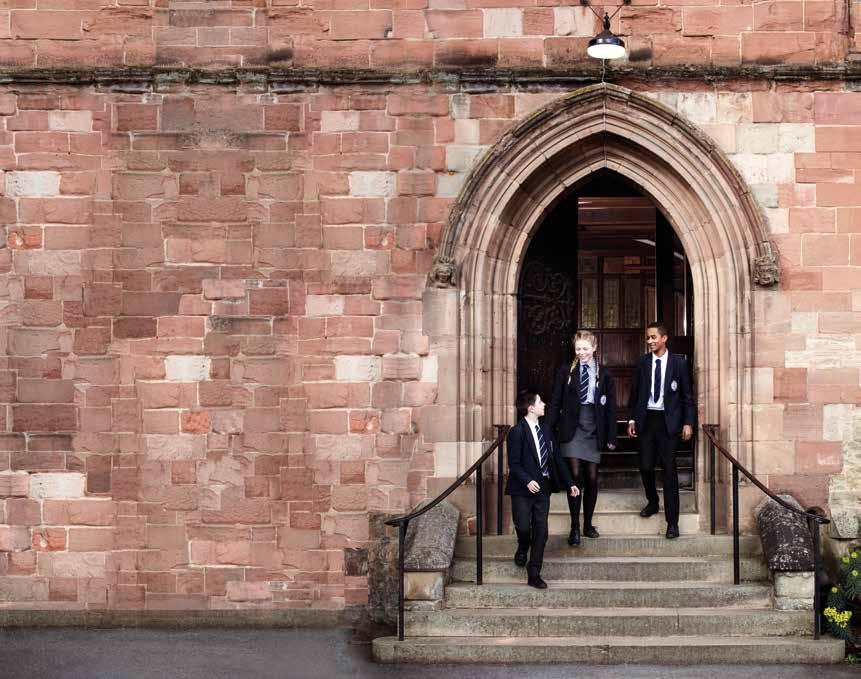
Henry VIII re-founded The King’s School in 1541 with the specific aim of promoting excellence in teaching to all those willing and able to learn, regardless of their financial circumstances. The school’s re-founding principles were to provide an education for ‘forty boys, poor and destitute of the help of friends, of native genius…and apt to learn’. Nearly 500 years later, we continue to be passionate about enabling talented children to attend King’s regardless of their parents’ ability to pay the fees.
Pupil bursaries are at the heart of Development Trust activity. The King’s School Worcester Development Trust was formed in 1968 as a separate registered charity (No. 527530) and aims to build up long-term charitable support for the school. The wishes of those who give to the school are upheld by the Trust, which ensures that King’s pupils benefit from the generosity of those who donate to the school.
In 2001 the Trust was re-structured with the aim of supporting the governors of The King’s School in their strategic aims, primarily through raising funds for bursary provision. Following a period of fundraising for the school’s excellent Sports and Performing Arts Centre, the Keyes Building, the Trust is now totally committed to building up sufficient capital funds to eventually support 40 bursary places in school, into perpetuity. The Trust currently funds some ten bursary places. In order to achieve this target, we aim to increase our funds from the present level of £2 million to £5 million by 2025 and eventually to £18 million by the time King’s celebrates its 500th anniversary, in 2041.
Throughout the 20th century and up to the late 1990s, pupils at King’s School benefited from two government funding schemes
(Direct Grant and Assisted Places), which, in effect lowered the overall level of fees, as well as providing full funding for up to one third of all pupils. Nowadays financial support for pupils comes primarily from the generous donations of individual members of the King’s family. We are hugely grateful to those who support bursaries at King’s; all donations, whatever the size, enable children to attend the school, who would not otherwise be able to consider King’s as an option.
Many of the students who have been supported by the King’s Bursary Programme have become faithful ambassadors for the scheme, advocating the transformational impact of a bursary place at King’s. Leanne Sheen (W 99-06) attended King’s via a bursary and she was also awarded a King’s scholarship; after King’s she read Modern & Medieval Languages at Cambridge and then studied Law in London. Leanne now works as a banking and finance lawyer for an international law firm. She talks about how, in addition to the academic rigour of King’s, the school also helped her to develop self-awareness, resilience and confidence; as she puts it, “the soft skills that stay with you for life.”
Leanne says of these skills: Self-awareness - “Trying so many extracurricular activities and a broad range of academic options allowed me to explore my interests at an early stage. As a result I knew what my strengths and weaknesses were and could use this knowledge to my advantage.”
Resilience - “At King’s whenever something didn’t go as planned or I got a bit complacent, my teachers would push me that bit further, reminding me to keep my head down and go after more than just what I needed to do well in an exam.”
Confidence and Courage - “Knowing your own ability and your limitations, you then know what you do and don’t enjoy and you’re willing to work hard to improve. If something goes wrong you can stay positive and plan a different way of achieving your goals. Those skills serve you well regardless of your academic level and professional background.”
Leanne is a keen supporter of the Bursary Programme at King’s and in May last year, we were delighted that she accepted an invitation to become a Trustee for the King’s School Worcester Development Trust.
We are enormously indebted to those who feel able to support the work of the Trust in respect of bursaries. Financial support for bursaries can be anything from a small monthly donation to a single individual donation. Leaving a Legacy to King’s is an excellent way to support the work of the Trust should your financial circumstances not enable you to easily donate during your lifetime. For those who hold The King’s School in their affections, remembering the school in your will is one of the most personal and significant ways to help open the door to King’s for future bursary children. Even a small percentage of your estate can have a transformative impact.
If you would like to know more about supporting King’s bursaries, please call Liz Elliott on 01905 721719 or email at eelliott@ksw.org.uk
Information is also available online at ksw.org.uk/open-the-door
The Annual Dinner returned this year to our normal venue of College Hall, under the watchful gaze of the Majestas, after last year’s venture into the Cathedral for our 475th anniversary. The refectory looked magnificent for our dinner (the 115th meal since the formation of the club) and over 100 OVs, guests, staff and former staff sat down to a great meal and conversation. Before the meal, there was musical accompaniment from current sixth former Ben Wadley (U6 Ch). There were some excellent reunion groups that attended this year, including the 1988 leavers who were the largest single group, and groups of leavers from 58, 83, 93, 98 and 03, some of whom were returning to King’s for the first time since they left. After the meal, the Headmaster updated the guests on the school’s activities in the previous year and gave us the details on some highlights, especially in terms of the sporting, arts and academic achievements through the year. Julia Annable gave her farewell speech as Club President and gave us details of some of the most memorable moments from her two years. These included attending Remembrance Day Services at the school, handing out ties and pashminas at the Leavers’ Assembly and some of the sporting events at which she has been present. Not forgetting, of course, the 475th anniversary celebrations that took place during her tenure. Julia was then pleased to hand over to Sally Themans who was taking the reins of Club President the following day. Thank you to all those who helped with the setting up and decoration of the hall, and especially to the Archivist Harriet Patrick who put together the displays relevant to the year groups who were attending this year. Special thanks must go again to the Development Office for their wonderful work in expediting the whole reunion weekend.
OLD VIGORNIAN CLUB COMMITTEE 2016-2017
President: Julia (Simcock) Annable (Co 85-87)
Vice-President: Sally (Ogden) Themans (Co 84-86)
Chairman: Richard Underwood (Ch 68-79)
Hon Secretary: Nick Stephens (Br 77-84)
Hon Treasurer: John Potter (Cl 55-62)
Member Emeritus: Alec Mackie (Cl 47-56)
Headmaster: Matthew Armstrong (Hon OV)
Development Office
Representative: Liz (North) Elliott (Co 82-84) Sophie Borrillo-McLellan
Accounts Examiner: Gardiner Fosh, St John’s
Committee Members: Roy Padden (Cl 46-52)
Mike Page (Cr 60-65)
Will Kerton (Os 82-92)
Helen (Meacham) Kennedy (E 90-92)
Simon Cronin (S 67-77)
Nick Clark (H 88-90)
Claire (Williams-Hewitt) Andrews (Co 90-92)
Rob Richards (Cr 79-84)
Collectively and individually, OVs are able to offer in a variety of ways, inspiration and motivation to King’s pupils in a world that is both challenging and continually changing.
This year we were delighted to welcome England Rugby player Luke Narraway (Os 97-02) and Economist Ranga Chand (S 58-64) as the newest members of our Barnabas Group. The name of the group is derived from St Barnabas who was a fellow traveller with St Paul on his missionary journey during the early years of establishing the Christian church. He was an inspirational figure and is described in the Acts of the Apostles Ch. 4, v.36 as “son of encouragement”. The Barnabas Group is founded to build on this theme for the benefit of future generations of pupils, and distinguished, inspirational OVs who have excelled in their chosen profession are invited to join this group and to speak in College Hall of their experiences and lessons learned.


After King’s, Ranga went to the University of Toronto where he studied Economics. He has held senior positions with Canada’s Department of Finance and served as a director of the Conference Board of Canada before joining a major stock brokerage firm. He has also taught economics at the University of Waterloo and has represented Canada at numerous economic forums, including the OECD in Paris and the United Nations.


Luke Narraway (Os 97-02)
Luke Narraway joined The King’s School Worcester in 1997, and during his time at school excelled in sports, most notably playing for the 1st XV Rugby team.
Upon leaving The King’s School, Luke was signed by Gloucester Rugby, where he made his debut for the team playing in the 2003 Zurich Premiership.
Luke has an established and successful International Rugby Union career having been selected to represent England on many occasions. In 2006 Luke played for the England Saxons in the Churchill Cup. In 2008 he was chosen to play for England in the prestigious Six Nations Championship, and also in England’s tour of New Zealand including matches against the All Blacks.
2009 saw Luke represent England in the Six Nations Championship against Wales and Ireland, and also in 2009 Churchill Cup. In 2012 Luke joined the French team
Perpignan where he played until 2014 when he was signed by London Irish. On 12th April 2017 Luke signed a two year contract to become a player- coach at Coventry Rugby.
On Barnabas Day, Luke spent a full day with us at King’s. He begun by giving a thoughtful and engaging Q&A session in College Hall, speaking about his time at King’s and how he first became interested in Rugby. He also offered an insight into the rigorous demands of playing professionally and spoke of the pride of playing for your country. Luke offered advice to some of our most promising sporting pupils who are part of the Elite Athletes Programme, and led training sessions with King’s Hawford, King’s St Alban’s and King’s Senior 1st XV rugby team. Luke also joined Liz Elliott, Development Director, Sophie BorrilloMcLellan, Head of Alumni Relations and a selection of OVs to watch the King’s vs RGS Modus Cup Challenge Cup at Sixways.
Between 2000 and 2003 he hosted a popular television show “Talking Mutual Funds with Ranga Chand” which aired weekly on Canada’s Report on Business Television (ROBTV) for three years and reached over 4.3 million viewers nationwide. Ranga has also published a number of books, including ‘Best of the Best Mutual Funds’ and ‘Getting Started With Mutual Funds’.
Ranga began the day by giving an Address in College Hall about his time at King’s, how it has shaped his life, and how he was encouraged to “just apply yourself more diligently and press on”- a lesson which has stayed with him and helped him through his career. To listen to Ranga’s inspiring address in full please visit https://soundcloud. com/kingsworcester/barnabas-speakerranga-chand-6th-march-2018
Following this Ranga spoke to pupils at King’s St Alban’s about ‘What is Economics?’ where they had a session learning about supply and demand. He was then awarded his Barnabas shield and signed the prestigious Barnabas book along with Headmaster, Matthew Armstrong and Head of School, Alice Evans. Throughout the day, Ranga gave talks to sixth form Economics and Business Studies students linking in with topics in their curriculum including the perceived move from globalisation to nationalisation, the potential reappearance of an asset market bubble, and the prospects for the UK economy. Ranga also gave a Careers Talk in the Bolland Room with a Q & A afterwards.
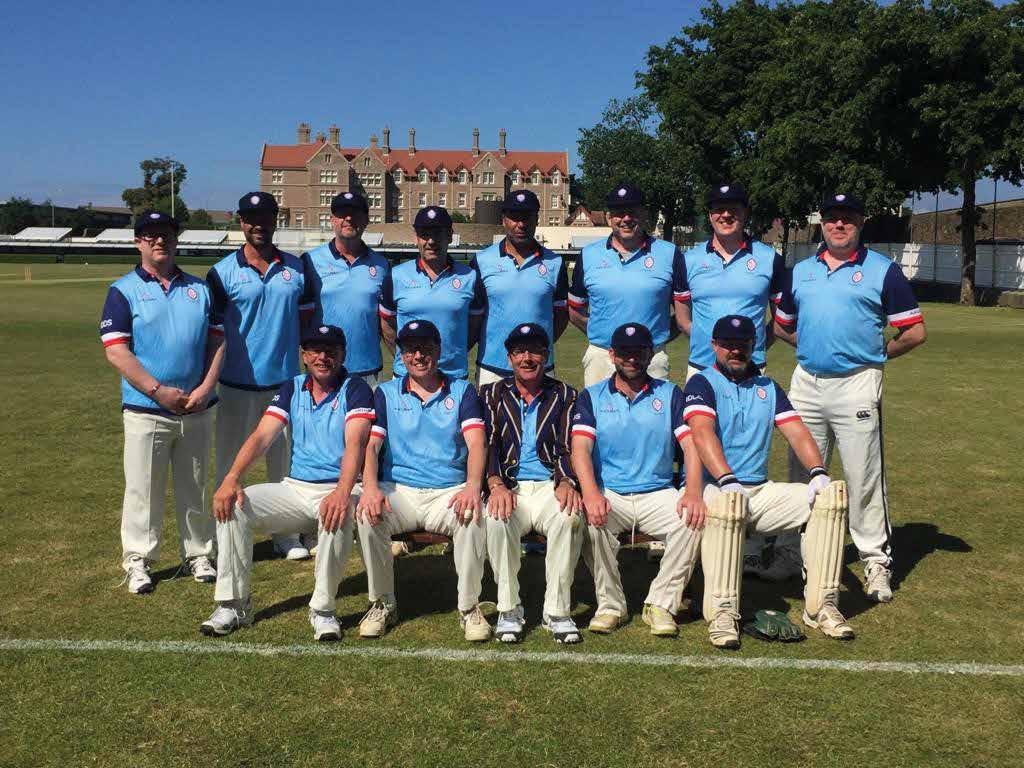
From 25th to 28th May 2018 many of the original school 1st XI squad from 1988 made the journey down memory lane to play two games of cricket on Jersey as we had done 30 years before.
The Squad
Andrew Underwood (S 77-88)
James Underwood (S 83-88)
Robin Bishop (Ch 82-88)
Chris Goodman (K 84-89)
Rob Dow (Cl 84-89)
Ben Jones (Br 82-89)
Richard Tomlinson (Cl 83-90)
Aidan Thompson (Cl 80-90)
Matt Bourne (W 83-90)
John Malins (K 85-90)
Duncan Hughes (Os 84-91)
JJ (John) Richardson (H 82-91)
Phil O’Neill (W 82-91)
Non-travelling team members
Neil Robinson (H 79-89) & Jamie Rogers (Cl 86-91) who both sadly could not make the tour at the last minute and were sorely missed. Well Nobby Robinson was, not so much Squealer Rogers.
A small but vocal advance party arrived on Friday 25th. The locals I am sure have not yet recovered from their murderous karaoke session.
Bolstered by many early arrivals on the Saturday we set off to The Farmers cricket
ground, a beautiful setting in blazing sunshine. The OVs were set 281 in 35 overs, after a very fine 92 off 47 balls from Farmers batsman M. Tribe. The Old Boys were always up against it, chasing this total, having only a few players who are still playing regularly.
However, there were some notable performance in the field. Ben “Dale Winton” Jones bowled a mixture of unplayable deliveries with some very playable deliveries in his 2 for 44. He opened the bowling with Matt Bourne, unlucky not to pick up a wicket in his 7 overs. John Malins, Rob Dow and JJ Richardson, the express pace man bowling off-spin, all bowled well. James “if only we had a spinner” Underwood bowled with great control as always and should have had more than 1 wicket. Aidan Thompson picked up 4 for 49, all of them caught which tells you he wasn’t necessarily threatening to send off stump cart-wheeling back. Phil O’Neill had sunstroke after 3½ minutes in the field but held a good catch and Duncan Hughes did an outstanding job as wicket keeper. We were led without imagination by Skipper Andrew Underwood who also took the first of several tour catches. More on this later. Robin Bishop was also there apparently.
However, the story of the day and unanimously voted “moment of the Tour” was Chris Goodman’s 1 run from 22 balls.
Old Boys batted first, O’Neill and Hughes facing the new ball. Phil played one of the shots of the tour a deft late cut for 4 but fell soon after. He also made a brilliant tumbling diving stop in the field which had seemed extremely unlikely up to that point. Thompson joined Hughes and for a while they rolled back the years in battingfriendly conditions on another true pitch. Thompson fell for 30 to a catch that really had no right to be taken: an otherwise “flat six” was ultimately a wicket. Hughes continued for a very fine 65, supported superbly by Bishop who batted very nicely for 36. Richard Tomlinson finally arrived on tour, having “forgotten” about a family
Bourne and Jones opened up the attack again. History does not record quite why they only managed 3 over opening spells and didn’t return for a second spell, but both picked up an important wicket. It was when Phil Le Cornu and W. Jenner came to the crease that the game swung back to the Vic College old boys; both scored very good 50s but fell to James Underwood and Richard Tomlinson who both bowled very well, Tomlinson picking up 3 for 23. Underwood sensibly decided not to employ his newly found “hand facing upwards” pétanque skills.
Skipper Underwood Snr though was the
With the two set batsmen dismissed, the game was back in the balance and the hosts needing 4 from the final over, OVs only needing 1 wicket. Victory was secured by Victoria College with 2 balls to spare. An excellent game of cricket.
The evening was spent in the company of our fellow tourists whose support was wonderful all weekend, Russ and Sue Mason, Steve and Sarah Le Marchand, Anita, Harry and Kate Iddon, as well as several of the Victoria College old boys at a fine steak restaurant. The capacity of the wine cellar was again severely tested, but it held firm, unlike many of the tourists.
Chris had a brain tumour removed a few years ago and simply to be playing cricket, let alone amongst old friends in Jersey, is a true blessing. His eyesight is certainly not what it used to be, but his bravery, application and determination is humbling. His innings mirrored his battle to recover. His single was greeted with the biggest cheer that one single run has ever had.
Hughes, Richardson and O’Neill also showed glimpses of real class in their knocks. Oh, and Rob Dow scored a brilliant 105. His innings was both patient and powerful, unlike his personality. The OVs finished on 222 for 6, 59 runs short.
The post-match celebrations involved watching football in the Farmers clubhouse, thanks to the chap who went home and brought back his Sky box. He also got a big cheer and a couple of pints for his trouble. On to the curry house, via the local bus service, for some very fine food and more wine than could be deemed sensible. Skip tried (very hard) to get the Hotel to open the bar when we returned but thankfully he was rebuffed. The words used by the Night Porter to describe their exchange shall remain undisclosed.
Next day we were bright and breezy back to Victoria College, the scene of our 88 tour games, a beautiful setting and another blue-sky scorcher. This time the
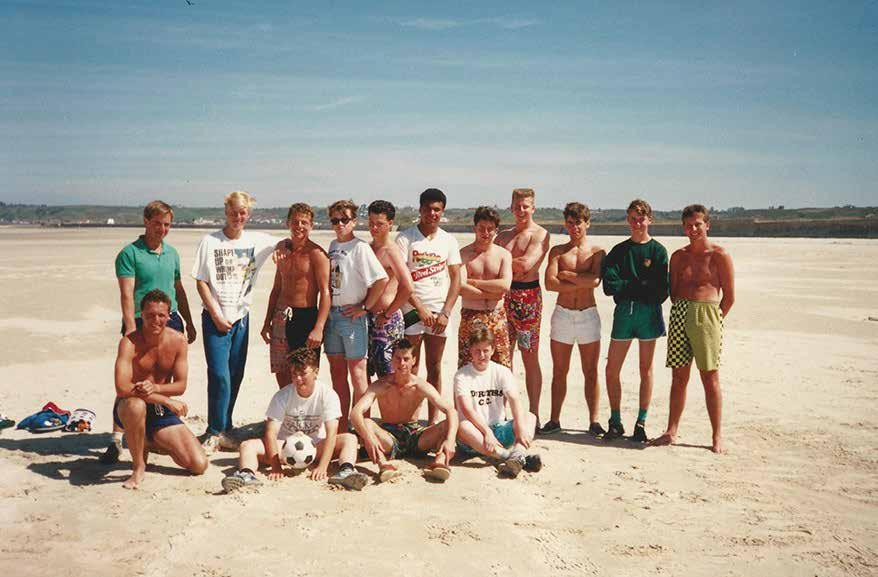
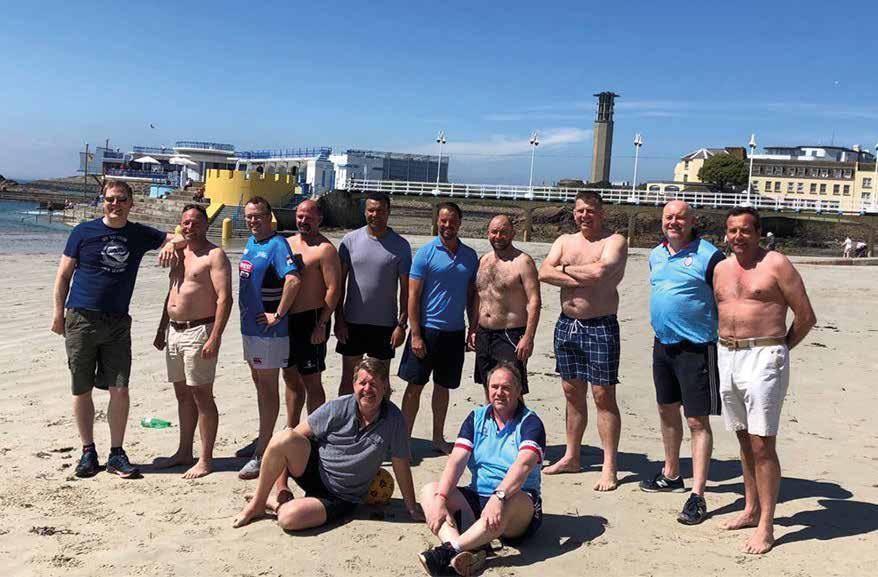
The warmth and strength of the King’s family is evidenced by the long standing continued relationship that OVs maintain with the school. The year has seen many reunions and events both here at school and further afield, offering OVs the opportunity to reunite with friends and reacquaint themselves with the school today.
London Drinks in November at the Cartoon Museum saw us joined by some 100 guests for a lively evening of meeting friends and networking with OVs from different years. A caricaturist gave a quirky and humorous twist to the proceedings, and the socialising continued long into the evening.
Five and Ten Year reunions from the years of 2012 and 2007 respectively, have been great fun and it was such a pleasure to hear the stories and journeys of some 160 of our newer OVs when they came back to school. A University reunion in Oxford similarly gave ample opportunity to catch up with some of our more recent leavers.
25 OVs met up at The Harvard Club in New York, sponsored by James Green 12). This event gave those who have moved

across the pond a fantastic opportunity to meet each other and to share experiences of life in the USA.
Sport remains a large part of many OVs lives. We had great fun working with Ilija Rašović (Cr 03-10) to arrange an OV Basketball reunion. The afternoon was thoroughly enjoyable with 13 OVs evidently not having lost any of their competitive spirit! Various King’s cricket
teams have embarked upon reunion tours, including 19 recently going to Jersey & 11 to Guernsey, where they have enjoyed playing matches with teammates some 30 years on. We have met OVs at the annual Modus Challenge rugby and the Worcester City Challenge football fixtures against RGS, Henley Royal Regatta and the OVCC Cricket matches. Approximately 50 OVs have played in OV Cricket, Football and the Summer of Touch Rugby competition.
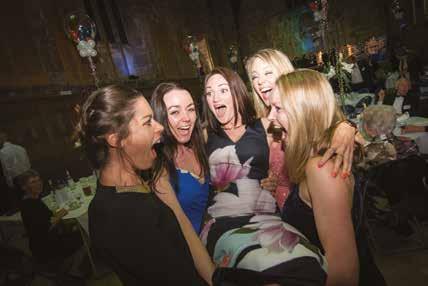
A particular joy this year was working with OV Jeremy Wright (S 64-68) to arrange a reunion for the years of 67-69. It was such a pleasure to be joined by over 60 OVs at this event. Tours of school offered an insight into the school today as well as rekindling some memories and provoking some amusing stories. The school gardens were the perfect background for a barbeque where everyone met again some 50 years after leaving school.
The Annual OV Reunion Weekend in May was hugely successful, complemented by glorious sunshine. The black-tie dinner in College Hall saw the weekend off to a terrific start, and with Cathedral services, school tours, lunch with retired staff, and the OVCC cricket match, there were plenty of opportunities for people to come back to King’s and see friends. We were delighted to have just under 200 attendances to events over the course of the weekend.
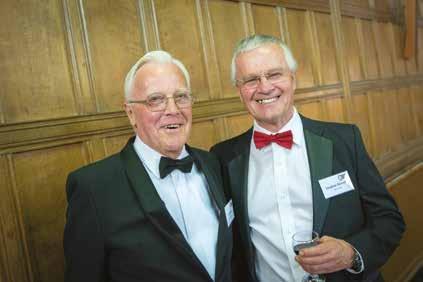

Two OVs in the List of New Queen’s Counsel
Congratulations to two OVs who have been appointed QC in 2017/18. Kate WilsonSmith (née Lumsdon) (E 85-87), and Edward Cumming (Br 90-01), have both been honoured with taking the silk, and we have been thrilled to share the good news with them both. Ed was the youngest of all successful applicants, being 34 at the time of his application. Of the formal swearing in day in March Kate said, “We had the formal swearing amid blizzards at Westminster. It was all rather surreal!”

We were absolutely thrilled to hear that OV opera singer Allan Clayton (H 9199) has won the prestigious 2018 Royal Philharmonic Society Singer Award as well as the 2018 Whatsonstage Award for

With news and photos flooding in from OVs telling us of impromptu meetings and informal reunions that take place year round, all across the world, we see how the friendships from King’s stay strong and continue long after leaving school. In addition, OVs are incredibly generous in maintaining strong bonds with the school, donating their time and support to current pupils, helping to inspire and motivate by taking part in careers events and coming in to speak and share experiences. Examples are the 8 OVs who took part in Careers Speed Dating, our most recent OV Barnabas Speakers, rugby player Luke Narraway (Os 97-02) and Economist Ranga Chand (S 58His Honour Nicholas Chambers QC (S 57-61) visited school to meet potential future lawyers and likewise John Foley (Cl 64-74) met Economics and Business pupils. The Development & Alumni Relations office are delighted to report that, reunions aside, close to 70 OVs and members of the King’s family came back to school over the last year either to meet current pupils or to experience a tour of school.

We were delighted to hear that OV Chris Collier (S 57-67) was awarded an MBE in the Queen’s Birthday Honours list. Chris was awarded an MBE for services to children through his work with the NSPCC who he has supported for over 19 years. He was a founding member of the charity’s Peterborough Business Support Group and has been its chairman for 19 years, helping to raise more than £800,000 to support local vulnerable children and their families.
Representing England at the Commonwealth Games
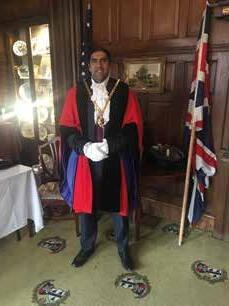
In 2014 he became an NSPCC Honorary Council Member and received a Loyal Service Award in the same year.
(Br 91-96) who has been elected Mayor of
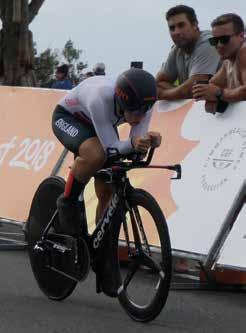
A massive well-done to OV, Hayley Simmonds (Cr 99-06) who was selected to represent Team England cycling squad for the 2018 Commonwealth Games on the Gold Coast, Australia in April. At King’s Hayley was a keen rower, representing England in the 2004 Home International Regatta and she then switched to cycling whilst studying at Cambridge University. At the games we were delighted to watch Hayley and her fellow England squad compete fiercely in the road cycling event, and we are so proud that she secured a bronze medal in the Women’s Individual Time Trial.



‘Mars’
Squadron Leader Bonnie Posselt (Cr 98-03), a Speciality Registrar in Aviation and Space Medicine, has completed a month spent in isolation in the deserts of Oman, simulating a mission on Mars with the Austrian Space Forum. Bonnie was responsible for monitoring the medical welfare of anaolgue astronauts. Bonnie sat in the operations centre at a console, closely monitoring the heart rate and traces of both AAs, keeping an eye on their vital signs. The information was relayed back to Mission Support Centre (MSC) in Austria, so that the data can be logged, allowing them to see emerging trends. She could also ask any questions to the medical team based there, but there was a 20 minute delay for any reply, just like there would be on a mission to Mars. This helped to simulate the remote and isolated nature of any future mission and was a
key consideration in all medical planning beforehand. The AMADEE-18 mission has provided a valuable platform to practise space medicine procedures, with many lessons learnt that will help inform real life operations.
Lecture Success
Congratulations to Ilija Rašović (Cr 03–10) who came second in the Young Persons’ World Lecture Competition hosted this year in Perth, Australia by the Institute of Materials, Minerals and Mining! He was representing the UK in the finals and his topic was ‘The World’s Most Expensive Material’.
Please let us know your news: alumni@ksw.org.uk
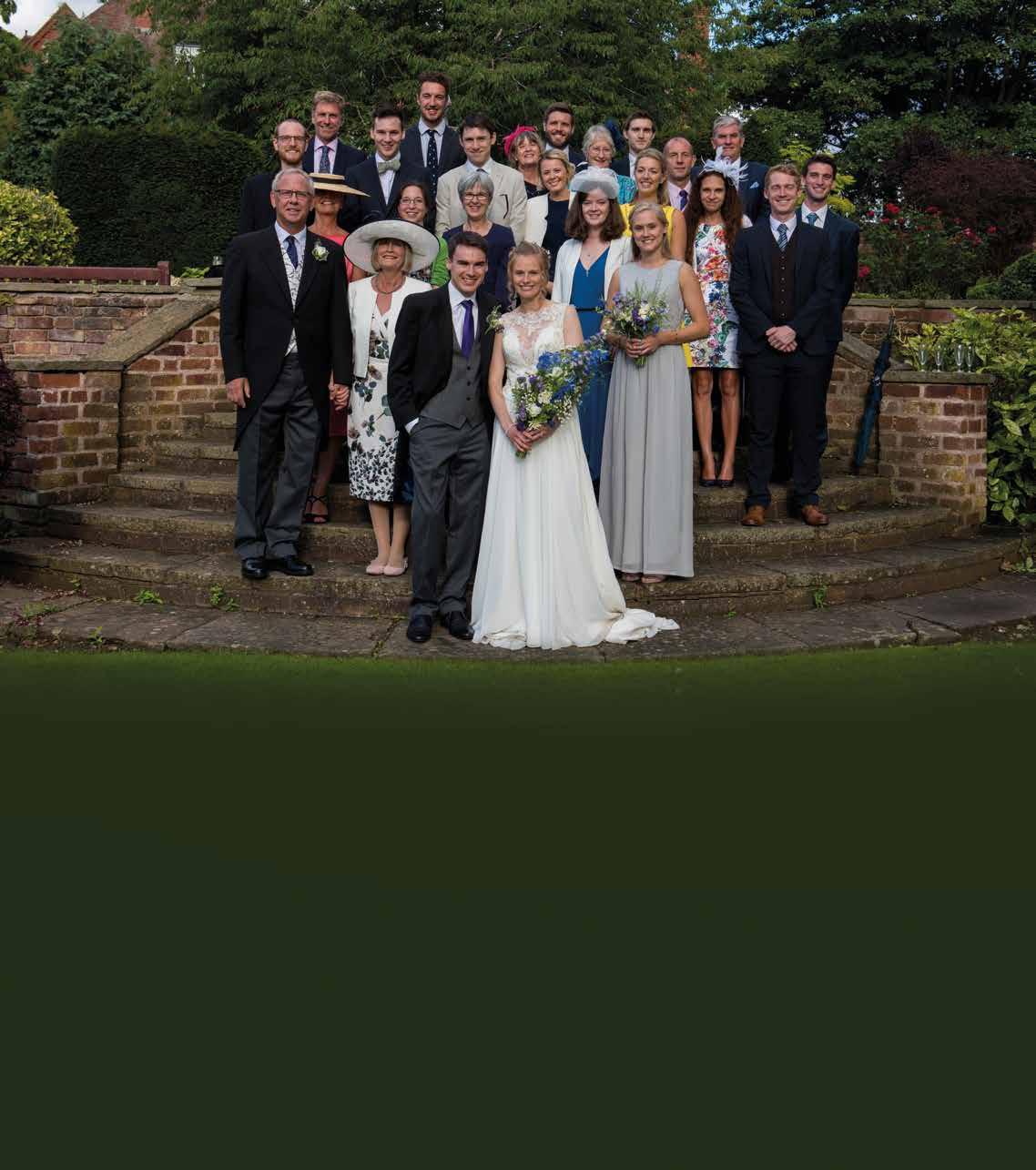
Joelle Price (née Gready) (W 04-09) married James Price at St James the Great Church in Pensax, Worcestershire with the reception at Whitbourne Hall near Bromyard on 19th August 2017. In addition to sister Abi, Joelle had OVs Amber Morgan (née Taylor) (W 02-09), Verity Dixon (née Geeves) (Os 05-09), Hayley Weaver (W 0709), and Amy Gready (née Marshall) (Br 08-10) as bridesmaids. Joelle and James enjoyed a honeymoon in Bali which Joelle says was “amazing” but “over too soon”!
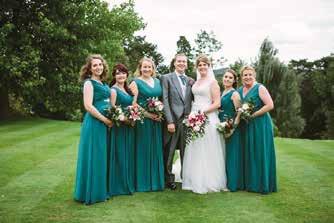
Phil O’Neill (W 82-91) married Laura Leavesley on 12th May 2017 in Sorrento, Italy. The Ceremony was held at St Francis of Assisi Cloisters with the reception held at the Palazzo Marziale. Best men included OVs Andrew Whittaker (W 89-91) and David Mendham (Hon OV) and brother Jon. OV Will Coomber (Ch 81-91) also attended.
Phil says, “Laura and I now live in Uplands, Swansea so if there are any local OVs based in Swansea we would love to hear from you Poneill19712@btinternet.com.”
We have been delighted to receive news of the following OV marriages.
Please do let us know your wedding news: alumni@ksw.org.uk
Peter Beaumont (W 81-83) married Eira Parry in Henley on 21st July 2017 at St Mary’s church in Henley-on-Thames. The reception took place further down the Henley Royal Regatta course in Remenham where the couple were greeted with a rowing blades guard of honour, each blade representing clubs/countries that they have raced for or coached.
OV, KSW crewmate and local neighbour Ed Simpson (S 75-84) provided the most amazing wedding food, including serving canapés on a KSW blade!
On 12th May 2018, Zoë Jordan (née Monkley) (Ch 01-08) was delighted to be able to marry Matthew Jordan and celebrate with four of her old school friends. They were married at Much Marcle Church, on a wonderfully sunny day surrounded by friends and family. The picture was taken at the reception in Upton Bishop Millenium Hall and shows left to right Sophie EdgarAndrews (S 03-08), Becky Leach (Cr 01-08), Zoë Jordan (Ch 01-08), Amy Haddock (Ch 01-08) and Colette Brown (Cr 04-08).
Philippa Moriss-Jeffery (née Philippa Denlegh-Maxwell) (Cl 02-09), married Daniel Moriss-Jeffery, on 12th August 2017 in Worcester Cathedral. OVs Jordan Ray (K 07-09) and Laura Child (K 02-09) were bridesmaids, with many more OVs in attendance for the special day. Philippa told us “It was wonderful to return to the cathedral after many school assemblies there, and being a chorister there for several years. It was an exceptional day, with cathedral bells ringing, incredible music and beautiful weather - it was a day we will never forget.”
Sophie Le Marchand (Cl 96-07) married Lewis Jaques in Worcester Cathedral on 5th August 2017 followed by a reception in The Michael Baker Boathouse and school gardens. Sophie and Lewis met while studying at Oxford University and they were delighted to be joined by many OVs and members of the King’s family on their special day, including Sarah, Stephan and Emma Le Marchand, Anita, Kate and Harry Iddon, Russ and Sue Mason, Ed and Polly Sayce (née Mason), Tom Longley, Stephen Poole, Helen, Tom and Debbie Bellfield, Heather (née Uren) and Daniel Leach, George Watson, Robin Middleburgh, Antony and Hayley Gillgrass, Richard Davis and Patricia Stevens. OV Beth Raybould (née Martyn Smith) was their photographer.

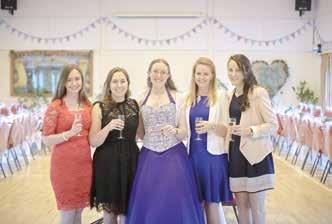


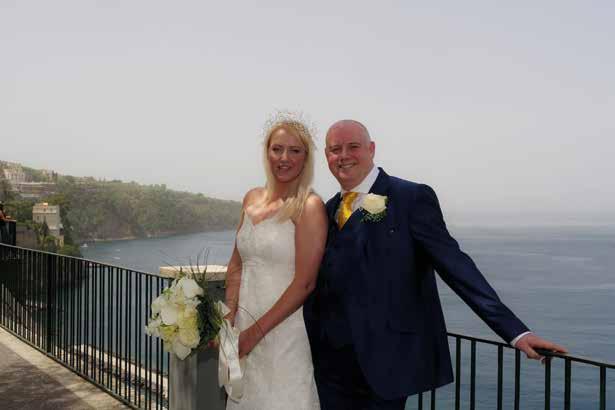
April Wallace (née Dutton) (Cr 03-09) and Jonathan Wallace were married on 19th August 2017 at Old Luxters Barn in Henleyon-Thames. April had two OV Bridesmaids - Helen Conway (Cr 02-09) and Olivia (Bobbie) Dutton (S 10-15) and they also had several OV guests including April’s French exchange student, Marion, who April was introduced to on the Sixth Form exchange and has been a firm friend ever since!
Emily Malik (née McNally) (Br 01-08), married Ammar Malik on 1st July 2017 at the Four Seasons, Hampshire in their beautiful walled gardens. Emily had six bridesmaids including two OVs, Lucy Halls (née Clayton) (Os 01-08) and Sarah Porter (Br 01-08). Emily and Ammar also had a Pakistani wedding the week after on 8th July 2017 in Cheshire at Thornton Manor.
Our gorgeous daughter Ellie Greenall arrived on 15 July 2017 in the middle of a flood which nearly cut off our small town. Ellie’s a real globetrotter baby as a New Zealand citizen with UK parents Kate



On 3rd January 2018 Freddie Fardon joined brother Charlie, in Rob Fardon (Os 90-00) and wife Sarah’s quest to build a 5-a-side football team. Whilst Charlie and Freddie briefly thought the World Cup was ‘coming home’ this summer, they have promised to try and make the team for 2038.
George Laurie Hislam was born on 17th February weighing 8lb to OV Sarah Hawkins (Cl 00-07).

John Barrett
John, who died in January this year, was a boarding pupil at King’s from 1950 to 1958.
After Oriel College, where he read PPE, he joined the National Coal Board as a graduate trainee, where he specialised in computing and where he spent years as a System Analyst, before working in the same field in other countries, including Czechoslovakia, Switzerland, and at the University of Limerick in Ireland. He retired in 2000 from the Imperial War Museum where he had spent 10 years.
He and his wife, Ann, retired to her home city of Belfast where they spent many happy years travelling around Ireland and many other countries. He became an avid reader during his time at King’s and had a particular interest in the classics so they spent a lot of time travelling in Greece, Italy, Egypt, Jordan and other Middle Eastern countries.
He is survived by his wife Ann.
Ann Barrett

Michael Clarke Mike was born in Tibberton on 7 August 1938, attending the local primary school. However he was awarded a scholarship to King’s School. He became a member of Creighton House and remembered the time with fondness.
After leaving King’s he joined March and Edwards Solicitors in Worcester. He completed his National Service with the RAF where he was identified for a role within the intelligence sector and involved in covert listening. He was firstly based in Iraq and then in Cyprus at the time of the Eoka insurrection. He was seconded to the United Nations during his time in Cyprus and awarded both the General Campaign Medal and the United Nations Medal as a consequence. Mike’s time in the RAF was eventful.
After National Service he returned to March and Edwards before moving on to the firm of Gabb and Pittaway in Droitwich. In 1959 under the supervision of Jack Pittaway, it was arranged that Mike would be based at the firm of John Stallard and Co in order to
Edward Bishop
Dr Edward Bishop, who died on 23 March aged 82, was one of seven people who met in 1962 to plan the teaching of BSc courses in chemistry at the new University of Sussex.
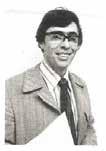
Edward had come from Oxford (Wadham College) after research in the laboratory of Rex Richards, one of the pioneers of NMR (nuclear magnetic resonance) spectroscopy. This technique allows the environments of certain atoms, notably hydrogen, to be studied by their response to oscillating magnetic fields. Much of Richards’ equipment was hand-built; now NMR (or MRI) instruments costing millions of pounds are widely available in research laboratories and hospitals.
In the next few years the chemistry staff grew rapidly and, as a Lecturer in Chemistry, Edward helped to build the high national and international reputation of the (then) School of Chemistry and Molecular Sciences (MOLS). He stayed until his retirement in 1999.
His main contribution was to teaching over a wide range of physical chemistry, but he was also a founder member of the Environmental Science subject group. Collaborations with biologists, e.g. in
keep the firm going at that time until Richard Stallard’s nephew Bill was able to join the firm. Mike qualified as a solicitor from the Chester College of Law and immediately became a partner in this firm where he remained for some 45 years. He retired from the partnership in 2005 but remained a consultant for another 3 years. Mike‘s practice was mainly conveyancing and probate. His strengths were his friendliness, common sense and innate practical ability. He was involved with the local Law Society eventually serving a year’s term as its president.
Away from the law, Mike was involved all of his life with the Ancient Order of Foresters Friendly Society. He became a member of the Board and later a trustee. He became the national president for the year 1999-2000, during which time he travelled all over the country with his wife and young daughter raising in excess of £35,000 for his chosen charity, Acorns Children’s Hospice.
Mike married Val on 16 September 1961 and they went on to have a daughter, Kate, in December 1964. Sadly Val died on 2 June 1994 from cancer and Kate also succumbed to cancer in November 2015.
the Agricultural Research Council Unit of Nitrogen Fixation, and with geographers, led to publications on a range of topics.
Edward was obsessed with land and marine snails, of which he had an enormous, scholarly described, collection. Some were purchased but many were harvested in the field. Locations of his holidays abroad, with his wife Anne, were at least partly determined by their endemic snail populations. He supervised several thirdyear projects concerning the relationship between an unusual snail population and local climatic and geological conditions. Later he introduced a new snail species to marshland in Dorset and became an anonymous celebrity when the snails were an important issue in plans for a car park.
Edward, and four other Sussex chemists, in 1965-67 joined with scientists from elsewhere to form a relay team in Ibadan, Nigeria, to help establish courses in the new University of Ife. He returned to the UK with several edible giant land snails, which survived for some time in a special container in Brighton.
Edward was an enthusiastic curry maker and consumer. His boyhood in Worcester led to an interest in fine china and he and Anne took pleasure in using it.

Christine Battrum
Christine Battrum joined the Chemistry department in (2000). She was a formidable teacher who displayed a boundless energy in the classroom and in all activities she was involved with. She simply loved her subject and was always eager to challenge pupils of all abilities to look beyond the confines of the syllabus and to appreciate the importance of Chemistry in the world around them. She was completely unselfish in giving up considerable amounts of time outside of lessons (including her own holidays) in providing extra help and there are hundreds of pupils who have benefited from her attention, not only in terms of their results but also in the way that she helped them develop a sense of belief in their own ability; she really cared and they knew it. As a colleague she was tremendous fun to be with, whether it was grabbing a cuppa between lessons or being the life and soul of the party on a raucous night out. Her contributions to extra-curricular activities, notably with the Duke of Edinburgh Award and sailing, were made with her characteristic generosity of spirit and positive nature.
From Tom Sharp: She did plenty of lunchtime detentions, to the extent that my History students always seemed to have a pre-existing engagement with her whenever I attempted to keep them back. They seem to have quite enjoyed her detentions!
Mike married Carys in 1996 and they had two children, Eleri who is currently studying medicine at Nottingham University and Rhys who is in the sixth form at drama school in Birmingham. Rhys followed in his father’s footsteps joining King’s St Albans in year 3 until he left last year. He was a member of Oswald House.
At home Mike was never someone who could be idle. He was a keen gardener and kept a flock of Suffolk sheep, various breeds of poultry, a donkey called Hemlock and her best friend, a retired Texel ram called Tommy.
Mike was diagnosed with Alzheimer’s, the cruel disease from which he eventually died.
All who knew him would say that he was a true gentleman.
He will be very sadly missed by Carys, Eleri, Rhys, his wider family and friends.
Carys Clarke & Rhys Clarke (Os 12-17)
Christine was appointed tutor of Oswald House in 2009 and thereafter was known as “Batty” after she introduced herself to pupils as “Batty Battrum” in a getto-know you session with students. She immediately brought with her an infectious enthusiasm and irrepressible energy which meant we always started the day with a smile. Students in Oswald House always knew where they stood with Christine, and although she took no prisoners with behaviour, she was always on their side and had an infinite amount of time for everyone. Fond memories during her time in Oswald House include her enthusiasm for the annual House Song Competition, when she led by singing loudly and dancing in her colourful array of shirts, and her enjoyment in dressing up as Father Christmas for House bowling, managing to get eighty raucous students to sing the twelve days of Christmas, as well as attempting Silent Night in German! Even when she was seriously ill, she managed to still take an active interest in her students and staff well-being. Oswald House has been left the poorer following the loss of Christine; we all miss her very much.
Christine loved her Zumba, enjoying the regular staff sessions. It was a wonderful way to let off steam and ‘shake our booty’ at the end of every Friday! She threw herself into energetic dance routines to the likes of Shakira and Rhianna with her customary enthusiasm and dedication and particularly revelled in our cool down stretching to ‘The Circle of Life’ from the Lion King.
It was Christine who took charge of the chorus line in the staff pantomime performance of Jack and the Beanstalk in 2013. She threw herself whole-heartedly into her own role (as zombie Scary Spice) but also found time to organise the rest of us, writing out the dance routines and words for the chorus numbers, organising extra rehearsals and even food. Sherry may also have been involved!
A great friend to the school library, our series of extended reading lists for 6th formers is her legacy. It all started back in 2013 with her idea for a collection of books called ‘Inspiring Chemists’ She was a very keen reader herself, and liked to read ‘with a purpose’. For example if she was going to Venice, she wanted to take fiction set in Venice!
I remember going on a Lower Remove camp with her at the time when a whole form of 24 or so went together with four or five staff. She graciously volunteered to do the sleeping in the tent outside; I am ashamed to admit, the rest of us were angling for one of the berths indoors. She had one request, namely that we all assisted her in going from the chapel and into her tent. We spent a hilarious few minutes (with the pupils supposedly already asleep in their tents) with four of us attending her in her progress. It felt like some kind of medieval monarchical ritual. As she descended into the tent we passed to her, in turn, following her instructions, the various items that we had carried out for her, before ceremonially zipping up her flysheet. She dressed the part in some kind of patterned gown which nearly, but didn’t quite, conceal her Wellington boots. She always enjoyed a laugh.
A testament to her popularity and respect was the fact that so many ex-staff and students contacted the school to send their condolences to the family after her death. She was a wonderful lady,
From Elizabeth Shepherd: I will always remember her giving me a gift once of a garden centre voucher and when I said I was deciding what to do with it she suggested a cherry tree or similar which would give flowers in spring and fruit in autumn. Owing to moving house I didn’t have chance to put her plan into action at the time, but I still plan to do it, remembering her passing on her love of nature to others.
From Richard Ball: Christine accompanied the Upper Remove German exchange to Cologne. As ever with her, ‘accompanying’ does not do her sheer presence justice: practical common sense, full and professional support and utter determination to make the most of opportunities (cultural, social or linguistic) combined with vividly told anecdotes, great exuberance and total engagementdancing on tables, indulging in whichever local custom was available (eating goat in a Greek restaurant in Cologneendless possibilities!) and strengthening international bonds single-handedly!
From Rhiannon Lewis:
I remember Christine with great fondness and gratitude for her work on bronze DofE; she was endlessly patient and enthusiastic, and fearless in tackling scary (well, I thought they were, anyway) farmers who sometimes challenged pupils even when they were on a public footpath. My most vivid memory comes from before my time at King’s when I was working at St Mary’s and we underwent our expedition leader training together. The final assessment took place over a damp autumnal weekend under canvas, when I admired her constant care and concern for all of the rest of us. On the final morning we had to ‘pretend’ to be a group of teenagers and, unknown to us, Christine had been instructed to ‘have an injury’; she took on this role with her characteristic zeal, and I will never forget her prostrating herself on the path with cries of anguish, to the evident amusement of group of cyclists who happened to be passing. Christine, undaunted by the startled witnesses to her amateur dramatics, stayed in role with great gusto. She was wonderful.
colleague, trusted mentor and a true friend to many, both teachers and support staff. She was taken from us far too soon and leaves a big hole in our lives both professionally and personally. You do not often meet a person in this world with such expertise, professionalism, joie de vivre and compassion.
RJJ, LEH, AJ, SHLeM and members of the Common Room
Jonathan Garfitt
Jonathan Neville Garfitt, Jon (Cl 69-74) died suddenly but peacefully at home on 15th Jan 2018 aged 61 years. He is survived by his brother Michael (Cl 61-68) and his sister Janet.
Michael Garfitt (Cl 61-68)
Richard (Tony) Garrett
Richard Anthony Garrett CBE was born July 4th 1918 and passed away on October 24th 2017, aged 99. Tony attended King’s from 1932 to 1935 before starting work at WD & HO Wills of Bristol. Tony was a leader of the British tobacco industry and, as a matter of commercial pragmatism as well as personal enthusiasm, a pioneer in business sponsorship of the arts. Tony was chairman and managing director of John Player & Sons from 1968 and chairman of its parent company, Imperial Tobacco from 1973 to 1979. From 1980 to 1987 Tony was chairman of the National Association of Boys Clubs for which he led a £1 million fundraising drive and was appointed CBE in 1987.
Tony was a keen sportsman, playing rugby as a young man for Clifton Rugby Club and also for Gloucestershire and later became president of the Bristol and Clifton golf Club where he played until he was 91. Tony leaves behind wife Nancy and three children.
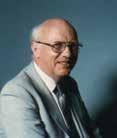
Lionel Graves
One of King’s oldest old boys, Lionel Mathieson Graves (Castle House, 37-44), died suddenly on 5th November, 2017 at the age of 91.
Born in Glasgow on 4th May, 1926 (the first full day of the general strike) he moved to Eldoret, Uganda when only a few months old before relocating to Nairobi, Kenya where he attended the Forest Road Infants School. At the age of seven, Lionel was sent to Nakuru School as a boarder, travelling unaccompanied across Africa by train.
In 1936 Lionel moved to his father’s home town of Tenbury Wells, Worcestershire, and started at the King’s School in September, 1937.
In 1939, on the declaration of war, the school was taken over by the RAF and Lionel, along with the rest of the school, was evacuated to Criccieth in North Wales; some of the day boys became boarders but most transferred to the Grammar School. In the end the RAF did not use the school buildings at all, so the evacuation was completely unnecessary.
During an English class at King’s with Mr. Ward, Lionel had witnessed the bombing of the Dowty Meco company by the luftwaffe but this was not allowed to interrupt the lesson which was completed as normal.
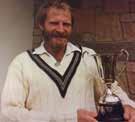
Michael Head
Michael Head passed away on March 25, 2018 at the age of 73 after a prolonged dementia-related illness. Michael came to King’s on a scholarship as a dayboy in 1956 where he was a member of Chappel House. He enjoyed school life to the full but his most memorable lessons were in the art studio on the upper floor with the Misses Campbell. His sporting prowess was mostly confined to cricket where he was
known for his spectacular flying catches. He left school and joined the Ordnance Survey in Southampton where he trained as a map surveyor. The OS was his only employer during his entire working life. When he started, OS 1 inch maps were produced and corrected by surveyors walking the ground with clipboards. When he retired as a section manager, maps were updated by correcting satellite images. Michael’s greatest love during his career was surveying mountains and one of his claims to fame was that he personally surveyed
In 1944, after completing his Higher School Certificate, Lionel enlisted in the Army Reconnaissance Corps. Regarding his medical he recalled, ‘On calling at the office I was given a very cursory medical inspection and eye test. I couldn›t see the top letter with my weak right eye but had memorized the letters half way down before taking my glasses off. I was informed that I passed A1 and in the fittest category. Incidentally on demob I had a similar medical and without cheating on the eye test I was graded C3; pity I couldn’t claim a disability pension.’
After being demobbed, Lionel took a teaching qualification at Bede College, University of Durham (1950-1952). A reference from the Principle of Bede College, G. E. Brigstocke stated, ‘He gave promise of becoming a teacher of more than usual power’. This led, in 1952, to a teaching post at Birchen Coppice, Kidderminster, which was followed by a deputy headship at Gannow School, Rubery (1960-1965) and a headship at Priors Marston, Warwickshire. In 1968 he became the headmaster at Hallow C of E primary school, a position he held until his retirement in 1986.
He is survived by his wife, Diana, his daughter Jane and his son Richard.
Lionel has documented his time in Kenya, at the King’s School and in the army in his autobiography which is published online at www.graf-tek.com/graves.
Richard Graves
every Munro in Scotland. He pursued his love of cricket all of his life, both following test matches avidly and playing as captain of Letterston Cricket Club in Pembrokeshire where he made his home. He was also a founder member of the Pembrokeshire Surf Club.
He leaves two sons, James and Alex.
David Head (Cl 52-58)

Daryl Jelinek
Our Captain, Daryl Jelinek, has gone
Daryl Jelinek left us on Sunday, July 15, 2018, the way he said he wanted to go: quickly, on the saddle of his racing bike, 100 yards from the end of his Sunday morning loop. His heart beat increased suddenly, and then stopped. The pacemaker that had kept him going for several years failed to work this one crucial time. It was much, much too soon.
His death is a huge, huge loss for all who knew him, and, above all, for his wife, Thalia, and his family. He will live on through his son, Joe, and his daughter, Amy, of whom he was so, so proud. No obituary can do justice to Daryl. Daryl was a giant of a man. His presence filled any room he entered. He attracted all those with whom he engaged, by his warmth, his unbounded enthusiasm, his interest in others, his readiness to help, his selflessness, and by many other exceptional human qualities, instilled in him by his exceptional parents, Henry and Binnie.
Daryl was a born leader, who quickly took on his natural role as captain of our year’s rugby team, and very soon of the 1st XV. He led by example, by training and playing harder than anyone else, and often by over-stretching, and, unfortunately, punishing his heart. In the words of London Scottish: “Daryl was a very popular member of the London Scottish 1st XV squad in the mid-1980’s, arriving from Loughborough University. An incredibly fit rugby player, Daryl was always at the front of the fitness drills and his work rate stood him out as a hard working flanker which is why he ended up as a strong captain and a leader in any side he was involved in”. And he always wanted more: from County to the West Midlands at school, to captaining English Universities, England Colts, England U-23nd, Blackheath, and London Scottish. A terrible knee injury, while on tour in Canada, interrupted his incredibly promising rugby career. He took
up road cycling to remain as fit as he had ever been.
Daryl effortlessly transposed his leadership skills on the rugby field to business, working for companies within the CocaCola group for several decades, making himself popular with all his colleagues and spearheading Coca-Cola’s role at the Beijing and London Olympics. He recently became president of the ex-US activities of the Nature’s Bounty Co. His future was secure, and his retirement plans beginning to take shape.
His impeccable and apparently effortless organizational and leadership skills meant that his strenuous work schedule never prevented him from regularly bringing together large groups of friends from disparate backgrounds on road cycling trips, whether the Etape du Tour, a stage of the Tour de France, the Marmotte, or the annual Tour of Cyprus road race in late March. Daryl managed to make everyone feel welcome, and made it his goal to bring out the best in each of us.
King’s School played a key role in Daryl’s development from a nonchalant teenager into a leading rugby player and irreplaceable friend. All knew Daryl at school. Many wanted to emulate him, but hardly anyone could ever reach his level of popularity. The many messages of condolences from alumni, almost 40 years after he left school, are a testament to the unique person he was. Here are some excerpts: “I was devastated to hear the news about Daryl; such a tragedy”; “He was a kind and generous guy who made a positive difference to everybody he met. A great loss”; “Daryl was an inspiration, an athlete and a very kind and generous man”; “He was one of the best, lovely bloke! I won’t forget his laugh and his smile”; “He very much stood out from the crowd”; “He was a big character in every sense”; “He still looms large in my memory as only Daryl could: in many positive and great ways”; “Daryl was a larger-than-life character who generated confidence and
enthusiasm in all his team mates. He was also demanding. I clearly remember him saying before a match on a rugby tour to France, ‘Don’t just bring them down. That’s not a tackle. You make sure you knock’ em back. That’s a tackle! Daryl led by example and I suspect that no one who met him easily forgot him”; “I find it hard to imagine the world without him”; “I will always remember Daryl strutting around King’s with his long hair and in his cowboy boots like he owned the place and in a way, he did. Everyone in the school knew who he was, respected him and even wanted to be like him”; “He was a natural leader with a gregarious personality, and impressive physique”; “he had always been someone who had made a big impression from school days and whose news I was always keen to hear”; “His energy was unbound”; “Daryl squeezed so much into a relatively short time, more so that most do in a far longer life. For this his family should feel immensely proud and I am sure that, when the initial hurt subsides, this will give them a great deal of strength”; “Daryl was a very charismatic person whose personality dominated Choir House all those years ago. It was a pleasure to play rugby with him in the First XV for a couple of years, tour along with Boggy to Paris and I still recall the pride of the whole school when he was selected for England”; It is such a shock to hear that someone from our year is no longer with us, especially as I remember such a fit and youthful young man who was clearly very popular and hugely immersed in school life”; “I’m happy that my wife met my gregarious, charming, fun and caring friend”.
It was an incredible pleasure and privilege to have had the opportunity to spend time with Daryl, and still to count him as a dear friend some 45 years after we first met. The only regret that all of us undoubtedly have is that we could not spend more time with our wonderful friend. Our 40th class reunion is due to take place in May 2019, and his absence will leave a huge, painful gap. He will be sorely missed.
Nathan Alexander Jones B. 2nd May 1980D. 7th May 2018 (W 91-97)
Nathan was bright and popular, participating in many activities such as climbing, scuba and CCF. After King’s he studied theatrical technology, later enjoying a highly successful international career in lighting design.
Nathan leaves behind his widow AnneMarie, and his two sons Ben and Alex. Nathan was so proud that Ben and Alex attend King’s and St. Alban’s respectively.
Matt Jones (W 90-97)

Maureen Kings Wednesday, 15th November: it’s a beautiful morning and The Church of St Mary Magdalene at Broadwas is packed to the point of overflowing. The day of Maureen’s funeral. The eulogies that follow all recalled Maureen as a ‘lovely person, always smiling’. And the large crowd paid tribute to her as a wife and mother, singer, church warden, a stalwart of the British Legion, playgroup leader and so much else. It was a busy and committed life; Maureen was much loved.
The King’s School contingent remember her very largely as the first school librarian. Her presence dominated the smallish rooms in the Edgar Tower where her conscientious expertise established an orderly collection of books, some scholarly, some on recreational subjects, all of them with their own accession numbers and scrupulously catalogued. She recruited a number of volunteers to help; they were mainly parents and wives of members of staff and a loyal and happy bunch they were. They, too, contributed to an atmosphere
Andrew Minter 24th November 1934 to 5th April 2017
Andrew, the son of a gas board manager and a school mistress, was born to modest but comfortable circumstances in Dudley in the Black Country.
His schooling started in Cradley Heath and then from the age of eleven continued at Stourbridge Grammar. At thirteen he moved to King’s School Worcester. He maintained fond recollections of his time at the King’s School, and kept an eye out for news of his contemporaries in later years. Nonetheless from his school reports it is clear that he was not much of a scholar during his time there.
After school he entered National Service, and was assigned to the Royal Air Force - though rather unromantically within the catering unit. Upon leaving National Service he briefly worked as a clerk with the Dudley branch of Lloyds Bank, but was then offered a position with Vickers Armstrong, a precursor to today’s British Aerospace. His work here, involving the technical development of guided missiles, introduced him to early computing technology.
of scholarship and welcome which quickly made the library her own. She was, too, a willing and invaluable contributor to a regular series of library evenings where there were readings by both pupils and staff and sumptuous refreshment - hearty meals is a more accurate description - devised with a chosen nationality theme and served to a small but capacity audience. While the more ebullient staff sweated carrying vats of curry or lasagne from the kitchen up the winding staircase of the tower, Maureen unobtrusively managed the essential duties of furniture arranging and decorating and then welcoming, always welcoming with that lovely smile. And she was there at the end too, rearranging and tidying in preparation for the following day. She was an essential component of life by day and night in the tower. What was even less obtrusive and greatly valued was the love and attention she gave to those boys and girls who felt themselves to be different, misfits in a way, sometimes unhappy and in need of her kindly concern and advice. I am sure that many ex-pupils of King’s have reason to be grateful for her care and good counsel.
I have a happy memory of her joining a school trip to Italy, Florence and Venice, with a keen interest in the cultural life of the country. Particularly, one small image.... It’s Florence late in the evening and we are on our way back to our hotel after what might be described as gentle carousing. Perhaps a little more than gentle. She and Mike Stevens are struggling up the street, arms linked; it’s unclear which of them is the anchor and which the rocking boat. And they are giggling, both of them.
Maureen was a great giggler. She and Ann Turvey, who, in those days ran the accounts department almost singlehanded from ledgers immaculately written and managed, were delighted when they were included in the Common Room community as ‘Ass (Associate) Members’. That amused them no end: the giggling, no malice ever, repeated itself with that mischievous sense of humour which was essential Maureen.
Yes, she was a colleague, much valued and loved by all, but, above all, a friend. She deserves our gratitude.
Peter Diamond (Staff 70-92)
Concurrent with this he became involved with the local branch of the Young Conservatives where he met his wife-to-be Mary. They were married in March 1958 and remained together for the nearly 60 years until Mary’s death in September 2015.
In the early sixties Andrew moved from Vickers Armstrong to De La Rue, a technical printing company whose business was moving into information technology, where he became one of the first generation of professional computer programmers.
Leaving De La Rue he joined Honeywell and then Wang, moving with his young family to the Home Counties and the small village of Wilstone in Hertfordshire. Shortly after the move he left Wang to become an independent software developer - at that time a rare beast - for the Wang Minicomputer platform. Being no ruthless businessman, many of his clients became personal friends over the years. Andrew enjoyed the independence of running his own company but not the paperwork - the doleful need to send invoices and bring accounts up to date was a rich seam of procrastination.
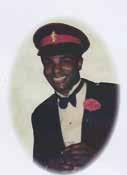
Kevin Morgan April 1964 - March 2018.
An accomplished academic and sportsman whilst at King’s, Kevin went on to serve a short service limited commission in the Army before going up to Balliol College, Oxford to study engineering. Whilst there, he was appointed Captain of the Oxford University Boxing Team and was awarded three full blues. He led the team to their first Varsity victory in many years and his legacy was such that a winning streak of sixteen years ensued, the longest in the Varsity record of any Oxford sports club. A career in the city followed as a futures and options trader, before Kevin turned to software development and became a successful contract programmer. Sadly, he experienced serious health issues and his departure was sudden and far too soon. He leaves a daughter, Annabel and mother, Rose.
Neil Darwell (Cl 71-82)
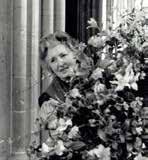
Paddy Pimley 1920-2017
When Paddy Pimley passed away in August last year at the age of 97, both King’s and the Vigornian Club lost one of its most devoted
Paddy’s connection with King’s goes back to her marriage to John Pimley, himself an Old Vigornian, in 1948, and it was inevitable that their children would attend King’s. As a result, Paddy became a parent at the school starting in 1961, when her eldest son Michael attended St. Alban’s with Simon, her second son, following just two years later. Both Michael and Simon remained at the school throughout their education, and the connection with King’s was even more closely enjoined when her daughter Sally married Norman Trapé, himself a former head boy of Kings.
terms – Britannia Square became a home from home for many of Michael’s and Simon’s friends in both St. Alban’s and the Hostel. Such generosity of hospitality was rewarded with the overwhelming number of letters of condolence which the school received when old pupils learned of Paddy’s passing.
As important as her support of the School, Paddy was a devoted partner to John, as he became first Treasurer, then Secretary, and finally President of the OV Club. Like everything in her life, Paddy threw herself wholeheartedly into many critical initiatives – for the first time chronicling and codifying OV membership so that the school was able to more easily trace old boys around the world.
Andrew and his wife lived out their days in Wilstone, immersing themselves in the life of the village and its small church. Both of them were voracious readers; the bookshelves would fill with volumes, the occasional ruthless weeding of which would merely leave new space to be filled from jumble sales and second hand bookshops. The rest of their spare time was filled by their children, the vegetable garden and fruit orchard, holidays travelling in Europe, and their pets.
His was not a loud or conspicuous life. Although Andrew showed his metal with a seam of stoicism when occasion demanded - as it did with his latter illness from pancreatic cancer - in general he was a man of good humour, reserved in manner but not unfriendly, and generally content with his lot.
Andrew is survived by his older brother Noel, sons Christopher and David, and grandchildren Daisy and Henry.
David Minter

Steve Priddey
After graduating in Classics from St Andrews University, Steve qualified as a chartered Accountant.
As such he worked and lived in Bromsgrove throughout his life, except moving to Martley in 2016. There, in September the following year, he unfortunately suffered fatal injuries when hit by a car in a freak accident. Steve leaves a widow, Shona, and a daughter, Isabella, who has just moved up into Creighton House.
Nick Priddey (Cr 62-69)

Mal Tarlington Mal Tarlington started as a cleaner at the school in August 2001, working eventually in the Annett Block, Sports Hall and Biology. She was also a kitchen assistant for a while and was well known for her red face and steam coming out of her ears when flustered. Mal will be fondly remembered as the lady walking round the school in her pink cycle helmet, chasing intruders off site, fiercely protective of the school and children. Mal was one of a kind, loyal, ferocious, funny, larger than life and most of all a friend, she will be sadly missed by her family and friends.
Nicky McNamee (Staff)
Throughout her sons’ lives at Kings, there was no more devoted a parent whose enthusiastic support for every aspect of their lives was evident in her attendance at rugby games on even the coldest of days, cricket matches, and school regattas on the river. No parent attended more faithfully concerts, plays, school fetes, and Paddy was always front and centre in organizing everything from tombolas at OV dinners to choral evenings at hers and John’s home in Britannia Square.
For a whole generation of King’s School boys (no girls at that time) – especially boarders whose parents were unable to return to Worcester for exeats or half-
She was also very influential in persuading John and the OV committee that the Annual OV Dinner – formally a bastion of all male attendance – opened its doors to include wives and girlfriends, the direct result of which was a much more meaningful and well-attended reunion.
Paddy’s role in the City, where she was a Justice of the Peace, Chairman of the Cathedral Flower and Embroidery Guilds, as well as Chairman of the NSPCC, established her as a leading light in Worcester’s civic life, not to mention serving as an important bridge between the School and the City.
With her passing, King’s has lost a wonderful friend and supporter – one whose memory will be loved and cherished by all who had the good fortune to know her.

Mike Rudge Mike was appointed to King’s School on the recommendation of the then Head of Department, Dr Gordon Leah, in 1986. Gordon was struck by Mike’s thorough grasp of the Spanish language learnt from his school in Gloucestershire and at John Moore University in Liverpool. Mike spent a number of years in Northern Spain where he was able to perfect his understanding and fluent use of Spanish.
He and I taught together from 1991 till his retirement in 2012. We had our classrooms opposite each other for a number of years, so we were able to exchange some lively banter in between lessons. Mike was a very enthusiastic teacher of Spanish and was keen to increase the number of pupils who were learning that particular language. After he was made Head of Languages in 1992, as the successor to Colin Callaghan, Mike persuaded the then Head, John Moore, to introduce the carousel of languages with French no longer the ‘dominant ‘ language, but Spanish being on a par with German and French. It is a credit to his forethought that Spanish, German and French each now share an

David Sandon
David Sandon (19572018) grew up literally in the shadow of Worcester Cathedral where his father Henry was a lay clerk, and so it was inevitable that David would follow in his footsteps. Winning a choral scholarship to King’s, under the watchful eye of the organist Christopher Robinson, David progressed to Head Chorister, performing each year at the Three Choirs Festival. While at King’s David was taught music by the former assistant organist Edgar Day, whose arrangement of Nunc Dimittis the choir still sings regularly.
David joined the ‘Vollers’, the Worcester Cathedral Voluntary Choir, and a singing career could well have beckoned, but instead David preferred to chase money and he joined Lloyds Bank, beginning a long career in finance. David also discovered Worcester porcelain and he collected rare figurines. His book, The Sandon Guide to Royal Worcester Figures, published in 1987 is still the definitive work on the subject.
Staying with Lloyds Bank David moved to London and the South East. He became a highly-qualified professional in the Financial Services industry; he was an
equal number of pupils in the school who study those languages to GCSE, and the numbers to A Level have increased over the years. The carousel of languages will be Mike’s lasting legacy to the academic life of the school.
He carried out his duties as Head of Department over the years with skill, enthusiasm and genuine hard-work, teaching both Spanish and French to A Level. The current HOD, Richard Ball greatly appreciated Mike’s generous support when he, Richard, came to work at KSW.
Outside of the classroom, Mike gave of his time with CCF, rugby and language exchange visits, for a number of years attending CCF on a Friday after School and for a week in the summer break. He became proficient in driving an army lorry and acquired an HGV licence so he could transport pupils whilst on camp. He coached rugby for a number of years, sharing the coaching of the U14 team with Brian Griffiths, taking teams to away matches or being the referee at home games on a Saturday afternoon. He organised and helped with the organisation and participation in language exchanges to Spain and France and carried out all of his extra-curricular activities with
associate of the Institute of Bankers and achieved the coveted diploma for Financial Advisers. David held management positions in training and in marketing and compliance and he played pivotal roles in managing the Pensions Mis-selling Review and in the handling of complaints about regulated financial advice, using his considerable experience when dealing with the Financial Ombudsman Service. In his last role as a Customer Services Manager he showed his genuine passion for doing the right thing for every customer.
David’s work took him close to other great cathedrals, firstly Southwark and then to Rochester. With his lovely bass voice, David became an active member of their choirs. David appears on a host of CD recordings and he helped organise choir tours to Germany, America and even to Rome. He also enjoyed singing traditional Barbers’ Shop, and joined in various stage productions. Few people can say they have performed at the Best Little Whorehouse in Texas and at an audience with Pope John Paul II. The latter was an achievement for which he was particularly proud.
On television he appeared with Jools Holland and Max Headroom, he went on several Songs of Praise programmes and
consummate professionalism.
He was struck down in the 1990s with sarcoidosis which badly affected his lower back. This extremely painful illness necessitated a long period of convalescence after which Mike returned to work with renewed vigour, but he had to curtail some of his extra-curricular activities. As a result of his illness, he took up swimming every morning before lessons in the school’s pool to increase the strength in his back.
However, it will be his participation in a number of pantomimes for which he may well be best remembered! It was in the role of the back end of a cow in a staff pantomime that he scored a hit for raising a laugh among the audience, with the then Head of Department, Colin Callaghan, who was the ‘top end ‘of the beast. In another show, he revealed great dance dexterity in the role of The Fairy Godmother as he appeared on stage dressed in a tutu, to grant Cinderella her wish!
He will be remembered as a strong character with a wicked sense of humour, an excellent academic and genuine friend.

Peter Sandon
Peter Sandon (19592017). The youngest of three boys, Pete was cheeky and mischievous. At King’s School Pete got up to every trick in the book—it is rumoured he actually wrote the book, but his real skill lay in not getting found out! Pete developed a fine treble voice and followed brother David and his father Henry Sandon into the Cathedral Choir. Pete earned a music scholarship to King’s and in due course became head chorister, which was a significant achievement. He learnt the violin and played in the school orchestra. He went with the cathedral choir on tours to Germany and sang at several Three Choirs Festivals.
Pete qualified in Accountancy at Bristol Polytechnic (now the University of the West of England). This led to various accounting jobs in his adopted city and Pete formed close ties with Bristol. In an early venture into the world of social media, Pete took up citizen band radio. His CB call sign was Chaser. In his bright green Ford Capri and on his motorbike it was Bristol Police who did the chasing on more than one occasion.
Pete worked for the Health Service as an accountant at Frenchay and other hospitals. He joined Frenchay cricket club playing as a wicket-keeper, and his love of cricket remained with him till he died. Sadly while working for the NHS, Pete’s own health declined and he was to spend so much time receiving treatment in Frenchay and the Bristol Royal. He battled epilepsy and other issues and, during many difficult years, it is a sign of Pete’s spirit that even though he’d moved to a hostel, he devoted his efforts to helping other residents and he became a caretaker and part-time manager. This was Pete all over, for he was always more interested in helping others than looking after himself.
Eventually with medical help, Pete turned his life around. His epilepsy meant he couldn’t get regular employment, but he didn’t want to be a burden and he took up accountancy again, helping others with their tax and legal problems. Pete stayed teetotal—literally. Tea was totally his life. Sales of PG Tips in Bristol have plummeted since Pete died!
Throughout the time he was struggling with his demons, Pete always clung to a single fading photograph of a little girl playing. This was his daughter Georgia, born following a short relationship at a time when he was unable to cope with the responsibilities of fatherhood. Pete was understandably nervous but ever so excited when a teenage Georgia got in touch with him. A recovered Pete was now ready to be a Dad. He and Georgia started from scratch and the new relationship meant everything to him. He’d had a lot of sadness in his life. Having found his daughter, at last he found happiness too.
His medical issues meant many stays in hospital, where he endeared himself to the nurses and staff with his cheeky humour, so that every ward was genuinely sad to see him leave. Pete helped so many other people and he was especially supportive of his father, Henry. The Worcester Warriors rugby team have lost one of their greatest fans— Pete rarely missed a home game and his empty seat in the stands will be impossible to fill. Everyone who knew him has the same comment about Pete. Unselfishly, he helped everybody before himself.
John Sandon (Br 69-75) and Henry Sandon
he appeared on This is Your Life (where he sung A Policeman’s Lot). David was always willing to help good causes and he raised many thousands of pounds for different charities, organising charity auctions and cricket matches. Like his father, he was a popular public speaker, freely giving his time to deliver his humorous charity talks. And who can forget his charity naked calendar—truly a sight to behold!
David’s other great passion was horses and he supported bookmakers all his life. In his later years he took this interest to a different level, joining syndicates and so he owned his own racehorses. With a real enthusiasm, he followed his horses around the country. He was never happier than when his horse Fort Worth beat the odds and was a clear winner at Worcester. That’s them on the photograph reproduced here.
David did so much to help his brother Peter before he died, and he was a devoted uncle to Liz, Rob and Georgia. Messages shared by his work colleagues show just how popular David was as a manager. His beaming smile was the sign of an abundance of enthusiasm. He touched the lives of so many with a genuine affection.
John Sandon (Br 69-75) and Henry Sandon

Phillip Sheppy
Phillip Charles Sheppy MBE, FRAgS 17th December 1933 –13th October 2017
Phillip died on 13th October 2017 after a long battle with Alzheimer’s Disease. Born in Malvern in December 1933, he joined King’s School, Worcester in 1946 and was a member of Castle House along with his great friends Ken Beard and David Bushby. Phillip was always very proud of his association with the school and was a regular contributor to the Vigornian.
On leaving school, he did National Service and turned down the opportunity of a commission in favour of joining the Royal Army Veterinary Corps in the hopes of pursuing his dream to become a vet. On leaving the army, he returned home to work on the family farm in Elmley Castle and threw himself into hunting and Young Farmers, rising to be Worcestershire County Chairman in 1958. In 1960 he moved to Northamptonshire as county organiser for the Young Farmers, and in August 1964 married a local farmer’s daughter, Rosemary Osborne. Following spells with the Royal Counties Show, the Guernsey Cattle Society and the National
Federation of Young Farmers, the rest of his professional career was spent with the National Proficiency Test Council. Few people can lay claim to a legacy of changing the way an industry worked, but with a relentless focus on improving standards and increased professionalism, he was at the vanguard of change in agriculture in the 1970s & 80s. It can be argued that he was ahead of his time in seeing the need for a “more responsible” agriculture with his work on the safe use of agrochemicals. His work in the industry was recognised through the award of an MBE in 1987 and probably his proudest achievement of being elected by his peers as a Fellow of the Royal Agricultural Societies.
Following his retirement in 1994, he enjoyed an Indian summer as the Honorary Librarian of the Royal Agricultural Society of England and pursued his hobby of collecting Worcester porcelain. A keen horseman in his youth, he had an encyclopaedic knowledge of the turf and was passionate about National Hunt racing, especially the Cheltenham Festival, and continued to enjoy watching racing on the TV as his health deteriorated.
Phillip died on Friday 13th October 2017 after a short spell in a care home.
Charlie Sheppy
OV Deaths reported since publication of 2016-17 Vigornian
Allen Baker (Ca 63-68)
John Barrett (Ca 50-58)
Herbert Barrs (Cl 42-48)
Christine Battrum (Hon OV 00-18)
Andrew Beard (Old Hawfordian)
Edward Bishop (Cr 43-54)
Clive Cam (Cl 54-61)
Michael Clarke (Cr 48-54)
Reginald (Paul) Constance (DB 49-56)
Lorimer Dobson (DB 27-31)
Tony Dorrell (Ca 47-52)
Jonathan Garfitt (Cl 69-74)
Richard (Tony) Garrett (Ca 32-35)
Lionel Graves (Ca 37-44)
Michael Head (Cl 56-61)
Daryl Jelinek (Ch 72-79)
Nathan Jones (W 91-97)
Maureen Kings (Hon OV 73-96)
Jennifer Lacey (Co 82-84)
Colin Mapp (Cr 53-58)
Andrew Minter (DB 46-52)
Kevin Morgan (Br 75-82)
Paddy Pimley (Hon OV)
Steve Priddey (Cr 62-69)
John (Roger) Pringle (Ch 48-52)
Mike Rudge (Hon OV 86-12)
David Sandon (Br 66-74)
Peter Sandon (Br 67-77)
Shahrudin Sharif (S 87-89)
Phillip Sheppy (Ca 43-52)
Mal Tarlington (Hon OV 01-18)
Clive Tutty (Ch 57-62)
Jeffrey Watkins (Ch 52-59)
All the King’s Men
To tie in with the centenary of the 1918 Armistice, we are producing a book of biographies of the OVs who died during the conflicts of the twentieth century. During her time here, previous King’s Archivist, Pauline Baum, undertook a great deal of detailed research into the OVs who fell during the First World War. More recently, members of School Archives Club have been researching the OV fallen of the Second World War from records housed within the school archives. Mark Rogers, our archives volunteer, has been undertaking in-depth research using material outside King’s walls. We are very grateful to the OV Club, who have generously agreed to pay for the book’s printing costs.
Archives Club
We are very sad to say goodbye to Archives Club stalwarts Alice Harrington and Lottie Ricketts who finished the Upper Sixth in summer 2018. They have very recently finished researching the fallen OVs of the Second World War for inclusion in All the King’s Men – thank you very much indeed for all your help. Meanwhile, Junior Archivists’ Club members Henny Hodges and Amy Yorke Brooks have finished transcribing all the wartime letters sent by OV R.C. Wilmot (S 1901-1904) to his mother during his time at the front, a momentous achievement. The girls also assisted in putting together an archives display for the School Fete in May 2018 as part of the Classic Department’s firing up of a replica Roman oven. Thank you very much.
family history or investigating the fallen of the First and Second World Wars. Other enquiries have included girls’ first sporting fixtures at King’s, King’s Scouts, Paul McCartney’s visit to Worcester, the history of the school gardens, and the history of English as a school subject.
Visitors
It was wonderful to accommodate all 129 Lower Fourth pupils to the archives during their usual History lessons across January, February and March this year. In addition, eight new members of King’s staff visited the archives in January. The archives also welcomed 27 Year 6 pupils during two Stretch Days in February. In March, it was particularly exciting to welcome 30 Year 6 pupils from Broadheath C of E Primary School, who visited King’s archives as part of their studies into Worcester during the Industrial Revolution. The size of the group was too big to accommodate in Edgar Tower during ongoing building work; so instead Broadheath pupils and their teachers were based in the Vigornian Room and explored the archives exhibition set up for them there. The visit was a great success: grateful thanks go to Josh Hand for making the Weston Centre available to pupils during lunch and to Sue Mason for all her help before and during the visit.
This is the second year in which King’s archives has welcomed a history student from the University of Worcester, here on a voluntary placement as part of her assessed university course. Lily Deery spent 40 hours in the King’s archives, researching and putting together an exhibition on school theatre productions, now on display outside the Long Gallery: do take a look if you’ve not yet seen it. Thank you very much, Lily.
King’s archives have received a number of fascinating additions to the collection this year. Following his retirement, Stephan Le Marchand [KSW Staff 1983-2018] donated a large collection of material pertaining to past school drama and theatre productions. This included papers regarding the Lower Sixth production of “Canterbury Tales” (1994); King’s performance of “A Winter’s Tale” in Worcester Cathedral (1986); the Fifth and Sixth Form production of “Twelfth Night” (2014); King’s production of “A History of English Theatre Marathon” performed in the John Moore Theatre in aid of the MRI scanner at Birmingham’s Orthopaedic Hospital (1991); and the staff pantomime “Cinderella” (1983). Elsewhere, among items donated by Old Vigornians, came a collection of letters sent home during King’s evacuation to Criccieth, 1939-1940, as well as a complete collection of letters home from a King’s boarder during the 1940s. Together, these two collections provide a wonderful, “unofficial” insight into wartime and immediate post-war life at King’s. If you have any former King’s material that you would like to donate, do get in touch!
The Summer holidays of 2018 saw major staff changes in the cathedral music department as I moved across College Green and Peter Nardone announced his departure as cathedral organist and director of music. So before looking back over the 2017/2018 choir year, it’s been a great pleasure to welcome the cathedral’s new assistant director of music, Nicholas Freestone, and interim director of music, James Lancelot. Ashley Wagner has been the cathedral’s organ scholar for the past year, and stays in post until Christmas 2018, when he moves to Birmingham Cathedral as assistant head of music. Richard Cook remains as sub-assistant organist, with responsibility for the boys and gentlemen of the Voluntary Choir (the Vollers). Sebastian Hill, one of the cathedral’s choral scholars, spent his gapyear also working in the school music department, and we wish him all the best as he begins his studies as a choral scholar at Magdalen College, Oxford. In September 2017 the choir welcomed three new boy choristers and three new girl choristers, two of whom also attend King’s. All the boys are educated at King’s St Albans or the senior school, and currently about half of
the girls also attend the senior school. The reason for the cathedral choir’s existence is to sing the daily service of Evensong, as well as the Sunday Eucharist and special services at the various church festivals, and this regular rhythm of worship underpins all that they do. Highlights of the year can therefore just as easily be a dark Wednesday evening boys’ voices service in January, an exuberant Saturday evensong with the girls and men or one of the choirs’ trips away from the cathedral. A concert in November 2017 featured the choristers singing with the Worcester Festival Choral Society, singing Duruflé’s Requiem and Jonathan Dove’s beautiful and moving For an Unknown Soldier. During the Easter holidays the gentlemen of the choir enjoyed a fantastic tour to Nantes Cathedral and St. Anne d’Auray in Brittany, singing services and concerts jointly with the local choristers. And the year finished with a number of the choristers and gentlemen taking part in another hugely successful Three Choirs Festival, this year at Hereford Cathedral.
Once again, the archives has received many

At the start of the year, the archives received a visit from an academic researcher from Germany undertaking research on HA Natan (Staff 1944-1967). We were also visited by four Hon OVs, eighteen OVs, two wives of OVs, three children of OVs, and a King’s Sixth Former preparing a blog post for journalism regarding the OV fallen of 1917. Thank you very much to everyone who visited.
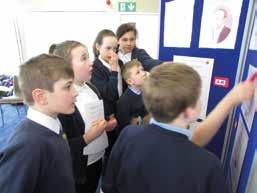

As part of the annual OV Reunion over the May Bank Holiday weekend the archives display boards were exhibited on the stage in College Hall, and once again it was excellent to meet and talk to OVs during the reunion lunch on Sunday afternoon. This June saw an OV reunion for King’s leavers of 1967, 1968 and 1969. It was very enjoyable to put together an archives display of material exclusively from the 1960s for this event, which went on display in the Boathouse. Many thanks to King’s Maintenance for all their assistance carrying and setting up display boards for both reunions.
Following a long hiatus to the building work on Edgar Tower, work recommenced in June 2018. The ongoing works have limited the exhibition and work space available in the archives; it will be wonderful to see the work completed. Watch this space!
Harriet Patrick, Archivist
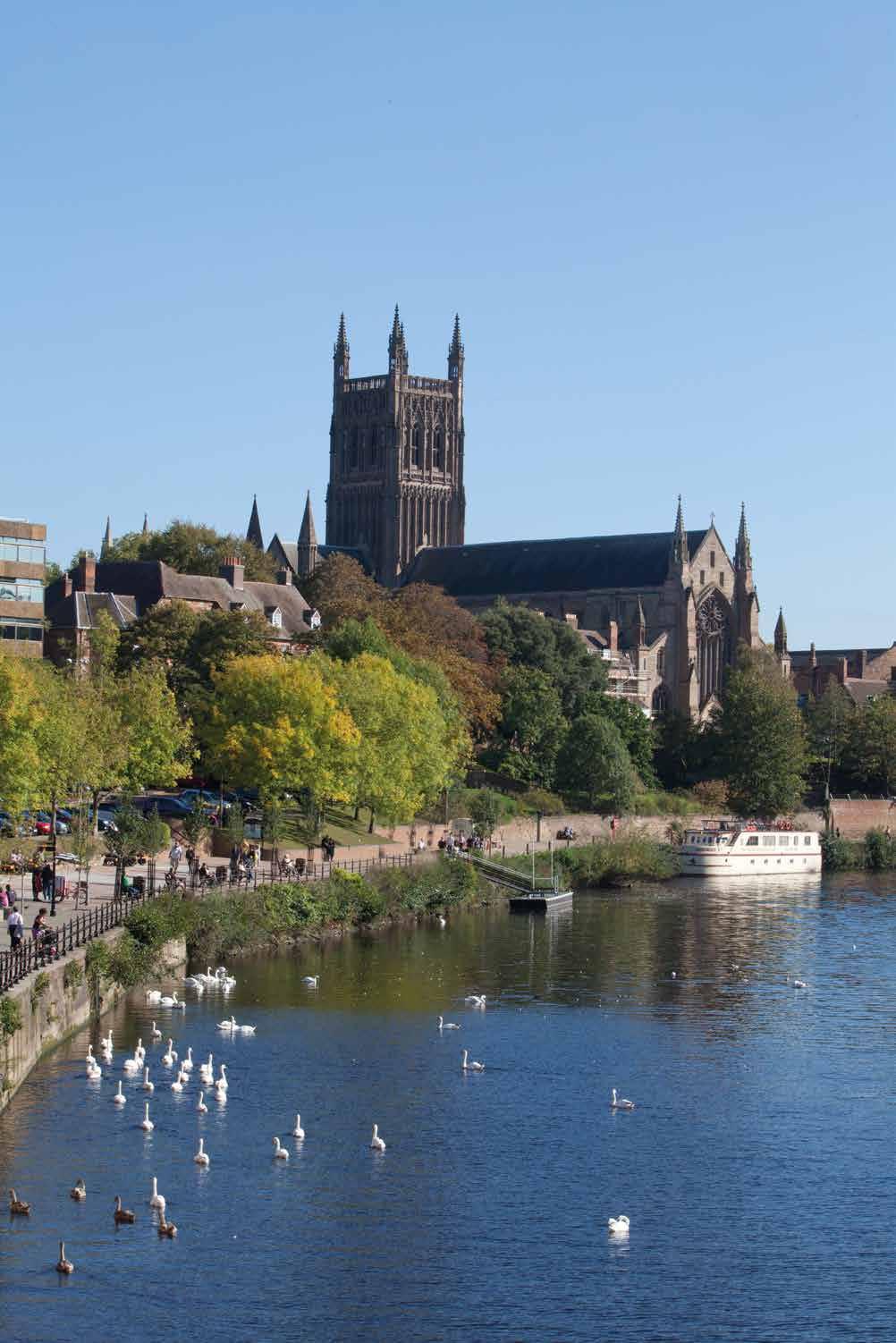
M.G. Armstrong MA Headmaster J.R. Ricketts, BSc Senior Deputy Head C. Mellor BA, PGCE Second Deputy Head
D.S. King BSc Academic Deputy Head S.L. Toland MA, PGCE Assistant Head (Pastoral) K.H. Beever MA, CEng Assistant Head (Pupil Development)
S.Le Marchand MA English
R.P. Mason BA, PGCE Director of Marketing & Communications, Economics
S.M. Bain MSc, BSc Biology, Games
R.J. Swinson-Davis BA, PGCE English
T.R. Sharp MA History
S.H. Le Marchand BA, PGCE English
M.C. Poole BSc, PhD Chemistry
M.R. Dorsett BA, MTh, PhD, Cert Theol (Chaplain) Religion & Philosophy
N. Essenhigh BSc, PGCE Biology
R.P. Geary BSc Head of Chemistry
A.A.D. Gillgrass BA PE, Games, Politics
S.C. Cuthbertson BA, PGCE Head of Geography
C.T. Haywood BA, PGCE Art
A.W. Longley BA, MA Head of Fourth Forms, Geography
M.M. Longley BEd, Cert Ed Games
D.J. Haddock MA, DPhil Head of Physics
J. Knipe BA, DipSpLD Learning Skills
A.J.M. Maund MA, M Phil, PGCE Head of English
C.W. Wilson BA, Cert Ed Head of Design & Technology
R.A. Ball MA Head of MFL
J.J. Mason BSc, PGCE Director of Sport
C. Atkinson BSc Games
R.J. James BSc, PhD Chemistry
E.I. Lummas BA, PGCE Design & Technology
M.D. Parkin MA, PhD, PGCE Head of Biology
L.L. Guy BA English
R.M. Rutter BA, PGCE MFL
R.A. Worth BSc, PGCE Biology
G.M. Gunter GTCL, LTCL, PGCE Music
A.M. Simpson BSc, PGCE Religion & Philosophy
L.E. Haddock BSc, PGCE Physics
K.M. Armitage BA Games
D.J. Salkeld BSc, PGCE Maths
M.J. Newby BEd Biology
S.C. Bradley BA Head of Classics
E. Friend BA, PGCE Head of Economics & Business
J.H. Chalmers B.Appi.Sc. Biology, Rowing
C.M. Neville BSc Geography
A.G. Deichen BA Design & Technology
L.A. Walmsley MA English
J.L. Lucas BA, PGCE, Dip Sp LD Head of Learning Skills
G.L. Williams M Ed, BA Economics & Business
R.J. Shearburn BA, PGCE Spanish
J.N. Gardiner BSc, PGCE Maths
J.O. Hand BA, PGCE Head of Sixth Form, Maths
J.R. Hewitt BA, PGCE Art
J. Price-Hutchinson BA, PGCE Drama
A.J. Fellows, BA, PGCE English
G.L. Hardy BA Art
R.J. McLaverty-Head Head of Religion
BA, MPhil, PhD, PGCE & Philosophy
E.L. Woodward BA Geography
E.L. Darby MA, PGCE Maths
R.M. Lewis MA, PGCE Classics
N.J. Sears BA, PGCE History
O.J. Heydon BSc Head of Mathematics
W.J. Joyce BSc, PGCE Geography
J. Sarriegui BA, PGCE MFL
T.B. Jeavons BSc Chemistry, Physics
S. Taranczuk MMus, FRCO, PGCE Director of Music
C.L. Brown BSc, PhD, PGCE Biology
D.J. Clarke BSc, PGCE Maths
E.D. Houghton BA, PGCE MFL
E.A. Shepherd MA, PGCE Classics
Alice Evans (S)
Bursar H.L. Jackson
Deputy Bursar P.F. Hope BSc, ACA
HR K.L. Turner
G.S. Harding
A.R. Swarbrick BSc, PGCE Maths
L.C. Symonds BSc, PGDipEd Games
G. Terry MA, BA Head of Art
R.A. Roberts MSci, PGCE Chemistry
L.R. Ruiz Pelaez BA, PGCE MFL
R.A. Ellender BA Design & Technology, Art
A.J. Knights M Phys Physics
S.L.E. Parry MA, PGCE Head of Drama
K.E. Lane Dance
C. Yates BSc MFL
J.C. Barnard BSc Geography
G.S.T. Bradley BA Classics
D.N. Branchett BSc, PGCE Head of Computing
E.J. Cameron BA, PGCE Head of History, Politics
E.J. Lewis BSc Mathematics
E.K. McKenzie BSc Games
M.W. Warren BA, MA English
A.R. Gamble BSc, PGCE Physics
L.A. Beard BSc Biology
F.J. Drinkwater MSc Maths
S. Greenall BA Games
L.H. Ison BSc Chemistry
E.K. Trow-Poole BA Classics
G.V. Ward CEng Maths
R.L. Wood BSc Games
C. Xia BA MFL
N.J. Blakemore BSc Design & Technology,Computing
D.R. Drew BA, PGCE MFL
S.D. Gilbert MSc Politics, History
C.R. Murray MA Art
K.A. Whiteman BSc Head of Middle Years, History
A.N. Falzon MA, PGCE MFL
E.F. E. Preece BSc Games
Bursary Staff A.S. Grove
S. Hewitt BSc, ACA
A. Cross
E.J. Gale
M.A. Roberts
L. Lewis
Bursar’s Secretary C. Neil Headmaster’s PA A. Stanley
School Secretaries C. Nesbitt BA
M.P. Quigley
M.L. Richardson
C.M. Williams
M.D. Guest
R.C. Kidd
F.E. Mead
P. Bladen
D. Paddock
Registrar V.C.L. Peckston BA S.E. Nevitt BA
DMR C.M. Perera BA
R.E.F.J. Booth BSc
FDO E.J. Elliott BSc
A.F. Evans
S. Borrillo-McLellan BA
C.M. Williams
Marketing A. Blueman
K.A. Cairns
Health Centre C. Furber RGN, Dip N.ENB 100
School Library
E.L. Rossiter BSc
A.H.C. Jeffery MA, DipLIS
M.J. Capell BSc, MSc
V.E. Warr
Archive H.M.B. Patrick MA
Careers H.L. Riddell MEng
H.C. Airdrie PGDip Careers, MSc
Theatre P.R.J. Haynes HLTA, ABTT, STSG S.J. Dudley ABTT, STSG
ICT Support P.E. Hodson
D.A.J. Cox
A. Rowberry
D.G.R. Thomas
SIMS H.R. Hateley
Examinations M.A. Glarvey BA
K.A. Thurgood BA
Health & Safety A.F. Woodward
Technicians J.L. Timlin BA
J. Harrell
V. Robinson
A.S. Rees
A.M. Westley
L. Saunders
A.F. McNeilly BSc
J.A. Palmer
Language Assistants
A.C.M.P. Rolland
I. Houer-Milton
A. Torrano Garcia
K. Lloyd-Adams
H. Zhang
Coaches T.M. Benham BA
R.L. Wood
A.E. Stratford
K.E. Lane
E. Gale
S.A. Waddington
E. Johnson
Catering I. Cunningham-Martin
K. Webb
K.T. Spink
J.M. Bennett
A. Balcerzak
I.K. Carson
A.H.C. Choudhury
H.E. Dutfield
R.J. Gough
S.J. Kings
C.L. Kings
G.M. Knight
K. Mol-Drygas
I.C. Palmer
Senior Scholar
Alice Harrington (Ch)
Estates
M.M.R. Vilhena
L. Webb
A.C. Winter BSc
R.J. Barker
N.M. Clines
S. D’Ambrosi
P. Gibbon
R.L. Vaughan
M.T.
Izzy Cartwright (Cr)
Fred Cronin (Ch)
Victoria Barlett (K)
George Bates (K)
Bill Bishop (Cr)
Seb Bower (W)
Ollie Colebourne (Br)
Fred Cronin (Ch)
Upper Sixth
Bill Bishop (Cr)
Ollie Colebourne (Br)
Daisy-Mae Ellis (S)
Alice Evans (S)
Jamie Havercroft (K)
Sarah Jane Jackson (W)
Andrew Salkeld (Cl)
Lower Sixth
Kirsten Camp-
bell-Ferguson (Ca)
Kit Coleman (K)
Tom Hale (Cl)
Zak Rawles (Os)
Tamara Enthoven (S)
Sam Galvin (W)
Lucy Goodman (W)
Lauren Green (W)
Alice Harrington (Ch)
Jamie Havercroft (K)
Fifth Form
Joe Amos (K)
Liberty Colebourne (Ch)
Holly Jennings (W)
Harriet Wales (Os)
Clara Watson (Os)
Jack Kenneally
-Perrin (O)
Lucy Macaulay (Ch)
Nish Rai (K)
Lottie Ricketts (Ch)
Ed Roberts (Cl)
Upper Remove
Thomas Angell (Cr)
Henny Hodges (Os)
Ruby Needham (Br)
Andrew Salkeld (Cl)
Lucy Stratton (S)
Joe Sullivan (Ca)
Phoebe Thomas (S)
Louise Turner (Br)
Lower Remove
Luke Beever (S)
Louisa De Vos (Ca)
Alex Lloyd (K)
Cerys Osborn (Cl)
Mr Hugh Carslake BA, LLB (Chairman)
Mr Mark Atkins MRICS
The Very Rev. Peter Atkinson FRSA
The Rev. Canon Dr Michael W Brierley
Professor Michael Clarke CBE MA, DL
Mr Douglas Dale MA, FCA
Mr Jeremy Goulding MA
Mr Laurence Green
Mrs Jane Jarvis BA (Hons), MCIPD
Mr Robert McClatchey MA
Mrs Carolyn Pike OBE LLB (Hons)
Mrs Patricia Preston MA (Oxon), DipM
Mr Andrew Reekes FRSA
Dr Leah Tether, BA Hons, MA, PhD (Dunelm) SFHEA
Mr Andrew Underwood
Professor John Vickerman BSc, PhD, DSc
Mr Paul Walker BTech, MPhil, CEng, MIMMM
Head James M Turner BEd, DipEd, ACP
Deputy Head Laura Baxter BSc, PGCE
Director of Studies Joel Turvey BA, PGCE
Assistant Head Amanda Marshall-Walker BA
Assistant Head Penny M Bradley, BEd
Junior School
Teaching Staff
*Joanna Atkins BA Ed
*Helen Fowler BA, PGCE, OCR Cert SENCO
Samuel Hodgkins BSc
Richard Cook BSc, PGCE
Sophie Hughes BA, PGCE
*Lisa Hyde BA, PGCE
Caroline Knight BEd, OCR Cert
*Tara McCullough BA, PGCE
Ian Percival BA, PGCE
Celia Rawnsley BA, PGCE
Janet Redman BEd, IMed, MA Applied Linguistics
*Laura Fullelove BA Performing Arts, PGCE
*Kathy Turk BA, MA, PGCE
Oliver Roberts, BA Ed
Pre-Prep Teaching Staff
Grace Owens BA Ed
Joanne Rand MSc, PGCE
Jo Chambers, BA, ARCM PGCE DipEd
Helen Willis BEd
Russell Marsland BSc, PGCE
Head Mr Richard Chapman BSc, PGCE
Deputy Head Mrs Rachel Duke BA, PGCE
Director of Studies
Mr David Braithwaite BEd
Junior School
Teaching Staff Mrs Fleur Atkinson BSc
Mrs Keeley Beauchamp BA, PGCE
Mrs Nicola Cain BA, PGCE
Mrs Jo Clark BEd
Mr Todd Dudley, BA PGCE
Mrs Katie Etherington BMus, PGCE
Mrs Vanessa Gunter GTCL, LTCL, PGCE
Mrs Helen Haggarty BMus, PGCE
Mrs Lucinda Hand MSc, BSc, PGCE
Mrs Alex Hind BSc, PGCE
Mrs Lisa Kilbey MA, LRSM, PGCE
Mrs Jill Knipe BA, Dip Spld
Mrs Liz Lewis BEd
Mrs Eleanor Majhu BSc, PGCE
Mrs Julie Pitts BEd
Mrs Nikola Ricketts BSc, PGCE
Miss Becky Woodger
HLTA, Level 2 ASA Swimming Teacher
Mr Tom Benham BA
Anna Leatherdale BSc
Jodie Howland BA Ed
Classroom Assistants Kevin J Bethell BTEC2/NVQ
Helen Chapman NVQ3
Sue Doorbar WPQTA
Kathy Goodman NNEB
Caroline Green BTec TA
Amanda Griffiths MA, NVQ3
Gemma Holtham PE
Abi Hershman
Sam Routledge Fdn Degree (Education)
Sue Surey NVQ3
Kindergarten Staff Karen Farrow NVQ3
Debbie Field NVQ3
Sarah A Gwillam BA
Judy Hooper DPP3
Abi Jeavons BA
Elaine Jennings NVQ3
Chris Kennedy NVQ3
Joanne Obrey NNEB
Rebecca Pearman BA
Sam Powell BA
Jo Simons Fdn Degree
Sue Watts Cert Ed
Matron Fiona Geary
Kathy Goodman
After School Care Dorothy Hodgkiss
Yvonne Hutton
Lunch Time Supervisor Henry Martyn-Smith
Office Staff Laura Crowe
Laura Blakemore
Registrar Donna Wenyon
Groundsman Andy Callow
Catering Staff Tracey Widdows
Ceri Baker
Melissa Bates
Sarah Hand
Cheryl Scott
Beverley Silvester
Carol Young
Art / Science Technician Sue Elliott
Maintenance Nick Vaughan
Pre-Prep
Teaching Staff Mrs Kate Chatterton BSc, PGCE
Miss Ellie Chadwick BA
Mrs Katy Hadfield BA, (QTS)
Mrs Louise Thorp BA, PGCE
Pre-Prep
Teaching Assistants Mrs Albanie Cinao,
Mrs Charlie Holden-Milner BA
Mrs Lizzie Monkhouse NVQ3
Level 2 ASA Swimming Teacher
Mrs Judith Stenson
Level 3 TA, Dip SEN support
Registrar Mrs L Robins
Marketing Assistant: Mrs Sarah Velasquez
Secretary Miss S Hurley
Matrons Mrs A Withnall
Mrs K Jenkins
Caretaker Mr T Price
Sports Coaches Lucy Nichols, Charlie Hooman Henry Pillman
